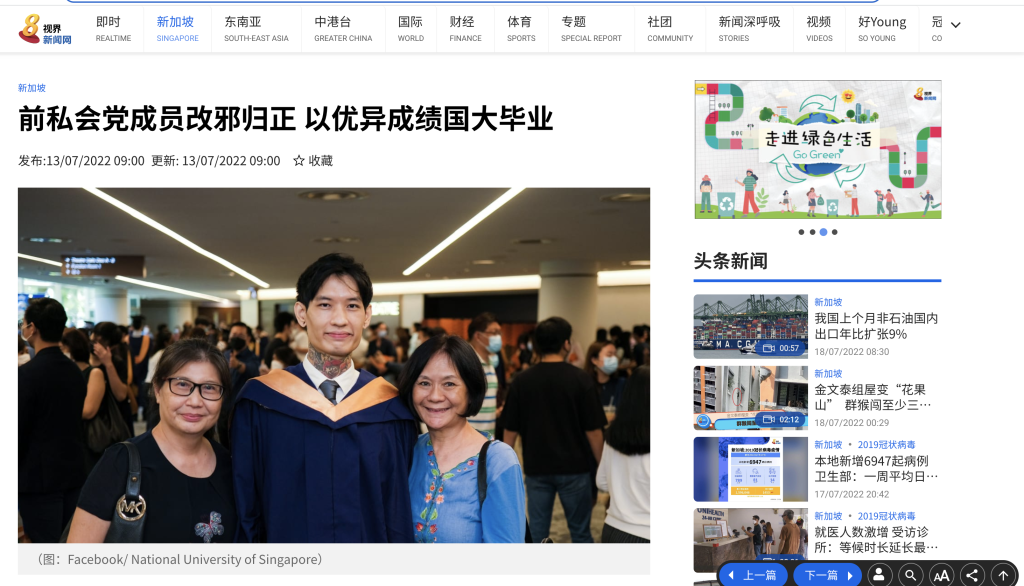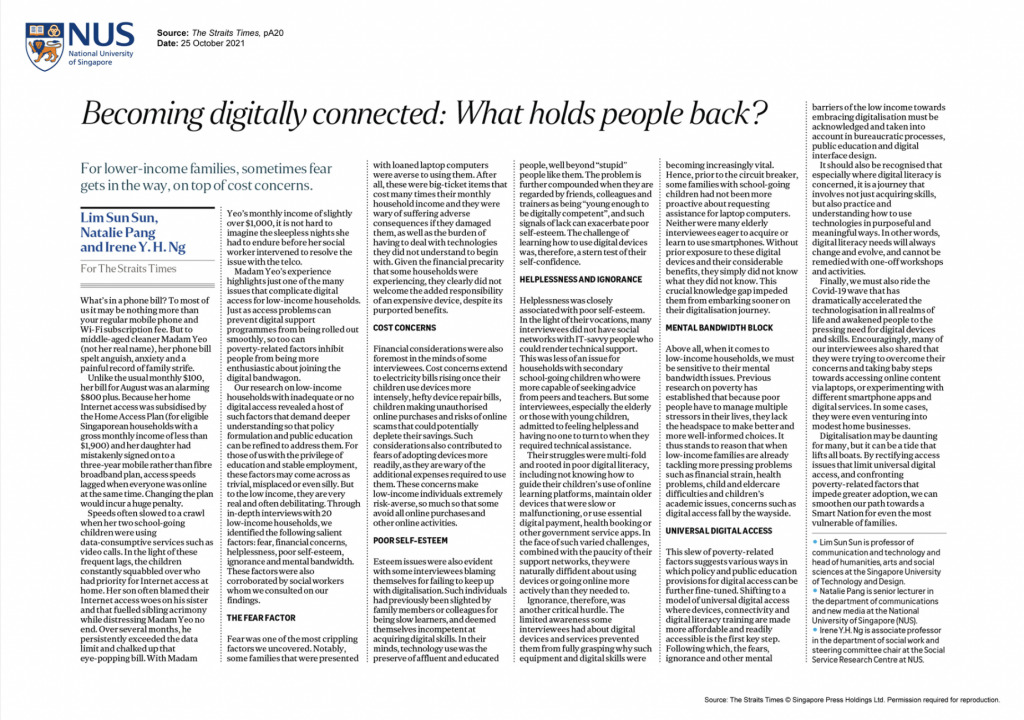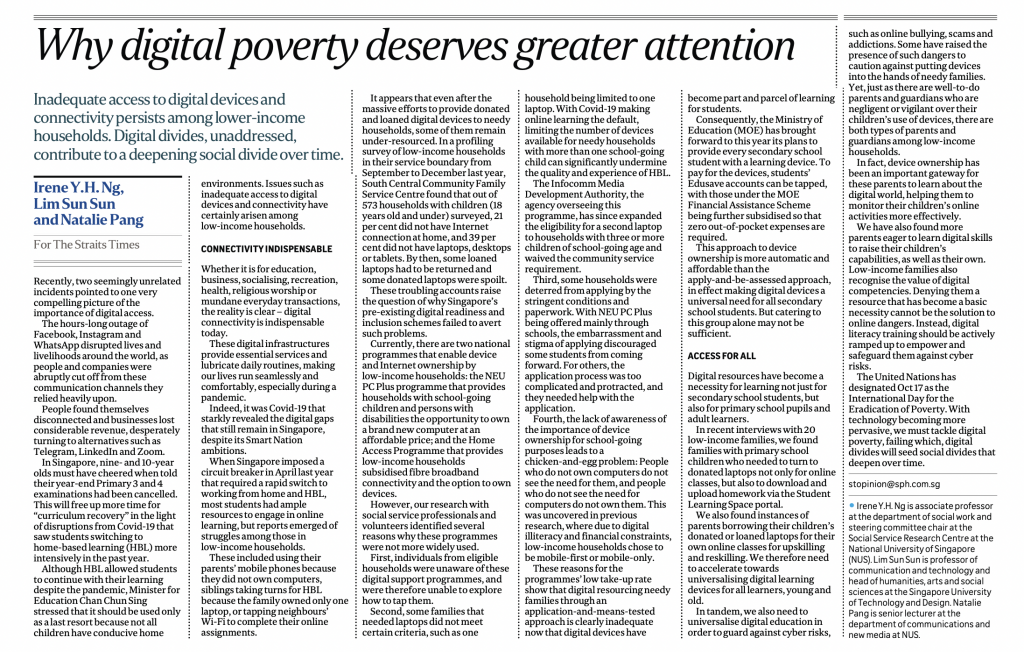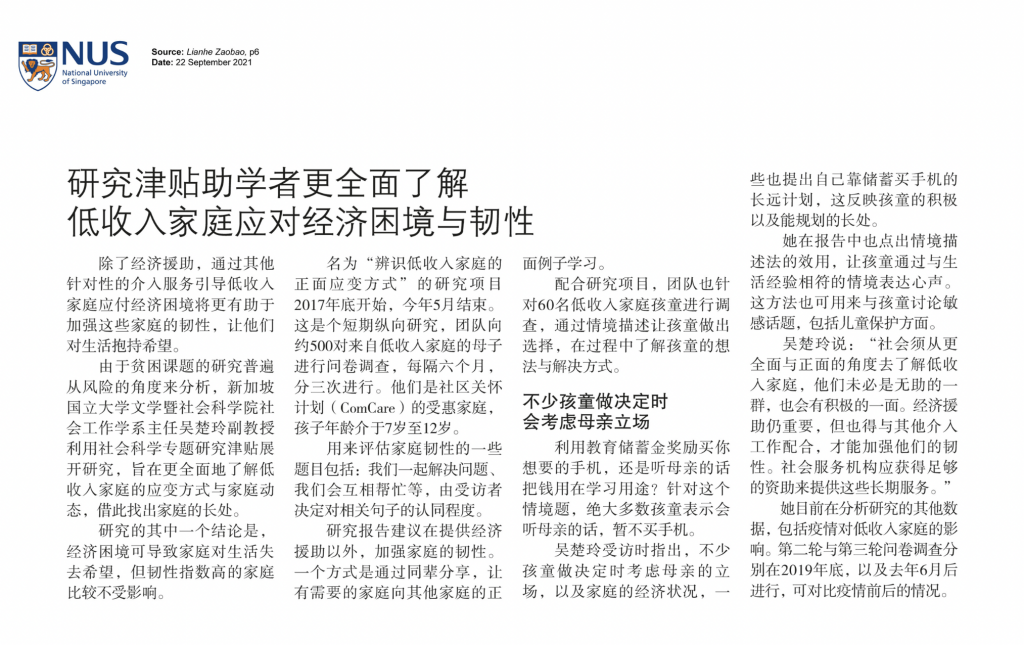News
It takes a “kampung”: Creating a sustainable ecosystem of care for everyone, by everyone
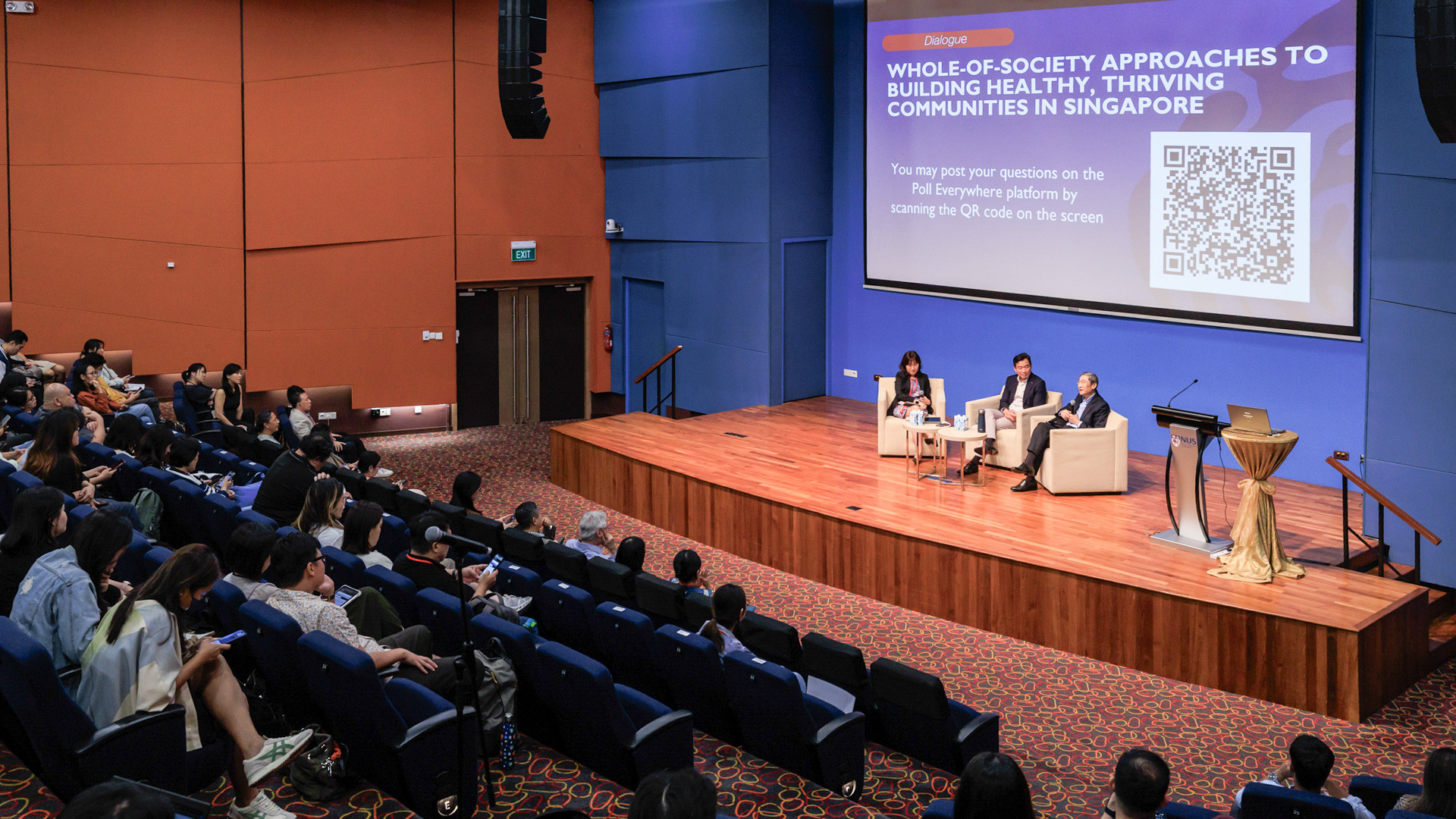
There was a time when neighbours in villages or kampungs kept an eye out for one another, shared food, and revelled in this shared sense of community and care.
As Singapore stands on the brink of becoming a "super-aged" society, with one in five citizens set to be over 65 by 2026, bringing back the kampung spirit, where everyone cares for everyone, might be the key to enabling healthy ageing here.
"This is neither a new formula for success, nor is there anything magical about it. I feel it is simply a resurrection or rejuvenation of our kampung spirit in action, where residents take ownership of their own health and look out for one another, alongside professionals and volunteers," said Mr Eric Chua, Senior Parliamentary Secretary for Social and Family Development, and for Law.
Speaking at the NUS SSR-TOUCH Conference, jointly organised by the NUS Social Service Research Centre (SSR) and TOUCH Community Services, Mr Chua said achieving positive health and well-being outcomes for all requires everyone's effort.
"Building a healthier Singapore that focuses on ageing well by going upstream, starting young, means all of us must pitch in: government, community organisations, family members, and individuals. We must all work together and play an active part in addressing social-health challenges," he added.
Themed "Sustained Well-Being in Future-Ready Communities", the conference, held on 11-12 November 2025, brought together about 300 participants from academia, research, practice, and policymaking. The goal was to advance dialogue and strengthen sectoral capabilities in social service research, evidence-to-practice translation, sustainable collaborations, and impact measurement.
Discussions focused on topics such as the use of technology and AI in social service planning and delivery, the importance of disability inclusion in building strong communities, and the challenges and opportunities for healthy longevity.
Strengthening the caregiving circle
One key focus of the NUS SSR-TOUCH Conference was supporting caregivers, an essential part of the kampung ecosystem. Grandparents, in particular, were highlighted as important caregivers in the family structure.
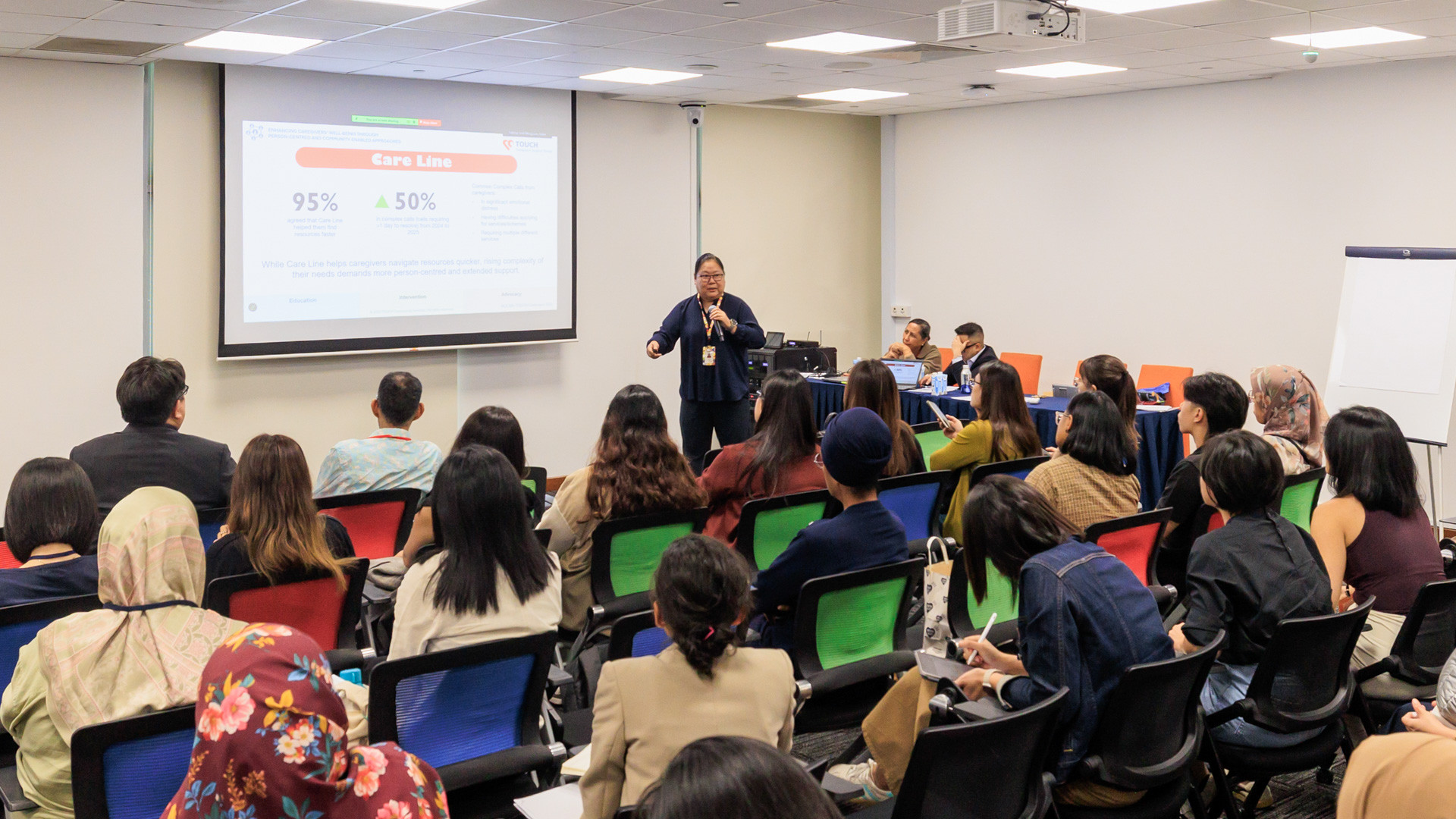
"There's a need for much more research on respite for custodial grandparents and other things that we generally grant parents," said Professor Premchand Dommaraju, Associate Professor of Sociology and Director of the Master of Science in Applied Gerontology programme at Nanyang Technological University, who presented on the topic.
He suggested policies such as childcare leave and flexible work arrangements for grandparents, citing Sweden's 2024 Parental Leave Reform as an example; the reform allows parents to transfer up to 45 days of paid parental leave to grandparents and other child caregivers.
Ms June Sim, Group Head of TOUCH Caregivers Support Group, also underscored the need for proper support systems for caregivers. "Instead of thinking of caregivers as care deliverers, I encourage you to think of caregivers as people with their own needs and aspirations," she said. Caregiver helplines, online communities, and raising awareness about caregiver challenges are necessary initiatives to support them, she added.
Designing together for stronger neighbourhoods
Another important area of discussion at the conference was the need to co-create programmes among stakeholders, as community initiatives cannot be created in silos.
Professor John Eu-Li Wong, Co-Chair of the Health District @ Queenstown (HD@QT) Steering Committee, who spoke on the initiative at the conference, emphasised this point, saying, "Things don't work if you develop something for somebody else. We must involve the person we're trying to develop for because that's how they own it, and that's how the chances of success are so much higher."
HD@QT is a multi-stakeholder initiative spearheaded by NUS, National University Health System (NUHS), and the Housing & Development Board (HDB), bringing together partners from the public, private, and people sectors to develop lasting health and social solutions in Singapore.
Among the projects that have made an impact are Happy Village @ Mei Ling, a community space staffed by a team of healthcare and social workers who work closely with residents to co-develop personalised care plans, and "Come 4Tea Lah!", a collaborative space where residents of all ages can come together to co-design community activities.
Prof Wong described "Come 4Tea Lah!" as "thriving", with residents themselves spearheading activities such as "yum cha" (tea drinking) sessions with board games, sing-alongs, monthly birthday celebrations for all ages (funded by residents), and the Woofy Club, a 120-strong group of dog-lovers who meet regularly to share tips on obedience training. These initiatives are complemented by other regular activities such as educational talks by NUS and health screenings by NUHS.
"Our commitment is: not only do we collect the data, we also share it with the residents, and then we co-create the solution. We have them in the planning, and actually have them take a seat at the table in designing the intervention," said Prof Wong.
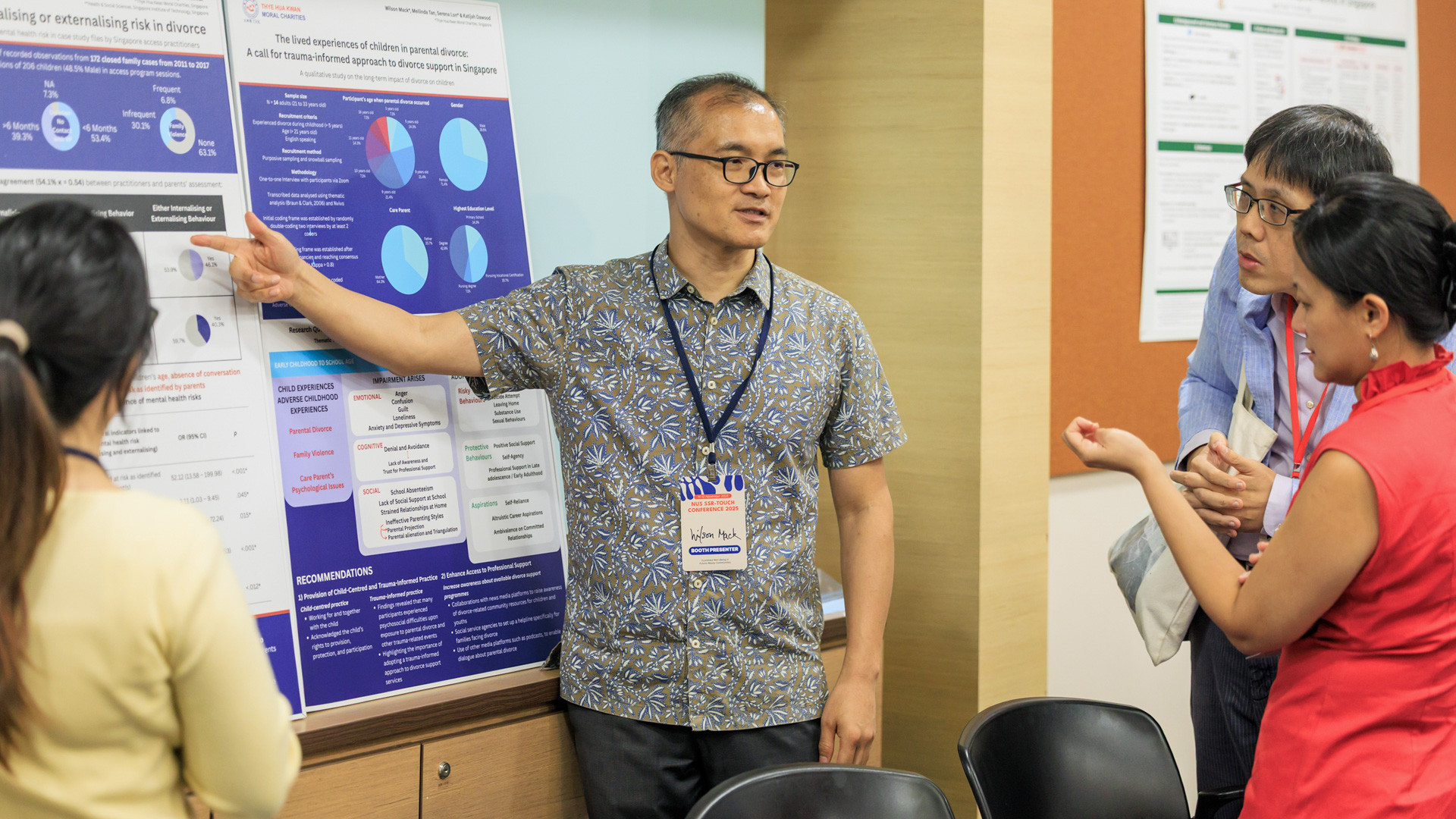
When carers get "sandwiched"
Many Singaporean adults today face the pressure of having to care for their elderly parents or family members while raising children of their own. This 'sandwiched generation' phenomenon can be particularly stressful for those with large families or low incomes.
Associate Professor Noor Aisha bte Abdul Rahman from the Department of Malay Studies at the NUS Faculty of Arts and Social Sciences highlighted that Malay family units tend to be larger, often including three to four children and elderly relatives living in the same household.
As such, Assoc Prof Noor Aisha said that Malay Muslim caregivers - particularly women - shoulder the heavy burden of being "sandwiched caregivers", juggling both eldercare and childcare. They often face concurrent challenges, such as health and well-being gaps, social isolation and burnout risk, as well as financial insecurity and employment barriers.
"Supporting them requires a coordinated effort," said Dr Ad Maulod, Principal Research Scientist at the Centre for Ageing Research & Education at Duke-NUS Medical School, who also presented on the topic. He cited raising health and well-being literacy, as well as quality and accessibility of health and social support services, as key to helping these sandwiched caregivers.
To better support our communities, Assoc Prof Noor Aisha stressed that social support systems should be caregiver-centric - programmes should be co-created with caregivers, rather than designed for them - to ensure timely and meaningful support. Such an approach is essential for supporting sandwiched caregivers across all demographic groups in Singapore.
Commenting on the success of the conference, Associate Professor Lee Jungup, SSR Co-Director said that the event has shown that it truly 'takes a kampung' to build a sustainable ecosystem of care - not just for older persons or caregivers, but for every generation in Singapore.
"By bringing together researchers, practitioners, policymakers and community partners, the NUS SSR-TOUCH Conference has created a shared space to listen, learn and co-create solutions grounded in real lives and real neighbourhoods. As we move towards a super-aged, future-ready society, our hope is that these collaborations will translate into concrete, community-led initiatives that sustain well-being for everyone, by everyone," said Assoc Prof Lee.
This story first appeared in NUSnews on 12 December 2025.
Time Poverty among the Young Working Poor: A Pathway from Low Wage to Psychological Well-being through Work-to-Family-Conflict
The implementation of the enhanced Workfare Income Supplement (WIS) scheme at the beginning of 2025 will benefit around half a million Singaporeans through increased payouts and expanded coverage. The income eligibility cap for low-wage workers was raised from S$2,500 to S$3,000 a month, providing greater financial support and fostering continued wage growth. During his Budget 2024 speech, Prime Minister Lawrence Wong noted that this adjustment ensures that lower-wage workers are continually covered even as their wages increase. Addressing the income inequality gap in Singapore has been a contentious topic among socioeconomic classes for some time. While various economic policies have been implemented to uplift lower-wage workers and reduce disparities in wages, some experts argue that inequality extends beyond economic factors to include the amount of time workers have outside of work. This raises an important question: Are the wage-poor also more time-poor? In ‘Time Poverty among the Young Working Poor: A Pathway from Low Wage to Psychological Well-being through Work-to-Family-Conflict’ (Journal of Family and Economic Issues, 2024), Professor Irene Y. H. Ng (NUS Social Work), Zhi Han Tan (NUS Social Service Research Centre), and Assistant Professor Gerard Chung (NUS Social Work) created a measure of work-based time poverty and conceptualised work-based time poverty to include not only the number of hours at work, but also other variables such as low wage, long hours, nonstandard hours, and uncontrollable hours. The researchers found that non-standard and uncontrollable hours mediate the relationship between low wage and psychological well-being for young people in Singapore. Crucially, while both low and higher wage respondents worked high numbers of hours and were generally time constrained in terms of hours, low-wage workers were additionally time poor due to the poorer quality of their work time. The low-wage young workers in this study took on jobs that involved duties with more nonstandard hours like regular graveyard shifts or unexpected work-hours changes. Such shift work often leaves them too tired to participate in family activities, which in turn imposes psychological stresses. The inability to balance work and family life can lead to reduced self-efficacy and increased self-doubt. Over time, these issues may develop into clinical mental health problems, hindering career advancement and further entrenching them in poverty. This situation creates a double whammy for low-wage workers, who not only face financial constraints but also experience significant time poverty. The implications of time poverty extend beyond mere inconvenience, affecting various aspects of their lives, including family dynamics, psychological well-being, and overall quality of life. Addressing income poverty without tackling time poverty is insufficient, as wage improvement policies can lead to employer workarounds that short-change employees through practices like leave withholding, and time off penalties. Policymakers and employers must collaborate on measures to alleviate workplace time poverty beyond the control of young workers themselves. By tackling these issues alongside wage improvements, low-wage workers can improve their chances of breaking the poverty cycle and achieving greater economic mobility. Read the article here.
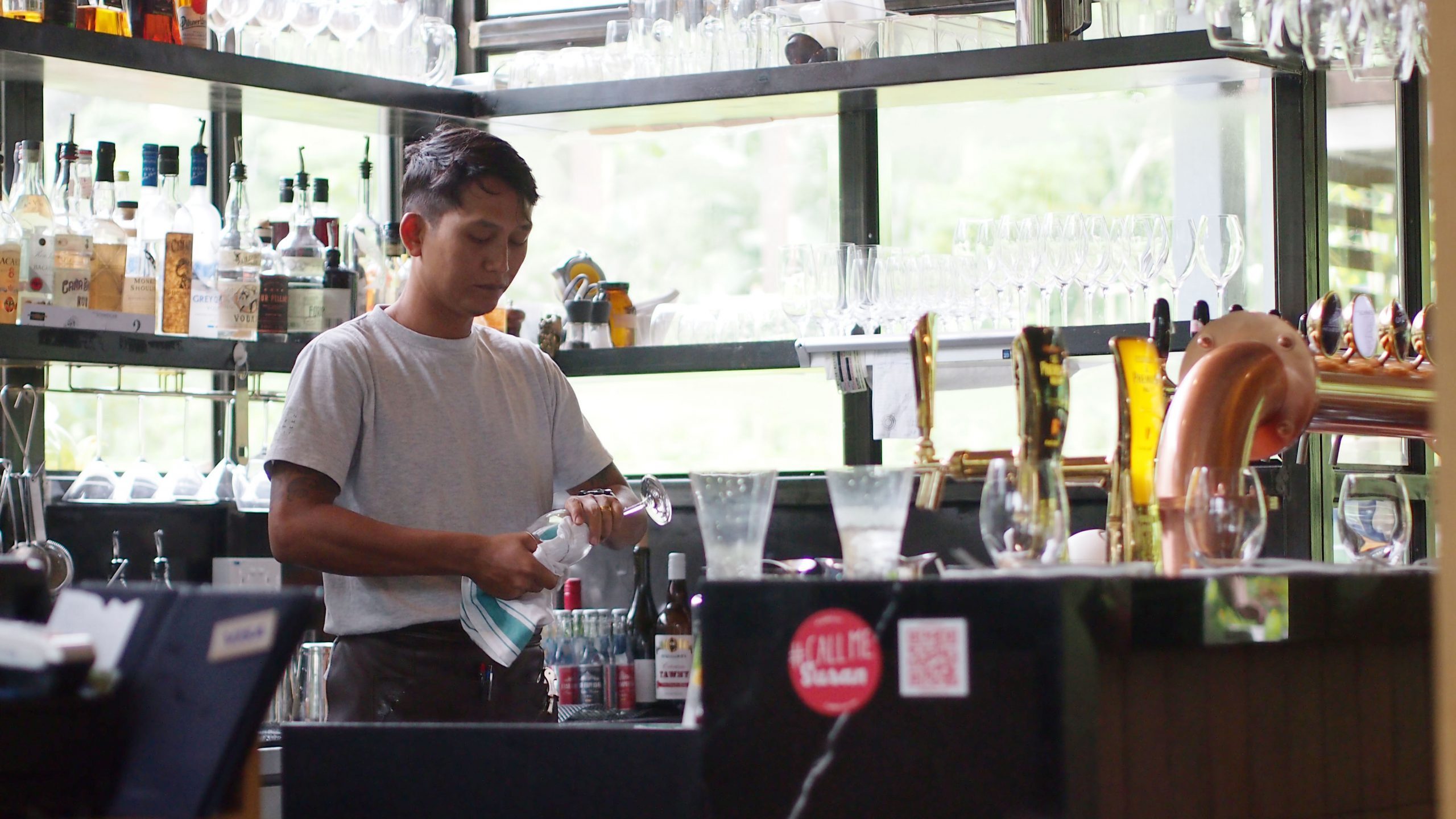
The moderating role of trajectories of family hardiness in the relationship between trajectories of economic hardship and mental health of mothers and children
On 20th November 2024, the ComLink+ scheme celebrates its one-year anniversary, having provided support to about 14,000 families across areas such as pre-school education, employment, and home ownership. Minister for Social and Family Development Masagos Zulkifli described the scheme as a significant step towards enhancing resilience and promoting social mobility in Singapore, particularly for low-income families. While financial initiatives like the ComLink+ scheme are crucial in alleviating the immediate pressures faced by low-income families, resilience research highlights the importance of focusing on the nuanced dynamics of family hardiness, in the face of economic hardship. Family hardiness refers to the family’s coping abilities and its collective attitude to be resilient in face of hardships. In ‘The moderating role of trajectories of family hardiness in the relationship between trajectories of economic hardship and mental health of mothers and children’ (Current Psychology, 2023), Mr Daniel Wen and Associate Professor Esther C. L. Goh (both NUS Social Work) delineate trajectories of family hardiness across time. Additionally, they investigate whether the trajectories of economic hardship previously delineated would predict less severe, non-clinical levels of depression and anxiety in mothers and children. Wen and Goh identify three trajectories of family hardiness, namely the high stable, low rapidly increasing and moderate increasing group. The high stable trajectory of family hardiness represents families that are working well together consistently over time, while the low rapidly increasing trajectory of family hardiness represents families that are struggling to find ways to work together to cope with their situation, and are desperately trying to enhance their ability to work together. Lastly, the moderate increasing trajectory of family hardiness represents families who are working together moderately well, and improving in their ability to work together in response to challenges. The researchers found that the trajectories of family hardiness moderated the relationship between trajectories of perceived economic hardship and symptoms of mental health in low-income mothers and children. Interestingly, different trajectories of family hardiness are protective for different aspects of mental health. For example, the high stable family hardiness trajectory was protective against depression among mothers, yet when it came to anxiety, a moderate increasing family hardiness trajectory was found to be protective, reducing the likelihood of higher levels of mother’s and child’s anxiety. One possibility is that having a consistently high trajectory of family hardiness provides a stable support system for mothers, which helps shield them from depression even when facing ongoing economic difficulties. In contrast, a moderate but increasing trajectory of family hardiness might be better at addressing anxiety, as it adapts and builds resilience over time, thus reducing the risk of heightened anxiety for both mothers and children. The findings highlight the importance of considering family resilience dynamics over time. Incorporating ongoing evaluations of family hardiness rather than just a single point in time may provide a more accurate understanding of how a family’s resilience can impact mental health outcomes. Read the article here.
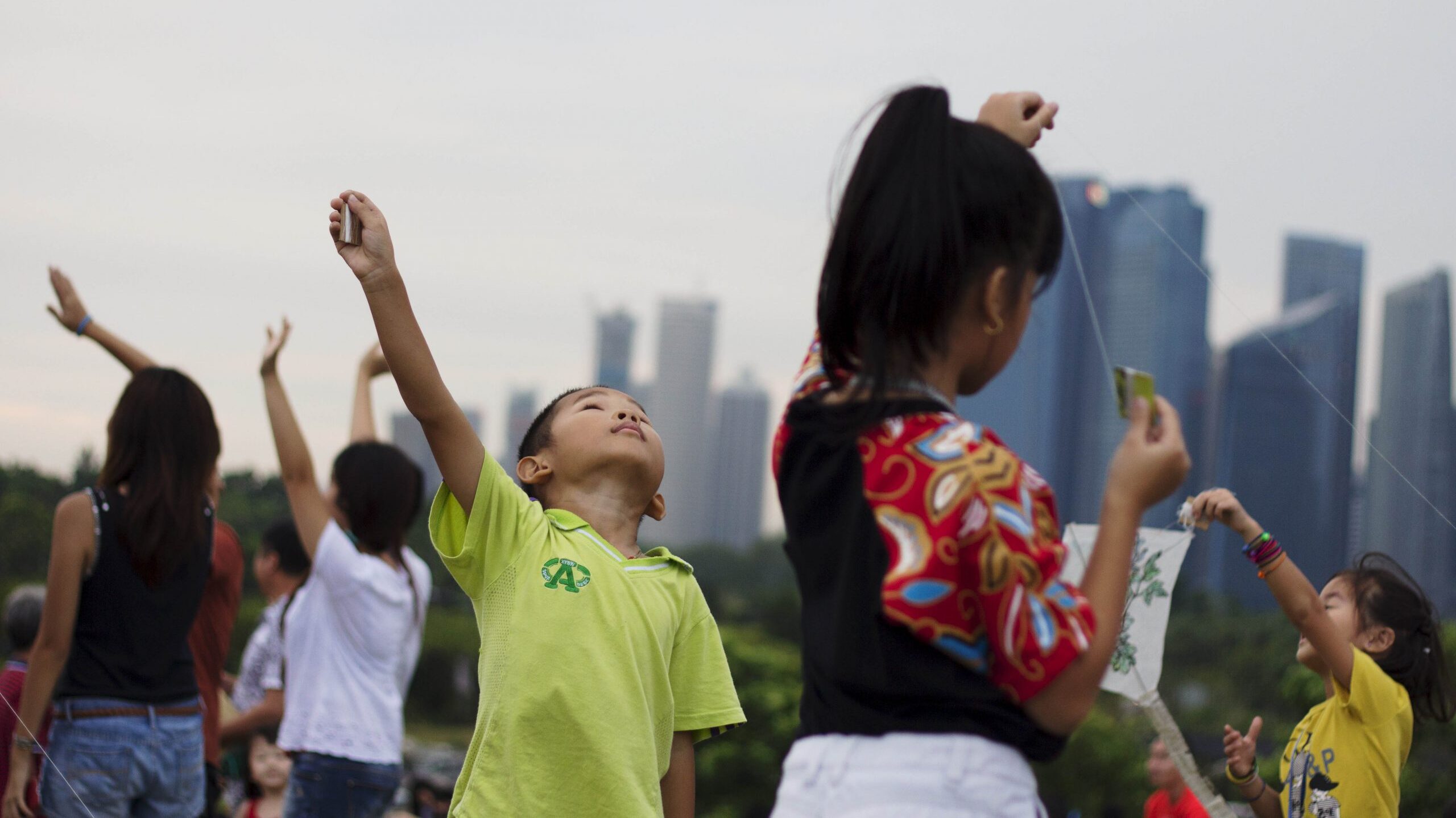
Watch the Recording: Technology, Wellbeing, and Policy in Singapore (2 Oct 2025)
Missed the live event? You can now watch the recording of our outreach event on Technology, Wellbeing, and Policy in Singapore, which brought together researchers from NUS Psychology and NUS Social Work to explore how technology shapes mental health and wellbeing in Singapore today. The four presentations discuss digital harms, AI, and the promise and challenges of digital mental health innovations.
Watch the recording here: https://tinyurl.com/4t4sbbtf
Download the programme here: https://tinyurl.com/4n4n7ufj
Presentations:
- ‘Technology-Related Harms and Youth Mental Health’ by Assoc Prof Jungup Lee (NUS Social Work):Explores how problematic smartphone use and cyberbullying intersect with mental health outcomes among Singaporean youths. The findings highlight the need for digital literacy, peer support, and cross-sectoral collaboration to foster safe digital engagement.
- ‘Core Components of Effective Text-based Conversations: Evidence from a Local Social Service Agency’ by Asst Prof Gerard Chung (NUS Social Work): Analyses online chat data with youths to identify what makes digital conversations effective. The study offers insights for training counsellors, improving practice, and designing AI-assisted digital mental health services.
- ‘Mental Health in the Age of AI Technology’ by Asst Prof Kean J. Hsu (NUS Psychology): Examines how AI reshapes our understanding of mental health—from research tools like machine learning to the social impact of algorithms and generative AI on wellbeing.
- ‘Promises and Pitfalls of Digital Mental Health Interventions (DMHIs): Implications for Policy, Equity, and Personalized Care in Singapore’ by Asst Prof Nur Hani Zainal (NUS Psychology): Discusses the potential and challenges of digital interventions such as mindfulness apps and CBT platforms. The talk addresses algorithmic bias, digital literacy, and equitable access in Singapore’s National Mental Health Strategy.
Discover how NUS FASS researchers are advancing conversations on technology, wellbeing, and policy in a rapidly digitalising society!
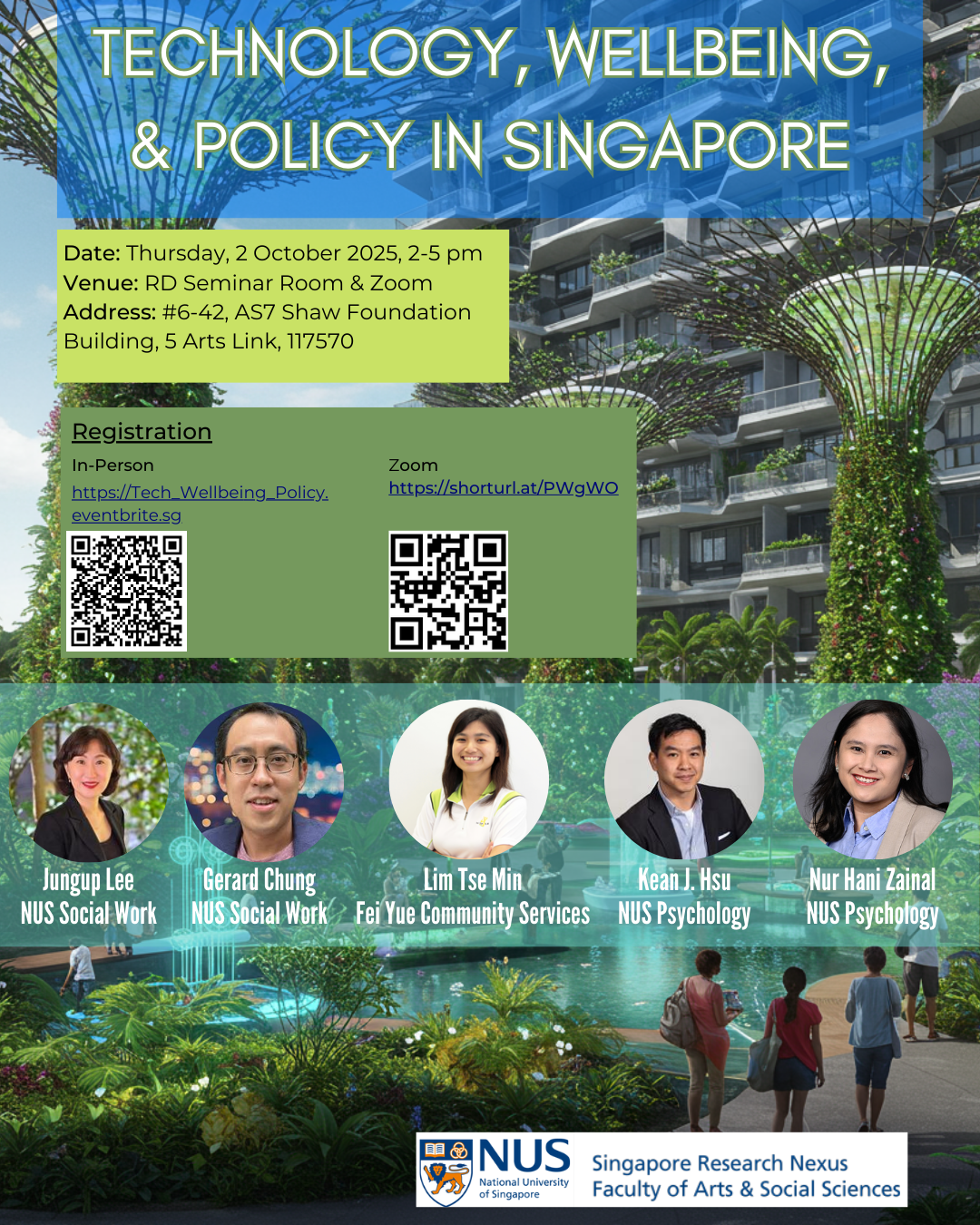
𝗘𝗩𝗘𝗡𝗧 | 𝗧𝗲𝗰𝗵𝗻𝗼𝗹𝗼𝗴𝘆, 𝗪𝗲𝗹𝗹𝗯𝗲𝗶𝗻𝗴, 𝗮𝗻𝗱 𝗣𝗼𝗹𝗶𝗰𝘆 𝗶𝗻 𝗦𝗶𝗻𝗴𝗮𝗽𝗼𝗿𝗲 | 𝟮 𝗢𝗰𝘁, 𝟮-𝟱 𝗽𝗺

NUS community honoured with National Day Awards on Singapore’s 60th birthday
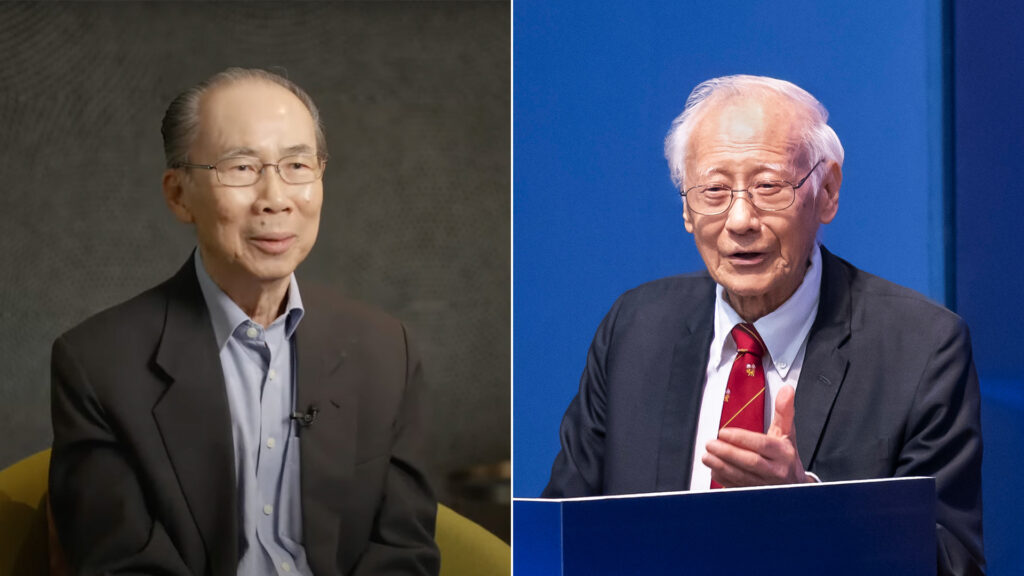
Mr Tan Gee Paw (MSc ISE '71), Adjunct Professor with the NUS College of Design and Engineering, and former Chairman of Changi Airport Group, was honoured with the Order of Nila Utama at the National Day Awards, earning this year's top accolade for his role in advancing Singapore's development in areas such as aviation, rail transport and water security.
Professor Lui Pao Chuen (Science '65), Temasek Defence Professor at the Temasek Defence Systems Institute (TDSI) and Chairman of the Singapore Nuclear Research and Safety Institute (SNRSI), both key institutes at NUS, received the next highest award, the Distinguished Service Order. He was lauded for his contributions to Singapore across diverse fields, including education, science and technology, urban development, defence and infrastructure.
The two recipients were among the nearly 200 members of the NUS community who were recognised for their merit and service to Singapore. In total, some 7,210 people were presented with the National Day Awards, on the year of Singapore's 60th anniversary.
Mr Tan, who chaired Changi Airport Group from October 2020 to March 2025, was cited for steering the airport operator through the headwinds posed by COVID-19, maintaining its mission as a leading air hub and ensuring a swift recovery in post-pandemic traffic levels. Beyond shaping the development of the upcoming Terminal 5 and Changi East airport expansion, he was credited with spearheading the group's efforts in innovation and sustainability, boosting its operational efficiency and overseeing key infrastructure upgrades.
During his term as Chairman of PUB, Singapore's national water agency, from 2001 to 2017, he led bold initiatives and long-term infrastructure projects, such as the launch of NEWater and the Marina Barrage. As Advisor to the Land Transport Authority and the Ministry of Transport, he provided guidance on complex technical issues related to rail projects and strategic advice on organisational matters.
Prof Lui was recognised for his pivotal role in advancing Singapore's research capabilities and technologies across multiple spheres - from nuclear science and water sustainability to national security - through his leadership as Chairman of SNRSI and the Public Utilities Board Project Evaluation Panel, as well as Advisor to the Ministry of Home Affairs, among others.
He had served with distinction in the Ministry of Defence for over 40 years, including 22 years as Chief Defence Scientist. A pioneering advocate of systems thinking, Prof Lui was reappointed Temasek Defence Professor at TDSI in 2024 in recognition of his outstanding scholarly accomplishments, a role in which he continues to enhance cross-disciplinary research capabilities in defence systems at NUS.
Spotlighting the NUS community
Other illustrious members of the NUS community also received recognition across the 22 award categories. They included many members of the University's Board of Trustees (BOT), both past and present.
NUS Pro-Chancellor Mr Gautam Banerjee was awarded the Public Service Star in his capacity as Director of the GIC Board, Chairman of the GIC Audit Committee, and a member of the GIC Human Resource and Organization Committee.
The Meritorious Service Medal was conferred upon BOT member Mr Tan Chong Meng (Engineering '83, MSc ISE '87) for his contributions as Chairman of the National University Health System, former Group CEO of PSA International, and former Chairman of JTC Corporation.
Another Trustee, Ms Lim Wan Yong, received the Long Service Medal in her capacity as Permanent Secretary (Education) at the Ministry of Education. A 2019 recipient of the Public Administration Medal (Silver) for her work at the Ministry of National Development, she has also held appointments in the Ministry of Social and Family Development and the Prime Minister's Office.
Among the recipients of the Meritorious Service Medal were former Trustees Mr Davinder Singh SC (Law '82), Dr Noeleen Heyzer (Arts & Social Sciences '71, MSocSci '73, HonDLitt '25, NUS Sociology and Anthropology) and Dr Sudha Nair (Arts & Social Sciences '86, PhD '07, NUS Social Work).
Mr Singh, who served on the NUS Board from 2012 to 2015, was conferred the award in his capacity as Chairman of the Singapore International Arbitration Centre. Social scientist Dr Noeleen Heyzer is a 2025 Honorary Graduate of the Doctor of Letters from NUS, Rector of NUS' Ridge View Residential College, and also former Under-Secretary-General of the United Nations. She served on the NUS Board from 2013 to 2019. Dr Sudha Nair, who taught at the Department of Social Work in the NUS Faculty of Arts and Social Sciences and served as Trustee from 2021 to 2024, received the award in her capacity as CEO of PAVE, a social service agency which provides an integrated service for individual and family protection.
Several leaders of NUS colleges, schools and institutes also received honours.
Mr Janadas Devan (Arts & Social Sciences '79, NUS English, Linguistics and Theatre Studies), Director of the Institute of Policy Studies at NUS, won the Meritorious Service Medal for his work as Deputy Secretary at the Prime Minister's Office, and as Senior Advisor at the Ministry of Digital Development and Information.
Mr Tan Tee How (Business '83), the Chair of the Governing Council at NUS' Centre for Trusted Internet and Community won the same medal for his contributions as Chairman of the Gambling Regulatory Authority of Singapore and Board Chairman of NHG Health.
Ms Janet Ang (Business '82), Chairman of the NUS-ISS Management Board, won the Public Service Star in her capacity as a Former Council Member of the Singapore Business Federation and Chairman of the Singapore Business Federation Foundation.
The Public Administration Medal (Silver) was awarded to Associate Professor Leong Ching (Arts & Social Sciences '92, MA '96, Public Policy PhD '13), NUS Vice Provost (Student Life) and Acting Dean of the Lee Kuan Yew School of Public Policy, and Professor Thomas M. Coffman, Dean of Duke-NUS Medical School.
Ms Euleen Goh, who previously served as Rector of the former Cinnamon College at NUS, won the Meritorious Service Medal for her contributions as the former Chairman of SATS.
Many of the University's alumni also received awards. These include:
Meritorious Service Medal
- Mr Hoong Wee Teck (Arts & Social Sciences '87, NUS Sociology and Anthropology, NUS Chinese Studies and NUS Political Science)
The Public Service Star (Bar)
- Mr Chandra Mohan s/o Rethnam (Law '86)
- Mr Chiang Heng Liang (Business '85, MFE '02)
- Mr Lye Hoong Yip, Raymond (Law '90)
- Mr Peter Sim Swee Yam (Law '80)
The Public Service Star
- Mr Cheah Kok Keong (Arts & Social Sciences '91)
- Mr Chey Chor Wai (Business '76)
- Mr Foo Hee Jug (Science '90)
- Mr John Ng Peng Wah (Engineering '85, MSc ISE '90)
- Assoc Prof Leong Kwok Fai Mark (Medicine '86)
- Assoc Prof Stephen Phua Lye Huat (Law '88)
This story first appeared on NUSNews on 15 August 2025.
Revitalising youths and textiles: The story of Repurposed
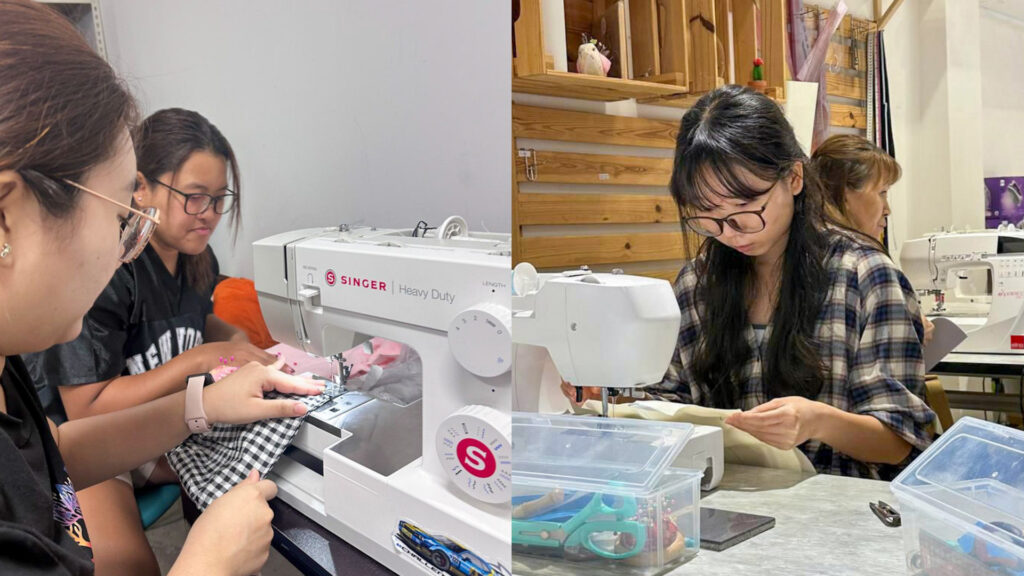
Matthew Tan, a student at the NUS Faculty of Arts and Social Sciences (FASS), and FASS alumna Desiree Chang launched Woofie's Warehouse in 2021 based on a hybrid concept that blends thrift and vintage by selling second-hand clothing primarily sourced from Japan.
Purchasing the merchandise in bulk often meant that about 5 to 10 per cent of the clothing was unfit for sale due to being in poor condition or heavily damaged. Faced with unsold inventory and Singapore's dismal textile recycling rate of just 2 per cent in 2023, the environmentally-conscious pair decided to act. Their solution? Repurposed - a bold initiative that transforms unsellable garments into stylish upcycled pieces, while empowering youths to explore their passion for design and fashion.
Repurposed - An idea borne at the FASS Social Entrepreneurship Incubator Pitch Competition

Repurposed, an initiative that was launched in April, offers young people passionate about sustainable fashion and entrepreneurship hands-on training in sewing, embroidery, and textile reworking. Participants have the opportunity to upcycle Woofie's unsold merchandise into their own clothing lines, which are then sold in stores. Alongside practical skills, they receive mentorship on the ins and outs of running a thrift business, equipping them with the knowledge to turn their creativity into entrepreneurial ventures.
The idea emerged after Matthew and Desiree banded with like-minded entrepreneurial friends, NUS Faculty of Science students Avaneesh Reddy and Novin Sim, to participate in the FASS Social Entrepreneurship Incubator (SEI) Pitch Competition at the end of last year.
Matthew, a third-year History student, shared how the team initially approached the competition with a broader idea to address Singapore's textile waste problem, but the judges offered valuable guidance to help refine their pitch.
He recounted, "They advised that given the scale of the textile waste problem in Singapore, it would be more practical to focus on addressing the issue within a specific social group and in the process, create meaningful impact." Because of this, the team decided to tap into Woofie's unsold inventory and target their efforts on youths passionate about sustainability but who may not have access to creative reworking opportunities, entrepreneurial exposure or confidence-building platforms.
In addition to teaching youths how to upcycle textiles, the team will aim to leverage Novin's background in life sciences to explore sustainable dyeing techniques using natural ingredients like coffee grounds for Repurposed. This will add another layer of innovation and eco-consciousness to their initiative. "We're not just empowering youths to rework clothes," Novin explained, "We're equipping them with the skills to think creatively and to innovate."
The team's vision eventually earned them first prize in the competition - S$10,000 in seed funding to invest in the training workshops and equipment needed, as well as a one-year mentorship experience with the SEI steering committee to carry out the business idea.
Repurposed's challenges and early wins
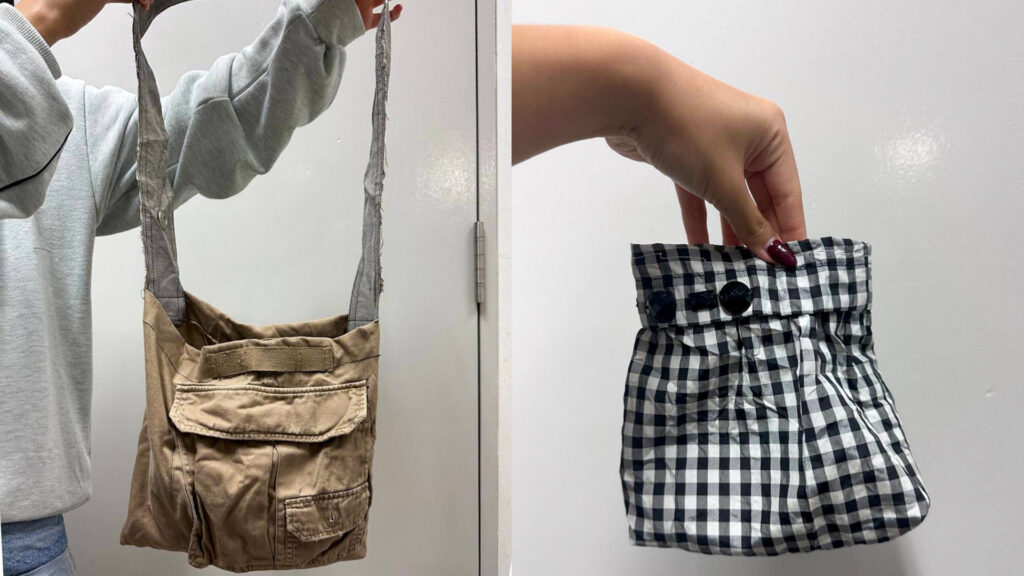
Launching Repurposed came with its fair share of challenges. The team initially struggled to recruit youths in April, as many were hesitant to commit long-term due to concerns about balancing involvement in the programme with schoolwork and exams. Others - such as students from fashion design schools - were drawn more by enrichment opportunities than genuine need.
Undeterred, the team pressed on. Through numerous interviews and extensive outreach, they successfully recruited an inaugural batch of four youths in May. Alongside Desiree, the youths completed a foundational textile reworking workshop at the end of May and have since independently crafted their very first bags, pouches and water bottle-holders.
To further support their learning journey, the team purchased sewing and embroidery machines and set up a dedicated workstation at Woofie's Eunos back office. There, the youths continued to hone their skills learnt from the foundation workshop to develop more polished pieces, with guidance from the team. This August, they will sell their handcrafted items at a flea market held by social enterprise City Sprouts in Pasir Ris. They will also attend a second advanced workshop at the end of the month to further refine their sewing and embroidery techniques and explore more distinctive patterns and designs with the goal of eventually progressing to developing their own clothing line such as buttoned-up shirts and ladies' shirts for sale at Woofie's by year's end. The team intends to recruit a second group of four to five youths early next year and selected participants will undergo the same training under the team's mentorship.
Other ways the team plans to support the youths include creating a guide on basic social media marketing and tracking of product sales of each youth. Desiree's participation in the first foundational workshop and later in the advanced workshop will allow the team to document and digitise the training process, ensuring future cohorts can learn from an online, structured knowledge base when Repurposed continues beyond the seed funding period.
Desiree, a Communications and New Media alumna, shared, "Repurposed is a meaningful initiative and we hope to continue it for as long as our stores are open. Rather than focus on training and recruiting a set number of youths within the seed funding period of one year, the team wants to focus on the longer-term goal of deepening the practical skills of the youths, building their confidence and deepen their appreciation for sustainability."
One of the participants, Ms Bock Khai Yue, was happy to be a part of the programme. She said, "Through this programme I experienced first-hand the joy of turning an unsellable product into my own creation!"
Avaneesh, a third-year student majoring in Data Science and Economics, reflected on lessons the team has also learnt since the start of the initiative. "When it came to recruitment, we realised that many youths felt hesitant or intimidated to apply, even if they were interested. Some doubted their creativity or feared they would not fit in." Moving forward, he shared that the team intends to feature more behind-the-scenes content of the reworking process when recruiting the second batch of participants, "not just to showcase what we do, but to make the programme feel more relatable, welcoming and achievable."
One of the competition judges and a member of the SEI steering committee, Head of NUS Social Work Department Associate Professor Lee Geok Ling, commended the team for the way they had navigated challenges, absorbed feedback and continuously refined their approach towards Repurposed - a testament to both their growth and unwavering dedication.
She remarked, "Their remarkable balance of creative ambition with practical, sustainable considerations exemplifies the desirable mix of idealism and pragmatism that is essential for social entrepreneurs…As they continue to develop, I am excited by the potential, meaningful impact they can make on the youth community, and I am confident that Repurposed will keep thriving, becoming even stronger social entrepreneurs in the years ahead."
This story first appeared on NUSNews on 13 August 2025.
Identifying the Relationship Between Strength of School Social Support and Level of Hope in Children from Low‐Income Families
As a meritocratic nation, Singapore normalises quality education as an enabler for a competent workforce and social mobility. While many middle to upper-class parents can comfortably support and uplift their children’s academic journeys, questions arise about whether children from low-income families may lack hope in academic achievement due to limited access to resources such as private tuition and extracurricular activities. The study ‘Identifying the Relationship Between Strength of School Social Support and Level of Hope in Children from Low-Income Families’ (Child Youth Care Forum, 2023) by Samuel Rajan David, Daniel Wen, and Associate Professor Esther Goh (all NUS Social Work) examines whether this gap can be bridged through social support provided by schools, educators, and classmates. The study emphasises the important role of the classroom setting in inspiring the next generation, regardless of socioeconomic status.
The researchers utilised a partially mixed sequential method involving both quantitative and qualitative data analyses. The quantitative component consisted of surveys administered to low-income mothers and children receiving financial assistance from the Singapore government. Children’s hope levels were measured using the Children’s Hope Scale, a self-report 6-item scale, while the Child and Adolescent Social Support Scale, a 48-item self-report measure, was used to assess children’s school social support. Through regression analysis, the researchers concluded that higher levels of social support from teachers and classmates inspired higher levels of hope in children from low-income families. They identified a significant interaction effect between the frequency of teachers’ social support and levels of hope.
The qualitative data comprised focus group discussions with 10 elementary school teachers who provided social support to low-income children. These discussions affirmed the statistical results, suggesting a mutually reinforcing relationship between peer and teacher social support in reducing hopelessness and increasing academic effort among these children. Participants noted that attentiveness is a precursor to providing social support, emphasising the importance of monitoring children’s day-to-day conditions and progress beyond academics.
The study's results provide strong evidence that social support from the school system is positively associated with hope levels in children from low-income families. The researchers highlight the importance of enhancing school support systems to promote inclusivity and prevent premature school dropout or poor educational outcomes, which can limit life opportunities. As Singapore moves towards Forward Singapore, an initiative launched by Prime Minister Lawrence Wong to redefine the social compact, it is essential to focus on caring for and building a better future for the next generation.
Read the article here.

Growing up poor(ly): intergenerational class-based parenting logic in Singapore
In the midst of Singapore's burgeoning middle to upper-class demographic, it is crucial not to overlook the challenges faced by young adults from the working class as societal norms and parenting ideals evolve. In 'Growing up poor(ly): intergenerational class-based parenting logic in Singapore' (Journal of Family Studies, 2023), Associate Professor Irene Y. H. Ng, Joshua Khoo, and Nicole Ng (all NUS Social Work) contextualise findings from Lareau's ethnography Unequal Childhoods: Class, Race, and Family Life (University of California Press, 2011) within Singapore's socio-economic landscape.
The ethnography illustrates a direct correlation between parenting practices and the socioeconomic positions, resources, and circumstances of the families studied. Middle-class parents typically exert greater personal autonomy in guiding their children's lives, whereas working-class parents tend to have limited time and resources to engage in similar efforts. Lareau's research further reveals that these class-based parenting strategies are intergenerational, shaped by parents' own upbringing experiences.
This phenomenon is particularly pronounced in Singapore, a nation with a strong emphasis on education which influences the parenting behaviours of middle to upper-class families. In contrast, working-class parents may feel discouraged from investing heavily in their children's development if they perceive limited opportunities for social mobility. The researchers interviewed a range of young parents in Singapore from both lower and higher socioeconomic status (SES) groups to better understand their transitions from school to work to family formation. They found that, despite some cultural differences, Lareau’s parenting logic largely applies to the Singaporean context.
Across SES groups, there is a strong emphasis on academic progress, but the ability of parents to support this progress is constrained by class, financial resources, and work commitments. Lower SES respondents often lacked structured study environments during their own childhoods and tended to become independent early, leading to a natural growth parenting logic. In contrast, higher SES respondents benefited from their parents' resources and active cultivation, resulting in more pronounced parental influence. By mirroring their parents’ approaches, different SES groups unconsciously reproduce distinct forms of natural growth in their own children, perpetuating the cycle of intergenerational SES transmission.
However, Singapore's education system is gradually shifting towards a more holistic approach that is less focused on results and more supportive of low-income students. Such educational reforms, along with broader societal changes, are necessary to address the underlying causes of class-based parenting behaviours and ensure every child has an equal opportunity for a good life.
Read the article here.

Five Arts and Social Sciences alumni honoured for their service and contributions to society
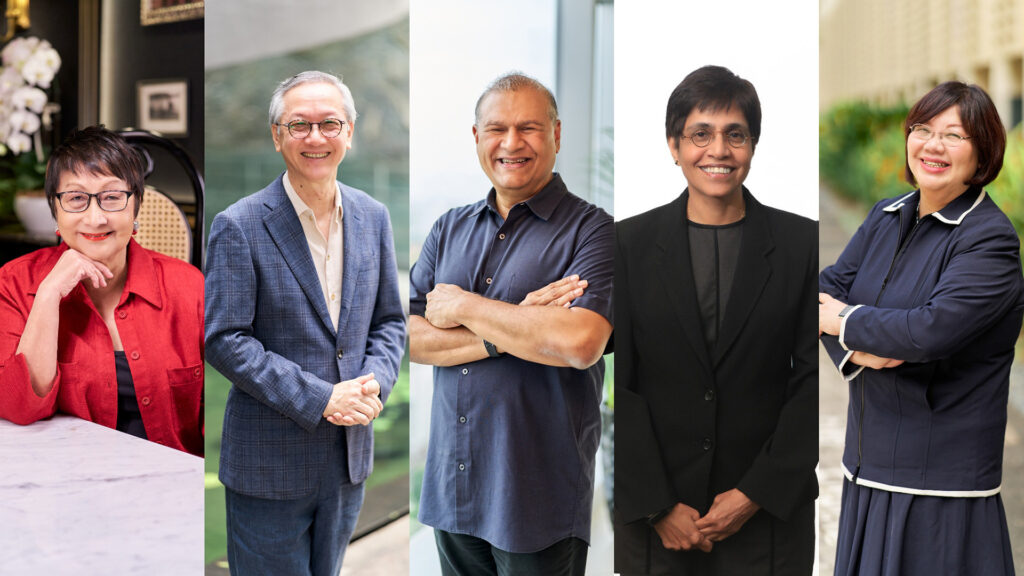
Five stellar alumni from the NUS Faculty of Arts and Social Sciences (FASS) were lauded with the FASS Distinguished Arts and Social Sciences Alumni Awards (DASSAA) on 10 July 2025 for their outstanding service and contributions to society.
Established in 2015, the DASSAA celebrates alumni who have made a meaningful impact on the University, the wider community, and Singapore, or who have advanced the arts and social sciences through their dedication and achievements locally or internationally.
This year's honourees are culinary curator and chef Ms Violet Oon; diplomat and former politician Mr Sam Tan Chin Siong; diplomat, Brigadier-General (Retd) and respected community leader Mr Ishak Ismail, pioneering social worker and advocate Dr Sudha Nair; as well as academic and innovator in education, Professor Low Ee Ling.
Changemakers shaping the aspirations of the next generation of FASS mindsFASS Dean Professor Lionel Wee underscored how the Faculty has long stood as a beacon of intellectual curiosity, cultural advancement, and social responsibility and that the vision has "always been to nurture not only thinkers and creators, but also compassionate leaders who use their knowledge for the greater good."
These recipients, he added, inspire current and future students not only to dream boldly but also to use their knowledge in the service of others. "In a time when the world needs thoughtful leadership more than ever, your examples inspire others. Your journeys remind us that success is not just measured by personal accolades, but by the positive impact we create in the lives of others," he said.
The event featured videos of the award recipients reflecting on their university days as they shared key moments in their professional journeys.
Mr Ishak fondly recalled his time at NUS, where he bonded with fellow Sheares Hall hostelites over sports and activities, and spent long hours studying with friends in the library after classes. It was also at NUS that he met his life partner.
When asked how her FASS education had shaped her career, Ms Oon shared that studying sociology and political science made a "world of difference" in how she approached food heritage and culture.
"So I don't interpret food as delicious or not - that is a given," she said. "What matters is what does it mean to a people? How do you judge the food? You have to learn about the culture and the proper techniques of cooking. That comes from studying, from checking. And if you take a subject like sociology, everything is based on facts and on research - I think that is so important."
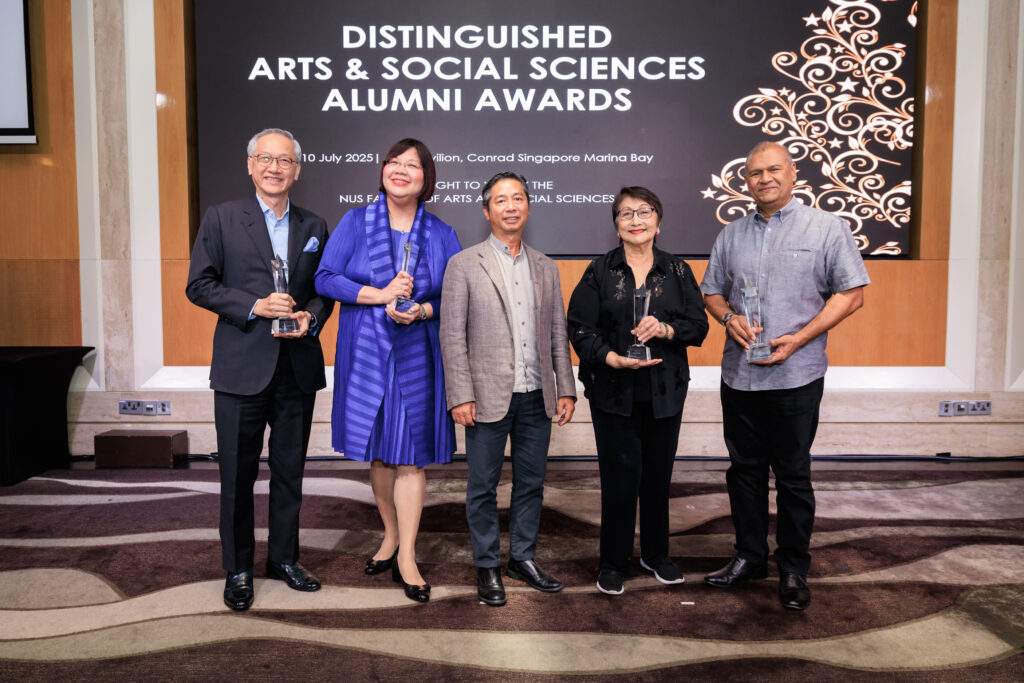
From food heritage to public leadership: FASS Alumni who left their mark on Singapore society
This year's award recipients have left their mark in areas ranging from Peranakan cuisine and diplomacy to family violence intervention and academic leadership.
Widely regarded as the grande dame of Singaporean cooking, Ms Oon began her career as an arts and music critic before pioneering a food column that launched her decades-long career as Singapore's leading food writer. She opened her first Peranakan restaurant in 1993, and today, the "Violet Oon Singapore" restaurant group is synonymous with heritage cuisine, with iconic outlets like Violet Oon Singapore at Jewel Changi Airport. As Singapore's food ambassador, she led national chef delegations at international culinary festivals and her accolades include being inducted into the Singapore Women's Hall of Fame (2016) and receiving the Singapore Tourism Board's Lifetime Achievement Award (2019).
Mr Tan is Singapore's Special Envoy for Arctic Affairs and Non-Resident High Commissioner to Canada. He has built a distinguished career in public service, diplomacy, and civic leadership. From 2009 to 2020, he served as Senior Parliamentary Secretary and Minister of State in several ministries, including the Ministry of Foreign Affairs and the Ministry of Culture, Community and Youth. He was also a Member of Parliament from 2006 to 2020. Mr Tan held key community and cultural leadership roles, including CEO of Business China (2007 to 2009), where he strengthened Singapore-China ties. For his longstanding service, he was awarded the Public Service Medal in 2002.
Mr Ishak served in the Singapore Armed Forces (SAF) for over 29 years, rising to the rank of Brigadier-General and playing a pivotal role in transforming SAF's training systems and leadership development. He later held senior roles in private firms that focused on defence solutions and regional growth. He is now Singapore's Non-Resident High Commissioner to Pakistan, and chairs both the Families for Life Council and the National Maritime Safety at Sea Council. He is also Principal Consultant at i-Grow Partners Pte Ltd, where he has been a certified coach appointed by the SAF to facilitate team leadership and development since 2016. He received the Public Administration Medal (Military) in 2008 and the Public Service Medal in 2023.
A social work veteran for over 30 years, Dr Nair began her career in 1987 at the Ang Mo Kio Family Service Centre (FSC), transforming it in 17 years into a model for other FSCs to follow. In 1999, she co-founded the Centre for Promoting Alternatives to Violence (PAVE), Singapore's first one-stop specialist centre for family violence, which now manages around 2,000 cases annually. Beyond frontline work, Dr Nair has nurtured future social workers through research and teaching at the NUS Department of Social Work, and has served on national bodies such as the Council of Presidential Advisers. Her many accolades include the Outstanding Social Worker Award (1998) and the Public Service Star (2022).
Prof Low is President's Chair Professor in Education (Applied Linguistics and Teacher Education) and Dean of Academic and Faculty Affairs at the National Institute of Education (NIE), Nanyang Technological University. A leading voice in teacher education, applied linguistics, and educational policy, she has shaped NIE's strategic directions through initiatives like "A Teacher Education Model for the 21st Century. For her dedication, she received the Public Administration Medal (Bronze) in 2012. Internationally, she was recognised for her exemplary scholarship by the Academy for Leadership in Teacher Education (ALiTE) at the University of Hong Kong in 2021, and has been selected as the President-Elect of the International Academy of Education (IAE) in 2024.
The recipients were presented with their awards at a simple ceremony at Conrad Singapore Marina Bay. Joining to celebrate the occasion with them were 56 family and friends of the honourees, as well as FASS staff and faculty.
Click here for more information on the award recipients.
This story first appeared on NUSNews on 11 July 2025.
Disruptive behaviors, antisocial attitudes, and aggression in young offenders: Comparison of Adverse Childhood Experience (ACE) typologies
April is National Child Abuse Awareness Month, dedicated to globally raising awareness about children’s needs, safeguarding them from harm, and ensuring their rights are protected. Childhood and adolescence are crucial developmental stages that can be profoundly affected by adverse childhood experiences (ACEs) such as abuse, neglect, and familial dysfunction. The World Health Organization (WHO) defines ACEs as intense and frequent sources of stress encountered during childhood. Children who experience ACEs are at greater risk of developmental delays, which can influence behavioural outcomes such as the trajectories of offending and delinquency in youths.
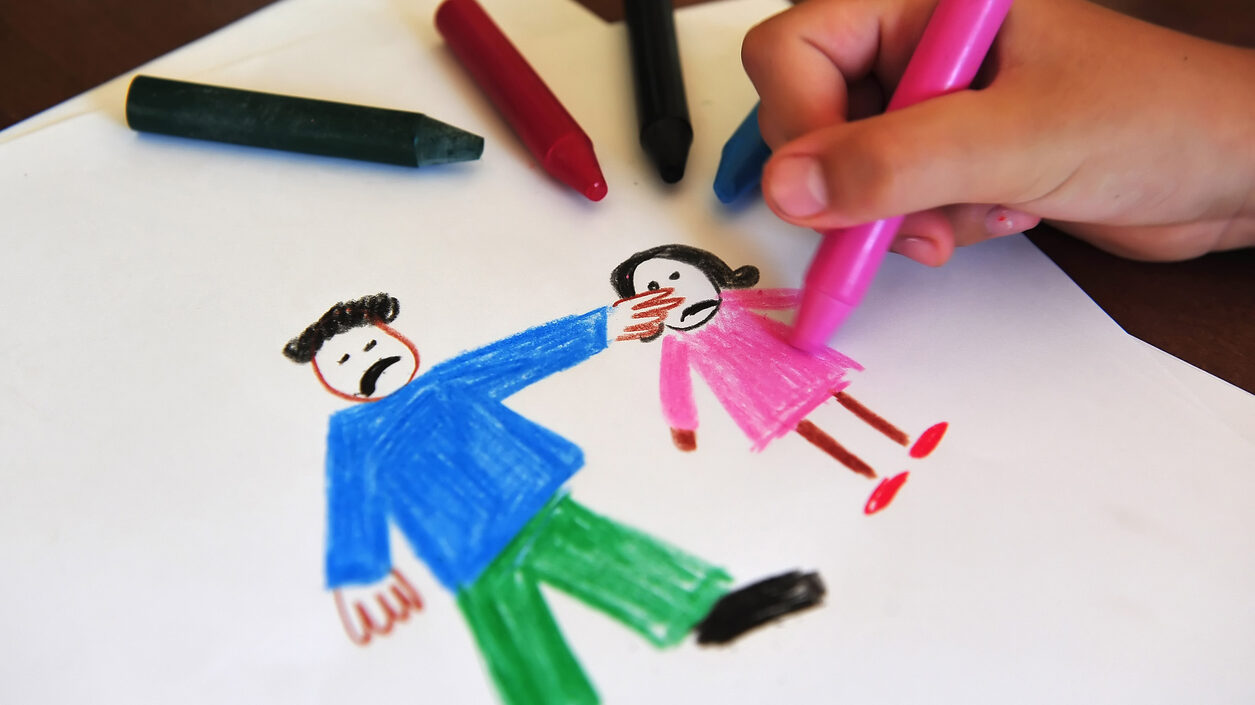
Publication by A/P Lee Jungup
We are pleased to share that A/P Lee Jungup from the NUS Department of Social Work has co-authored the article, "The impacts of forum theatre in social work practice: A scoping review" together with Mr David Puvaneyshwaran, an alumnus from the NUS Department of Social Work (Master of Social Sciences - Social Work by Research), and A/P Peilin Liang from the NUS Department of English Language and Literature. This is an Open Access article. See below for the link to the journal article. Puvaneyshwaran, D., Liang, P., & Lee, J. (2025). The impacts of forum theatre in social work practice: A scoping review. The British Journal of Social Work, bcaf055. https://doi.org/10.1093/bjsw/bcaf055
Mapping technology-facilitated sexual violence in Singapore
Sexual Assault Awareness Month (SAAM), observed annually in April, is dedicated to raising public consciousness and enhancing educational initiatives aimed at combating sexual violence. While significant progress has been made in addressing physical forms of sexual assault, the rapid rise of technology and digital platforms has led to a new frontier: technology-facilitated sexual violence (TFSV). TFSV encompasses a broad range of harmful and aggressive sexual behaviours perpetrated through information and communication technologies. TFSV disproportionately affects marginalised groups, particularly women and gender-nonconforming individuals, highlighting the digital harms these communities face daily. In ‘Mapping Technology-Facilitated Sexual Violence in Singapore’ (Research Handbook on Social Media and Society, 2024), Dr. Shivani Gupta (NUS College), Francis Luis Medado Torres, Sharon Yvette Xiomara Rosamor 'n Doen (both NUS Communications and New Media), Associate Professor Jungup Lee (NUS Social Work), Associate Professor Bimlesh Wadhwa (NUS Computing), and Assistant Professor Michelle Ho (NUS Communications and New Media) delve into this issue within the context of digitally advanced Singapore.
Employing feminist methodology—grounded in the lived experiences of women and privileging their perspectives—alongside digital ethnography, the authors examined TFSV as a pervasive and socially harmful discourse. The study focused primarily on social media, text, and video-based platforms, enabling the researchers to trace and observe digital data while avoiding the re-traumatization of TFSV victims-survivors. For example, online participant observation was conducted on platforms like Reddit, Instagram, and NUSWhispers, a blog commissioned by NUS undergraduates for anonymous discussions about university issues. This approach allowed the authors to gain deeper insights into public and sexual violence survivors’ perceptions of TFSV, while maintaining anonymity, and to explore how ideologies and cultural norms shape these perceptions. Key cases analysed included Monica Baey’s experience with voyeurism and the SG Nasi Lemak Telegram group, which shared explicit pictures of women.
In parallel with online observation, the authors conducted digital interviews with victims-survivors, enhancing security by allowing interviewees to switch off their videos, thereby minimising the risk of recognition and re-traumatisation. The digital format also enabled interviewees to articulate their understanding of TFSV with immediate access to the internet and social media, allowing them to illustrate their experiences with screenshots and data. These interviews revealed the everyday nature of TFSV and the persistent fear of being unable to erase digital traces, underscoring the long-lasting impact of such virtual misdemeanours.
The authors conclude by emphasising the alarming rise of TFSV cases in Singapore, highlighting the urgent need to bring this issue into mainstream discussion and recognize it with the same seriousness as non-digital forms of sexual violence. They stress the importance of scholars respecting the sensitivity of these cases and incorporating appropriate methods to prevent further harm to victims-survivors.
Read the chapter here.

Differential Predictors of Problematic Internet Use and Problematic Video Gaming Among School Children: A 2-Year Longitudinal Study
The prevalence of internet and multimedia gaming tools has given rise to a wave of problematic internet use (PIU) and problematic video gaming (PVG) among youths today. These phenomena often manifest in overindulgence, potentially leading to addiction and impairing essential functioning. The study ‘Differential Predictors of Problematic Internet Use and Problematic Video Gaming Among School Children: A 2-Year Longitudinal Study’ (Technology, Mind, and Behaviour, 2023) by El-Lim Kim (Franklin & Marshall College), Douglas A. Gentile (Iowa State University), Associate Professor Hyekyung Choo (NUS Social Work), Albert Kienfie Liau (Positiv Singapore), Dongdong Li (National Council of Social Services, Singapore), and Katherine Fata Angeline Khoo (Nanyang Technological University) investigates whether PIU and PVG should be considered distinct patterns of addictive behaviour. This research focuses on identifying common and unique correlational predictors of PIU and PVG, examining physical and cognitive factors among school children in Singapore, ranging from Primary 3 to Secondary 5. This study is part of a broader research project evaluating the effectiveness of local cyber-wellness programs.
The study found that PIU and PVG are more prevalent among boys compared to girls. Both PIU and PVG are associated with emotional distress, loneliness, and anxiety, and they tend to develop in children with high impulsivity. Children experiencing these symptoms often use the internet and gaming to regulate their negative moods, potentially leading to dysfunctional emotional skills. Additionally, poor parental attachment and lack of warmth at home are linked to both disorders.
However, the study also highlights differences between PIU and PVG. Older children and those exposed to the internet at a younger age are at a higher risk of developing PIU, though this is not necessarily the case for PVG. Also, children who score high on sensation-seeking and low on online self-regulation are more likely to experience PIU but not PVG, suggesting potential conceptual distinctions between the two.
Despite these differences, there is insufficient evidence to classify PIU and PVG as entirely separate disorders, as the similarities in their risk and protective factors are more significant than the differences. The researchers call for additional studies on parental interventions to mitigate the risk of behavioural addictions to technology. This is particularly important given the introduction of personal learning devices (PLDs) to all secondary school children in Singapore from the end of 2021. It is crucial for schools and parents to continue monitoring and supporting children to prevent and address these dysfunctional behaviours in the long term.
Read the article here.

Technology and collaboration key to navigating the ‘multiverse’ of social work
IN BRIEF | 10 min read
- The Symposium "From Heritage to New Frontiers: Celebrating the Past and Reimagining the Future of Social Work" discussed how social work education and practice should evolve to address emerging needs and vulnerabilities in society in the face of AI and technology disruptions.

It can be challenging for some underprivileged families to receive the right support. But ComLink+, a government initiative that uplifts households with young children living in rental flats, is bridging the gap.
By harnessing data across government and the social service sector, ComLink+ gives social workers a clearer picture of these families' needs, allowing them to help them more effectively.
The platform was cited by Minister for National Development and Minister-in-Charge of Social Services Integration Mr Desmond Lee as an example of how a tighter integration of support systems is necessary to address the growing complexity of social issues. But dealing with the future of social work will require more than this.
"Technology will also play an important part in shaping the profession through education and skills development," said Mr Lee, who was speaking at a symposium in November titled "From Heritage to New Frontiers: Celebrating the Past and Reimagining the Future of Social Work", organised by the NUS Department of Social Work.
Adopting such digitalisation is vital given the complex "multiverse" which consists of different realities for different people with different needs and preferences, added panellist Mr Martin Tan, Chief Executive Officer of non-profit group, The Majurity Trust.

To navigate this new multiverse, social workers should ensure they have the most up-to-date skills, said speakers and panellists at the symposium held at the NUSS Kent Ridge Guild House.
"While staying rooted to the core mission of social work, we should be ready to embrace change and continuously seek new knowledge and skills to remain relevant," said Associate Professor Lee Geok Ling, Head of Department of Social Work.
"To achieve our shared goals, innovation, partnerships and a forward-looking, lifelong learning mindset are necessary," she added.
To this end, the University is updating its social work courses to incorporate more digital technology. For instance, the Department of Social Work has introduced new courses for its undergraduate programme, such as "Social Work and Technology of the Future" and "Digital Technologies in Children and Youth Services". The Department of Social Work's Continuing Professional Education unit is also planning to launch four new tech-related courses focusing on AI, design thinking, data analysis, and working with ChatGPT.
Announcing these new courses at the symposium, NUS Deputy President (Academic Affairs) and Provost Professor Aaron Thean said, "These courses will empower social workers to harness technology for enhanced decision-making and efficiency, preparing future social workers and current practitioners with vital digital skills."
The new courses build on existing NUS initiatives such as Blended Learning 2.0, which integrates traditional face-to-face teaching with technologies such as virtual reality simulations, allowing social work students to practise clinical skills in scenarios that mimic the real world.
"Social work is not just a profession, but also a calling that requires resilience, compassion, and innovation to navigate today's rapidly changing world," noted Prof Thean. "Social workers must evolve to remain effective and relevant amidst technological changes and uncertainties."
It is a view shared by other symposium speakers such as Associate Professor Teo Poh Leng, Head of Social Work Undergraduate Programmes at the Singapore University of Social Sciences; and Dr Vincent Ng, Chief Executive Officer of social service agency Allkin Singapore Ltd.
They believe that social workers, similar to employees in other industries, "need to have a lifelong learning mindset". "At an organisational level, we must provide opportunities for people to learn and grow. At the individual level, the responsibility for learning has to be personal," added Dr Ng.
A crucial skill is design thinking, one of the focus areas of the new NUS courses, highlighted several speakers including Mr Benjamin Png, Product Manager and Policy & Transformation Specialist at Open Government Products, an experimental government team building technology for public good.
"In today's world where things are a lot more complicated than before, it is worthwhile to start using design thinking to see how we can break problems down into smaller pieces and test out solutions, rather than commit wholeheartedly to one single solution that often doesn't really work," he explained.

Besides tapping technology, the social work industry also requires greater collaboration for greater impact, observed panellists and speakers.
"We try to work with the government to rethink policy, but there are market forces and businesses that play a part too. Then you have advocacy groups trying to campaign, and also intermediaries like us who are trying to connect the dots," said Mr Tan from The Majurity Trust.
"But the key is this: the world is too complex today for any one of us to handle things on our own." he stressed.
Minister Lee also called for much tighter integration of support around families with complex needs.
"We need to develop a stronger understanding of the broader social landscape and build extensive networks of partners with social workers at the core, so that we can achieve much closer collaboration between agencies and community organisations," he said.
A way forward is to be more business-minded about social work, said Ms Wu Mei Ling, General Secretary and Chief Executive Officer of the YMCA of Singapore.
"Business models and tools can be and are being used for the delivery of social services," she said, citing the World Business Council for Sustainable Development and the Dow Jones Sustainability Group as examples.
This, she added, can help to "build trust and collaboration" with other members in the sector through a "shared thinking and shared language".
Singapore can also draw inspiration from other countries. "Let the world teach Singapore," said Professor Irene Wong, S R Nathan Professor of Social Work at NUS, and Professor at the University of Pennsylvania.
She noted how a German case study on intimacy among people with intellectual disabilities had spurred "much animated and engaging discussion" among her students, giving them a fresh perspective on a topic that is not widely discussed in Singapore.
Social work is about peopleEven as the social work profession prepares for a complex future shaped by technological changes, one thing remains unchanged: its human core.
"Technology cannot replace the personal touch and human instinct of our social work professionals," said Minister Lee.
"We should embrace technology and AI with a critical and ethical mindset, and harness its power to amplify our impact while remaining true to the core values of social work and mindful of the sharp edges that technology can bring."
NUS, for instance, is embracing this approach and has a rich legacy in this industry. Since 1952, its Department of Social Work has produced outstanding social workers who have made an impact in raising the bar and professionalising the industry.
To recognise NUS Social Work alumni who have made sustained and major contributions to social work education and practice, the Ann Wee NUS Social Work Alumni Award was set up in 2015 in honour of the late Mrs Ann Wee, NUS Department of Social Work's longest serving Head from 1968 to 1986.
This year, the following alumni were recognised with the 2024 Ann Wee NUS Social Work Alumni Award.
- Corinne Ghoh, Associate Professor (Practice), Department of Social Work at NUS Faculty of Arts and Social Sciences
- Leow Sok Fen, Principal Medical Social Worker, Tan Tock Seng Hospital
- Tabitha Ong Yen Ping, Director, Adult Protective Service, Rehabilitation and Protection Group, Ministry of Social and Family Development
- Ian Peterson, Director (Family & Community Services), Care Corner Singapore Ltd
- Keith Tan, Master Medical Social Worker, Singapore General Hospital

This story first appeared on NUSnews on 6 December 2024.
Touching the Lives of Those Young and Old, Through Community Service
IN BRIEF | 10 min read
- Embodying the University's spirit of service to country and society, members of the NUS Community Service Club (NUS CSC) have been key drivers of volunteerism among our student population over the past 22 years.
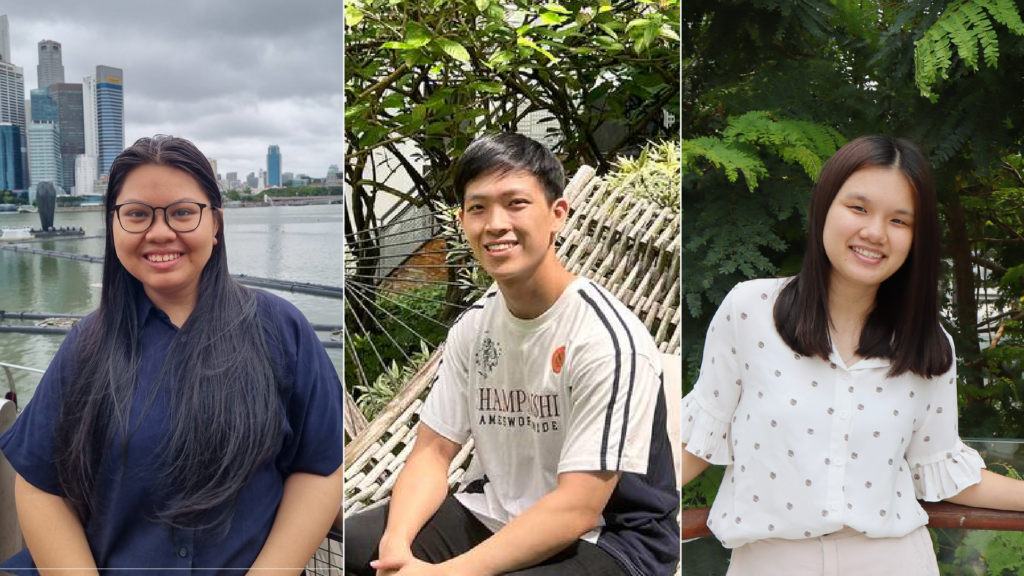
Whether it is providing academic support to vulnerable youth or befriending seniors living alone, heartwarming stories of NUS students working to uplift local and regional communities abound each year. Embodying the University's spirit of service to country and society, members of the NUS Community Service Club (NUS CSC) have been key drivers of volunteerism among our student population over the past 22 years.
Through NUS CSC programmes, more than 1,300 NUS students clocked close to 15,500 volunteer hours in the last academic year. Three of the club's members share what inspired their passion for service, the various ways they are making a difference in the community and how their efforts have enriched the lives of many - including their own.
Dewi Murni Bte Musa: Leading change through community service
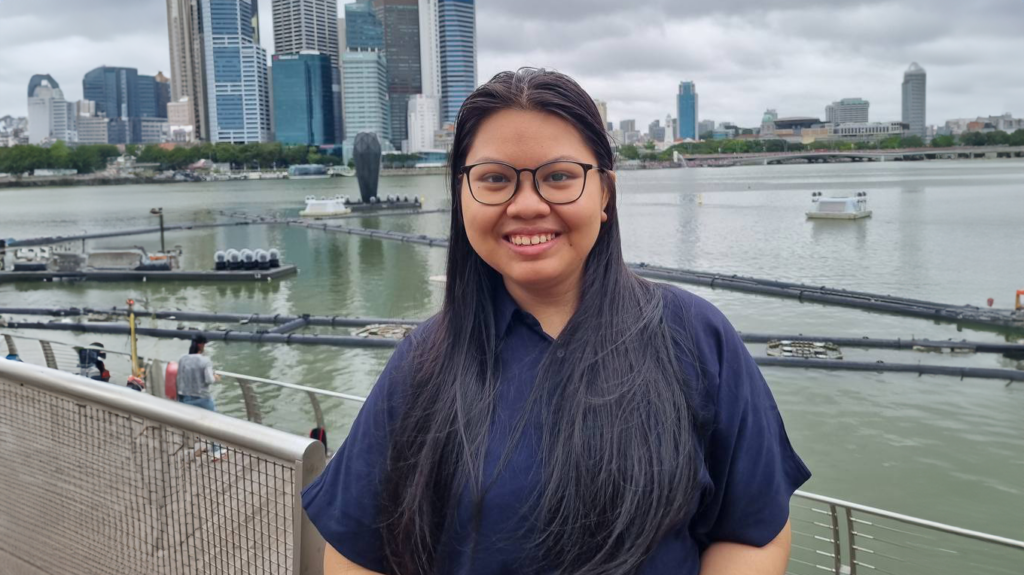
Dewi Murni Bte Musa, a Year 4 student at the NUS Faculty of Science, began volunteering at the age of 16. But it was a seemingly ordinary day chaperoning primary school students for a national education show in 2018, held in conjunction with Singapore's National Day Parade, that ignited her passion for community service.
At the end of the show, a primary schooler, beaming with excitement, thanked her for the day he had and told her that he aspired to be like her in the future. "It was a touching moment that made me realise the power of making someone's day," said Dewi, recalling that pivotal moment.
Since then, Dewi has dedicated herself to various community projects, both within and beyond Singapore. Now, in her fourth year at NUS CSC, Dewi has been elected the Club's president, and set her sights on making an even bigger impact.
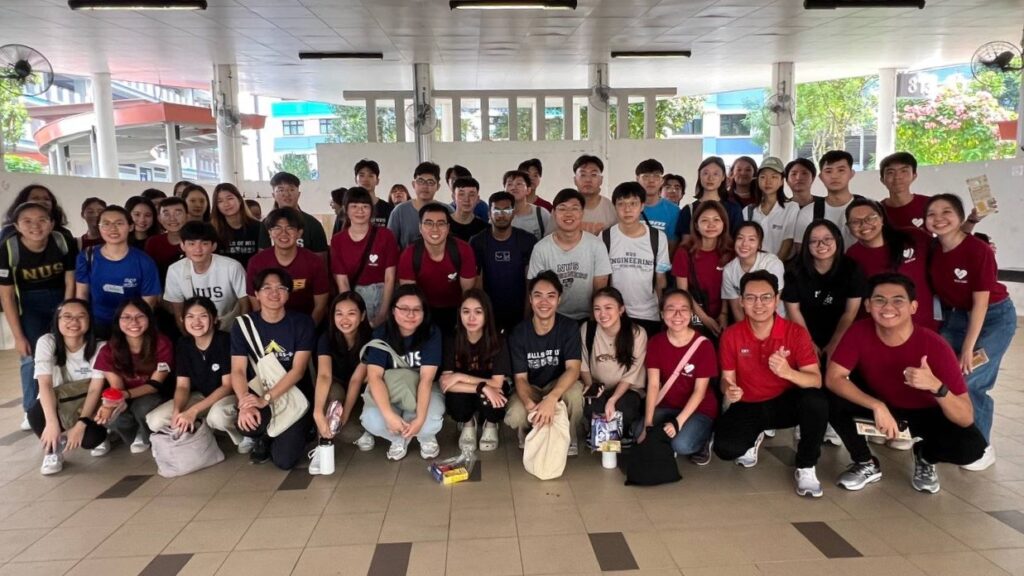
Reflecting on her time at NUS CSC, Dewi shared that her involvement in various programmes and projects played a significant role in her personal development. For example, as former Assistant Project Director, Dewi led a team of nearly 160 volunteers in Project C.A.N. XXI to prepare specially curated care packs containing food and essential items for low-income households in Choa Chu Kang and Tampines. The massive undertaking sharpened her organisational skills and taught her the importance of adaptability in team dynamics.
Yet, it was her moments of connection with community members at one NUS CSC Day that stood out most vividly to her. The annual event brings together NUS CSC's four main sectors - children and youth, persons with intellectual disabilities, the elderly and those with life-limiting illnesses and healthcare. As a game master for the day, Dewi met a secondary school student from one of their partner organisations who told her that it felt like a dream to come to NUS. Her words struck a chord with Dewi who was reminded of her own childhood, when a university education seemed like an unattainable dream. "I'm the first in my extended family to attend university, so growing up, I didn't really have anyone to talk to about getting a higher education," she said. "But I was so happy that through CSC Day, we were able to give this young girl that opportunity," she added.
Empowerment for youth and children is a cause that resonates with Dewi deeply, and she aspires to one day, build a passion project working with schools in rural areas, particularly in Indonesia, where she is fluent in the language and familiar with the culture.
As the incoming president of NUS CSC, Dewi envisions a club that not only mobilises volunteers but also fosters leadership and personal growth for its members. "We want to ensure that our volunteers are adequately prepared before they engage with community members and cultivate an environment where they can thrive as volunteer leaders," she said. "I also want to see our club evolve to meet the changing needs of both our volunteers and the community."
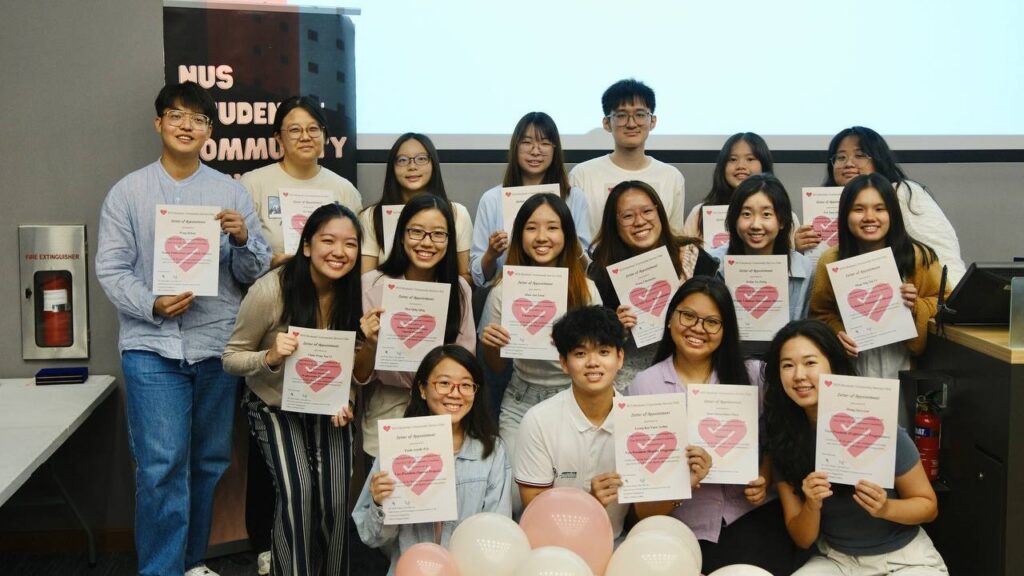
For those considering joining NUS CSC, Dewi encourages them to embrace the experience with an open mind and a willingness to learn. "It's all about stepping out of your comfort zone and discovering the impact you can make," she says, inviting new volunteers to share in the transformative power of community service.
Lim Si En: Painting lives, one home at a time
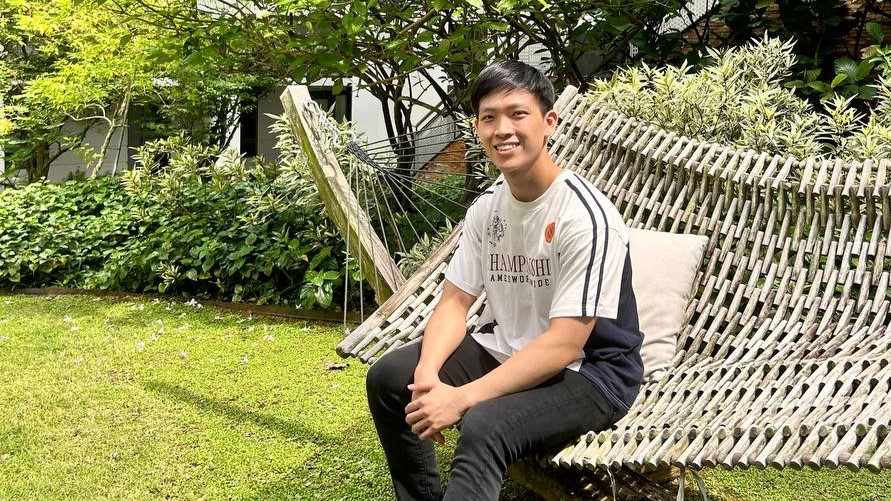
Like Dewi, Lim Si En, a Year 3 student at the NUS Faculty of Arts and Social Sciences (FASS), began his volunteering journey in junior college, tutoring primary school students and volunteering his time at national events like the National Day Parade. His passion for service led him to join NUS CSC in his first year at NUS. "Volunteering called out to me more than other CCAs," he recalled, highlighting the breadth and accessibility of projects that resonate with his desire to help others.
In his second year, Si En took on the role of Project Director for NUS CSC's annual Paint-A-Home initiative, pouring his heart into every detail of the six-month-long project, from recruiting committee members to collaborating with partner organisations. "Seeing our labour pay off was incredibly fulfilling," he says, reflecting on the tangible improvements made in the homes they painted.

For Si En, the initiative was more than just applying a fresh coat of paint; it was about building relationships with community members to understand their needs and preferences, ensuring that his team's work truly reflected the desires of those they served.
"The initial visit helped break the ice and build rapport," he explained. This rapport was crucial, as many of the community members they assisted were elderly or from low-income families, facing various challenges. As Si En and most of his team members had no prior experience with painting, they contacted an organisation for painting lessons. The team also held a practice run, painting the multipurpose hall at the PERTAPIS Centre for Women and Girls, which kindly offered them use of the space for a trial session.
"Once we finished painting, the visible improvement felt great. We knew we made a difference," he shared, acknowledging that their work wasn't perfect but was heartfelt and impactful.

Si En's commitment to the community extends beyond NUS CSC. As a Volunteer Welfare Officer with the Ministry of Social and Family Development since 2023, he conducts check-ins with families at risk of child neglect. "It's an eye-opening experience," he admits. "Even as I help others, I learn so much about the challenges they face."
Hope Sng Xin Le: A heart for service

Taking over the reins from Si En at Clementi Youth Sparks this semester is Hope Sng Xin Le, a Year 2 NUS FASS student who embodies the spirit of service and compassion. Specialising in Social Work and Political Science, Hope's journey into the realm of social service is deeply rooted in her own experiences and the values instilled in her by her family.
Growing up, Hope faced some challenges in her childhood. "My grandparents helped me through that tough time," she recalled, citing this early experience as the spark that ignited her passion for social work.
Another source of inspiration was a documentary that highlighted how exposure to domestic violence can ripple through generations. "It's important to break the cycle of violence," she remarked.
Hope's academic pursuits complement her passion. Studying Political Science gives her insight into governmental structures and resource allocation, while her Social Work studies provide a ground-level perspective on societal issues. "Social work is where my calling is," she says, expressing a desire to join Child or Adult Protective Services upon graduation to safeguard vulnerable individuals and families.
Hope's commitment to volunteering blossomed at NUS, where she joined NUS CSC in her first year. At Ethelontêr, the NUS CSC's orientation camp for incoming NUS students, she was introduced to various volunteer opportunities, including Havenue, a programme supporting individuals with life-limiting illnesses. "Havenue is my happy place," she states with warmth, volunteering there two to three times a month.
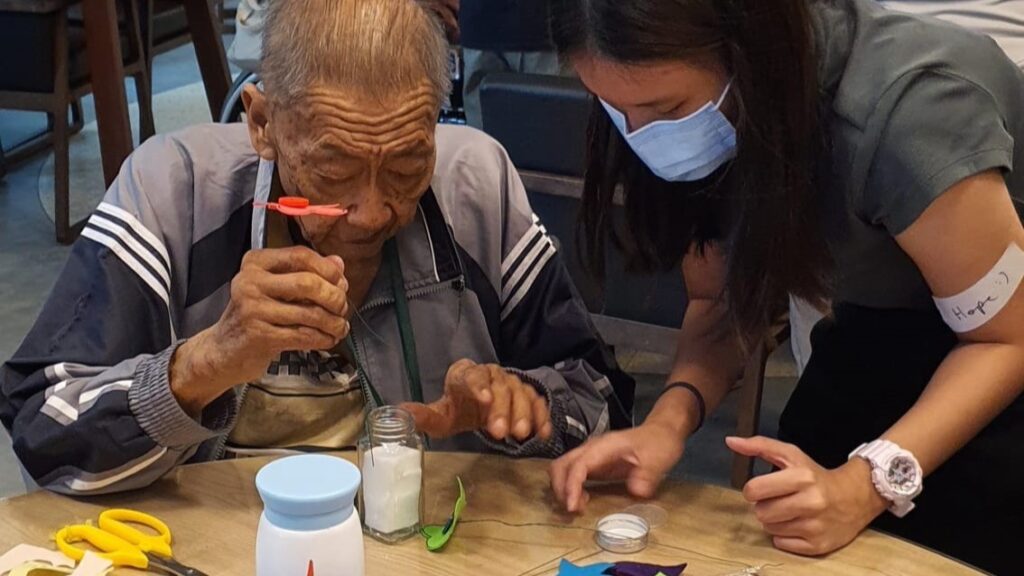
Her work at Havenue holds a profound significance for her. Engaging with the elderly patients has reshaped her perspective on life and death. One particularly poignant memory is of Uncle Chew, a vibrant 90-year-old she befriended during his last days. His passing, along with that of another patient, reminded her of life's fragility and the importance of cherishing every moment. "These experiences have shown me how precious life is," she reflects, prompting her to be more expressive of her love and appreciation for those around her.
In Academic Year 2023/2024, Hope served the highest number of volunteer hours among all NUS CSC volunteers, staggering her time between seven projects throughout the year. Pulling off the 2024 edition of Ethelontêr as Assistant Project Director is something she is particularly proud of and she expressed her deep appreciation for her fellow organising committee members for being a strong support system during the five-month project where things were 'fast and furious'.
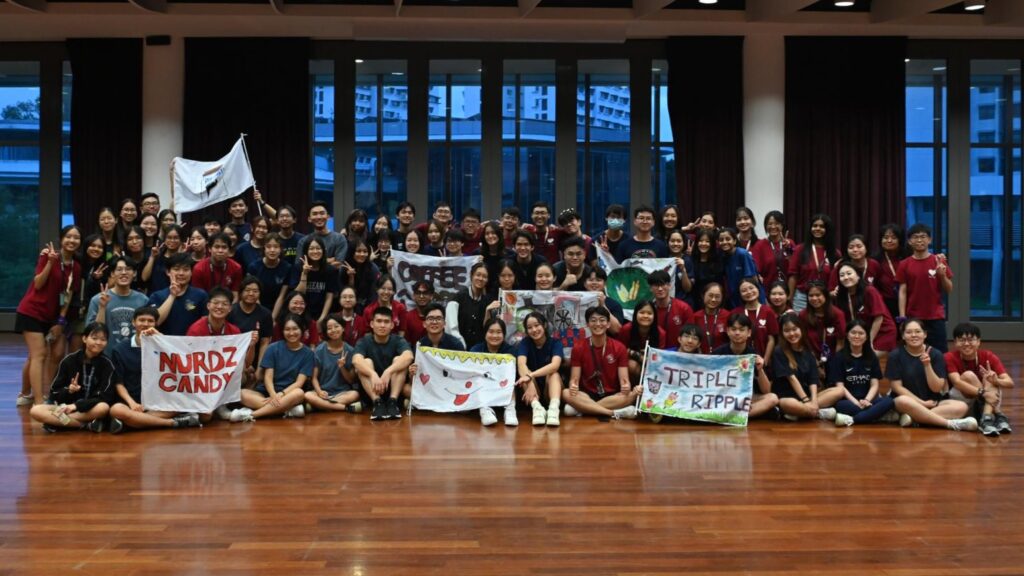
"Prior to university, I thought of volunteering as something that was part of the school requirements. But over the past year, I realised my deeper calling to serve the community. It has strengthened my desire to pursue social work as a major and has been a source of joy and meaning in my life," said Hope.
This story first appeared on NUSnews on 12 November 2024.
Family Environment, Loneliness, Hope, and Subjective Well-Being of Asian Older Adults
1 October was designated the International Day of Older Persons (IDOP) by the United Nations General Assembly in 1990. Ever since, it has been commemorated yearly by countries around the world, including Singapore. Initiatives and celebrations have been organised jointly by the National Council of Social Service (NCSS) and RSVP Singapore, the Organisation of Senior Volunteers. While efforts have been made to improve the well-being of older adults, many continue to face issues such as loneliness and poor family cohesion as they progress into old age. In ‘Family Environment, Loneliness, Hope, and Subjective Well-Being of Asian Older Adults’ (The International Journal of Aging and Human Development, 2024), Associate Professor Srinivasan Chokkanathan (NUS Social Work) looks into the challenges faced by older adults and considers the various factors that influence their subjective well-being (SWB). A total of 345 older adults, ages ranging 60 and over, were surveyed for the study. The survey aimed to understand how family dynamics, hope, and feelings of loneliness interplay and subsequently, impact the participants’ SWB. SWB was measured through indicators like life satisfaction, happiness, and an absence of negative emotions. The results were evaluated using structural equation modelling, which indicated that the family environment significantly impacted participants’ SWB, both directly and indirectly. An association was found between positive family environments, lower loneliness levels and higher levels of SWB. Positive family environments also improved participants’ feelings of hope and optimism towards the future. A/P Chokkanathan notes that these findings have significant policy implications, as identifying these associations can assist policymakers in crafting interventions that will help mitigate loneliness, enhance mental resilience, and promote an increase in overall SWB as adults head into old age. Read the article here.
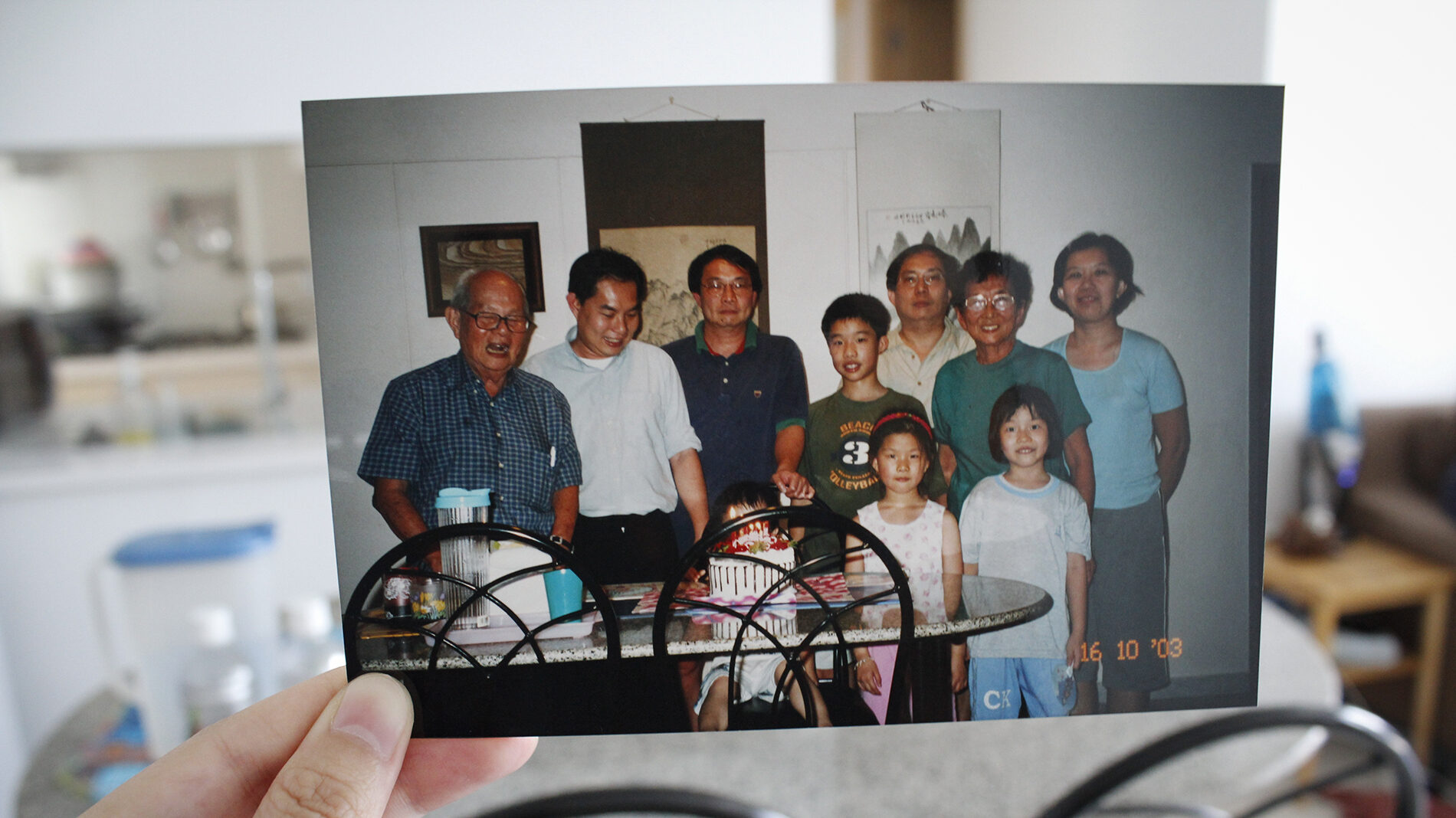
Family's Financial Situation, Burdened by Debt, has led to Aspirations of Becoming a Social Worker
IN BRIEF | 10 min read
- A feature on social worker and NUS alumnus Francis Goh Jiang Hong (NUS Social Work '24).
Click through image below to read this piece.

This story first appeared in Berita Harian and NUSNews on 25 July 2024.
Third Singapore Social Work Practice Research Conference 2024: Advocating for Social Inclusiveness of the Vulnerable
IN BRIEF | 10 min read
- The Third Singapore Social Work Practice Research Conference aimed to foster a deeper understanding of the challenges faced by the socially vulnerable and the implementation of inclusive practices to improve their lives.
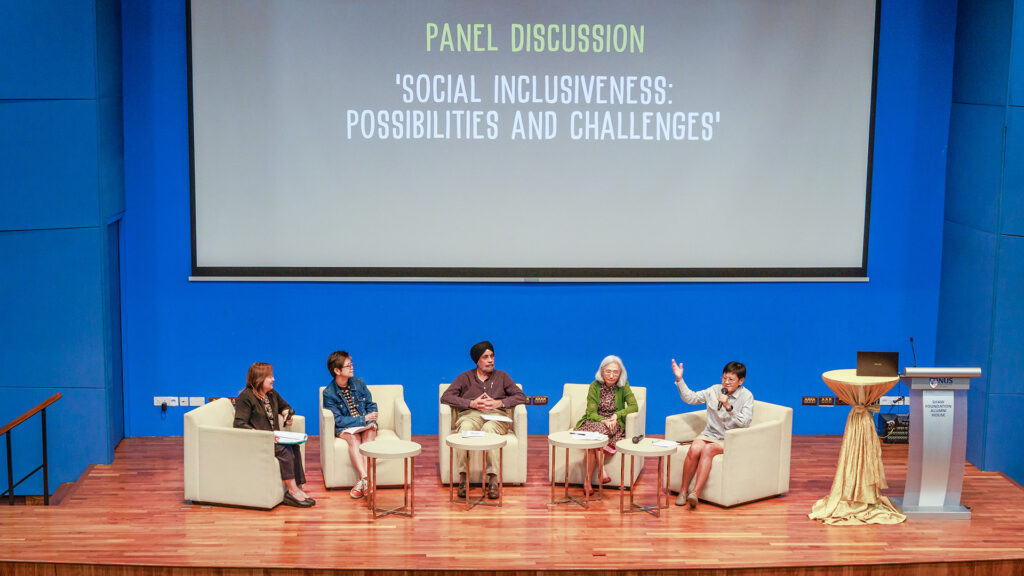
The social inclusion of vulnerable groups in society is becoming an increasingly salient issue in a world grappling with the challenges of AI, ageing populations and climate change, which can exacerbate existing social inequalities and create new barriers to inclusion. In these circumstances, evidenced-based social work research is critical to identifying effective interventions and strategies to improve social services and policies.
Against this backdrop, the Department of Social Work at the NUS Faculty of Arts and Social Sciences organised the Third Singapore Social Work Practice Research Conference themed "Social Inclusiveness of the Vulnerable" on 7 June. It gathered a diverse mix of about 250 representatives from the social service sector, voluntary welfare organisations, government ministries, and academic institutions to discuss their experiences and foster a deeper understanding of the challenges faced by the socially vulnerable, and the implementation of inclusive practices in social work to improve their lives. The event was generously sponsored by the Mrs Lee Choon Guan Endowed Research Fund.
The importance of research and collaboration to inform social work practices
In his welcome address, Mr Keith Chua, Co-trustee of the Mrs Lee Choon Guan Trust Fund, emphasised the importance of investing in research and collaboration in advancing the social work sector in Singapore.
"I encourage all social service agencies to see [practice research] as investing firstly in yourselves, in your beneficiaries and your stakeholders, and along with this, the enhancement of training for future social work professionals, which will ultimately benefit current and future generations of Singaporeans," he said.
In his speech, Guest of Honour, Mr Eric Chua, Senior Parliamentary Secretary, Ministry of Culture, Community and Youth & Ministry of Social and Family Development, highlighted the government's commitment to fostering an inclusive society and the crucial role of social work in achieving this goal.
He stressed, "To help social work practitioners deliver effective interventions, research, including practice research, is invaluable. Research provides evidence-based insights into the needs of our clients. It offers tools to evaluate our practices and policies and to enable us to tailor our approaches to meet societal needs."

Insightful discussions on social work practice research
A highlight of the day-long conference was the keynote address "Building a Research Programme on Social Inclusion: Implications for Practice Research" by Professor Irene Wong, S R Nathan Professor at the NUS Department of Social Work. She shared about a mixed-methods research programme that was conducted to enhance the social inclusion of persons living with mental illness in the US and China.
Prof Wong noted that social workers have an ethical responsibility and are in a unique position to promote the inclusion of the vulnerable. She also discussed the conceptual and methodological challenges in understanding and promoting inclusion, providing insights into incorporating inclusion as a fundamental aspect of social work practice.

Another highlight of the conference was the eight workshops which delved into topics such as enhancing mental health support for migrant workers in Singapore, the importance of employment as empowerment, sustainable caregiving, social services for sex workers, and divorce support for children. Participants engaged in lively discussions, exchanged best practices, and explored new strategies to enhance their work in the field.
"I saw how practice research removes the veil of invisibility of social impact and is able to enhance programme design and delivery, and even support macro-level service planning," conference participant and Registered Social Worker Mr Khoo Yi Feng shared. "Through mixed methods with human-centric culturally-appropriate research methodologies, I am inspired by how many agencies were able to articulate their impact cases from the ground up with participatory voices from clients, and these hold much promise on how I can articulate the real-world impact of workplace mental health interventions like supported employment."

In her closing speech, Head of the NUS Department of Social Work, Associate Professor Lee Geok Ling, expressed gratitude to all participants for their contributions. Emphasising the importance of continued collaboration and research in advancing social inclusiveness, she said, "The Department is excited about the long-term positive impact of such practice research as indigenous responses and creative answers are crucial in addressing the complex challenges faced by an ageing society, marginalised groups, and families in Singapore."
This story by the NUS Faculty of Arts and Social Sciences first appeared in NUSNews on 27 June 2024.
Ways of Being and Belonging: Integration, Identity, and Social Resilience of Cross-National Families in Singapore
Cross-national marriages have become commonplace in Singapore, making up almost a third of the marriages registered. The experiences of these cross-national families differ significantly from that of fully local families, with migrant spouses and children facing various challenges with regard to legal status, employment, and social and cultural integration. The difficulties of social and cultural integration are explored in the study ‘Ways of Being and Belonging: Integration, Identity, and Social Resilience of Cross-national Families in Singapore’ by Raffles Professor of Social Sciences Brenda S. A. Yeoh FBA (NUS Geography and Asia Research Institute), Associate Professor Esther Goh (NUS Social Work), Dr Theodora Lam (NUS Asia Research Institute), and Dr Bernice Lin Zhi Khoo (DSO National Laboratories). Hosted by the NUS Asia Research Institute and funded from 2022 to 2024 by the DSO National Laboratories Grant, the project explores the influence of daily behaviours on the intangible sense of belonging in cross-national families from a multi-disciplinary perspective. These cross-national families consist of a Singaporean and their foreign spouse. The study seeks to critically examine how everyday practices and social interactions, or ‘ways of being’ influence identity formation and the sense of ‘belonging’ within cross-national families. The researchers characterise integration as a combination of ‘ways of being’ and ‘ways of belonging’, looking into how these aspects of daily life affect the ability of migrant spouses and their children in establishing a sense of belonging. The researchers recognise integration as a complex series of daily processes occurring unevenly across structural, social, cultural, and civic/political domains. In the Singapore context, while the concept of integration has been explored substantially, it has predominantly been centred around the broader immigrant population. Hence, the study seeks to zero in on the challenges of cross-national families, specifically on the experiences of migrant spouses and their children. By including these voices in the literature, the researches intend to address this gap in the scholarship and integration, as well as expand upon existing research focused on the various socioeconomic classes of cross-national families in Singapore. The project also provides insights into the relationship between integration and family resilience, referring the families’ ability to bounce back in times of crises. Examining the integration experiences within cross-national families reveals a unique form of resilience that differs from that of local families. By drawing on the study’s formulation of integration, the research team looks into how integration, identity, and individual belonging provide a comprehensive and systemic perspective on resilience.
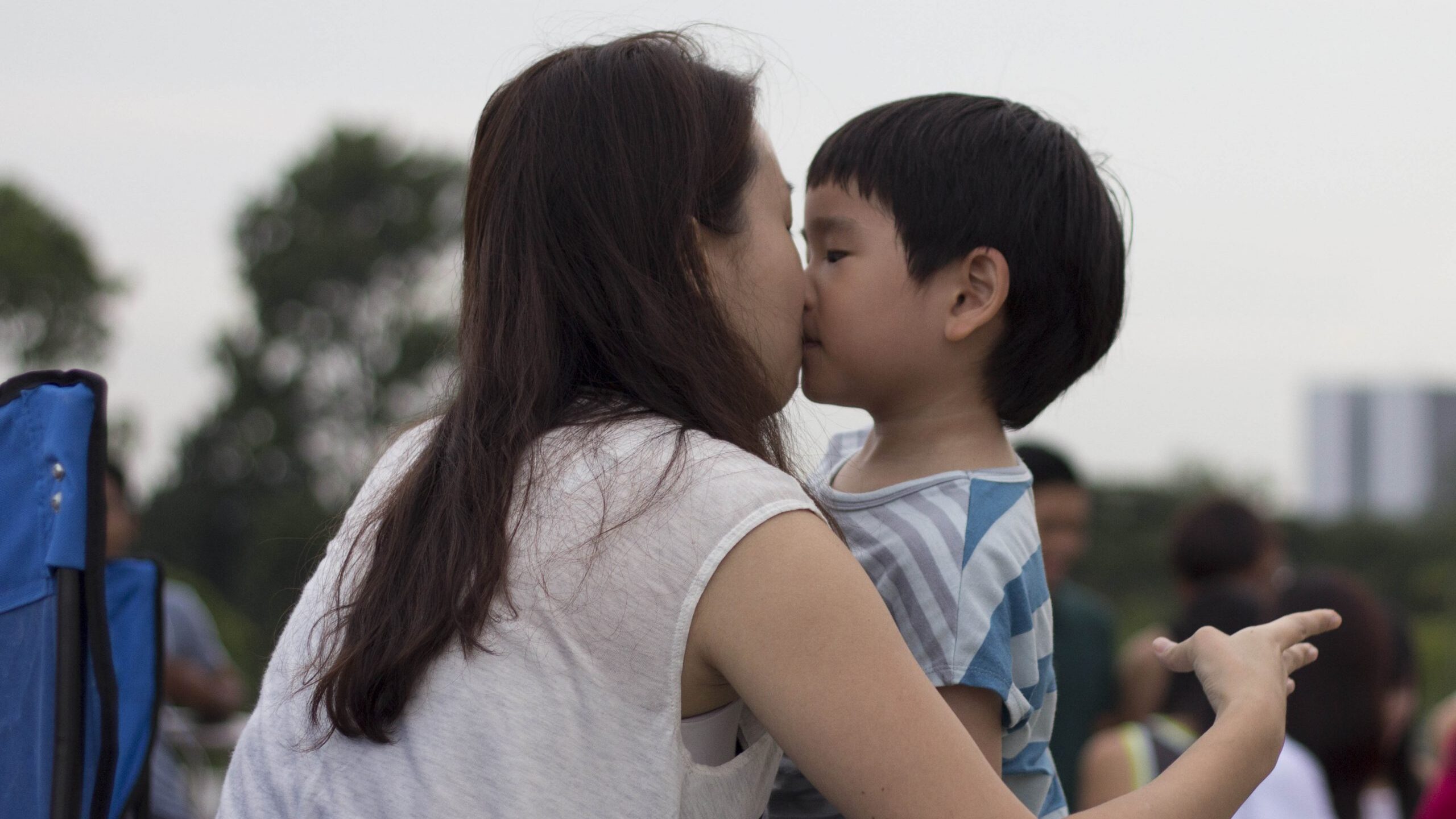
NUS Faculty of Arts and Social Sciences alumni honoured for contributions to public service, education, literature and the corporate sector
IN BRIEF | 10 min read
- The four awardees were Mr Bilahari Kausikan, an iconic veteran of diplomacy; Professor Paul Cheung, a highly regarded statistician; Ms Suchen Christine Lim, a critically acclaimed writer; and Mr Tan Yam Pin, a prominent businessman and corporate heavyweight.

The NUS Faculty of Arts and Social Sciences (FASS) paid tribute on 15 May 2024 to four eminent alumni for their outstanding contributions towards nation-building, growth of the university, the promotion of the arts and social sciences, and impact in the private sector. The four were Mr Bilahari Kausikan, an iconic veteran of diplomacy; Professor Paul Cheung, a highly regarded statistician; Ms Suchen Christine Lim, a critically acclaimed writer; and Mr Tan Yam Pin, a prominent businessman and corporate heavyweight.
Established in 2015, the Distinguished Arts and Social Sciences Alumni Award lauds notable FASS alumni who have made exemplary contributions to the nation, community, University, or the faculty, and who have dedicated themselves to the betterment and promotion of the arts and social sciences.
The trailblazers who inspire young generations of FASS students and alumni
In his speech, FASS Dean Professor Lionel Lim highlighted how each of the recipients has pursued their passions with tenacity and purpose. They have made an incredible impact in their respective fields, and have done so "with integrity, compassion, and a dedication to excellence," he said.
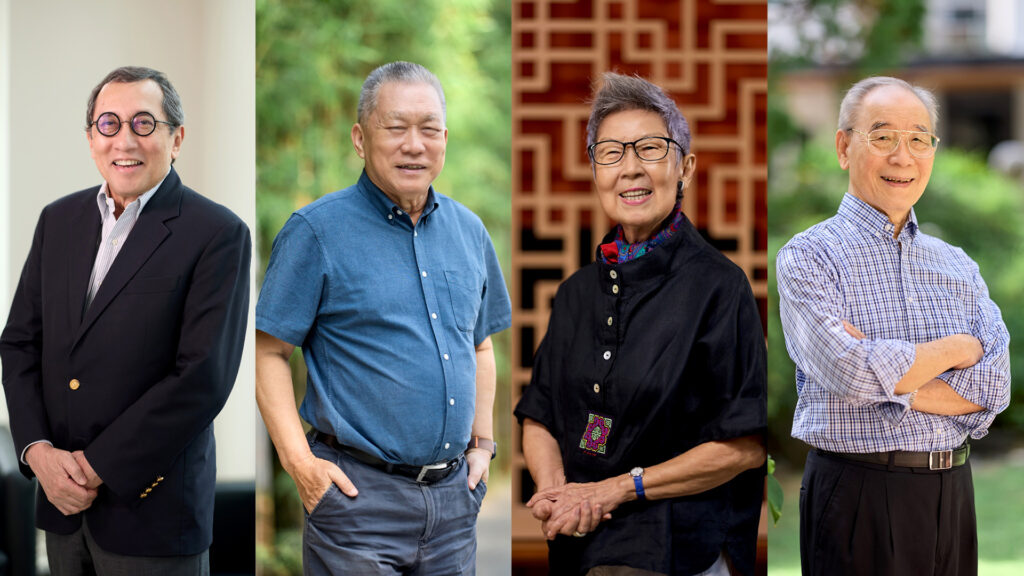
A diplomat for over three decades, Mr Kausikan has been an influential voice in shaping Singapore's positions on regional and international issues. His 37 years in the Ministry of Foreign Affairs (MFA) saw him serving in a variety of appointments at home and abroad, including as Ambassador to the Russian Federation, Permanent Representative to the United Nations (UN) in New York, and notably as the Permanent Secretary of the MFA from 2010 to 2013. He is actively engaged in ASEAN forums, facilitating dialogue, cooperation, and conflict resolution among member states. His articles and speeches, which provide thought-provoking analyses of regional issues, have influenced policymakers and scholars alike. He is currently Chairman of the NUS Middle East Institute.
Professor Paul Cheung is Director of the Asia Competitiveness Institute at the NUS Lee Kuan Yew School of Public Policy and is well-known for his pioneering research in the fields of official statistics, social planning, manpower and population. In a previous role as Chief Statistician of Singapore, he transformed the national statistical system - the 2000 Singapore population census was the first in Asia to make full use of population and business registers and the Internet to collect data. As Chief Statistician of the UN from 2004 to 2012, he played a pivotal role in developing the global statistical system and establishing an inter-governmental platform on Global Geospatial Information Management.
A 2023 Cultural Medallion winner, highly accomplished author Ms Suchen Christine Lim's critically acclaimed fiction explores themes of cultural identity, the complexities of history, and Singapore society's diverse cultural and linguistic tensions. Her 1984 debut novel Rice Bowl established her as a significant voice in Singapore's literary scene. Her third novel, Fistful of Colours, was awarded the inaugural Singapore Literature Prize in 1992. Another, The River's Song, was featured in Kirkus Reviews (US) as one of the "100 Best Books of 2015". She was also awarded the Southeast Asian Writers Award in 2012 for her body of work. Keen on fostering the next generation of literary talent, she mentors, teaches and provides platforms for young writers to showcase their work.
Mr Tan Yam Pin is a prominent business leader who built an illustrious career spanning three decades in the corporate world - he led the Cold Storage group of companies in Singapore and Malaysia; the Fraser & Neave group of companies, including Centrepoint Properties Ltd; and the Asia Pacific Breweries Ltd group of companies across Asia. Post-retirement, Mr Tan served on the boards of prominent companies in Singapore. Mr Tan also has a scholarly bent. Before his foray into business, he taught in the Department of Economics under the then University of Singapore's Faculty of Arts. Together with three colleagues, he subsequently established the Department of Business Administration, now known as the NUS Business School.
Congratulating the recipients at the ceremony, NUS President Professor Tan Eng Chye noted that their contributions to Singapore and passion for what they do will inspire many, especially current and future FASS students who will follow in their footsteps and create their own legacies.
He added, "As educators, it is deeply encouraging when we see our graduates achieve success in their endeavours. It reaffirms the transformative power of education, and it inspires us to continually improve how we teach, how our students learn, and how the student life experience can set our graduates up to thrive and contribute positively to society."
More information on the award recipients can be found here.
This story first appeared in NUSNews on 16 May 2024.
Back to School: Why Adult Education Should be Learner-centric
IN BRIEF | 10 min read
- Engaging panel discussions saw industry experts in adult education weigh in on topics such as the importance of lifelong learning for continued competence and relevance in an increasingly complex and constantly changing world.
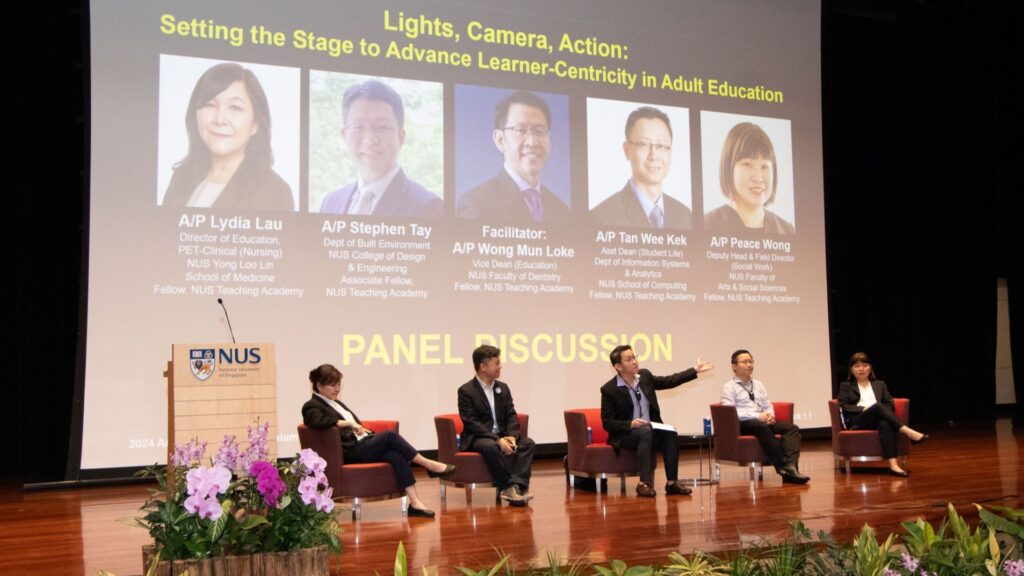
When teaching adult learners who have a wealth of knowledge or experience, from mid-career professionals to individuals pursuing their passions, educators should be prepared to be challenged in class.
Rather than seeing such challenges as a threat, educators can treat them as an invaluable teaching opportunity, said a panel of speakers at the NUS Adult Educator Symposium on 23 April 2024.
Organised by the School of Continuing and Lifelong Education (SCALE) to the theme of "Learner Centricity In Adult Education", the symposium unpacked the concept of learner centricity and its impact on adult learners, with attendees learning best practices from experts in the field and networking with like-minded practitioners.
Associate Professor Stephen Tay from the Department of Built Environment at NUS College of Design & Engineering (CDE) recalled how a mature student rebutted his theory, which opened up a discussion for the rest of the class.
"I tried to build upon the unique experiences of other participants. After all, we are not teaching one single individual but a class…Some students disagreed with (their classmate's) argument because of their own prior experiences," he noted. This sentiment was echoed by Associate Professor Chai Kah Hin, NUS Associate Provost (Masters' Programme and Lifelong Education), in his welcome address at the symposium that drew over 400 attendees.
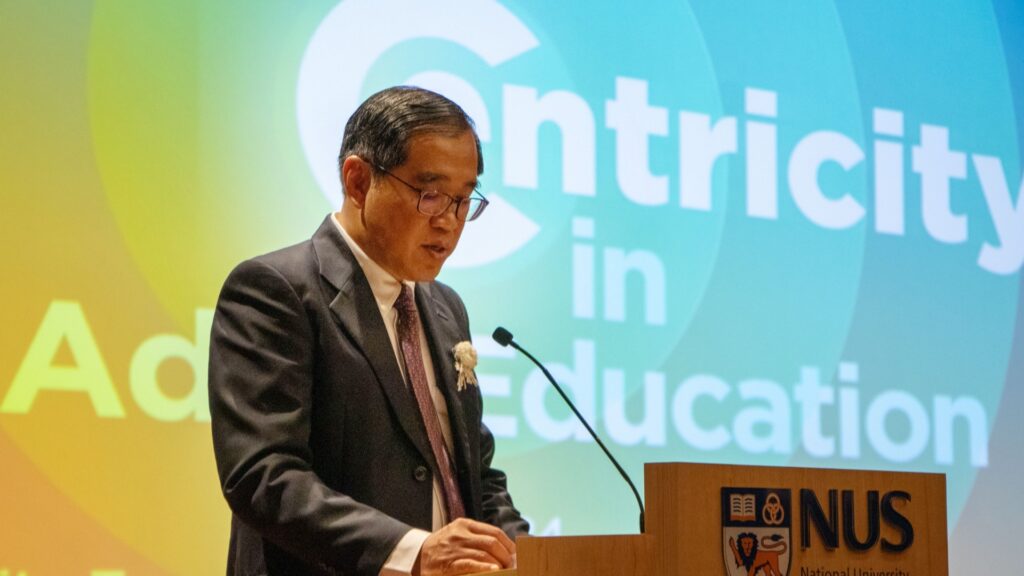
"When we value the wisdom, thought, and experience that each adult learner brings to the table, we create rich learning environments, where learning happens among the participants as much as it happens between learners and instructors," said Assoc Prof Chai, who is also Vice Dean (Graduate Programmes) at CDE.
In fact, disagreements could aid in the learning experience. "It is all right to introduce things that are not so 'peaceful' in class to challenge the students and turn it into an opportunity for mutual learning," added Associate Professor Peace Wong, Deputy Head & Field Director (Social Work) at NUS Social Work, NUS Faculty of Arts & Social Sciences.
Learning and growth boils down to nurturing human relationships, pointed out keynote speaker, Professor Li Junlei, Co-Chair of the Human Development and Education Program and Saul Zaentz Senior Lecturer in Early Childhood Education at the Harvard Graduate School of Education.
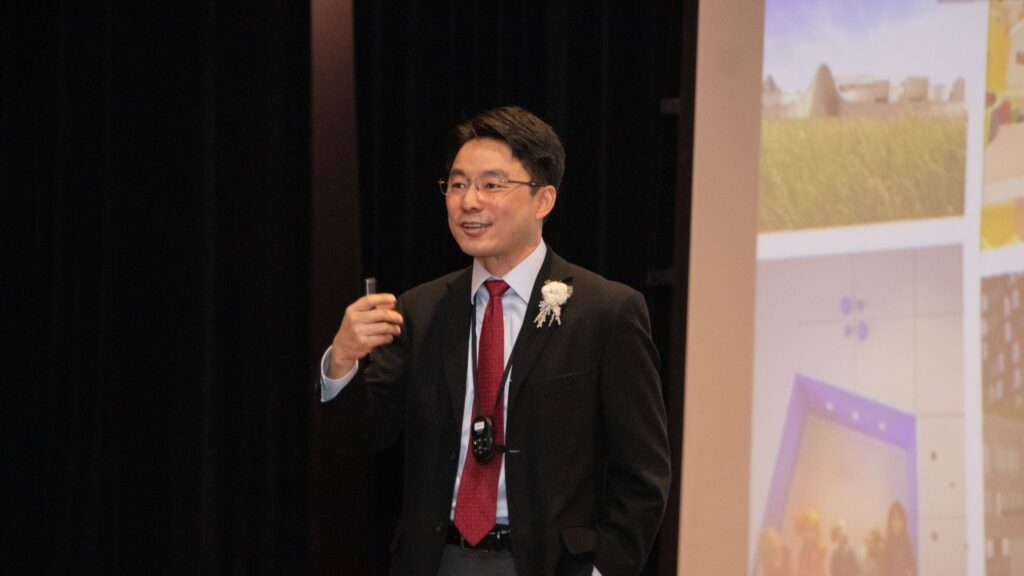
"Whether it is for young children, adults or the elderly, relationships are the active ingredients of the environment's influence on healthy human development," he said.
A Tailored Approach
Prof Li highlighted a common thread among learners: a sense of being "not enough". Particularly for adult learners, this mindset often stems from a perceived lack of professional knowledge, prompting them to seek upskilling opportunities or discover a greater purpose.
Adult educators should not promote this feeling of inadequacy but instead guide learners to enhance their varied skillsets. To do so, courses for adult learners should be more customised. "We are often tempted to take what we have prepared for the undergraduate students and copy it over for adult learners, but that should not be the case," said Associate Professor Tan Wee Kek, Assistant Dean (Student Life) from the Department of Information Systems & Analytics at NUS School of Computing, on the panel "Lights, Camera, Action: Setting the Stage to Advance Learner-Centricity in Adult Education".
"Just as we expect our adult learners to adapt, to unlearn and relearn, we as educators also need to unlearn and relearn our methods of teaching," added Associate Professor Wong Mun Loke, Vice Dean (Education) of NUS Faculty of Dentistry, who moderated the panel.
In stark contrast to undergraduates, adult learners come from different industry backgrounds, and each possess unique skills. Identifying the starting points for adult learners and tailoring lessons to meet their needs and abilities is imperative in class planning, added Assoc Prof Tay.
This can be as simple as requesting a list of participants prior to the lesson, so the teacher can adjust his lesson material according to the class make-up, he elaborated.
Beyond learning material, assessments also need to be reworked to suit adult learners. Traditional approaches such as internships may not be appropriate for full-time working adults who already have industry experience.
Associate Professor Lydia Lau, Director of Education of PET-Clinical (Nursing) at NUS Yong Loo Lin School of Medicine, urged educators to remain flexible and open to feedback.
"Every year, some adult learners from the education sector will have a discussion with us about reducing the workload of modules to better match the number of credits given. This partnership helps us improve our modules," she said.
Global Access to Lifelong Learning
Beyond pedagogy, the symposium's second keynote speaker Professor Matthew Weait, Director of the Department for Continuing Education at the University of Oxford, took a more macro view on adult education, stressing the importance of ensuring global access to lifelong learning.
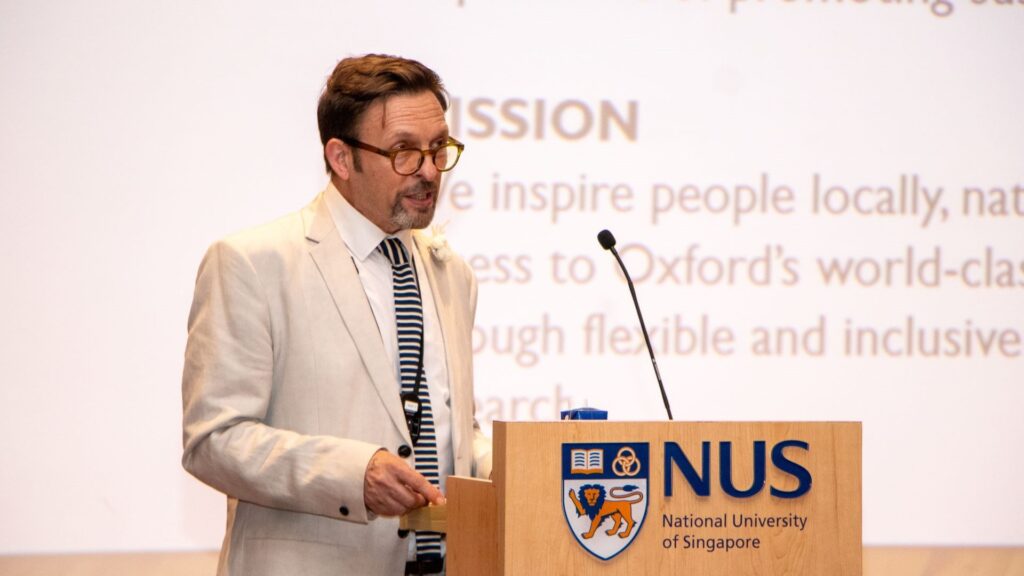
In an era marked by climate change, demographic shifts and economic disparities among nations, the Professor of Law and Society identified education as a key solution to myriad global challenges. Pointing to the refugee crisis as an example, he highlighted that it is imperative to compensate individuals for lost years of education.
"Education contributes to the development of human capital of refugee communities and ensures that the refugees have the basis for increased earning and skills to rebuild their communities," he said.
He urged well-established institutions to partner with local entities in less-developed regions by sharing resources and providing platforms for remote learning. "We need to be all involved in our own ways and in our own particular contexts."
It is clear that adult educators are vital in unlocking the transformative power of lifelong learning, and this starts by giving adult learners the attention they deserve.
This story first appeared in NUSNews on 8 May 2024.
We Need to Talk: Youth Mental Health Takes Centre Stage at the NUS SSR Conference 2024
IN BRIEF | 5 min read
- The hybrid conference, attended by 800 social work practitioners, healthcare professionals, policymakers and researchers, shone a spotlight on the various approaches to help youths cope with social media pressures - from digital initiatives to providing more support at school and at home.
With social media now a big part of daily life for youths, there has been growing concern about its negative impact on their mental health. But it can also be a force for good.
"The reality is that technology can play a powerful, positive, and useful role in our lives by connecting us with people," said Dr Janil Puthucheary, Senior Minister of State, Ministry of Communications and Information and Ministry of Health, at the annual Social Service Research Centre (SSR) Conference on 20 March.
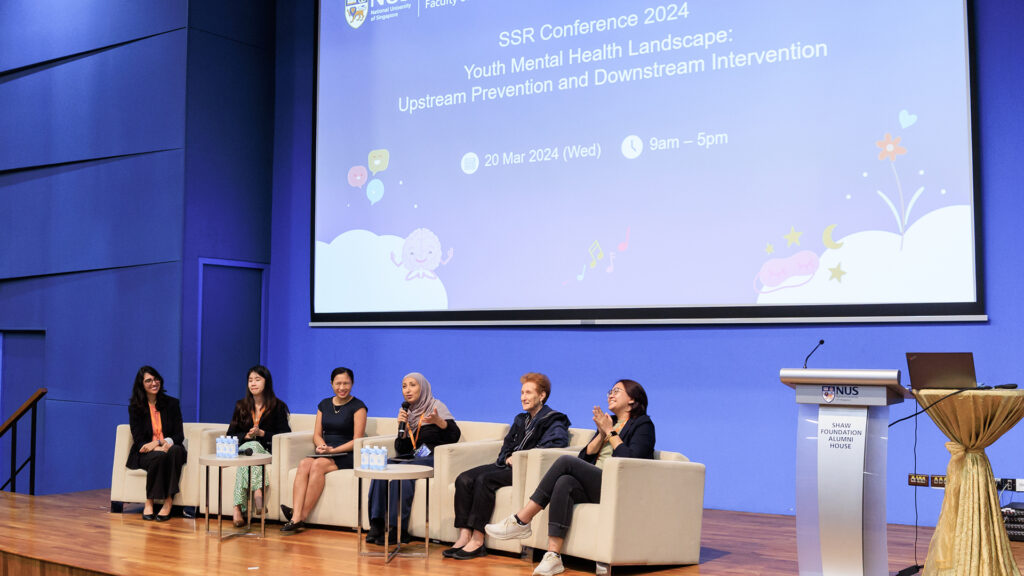
A key question, he noted, was how to "mitigate the issues" that arise from the negative influences of social media. It was a topic that was discussed at the conference, titled "Youth Mental Health Landscape: Upstream Prevention and Downstream Intervention", organised by SSR at the NUS Faculty of Arts and Social Sciences.
The hybrid conference, attended by 800 social work practitioners, healthcare professionals, policymakers and researchers, shone a spotlight on the various approaches to help youths cope with social media pressures - from digital initiatives to providing more support at school and at home.
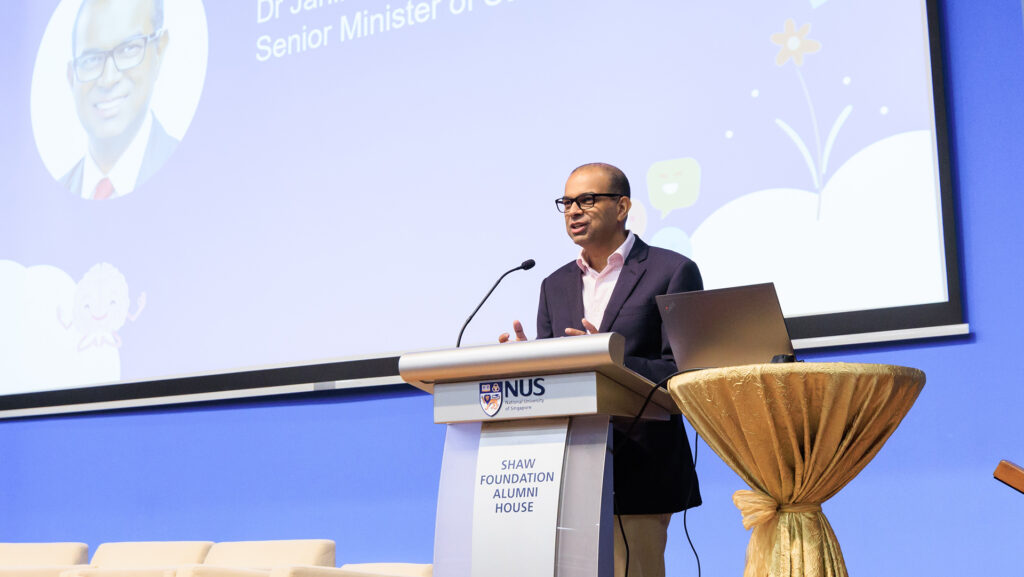
Online Engagement
As youths have built a strong social media presence across multiple online platforms such as Instagram, Reddit, YouTube, and TikTok, digital strategies such as online peer support development programmes and mobile-led mental health applications make for good outreach tools.
To reach out to these youths, apps such as mindline.sg by the MOH Office for Healthcare Transformation (MOHT) and Myloh by SHINE Children and Youth Services were created.
Fearing mental health stigmatisation, many youths prefer to remain anonymous. For example, MOHT found that many youths posted about their troubles anonymously on r/SGExams, a popular subreddit or forum hosted on the social network app Reddit.
This prompted MOHT to launch an anonymous discussion forum called "let's talk" on mindline.sg as an alternative platform that allows for youths to discuss their mental health issues and seek help. "We wanted to create a safer version of Reddit for our youths to get support and accurate information," said Ms Janice Weng, Deputy Director at MOHT.
All services provided by Myloh also provide user anonymity. "[Remaining anonymous] is what young people want," said Mr Eric Sng, Assistant Director at SHINE.
Connecting the Dots
Digital solutions aside, Dr Yeo Geck Hong turned to peer support training as an outreach tool to support youth mental health.
The research fellow at SSR ran an online peer support training programme evaluating 450 students across three local secondary schools. Bite-sized modules across four sets of skills-mattering (the extent to which we make a difference in the world around us), selfhood, compassion, and mindfulness-were taught over eight sessions lasting 45 to 60 minutes each, across three schools from 2020 to 2023
Preliminary findings revealed that students improved their grasp of the four skills, contributing to healthier peer relationships and in turn a more wholesome school environment.
Caring relationships between teachers and students and strong parent-child bonds were successful in promoting long-term mental health recovery in a study conducted by Mr Dennis Teo, Research Specialist at the National Council of Social Service.
Among 444 youths aged 13 to 19, those who improved in these two protective factors saw greater reduction in their behavioural issues over the course of two years.
Social work executive Rachel Reuben, who works with troubled youths, found the findings shared at the event very insightful. "It really helped us to make the connection with our youths," she said.
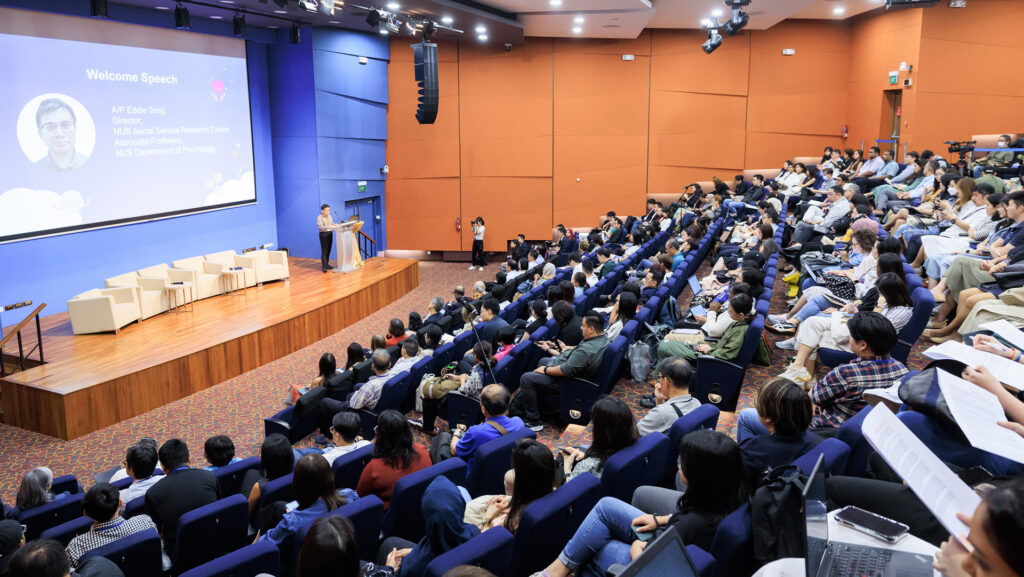
Identifying At-Risk Youths
While prevention is important, experts also call for more intervention for youths who risk falling through the cracks.
"Most of the time, we deal with issues that are at the end stage of the problem," said Dr S. Vasoo, Emeritus Professor at the NUS FASS Department of Social Work. "We need to develop a system that can identify the young people who are vulnerable."
These include individuals such as youth offenders and youth who are emotionally neglected at home.
Assistant Professor of Social Work at NUS Dr Lee Jungup shared findings from a childhood traumatic experiences study (that is currently under review) on 1,000 students from local universities aged 18 to 30. She found that 75 per cent of them said they had experienced emotional neglect in their formative years. Some 56 per cent had faced physical neglect, and around 37 per cent experienced physical abuse. Those with multiple trauma experiences were more likely to have conditions such as depression and anxiety, she observed.
"During the short period (from adolescence to adulthood), there are a lot of ways that things can change biologically, socially, and cognitively," she added.
Given such findings, it is imperative to have all hands on deck to improve youth mental health as a collective.
"The solution necessarily has to take the 'whole-of-society' approach with coordinated participation from various segments of society, including the community, government agencies, welfare organisations, healthcare, academia, schools, and workplace," said SSR Director Associate Professor Eddie Tong, who is also from the Department of Psychology at the NUS Faculty of Arts and Social Sciences.
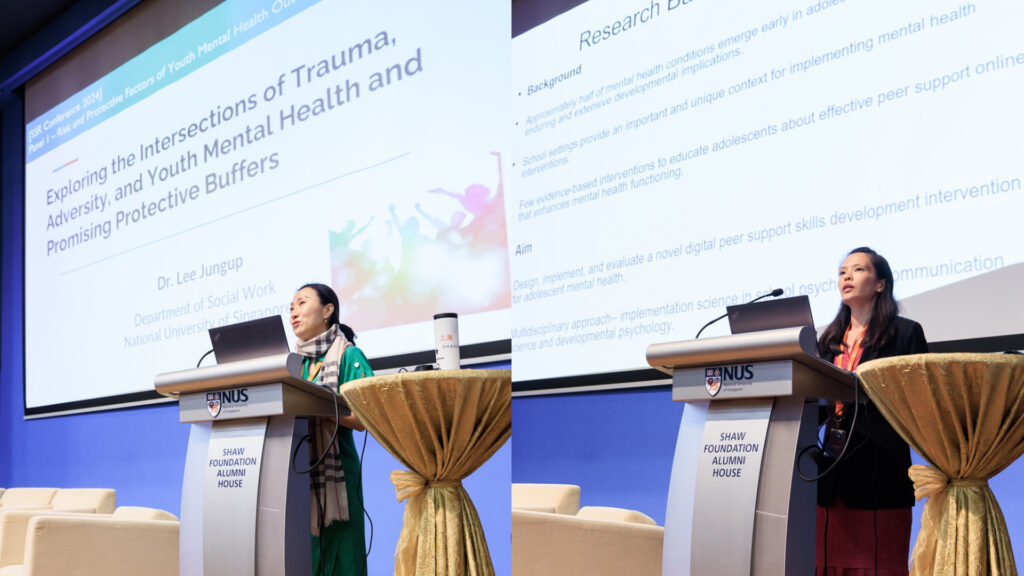
The ideas and findings presented at the conference left practitioners with much food for thought. "I appreciated the efforts made to translate the findings into practices," said conference participant and research executive Daryl Tan.
This story first appeared in NUSNews on 8 April 2024.
The Importance of Considering Debt and Young Children in Activation: A Survival Analysis of Return to Welfare
In April 2020, the Singapore government launched the GoWhere Suite, an all-in-one portal to direct citizens to the resources they needed during the COVID-19 pandemic. Since then, one of the key websites in the suite, the SupportGoWhere site, has been used extensively, receiving 4.8 million visits as of June 2022. As society progresses, the government’s approaches toward support strategies must be adapted accordingly. Pertinent areas of discussion include how support policies ought to be implemented and how individuals can qualify for support. Associate Professor Irene Y. H. Ng (NUS Social Work) and fellow researchers look at the factors that drive low-income families back to welfare in “The Importance of Considering Debt and Young Children in Activation: A Survival Analysis of Return to Welfare” (Social Policy and Society, 2023). The authors provide an analysis of the research on activation, a welfare strategy where policies focus on employment, as well as the policy implications of this research in the Singapore context. Upon reviewing the research, the authors find that while researchers have made substantial findings about the transition from welfare to employment, limited work has been done on the lasting financial independence of more former beneficiaries. In particular, vulnerable, low-income families tend to return to welfare due to several barriers to self-sufficiency. The paper employs survival analysis on data obtained from a national government assistance program in Singapore and identifies two key factors – debt accounts and young children – driving these families’ return to welfare, although the authors note that insufficient research has been done to study this in full. The authors provide several policy implications, such as considering how debt interventions can be implemented to mitigate these issues and improve financial independence. They also note the limited effect of financial education schemes and suggest more attention be given to debt restructuring and alleviation. Finally, their paper furthers developments in family policy research, considering potential support for low-income families with young children. Read the article here: https://doi.org/10.1017/S1474746421000518
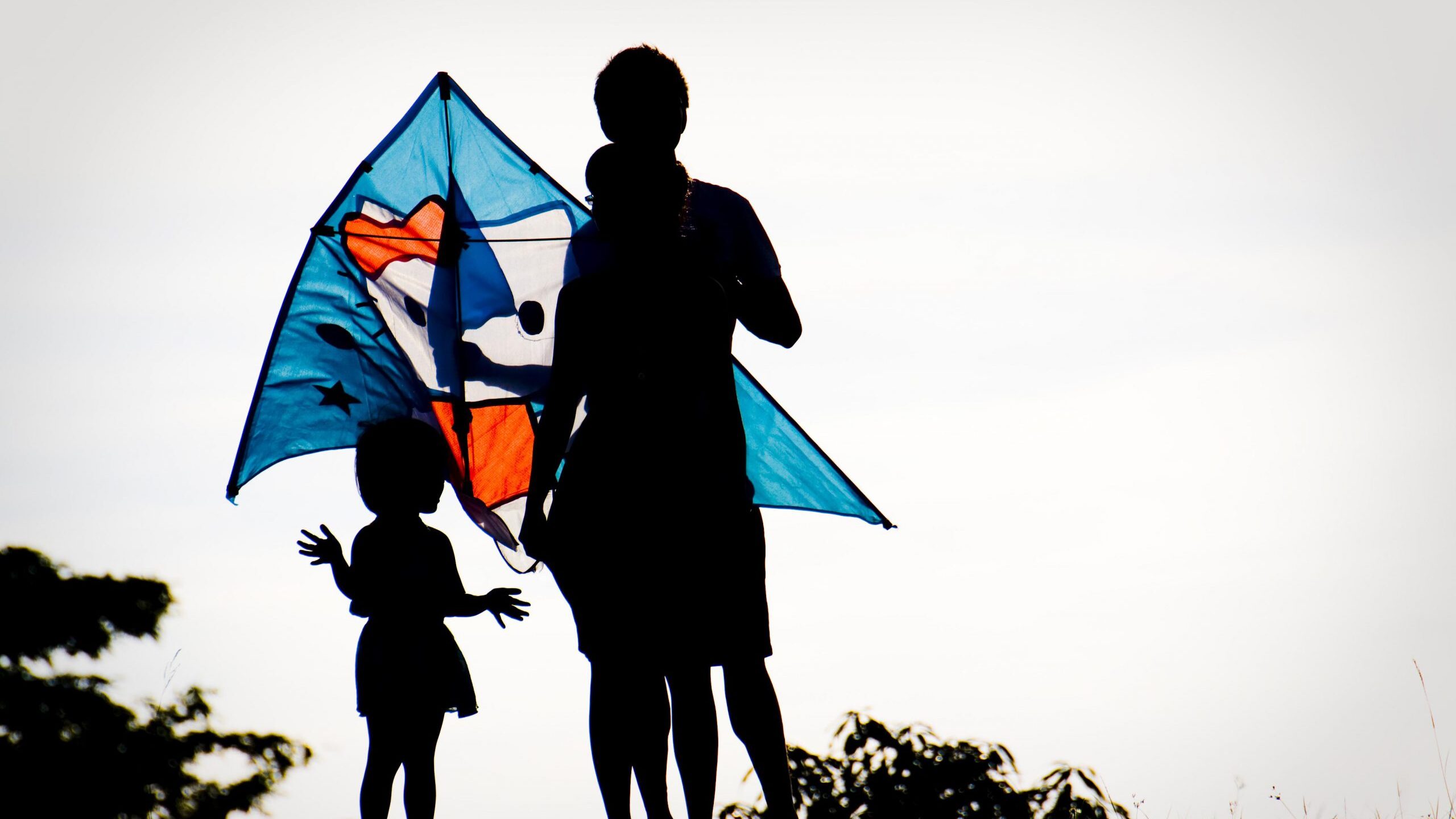
Childhood trauma can lead to mental health issues among young adults: Study
There has been an increased awareness of young people’s mental health due to new pressures in society. such as technological advances, the negative effect of social media on self-esteem, and economic uncertainty. Today’s youth, having to navigate this dynamic landscape, often fall prey to mental health issues like anxiety, depression, and loneliness. In ‘Childhood trauma can lead to mental health issues among young adults: Study’ (The Straits Times, March 2024), Assistant Professor Lee Jungup (NUS Social Work) discusses the mental health in young adults, as well as considering childhood trauma as a trigger for mental health episodes later in life. Asst. Prof. Lee spoke about her study, which is currently under review, at the NUS Social Service Research Centre (SSR) Conference 2024, held on 20 March. The study found that approximately 75 percent of the sample of 1,000 university students encountered emotional neglect in their childhood. A significant number also recounted experiencing other typical signs of childhood trauma, such as physical neglect and physical abuse. The study uncovered a strong association between the students with negative childhood experiences and their current mental health struggles, with reports of conditions like depression, anxiety, and post-traumatic stress disorder. Read the article here.

Childhood Trauma Can Cause Mental Health Issues in Young Adults: Study
IN BRIEF | 4 min read
- Dr Lee Jungup (NUS Social Work) has found that issues such as neglect cyber bullying and abuse during childhood can lead to depressive and anxiety symptoms in young adults. She shared the findings from her study, which is currently under review before publication, at the NUS Social Service Research Centre Conference 2024 last week.
Click through image below to read this piece.
This article first appeared in The Straits Times and on NUSNews on 21 March 2024.
Efforts to Bolster Mental Well-being Amongst Youth Take Centre Stage at NUS Social Service Research Centre’s Annual Conference
IN BRIEF | 5 min read
- More inclusive strategies and earlier intervention to bolster youth mental health were the centre of discussion amongst close to 800 social service practitioners, researchers, policymakers, and healthcare professionals who attended the SSR Conference 2024 both online and in person at the National University of Singapore (NUS) on 20 March 2024.
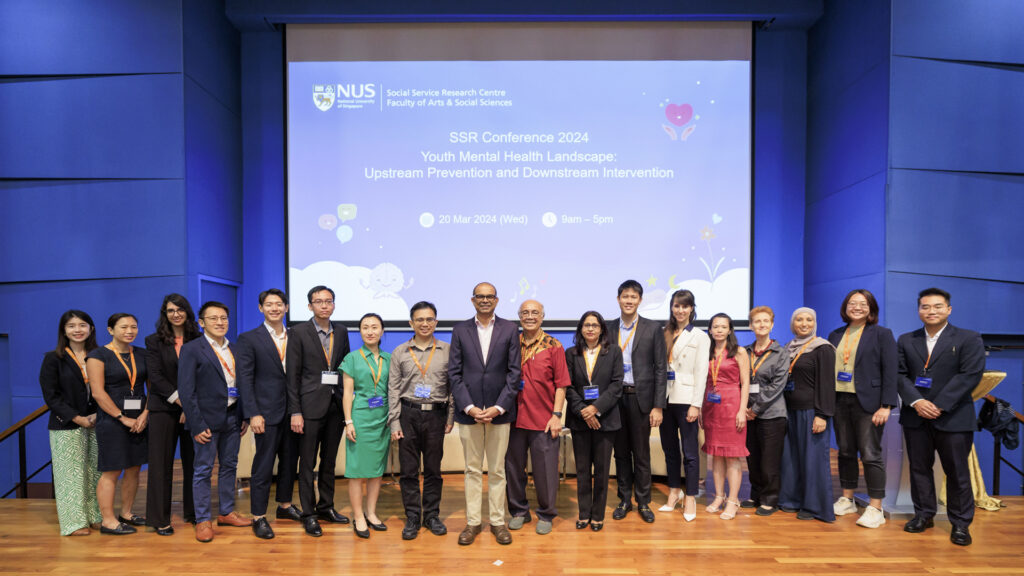
More inclusive strategies and earlier intervention to bolster youth mental health were the centre of discussion amongst close to 800 social service practitioners, researchers, policymakers, and healthcare professionals who attended the SSR Conference 2024 both online and in person at the National University of Singapore (NUS) today.
Organised annually by the Social Service Research Centre (SSR) at the NUS Faculty of Arts and Social Sciences (FASS), the theme of this year's conference was "Youth Mental Health Landscape: Upstream Prevention and Downstream Intervention" and dedicated to addressing the psychological well-being of youths and help them thrive in their adolescent years.
Participants, who represented more than 100 organisations, including social and family service centres, voluntary welfare organisations, government ministries, academic institutions and businesses discussed research and engaged in dialogues on prevention and intervention strategies, including digital initiatives and other innovative approaches, to improve mental well-being and resilience amongst youth in Singapore.
They included representatives from the Institute of Mental Health, the National Council of Social Service, SHINE Children and Youth Services and Fei Yue Community Services, amongst others.
Guest-of-Honour, Dr Janil Puthucheary, Senior Minister of State, Ministry of Communications and Information & Ministry of Health, delivered the keynote address at the event.
Dr S. Vasoo, Emeritus Professor from the FASS Department of Social Work also delivered the introduction speech on how key players in mental healthcare can further collaborate to provide better protection for youths with mental health conditions in Singapore.
In addressing mental health issues, whether for the young or the old, he said that "the curative approach now delivered by social service agencies needs to move towards early intervention."
The full-day conference featured three panel sessions that covered mental health intervention programmes such as mindline.sg and the Hidden Youth Intervention Programme, and research findings from presentations on digital peer support training in schools, arts therapy for children, and more.
The variety of presentations from government, academic, and social service organisations provided a comprehensive understanding of the different roles of mental healthcare professionals, practitioners, caregivers, and patients themselves in mental health service delivery. The panellists also discussed how these stakeholders can work collaboratively to create more safe spaces to empower youths who are experiencing mental health struggles.
Associate Professor Eddie Tong, Director of SSR and Associate Professor at the NUS Department of Psychology, said, "I believe we are in a unique juncture in our nation's history where there is broad consensus that some of our youths need help and we need to help them. Having a conference on youth mental health is timely and we cover a range of key themes from risks and protective factors to prevention and intervention strategies."
Associate Professor Mythily Subramaniam, from the Institute of Mental Health and the NUS Saw Swee Hock School of Public Health, who presented at the conference said, "Changes in youth mental health are taking place against a more challenging backdrop of global upheavals like the COVID-19 pandemic, wars, and climate change. Thus, a deeper understanding of their impact on, and co-development of interventions with, youths are important to ensure better support to this vulnerable population."
This story first appeared in NUSNews on 20 March 2024.
How often do you volunteer? Well, volunteering may boost your happiness!
Volunteering can be done in myriad ways – helping out at local non-profits, participating in community events, or even championing social causes. Singaporeans are encouraged to volunteer at various times in their lives, from participating in the Values in Action (VIA) programme in schools to contributing to their workplaces’ Corporate Social Responsibility (CSR) initiatives. In ‘Morning Shot: How often do you volunteer? Well, volunteering may boost your happiness!’ (MONEY FM 89.3, March 2024), Dr Zheng Liren (NUS Social Work and Academic Director, NUS Communities and Engagement Pillar) is interviewed by Emaad Akhtar about the various advantages of volunteering, not only in terms of societal benefit but also in self-development and improving volunteer well-being. Dr Zheng discusses the ‘Impact of Volunteering Survey’, a recent survey from the National Heritage Board (NHB), where the results indicated that the act of volunteering was significantly related to higher wellbeing in regular volunteers. This is due to volunteering having a positive impact on one’s self-development, through the fulfillment of altruistic tendencies, opportunities to learn new skills, meaningful social interaction, and expanded cultural awareness. Dr Zheng also discusses the Reconnect SeniorsSG programme, a year-long service learning course jointly offered by NUS and the Agency for Integrated Care (AIC), where students are trained to befriend and support vulnerable seniors. He explains how the students have a deep impact on the seniors’ mental and physical health through these meaningful engagements. He also emphasizes the need for emphatic communication between the volunteers and the seniors, and for volunteers to evaluate their motivations towards volunteering to ensure their contributions are meaningful and sustainable. Get the podcast here.
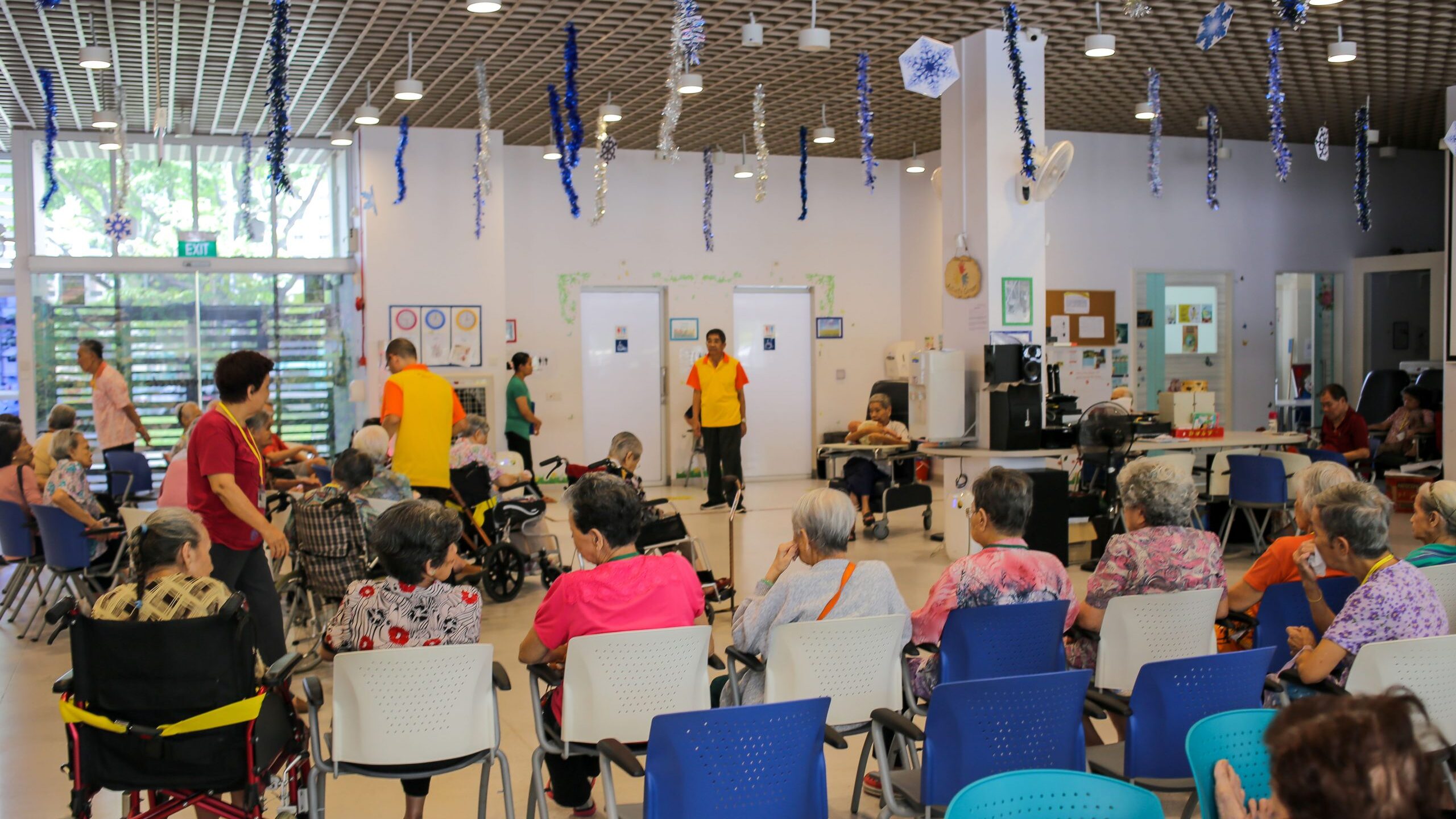
In-Work Poverty and Challenges of Getting By Among the Young (Phase 2)
In the past several years, concerns over poverty and inequality in Singapore have risen significantly. With rapid technological changes and disruptive innovations, economic insecurities for workers in traditional low-waged jobs and the gig economy have arisen. ‘In-Work Poverty and Challenges of Getting By Among the Young (Phase 2)’ continues the previous effort by Associate Professor Irene Y. H. Ng (NUS Social Work & NUS Social Service Research Centre (SSR)) and her research team to understand how government financial assistance programmes can be better designed to cater to the young working poor (YWP) in Singapore. In this project, funded by the Social Science Research Thematic Grant from 2023 to 2026, young working poor is defined as individuals aged between 21 and 40. This group was selected as they often do not qualify for government support schemes due to their young age. The project explores the experiences of the YWP in Singapore through altogether four waves of surveys and interviews, to understand career trajectories and intra-generational mobility. It also reaches out to other stakeholders including employers and the tripartite partners of the National Trade Union Congress (NTUC), the Singapore National Employers Federation (SNEF), and the Ministry of Manpower (MOM) through focus group discussions (FGDs) and interviews to understand their challenges and perspectives. Four types of poverty–earnings poverty, work poverty, time poverty, and dynamic poverty–faced by YWP are explored. There is also a focus on young workers’ mental health and cognitive ability across gender and race, and how they use their social networks to navigate jobs, family, and advancement. The insights gathered through this project will inform policymakers and service agencies on how to improve the reach and design of formal programmes for younger low-wage workers. Additionally, the project also provides information on how to leverage on YWP’s social networks as a resource for self-help.
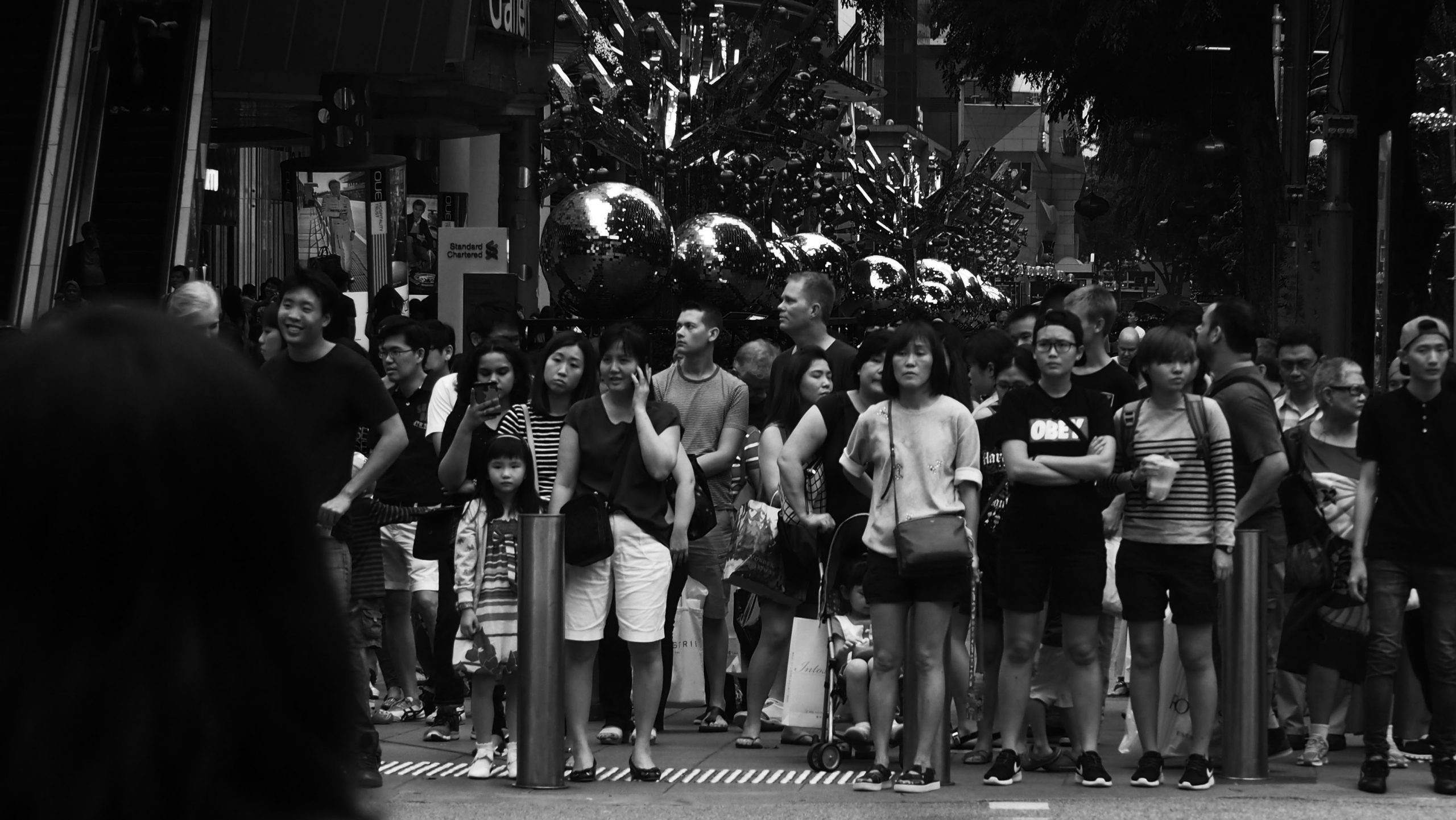
Outstanding Volunteer Award for Social Service Veteran
IN BRIEF | 10 min read
- Dr S. Vasoo (Emeritus Professor, NUS Social Work) has been conferred the Outstanding Lifetime Volunteer Award by the Ministry of Social and Family Development (MSF) for his contributions to the social service sector over the past five decades!
Click through image below to read this piece.
This article first appeared in The Straits Times and on NUSNews on 3 February 2024.
When Saving $50 a Month Brings Stress: Families Need Compassion, not Charity
IN BRIEF | 15 min read
- Director of Melrose Home at the Children's Aid Society and FASS alumna Cindy Ng (NUS Social Work) draws from her experience piloting a debt and savings programme and research - including that led by Associate Professor Irene Ng (of NUS Social Work and NUS Social Service Research Centre) - to argue for a more considered approach to tackling poverty and alleviating the plight of low-income families, in this Op-Ed in The Straits Times.
Click through image below to read this piece.
Source: The Straits Times © SPH Media Limited. Permission required for reproduction.
This article first appeared in The Straits Times on 2 December 2023.
NUS Social Work Associate Professor Peace Wong and Alumni Honoured at this year’s Outstanding Social Worker Awards Ceremony
IN BRIEF | 5 min read
- The Outstanding Social Worker Award, the highest accolade for social workers in Singapore, has been conferred on Associate Professor Peace Wong (Deputy Head of NUS Social Work as well as its alumna) for her unwavering dedication and stellar contributions to social work supervision and education. Two other NUS Department of Social Work alumni, Ms Flora Tan and Ms Nisha Verma, were also honoured as exemplary social workers for the remarkable impact they made on the community at the ceremony.
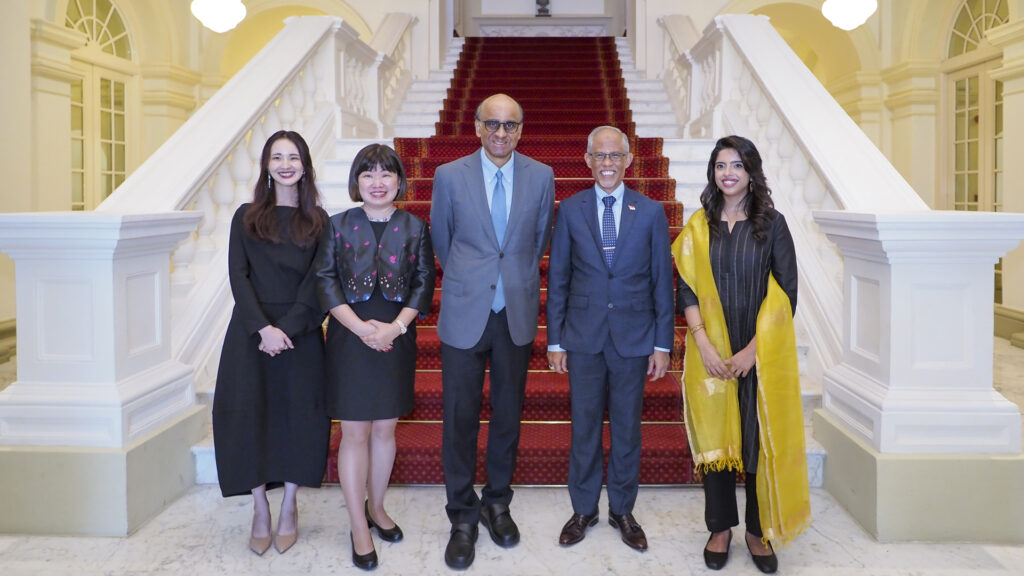
The Outstanding Social Worker Award, the highest accolade for social workers in Singapore, has been conferred on Associate Professor Peace Wong for her unwavering dedication and stellar contributions to social work supervision and education. Assoc Prof Wong, who has been with the NUS Faculty of Arts and Social Sciences (FASS) since 2007, has dedicated her time and service over the past three decades to uplifting the country's social work supervision standards.
Two other NUS Department of Social Work alumni, Ms Flora Tan and Ms Nisha Verma, were also honoured as exemplary social workers for the remarkable impact they made on the community at the ceremony. Ms Nisha, who is currently with the Ministry of Social and Family Development's (MSF) Child Protective Service, received the Promising Social Worker Award for her efforts in protecting neglected and abused children. Ms Tan, a senior social worker at Care Corner Singapore, was also recognised with the same Award for her efforts in developing innovative, evidence-based programmes to promote positive youth development.
Organised by the Singapore Association of Social Workers (SASW) and supported by MSF and ExxonMobil Asia Pacific Pte Ltd, the annual awards recognise the contributions made by dedicated social workers who play an important role in enriching our society and supporting those in need. The 2023 awards were presented by Guest-of-Honour Mr Tharman Shanmugaratnam, President of the Republic of Singapore.
Passionate about Developing the Next Generation of Social WorkersThroughout her time at NUS, Assoc Prof Wong has strived to provide a practice-oriented educational experience for students to develop their reflective thinking and competencies in social work practice. It was with this in mind that she established a robust field placement system for the Department that not only focuses on providing meaningful field placements for social work students but also ensures that the network of field supervisors from social service agencies is well-trained to support the learning of about 150 students annually.
Assoc Prof Wong has received many awards such as the NUS Faculty Teaching Excellence Award (yearly from 2014 to 2022), the NUS Annual Teaching Excellence Award (in Academic Years 2017/2018 and 2018/2019 as well as 2022), and has even been placed on the NUS Honour Roll (2023 to 2027). In addition to her role as Deputy Head of the NUS Department of Social Work, she now serves in the NUS Teaching Academy Executive Council and is also a Resident Fellow at NUS' Ridge View Residential College, supporting the holistic development of residing students.
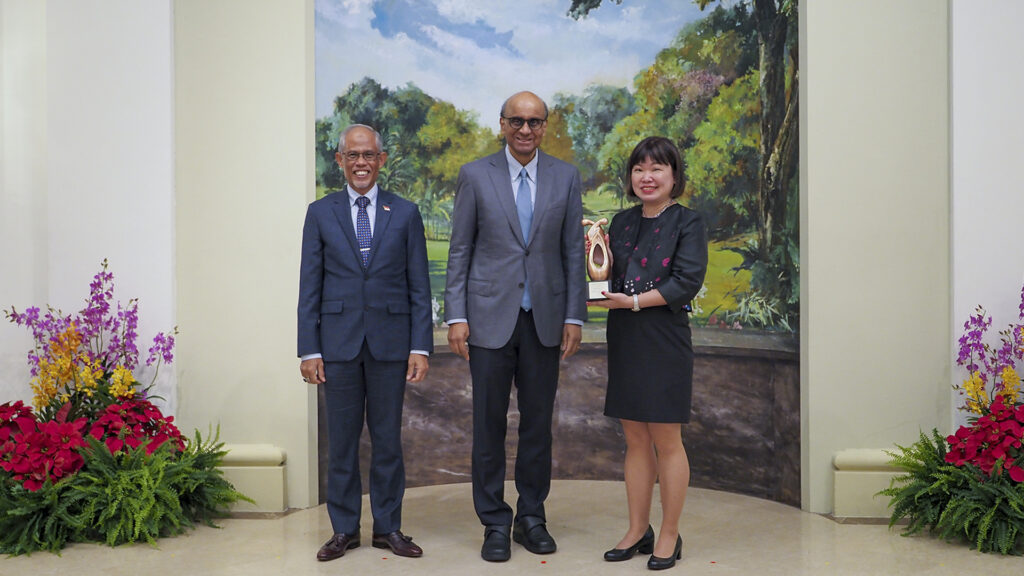
Professor Lionel Wee, Dean of NUS FASS, said, "Social work is quickly becoming a vital area not only in Singapore but also globally as we contend with increasingly complex social concerns such as ageing and social inequality. It is thus important that we have exemplars like Assoc Prof Peace Wong, who are both practitioners and educators, committed to grooming the next generation of social workers. Her work in academia and with social service agencies, government ministries, and professional bodies, also ensures that social workers are well-trained, well-supported and better equipped to serve their community."
Assoc Prof Wong said, "I am humbled to receive the award and would like to dedicate this award to my family and social work colleagues who choose this profession and work tirelessly to fulfil its mission."
Emphasising the need to evolve social work education to society's changing needs, the NUS alumna and passionate educator shared: "Social work education is not just about learning knowledge and skills, it is about facilitating our students to find congruence within themselves and the mission and values of social work."
She hopes that social work students will be challenged to embrace critical thinking and interdisciplinary ideas to evolve social services that are relevant with the times.
Outside of NUS, Assoc Prof Wong is appointed to various advisory boards, committees and panels in the government and social service agencies as testament to her deep expertise. These include MSF, SHINE Children and Youth Services, and Fei Yue Community Services. She is also currently the chairperson of various workgroups under the Social Work Accreditation and Advisory Board. During this time, she has led the implementation of important initiatives such as the Social Work Supervision Guidelines, supervisory competency domains, social work supervision seminars, and training programmes for the Supervision of Supervisory Practice.
Wanting to advance supervision standards, Assoc Prof Wong developed the "PEACE process-in-context" supervisory model to guide supervisors in balancing their administrative, educational and supportive roles. Since 2017, she has trained over a few hundred field educators and Master's students in its principles. Her work has also been recognised beyond Singapore's shores where she is involved in global initiatives, such as the Asian Family Summit and other international networks.
Click here to view the SASW videos of all three award winners.
This story first appeared in NUSNews on 4 December 2023.
NUS Faculty and Alumni Honoured at 2023 Outstanding Social Worker Awards
IN BRIEF | 9 min watch
- This year saw NUS Social Work's Deputy Head Associate Professor Peace Wong receiving the Outstanding Social Worker Award, and alumni Ms Nisha Sanjay Verma (NUS Social Work and NUS Psychology) and Ms Flora Tan (NUS Social Work both conferred Promising Social Worker Award honours.
Click through image below to read this piece.
This article first appeared in The Straits Times and NUSNews on 17 and 18 November 2023, respectively.
AIC Inks Agreement with NUS to Spur Student Volunteerism in the Community Care Sector
IN BRIEF | 6 min read
- Under the MOU, AIC and NUS will work together to encourage a spirit of volunteerism among students through various initiatives and programmes and equip them with the relevant skills in voluntary work.
- As part of this effort, NUS has partnered with AIC to offer two year-long, service-learning courses - 'Reconnect SeniorsSG' and 'Support Healthy AgeingSG'.
- Offered under the Communities & Engagement Pillar of the NUS General Education curriculum, students get to engage with seniors through AIC's Senior Befriending and Silver Generation Ambassador (SGA) programmes.
- Guided through a structured academic programme overseen by NUS Social Work, they will also learn empathetic communication, civic consciousness, real-world complexities, and trade-offs.
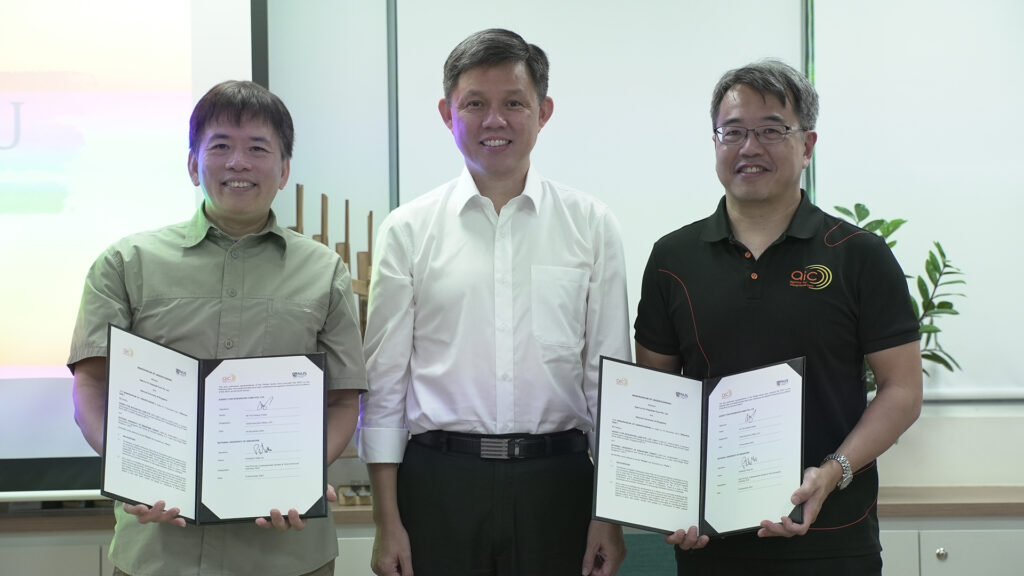
Under the MOU, AIC and NUS will work together to encourage a spirit of volunteerism among students through various initiatives and programmes and equip them with the relevant skills in voluntary work. As part of this effort, NUS has partnered with AIC to offer two year-long, service-learning courses - 'Reconnect SeniorsSG' and 'Support Healthy AgeingSG'. Offered under the Communities & Engagement Pillar of the NUS General Education curriculum, students get to engage with seniors through AIC's Senior Befriending and Silver Generation Ambassador (SGA) programmes. Guided through a structured academic programme overseen by the NUS Department of Social Work, they will also learn empathetic communication, civic consciousness, real-world complexities, and trade-offs.
Students taking 'Reconnect SeniorsSG' serve as senior befrienders, meeting regularly with the seniors to build rapport with them, and accompanying them for activities such as for walkabout in their neighbourhood, going to Active Ageing Centres (AACs) for games, running errands such as making a trip to the nearby market or even to the clinic for consultation. The aim is to encourage seniors to maintain their physical mobility and social connectivity to promote healthier ageing. The feedback from these student volunteers will also help refine the programme for future volunteers, with the goal of developing a long-term programme which benefits both students and seniors.
Working with AIC's Silver Generation Office (SGO), students taking 'Support Healthy AgeingSG' engage seniors in their homes to share relevant government schemes and policies, as well as activities and services available to seniors within their communities. These engagements give a better understanding of seniors' aspirations and needs, serving as a platform to render them the appropriate assistance. Feedback gathered during these engagements are also used to help better understand seniors' concerns, and in turn, facilitate the formulation of better policies for seniors.
Scaling Up of Student VolunteersIn 2023, over 400 NUS students have participated in the befriending activities and more than 500 NUS students have served as SGAs. By 2024, NUS will be scaling up its capacity to support the enrolment of up to 900 students under the 'Reconnect SeniorsSG' course, and 1,200 students under the 'Support Healthy AgeingSG' course every year.
Commenting on the significance of this partnership, Mr Sng Hock Lin, Chief of SGO, said, "With Singapore being one of the world's fastest-ageing nations, the need for volunteers in the sector, and a comprehensive volunteering curriculum for those who step up to the plate, are increasingly important. Together with NUS, we hope to nurture the seeds of service in the hearts of the next generation of leaders and support the development of soft skills in them. In time to come, we hope to strengthen our volunteer networks and ensure their sustainability, so that we can continue to build a more compassionate society that will better support our seniors in their desire to live well and age gracefully."
"The NUS Communities & Engagement Pillar provides a valuable opportunity for all students to think deeper about societal issues while taking constructive actions to advance social services and community building," said Ms Ong Mui Hong, Director of NUS Communities & Engagement. "Through this Pillar, the University hopes to harness the power of our students through youth action to advance Singapore's social services and community development landscape. The service-learning partnership with AIC is part of our wider effort to help build a more caring society in deep collaboration with national agencies and ministries."
This story first appeared in NUSNews on 16 November 2023.
Making a Cross-Border Impact
IN BRIEF | 10 min read
- Students entering social work are often motivated to make a difference in their immediate communities. But Ms Sharon Low (NUS Social Work '97) has challenged that notion with her international humanitarian career.
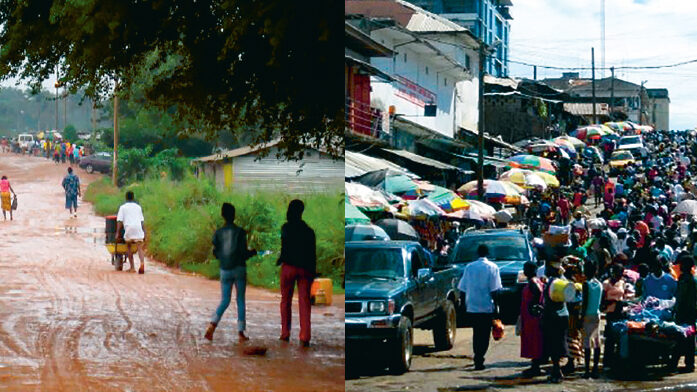
Open the old passports of Ms Sharon Low and you will find an assortment of immigration stamps and visas from destinations as diverse as Somalia, North Korea and Afghanistan. Ms Low amassed this impressive collection during her time with various organisations in the humanitarian sector, including the International Organization for Migration, International Federation of Red Cross and Red Crescent Societies (IFRC) and The Knowledge House. Believe it or not, it never crossed her mind when she enrolled in NUS to major in social work that her career would take her across borders, let alone some of the most militarised places on the planet. "I first came across the social work major by accident, really," she reveals. "In those days, we'd have to buy university prospectus booklets to figure out what we wanted to pursue for our undergraduate degree, and someone had left theirs behind at my void deck. Even though I was only in secondary school at the time, I picked it up - and nothing really spoke to me except social work."
Her four years at NUS opened her eyes to the concept of community work. "It's about getting different people's perspectives. This is especially vital in the field of social work, where there are differences in perception, which need to be understood through either the lens of particular systems or political economies," Ms Low explains, adding that even the concept of an 'ideal state' often differs among stakeholders. "In the international landscape, there is a strong top-down narrative," she explains. "Recent years have witnessed a movement to shift that narrative to balance the power between stakeholders."
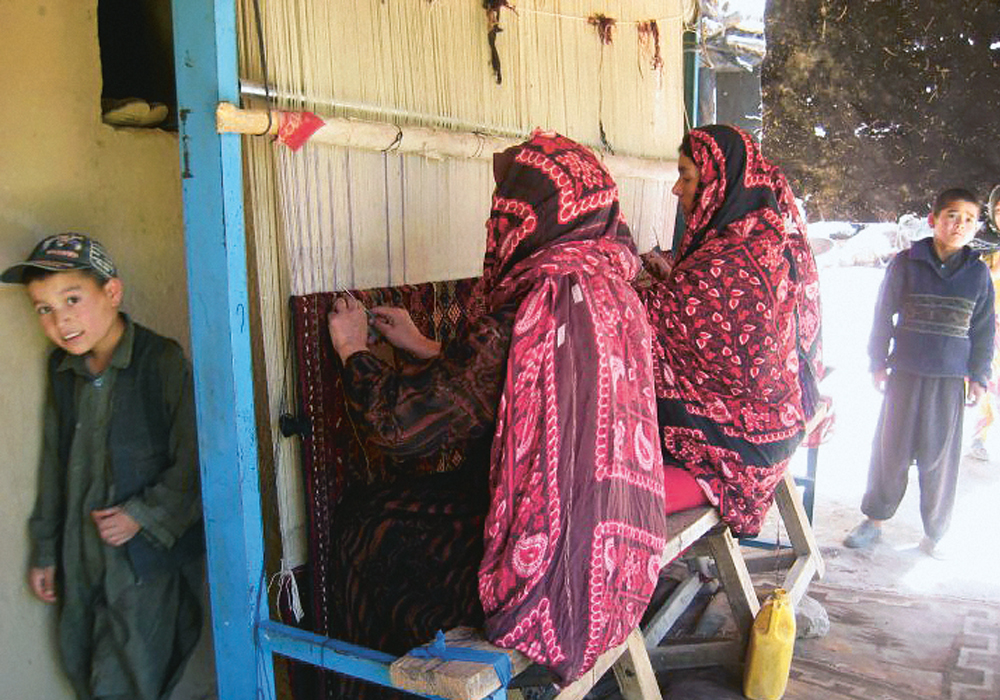
What Ms Low's undergraduate degree did not prepare her for was the international nature of social work. Back in the 1990s, it was uncommon for tertiary students to go on exchange programmes. "As such, we were not really exposed to international affairs and foreign cultures, which is very different from the experience students have today," she elaborates.Thus, Ms Low had a bit of a culture shock when she was first exposed to cross-border work during an early stint at the IFRC. "As I was the only staff who had done Chinese as a first language, I was often asked to either help to translate or do interviews for the Chinese media. So when IFRC asked for someone to join their evaluation team for a Chinese flood relief operation in 1998, I was put forward as a candidate," she recalls. "I was sent there to help evaluate their projects. I eventually spent two months travelling between provinces."
The experience exposed her to the possibility of working internationally at a professional level without going through the missionary or volunteer route. "It was a path less travelled but a path nonetheless," she says. "After meeting many professionals who worked in the humanitarian space, I was keen to explore this path. It was not a typical one for Singaporeans back then. For many years, friends thought that I was a "professional volunteer".
GOING PLACES
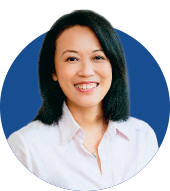 Some of the countries that Ms Low has worked in:
Some of the countries that Ms Low has worked in:
North Korea: As a Red Cross delegate monitoring and reporting on relief operations after typhoon Olga in 1999.
Afghanistan: Set up region-based multi-sectoral Monitoring & Evaluation systems with the Aga Khan Foundation before co-founding community businesses and a consulting firm - the Knowledge House - with a group of Afghan professionals.
South Sudan, North Sudan, Liberia: As a project administrator with Doctors Without Borders.
Myanmar, Thailand: Led a large-scale population survey with border-based ethnic health organisations across conflict-affected areas of Myanmar, and continues to support and advise the multi-ethnic Health Information Systems Working Group to this day.
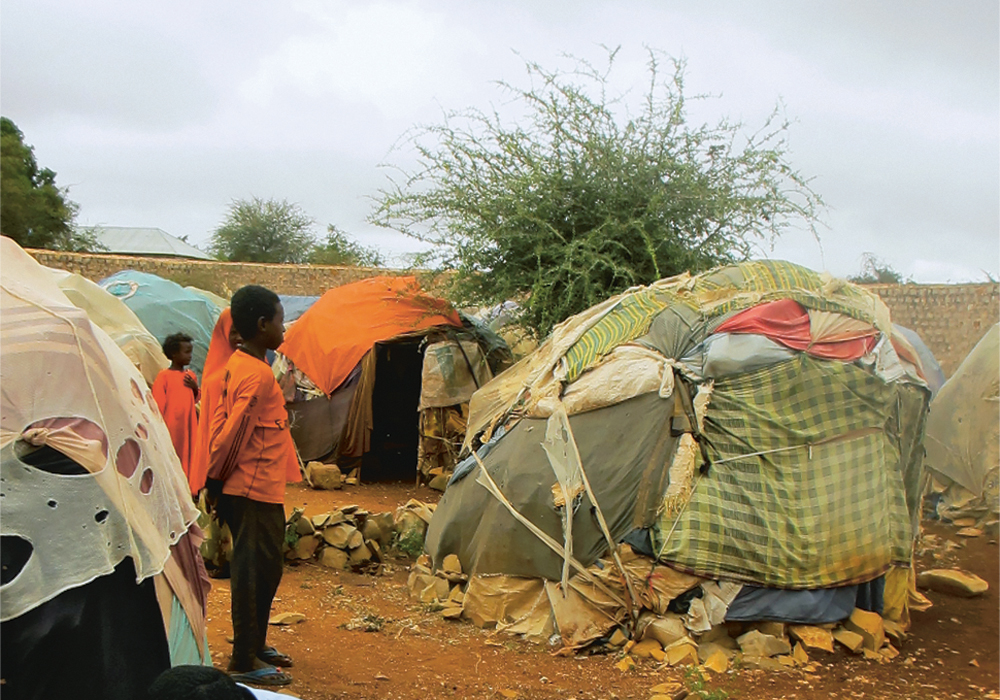
Driven by her own university experience and belief in the importance of international work, Ms Low took a break from her humanitarian career to work at NUS to support the set up of the NUS Overseas Colleges (NOC) in 2002. NOC was a bold initiative by the then-NUS President Professor Shih Choon Fong and the late Professor Jacob Phang to immerse NUS students in leading entrepreneurial hubs around the world with the aim of inculcating entrepreneurship among the students and nurturing a new generation of technopreneurs. Looking back at her time there, she says, "It was a unique opportunity. Back then, entrepreneurship was quite unheard of and it was seen as a 'last resort'. But the team was confident that it would take root, and it has." She is proud to see how far NOC has come today, with some of the students being founders of successful startups and companies, with a few achieving unicorn status.
This story by Roy Sim and the NUS Office of Alumni Relations first appeared in AlumNUS in October 2023. Photos courtesy of Sharon Low.
Financial Training Programme by NUS Aims to Boost Efforts of Social Workers, Frontline Staff and Volunteers
IN BRIEF | 6 min read
- The Financial Capability and Asset Building (FCAB) Training programme funded by Citi Foundation was first rolled out for social workers in 2020 and will be expanded to frontline staff and volunteers from 2024, after a successful pilot in 2022.
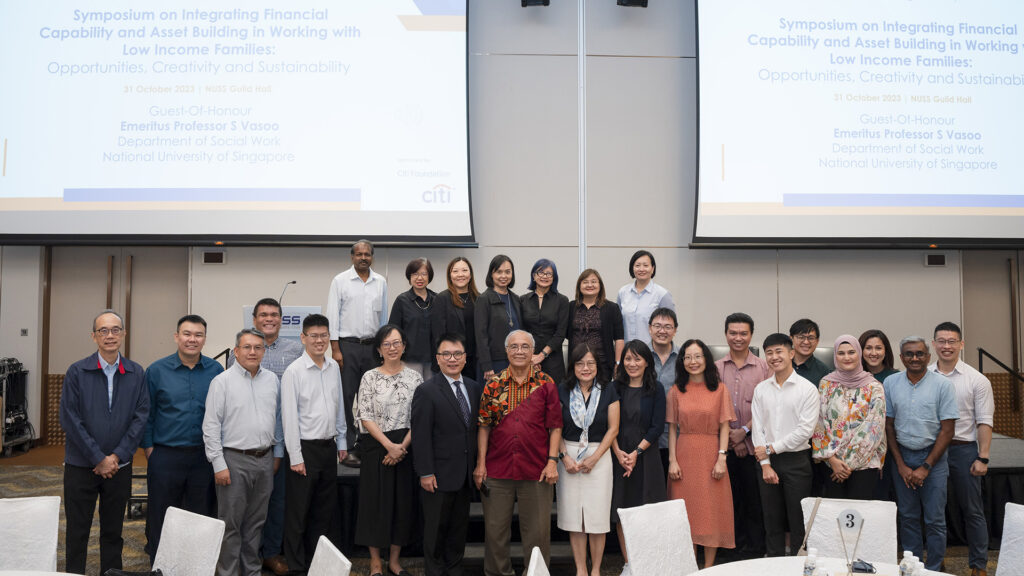
The family dedicated $3,000 a month to repaying the debts, leaving them with little for the daily needs of seven family members; three young children, two elderly grandparents, along with Mr and Mrs Tan.
Overwhelmed by the debt situation, Mrs Tan reached out to a Care Corner Family Service Centre, which helped the family secure subsidies for childcare services and provisions such as milk powder and diapers.
However, Care Corner did not stop there. Mrs Tan's assigned social worker also educated her on the nitty-gritty of financial planning. By improving her financial capability, Mrs Tan was able to reduce the family's debt and cultivate better spending habits.
"Although not all who struggle financially are low-income households, a large proportion of them are. But whatever their background, we need to educate them on Financial Capability and Asset Building so that they have the tools and knowledge to plan for a more sustainable financial future" said Mr John Teen, Manager of Care Corner Family Service Centre (Admiralty), at a symposium organised by the NUS Faculty of Arts and Social Sciences' Next Age Institute (NAI) on 31 October 2023.
The symposium, titled Integrating Financial Capability and Asset Building (FCAB) in Working with Low Income Families: Opportunities, Creativity and Sustainability, was organised to discuss how FCAB can be integrated in working with low-income families. FCAB Training was first rolled out for social workers in 2020 and will be expanded to frontline staff and volunteers from 2024, after a successful pilot in 2022. The FCAB Initiative is funded by Citi Foundation.
FCAB aims to empower individuals and families to make sustainable financial plans and safeguard their money by first equipping social workers and frontline officers with knowledge and skills on household financial matters and asset building. They can then journey with clients through their various issues towards financial sustainability.
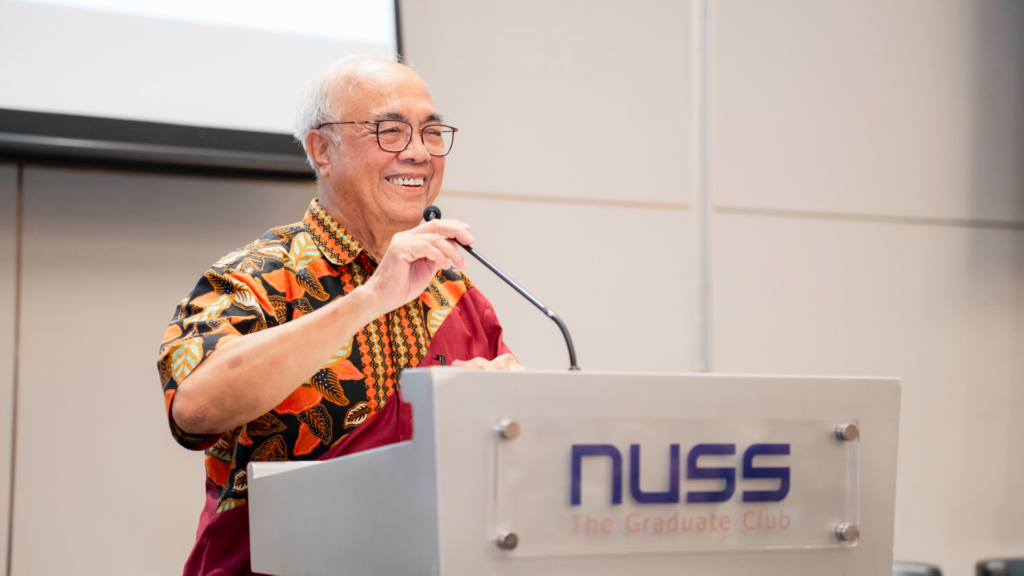
This is an issue particularly pertinent to Singapore, said Emeritus Professor S Vasoo, the symposium's Guest of Honour. "We need to ask if there is hope for low-income households to move beyond providing for basic needs to climb up the economic ladder," added the former Member of Parliament.
"We need to do more than overcome poverty - we must cover all the bases of financial equity, stability, security, safety, sufficiency and resilience," said Professor Jin Huang, Professor of Social Work at Saint Louis University in the United States, who was the symposium's keynote speaker.
Working together to build a sustainable financial future
The comprehensive goal of FCAB is reflected in its "whole life perspective" approach.
"Building financial capability is a cumulative process of knowledge and financial management built over time - we must keep walking with clients even after their immediate issues are resolved," said Adjunct Associate Professor Corinne Ghoh, NAI's FCAB Initiative Project Lead. "Although these journeys may be long, they are worth the investment."
Besides community cases like the Tan family, FCAB has also been applied to the prison setting.
"At Singapore Prison Services, we want to help inmates reintegrate into life after release. Financial vulnerability can be a potential stressor after they are released, and financial struggles can even lead them to reoffending," noted Dr Joyce Chan, Assistant Director, Community Partnership/Rehabilitation & Reintegration Division, at Singapore Prison Service (SPS).
"Through FCAB knowledge and skills, SPS officers can work with inmates on financial matters right from the onset of incarceration to help them," she added.
The results have been positive, with prison officers and volunteers reporting that the training has made them "more confident in guiding inmates on financial matters".
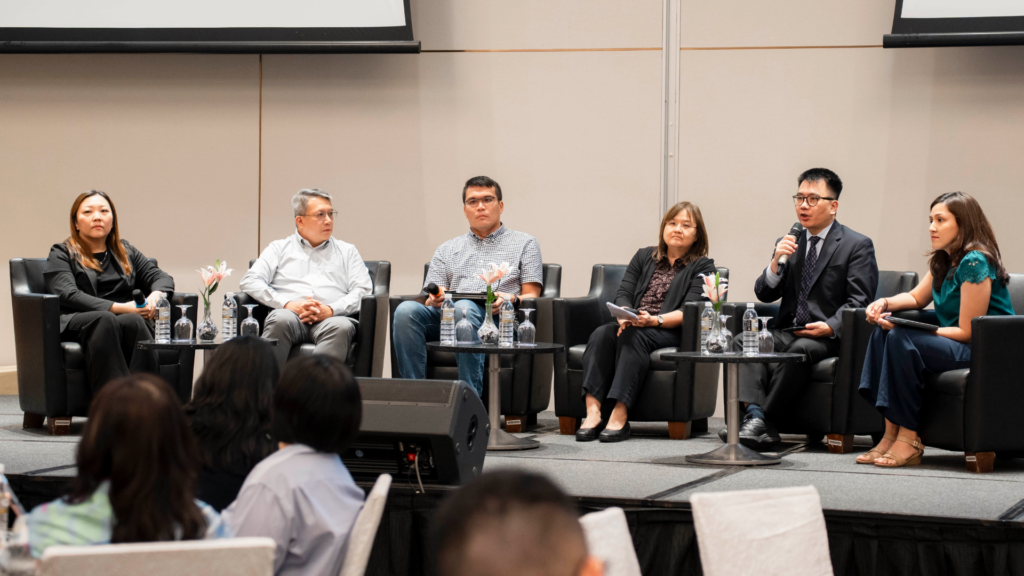
Speakers at the symposium believe that a concerted effort is needed in using FCAB approaches to provide an integrated nexus of help to support low-income clients in achieving sustainable outcomes.
"We need all the different levels - practitioner, organisational and even policy - to come together intentionally and work towards our common goal of improving social mobility," said Mr Barry Ryan Shah, Assistant General Manager, Regional Services (SSO@ Bedok & Geylang Serai), Ministry of Social and Family Development (MSF), in response to a question during the panel discussion.
Prof Huang added: "Practitioners as the first touchpoint can set clients on the course towards long-term financial stability, but organisations and policy makers need to understand the emerging needs on the ground from practitioners so that they can form better solutions, even through innovation such as fintech and artificial intelligence."
This story first appeared in NUSNews on 16 November 2023.
127 Recipients Honoured at Ceremonies Celebrating the Best of Student Achievements
IN BRIEF | 8 min read
- Smiles, hugs and congratulatory handshakes were all in order at the NUS University Cultural Centre on 27 and 28 October 2023, as NUS recognised the best of student achievements at the Tan Ean Kiam Arts Awards and the NUS Achievement Awards (NAA). A total of 127 recipients were honoured over the two evenings for their contributions to student life in the Academic Year 2022-2023.
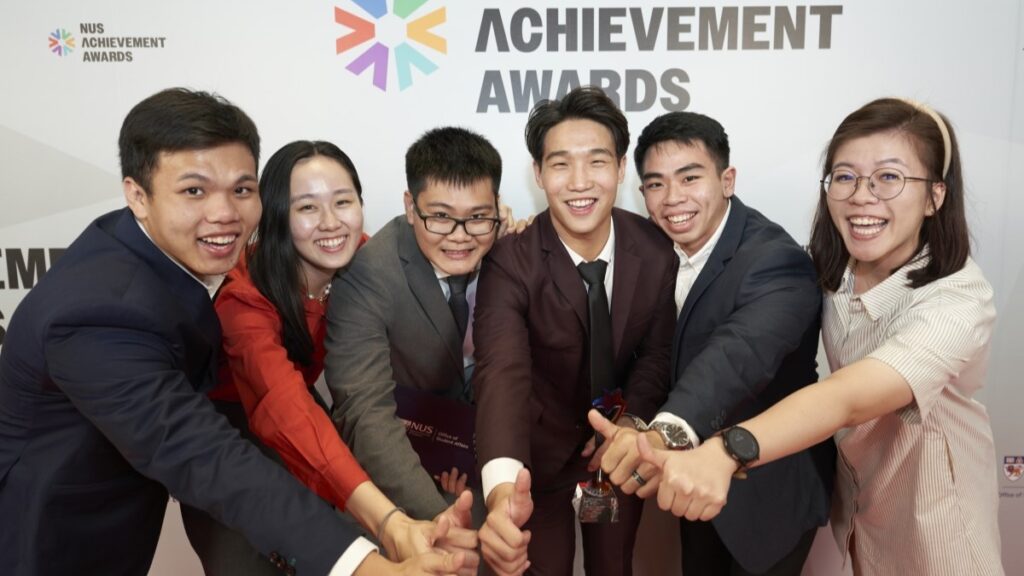
Smiles, hugs and congratulatory handshakes were all in order at the NUS University Cultural Centre on 27 and 28 October 2023, as NUS recognised the best of student achievements at the Tan Ean Kiam Arts Awards and the NUS Achievement Awards (NAA). A total of 127 recipients were honoured over the two evenings for their contributions to student life in the Academic Year 2022-2023.
The NUS Achievement Awards (NAA), formerly known as the Student Life Awards, is the most prestigious and only University-level award honouring the exceptional achievements of student life beyond academics. The Awards were renamed in 2023 to reflect and celebrate the full range and diversity of student life overseen by the NUS Office of Student Affairs.
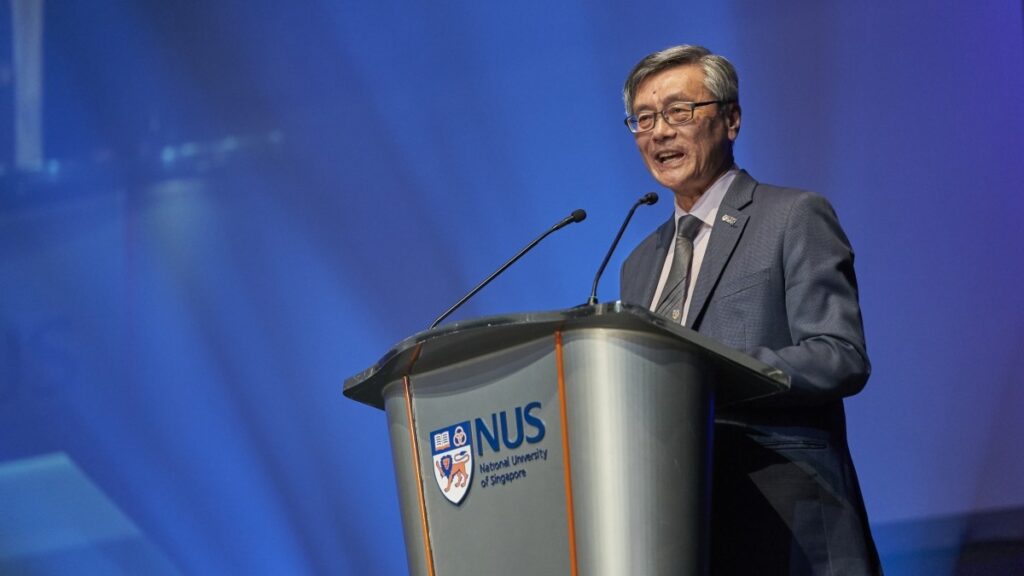
Guest-of-Honour NUS President Professor Tan Eng Chye, who opened the awards ceremony, commended the student leaders for their exceptional contributions during his speech.
"It is a fitting and joyous occasion, to celebrate the unique journeys of our students, how you have grown in mettle to scale new heights in what you set out to do," said Prof Tan. "This evening, the recipients of the NAA are outstanding individuals; they are role models and an inspiration to the NUS community. Not only have they excelled academically, but they are also trailblazers."
Excelling Beyond AcademicsAccolades in Community Impact, Sports, Competitions (General) and Leadership were given out in three tiers - Commendation, and where applicable, Merit and Distinction.
Coming up on top at this year's NAA were three outstanding students who were honoured with Distinction awards for their achievements in various fields:
- Competitive sports shooter Adele Tan Qian Xiu (Communications and New Media, Class of 2023) was awarded the Sportswoman of the Year Distinction award. While pursuing her studies at NUS, she represented Singapore on the international stage, including at the Southeast Asian Games, the Asian Games, and the 2020 Summer Olympics in Tokyo.
- Ryan Quah Kun Hao (Year 5, Department of Architecture) received the Distinction award in the Competitions (General) category. He is making his mark in the Architectural field, having won Gold at Nippon Paint's Asia Young Designer Awards in 2022.
- Final-year Social Work undergraduate Tan Wei Shuang received the Distinction award for her leadership as the two-term President of the NUS Community Service Club.
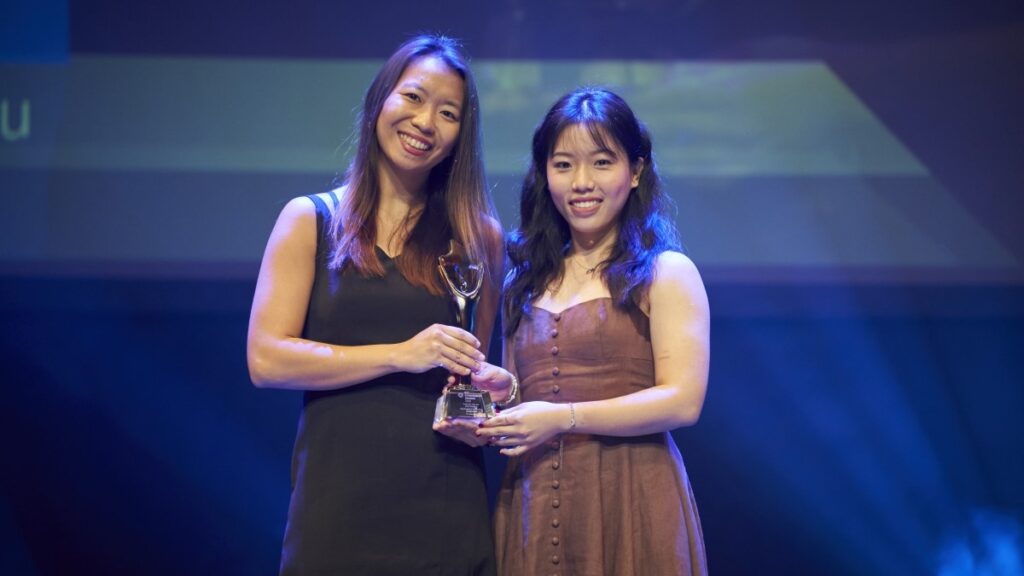
The honourees received their trophies from recipients of the same award in previous years, signifying the passing of the baton from one generation of outstanding student leaders to another. Likewise, the newly minted Distinction award recipients offered words of advice to budding student leaders in the audience.
"This award is only possible because of the efforts of all NUS Community Service Club members, and I would like to thank them for the opportunity to lead a meaningful student club," said Wei Shuang.
"To all juniors, I truly enjoyed my student life being a student leader and learnt a lot more about myself outside of academia. I encourage all of you to step forward and give yourself a chance to try some leadership roles," she added.

The NAA also included the Campus Choice Awards, which are awarded to recipients through voting by the NUS community. Pearlyn Koh (Year 2, NUS Business School), Women's Captain of both the NUS Table Tennis team and the SunNUS team from NUS Students' Sports Club, emerged victorious in the individual and group categories after a month-long campus-wide online campaign.
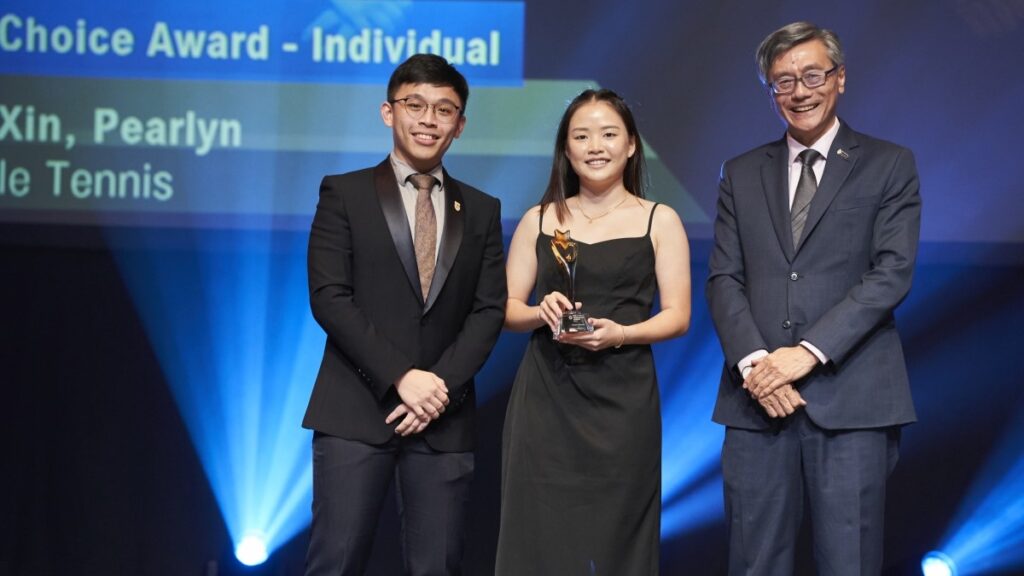
The evening's ceremony also celebrated 12 Staff Advisors who have offered their support and wisdom to various student groups at NUS throughout the year. The awards also recognised student organising teams of university-wide projects such as the Inter-Faculty and Inter-College Games, as well as NUSSU Rag & Flag Day, an event exemplifying the vibrancy of campus life, in the Recognition category.
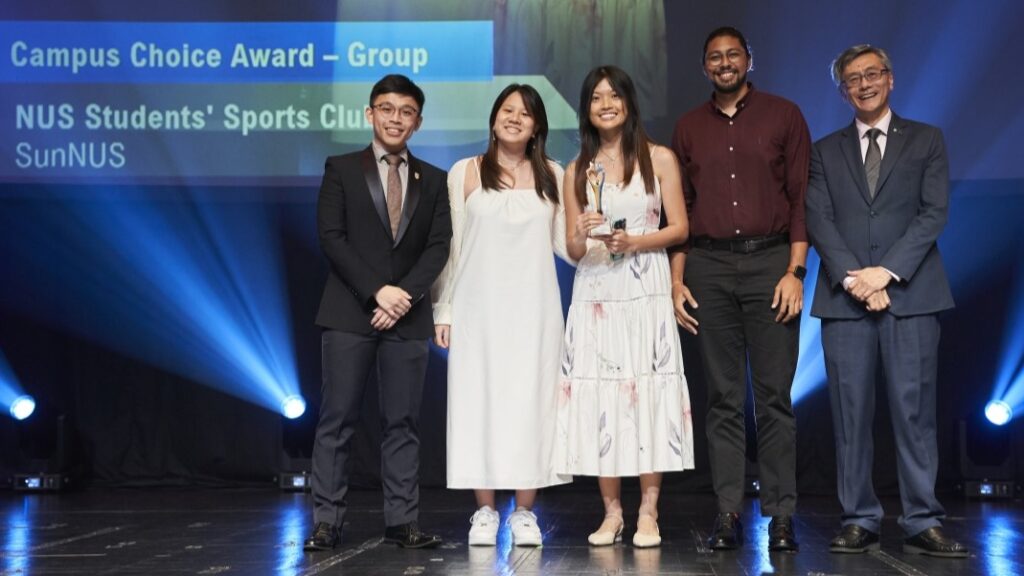
Celebrating the Brightest Stars in Arts and Culture
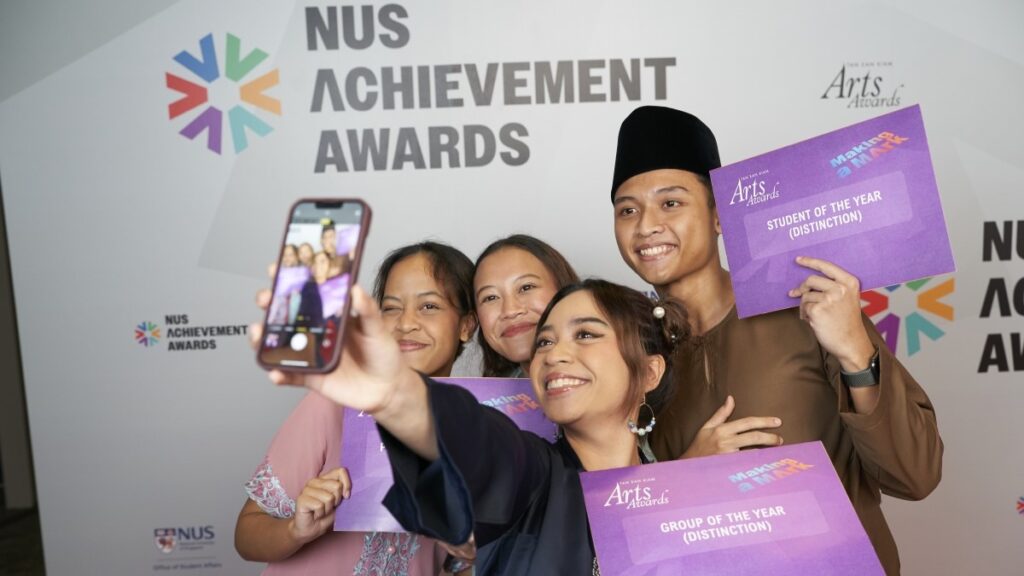
The Tan Ean Kiam Arts Awards on 27 October was a memorable night for Malay dance group NUS Ilsa Tari, which bagged the Group of the Year award. In addition, former NUS Ilsa Tari President (Academic Year 2022-2023) Muhammad Hariz Bin Emran also took home top honours as Student of the Year.
The Tan Ean Kiam Arts Awards celebrates student achievements in arts and culture in six categories, all of which had a respective distinction award winner this year.
- Student of the Year: Muhammad Hariz Bin Emran, President of NUS Ilsa Tari (AY22/23). Hariz is a Year 3 undergraduate at the Department of Malay Studies, with a second major in Communications and New Media.
- Group of the Year: NUS Ilsa Tari, the university's Malay dance group. With strong foundations in various traditional Malay dance forms, as well as the traditional Malay martial art of Silat, NUS Ilsa Tari experiments with both traditional and contemporary Malay dance to push the boundaries of creativity and modernity.
- Original Work of the Year: Bairagi by the NUS Indian Instrumental Ensemble.
- Production of the Year: Essentially Macbeth byNUS Chinese Drama and NUS Chinese Orchestra.
- Outstanding Community Arts Project of the Year: Helping Hands, Moving Bodies 3.0 by NUS Dance Synergy.
- Outstanding Alumni Recognition Award: Since graduating, Ms Ong Xue Min (Economics, Class of 2019), a founding member of NUS Stage Alumni, has held several masterclasses on improvisation and acting for NUS students.

Essentially Macbeth, which won the Production of the Year Distinction award, is a first-of-its-kind collaboration between NUS Chinese Drama and NUS Chinese Orchestra. Staged as a play-within-a-play, the performance follows the lives of young graduates who reconnect with theatre after a prolonged absence, questioning the relevance of the arts in our everyday lives.
Jin Jianzuo and Liew Chet Ming, President of NUS Chinese Drama and Vice-President of NUS Chinese Orchestra respectively in Academic Year 2022-2023, expressed their gratitude for the opportunity to have worked together to create Essentially Macbeth, and to NUS for honouring student achievements through an awards ceremony, a celebration shared by their parents, coaches and peers.
"These awards serve as an affirmation and recognition for the efforts that the students have put in," said Jianzuo, who is also a Year 3 student majoring in Data Science and Analytics. "It also makes us, the student leaders, believe that whatever we have done is truly meaningful," she added.
Moving Ahead TogetherArts groups have much to look forward to in 2024, when the arts category is integrated into the NAA, combining both ceremonies into one event to honour and celebrate the best student achievements beyond academics, cementing the role of student life as an essential part of a holistic university experience.
"I'm happy to hear that the arts are being included as part of the NAA from next year onwards," said Chet Ming, a Year 3 undergraduate at the College of Humanities and Sciences majoring in Chemistry and History.
"I've always believed that the arts have the potential to change people and make an impact on communities, and it's great that its influence is being recognised in a university-wide platform such as the NAA!" he enthused.
Watch the Event Highlights!
This story by the NUS Office of Student Affairs appeared in NUSNews on 8 November 2023.
NUS Alumni Awards 2023: Celebrating Outstanding Changemakers and Trailblazers
IN BRIEF | 8 min read
- NUS honoured the achievements of 21 outstanding alumni and three alumni teams comprising another 14 alumni, at the prestigious NUS Alumni Awards 2023.
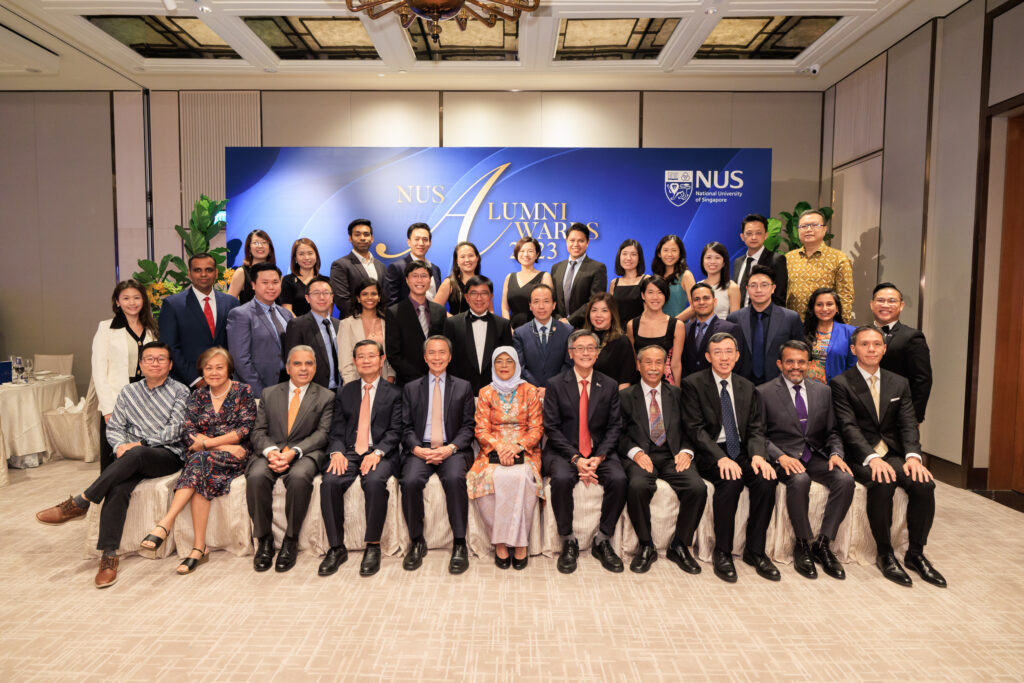
Twenty-one individual alumni and three alumni teams, comprising another 14 individuals, were honoured at the NUS Alumni Awards 2023 on 2 November.
Now in its 10th edition, the biennial NUS Alumni Awards recognise alumni who have distinguished themselves through significant and impactful contributions to their alma mater, society and the world.
Speaking at the celebratory event, NUS President Professor Tan Eng Chye noted that the award recipients have, “not only found success in their respective fields, but elevated what it means to be an alumnus or alumna of our institution: their achievements have enriched our culture, advanced our science, deepened our humanity, and bettered our society”. Read Prof Tan's speech here.
Eminent Alumni AwardThe Eminent Alumni Award was conferred on Mdm Halimah Yacob, former President of the Republic of Singapore, for her achievements in public service, as well as her exemplary service to the University as the former Chancellor of NUS from 2017 to 2023. Mdm Halimah Yacob
Mdm Halimah graduated in 1978 with a Bachelor of Laws from the University of Singapore and obtained her Master of Laws from NUS in 2001. She spent 33 years with the labour movement, rising to become Deputy Secretary-General of the National Trades Union Congress (NTUC). In 1999, she became the first Singaporean elected to the International Labour Organisation (ILO), where she served for 12 years, representing workers globally. She entered politics in 2001, serving as a Member of Parliament until 2017. In a career filled with firsts, she became the first woman appointed Speaker of Parliament in 2013; and the first woman to be elected President of Singapore in 2017, a role she held until 2023. For her service, she was conferred the Order of Temasek (With High Distinction), the nation’s highest civilian honour, this year.
As Chancellor of the University, Mdm Halimah conferred close to 76,000 undergraduate, master’s, doctorate and honorary degrees over six years, and presided over the Main Commencement ceremonies for graduates and honorary graduates. She also graced various NUS events, including NUSSU Rag & Flag Day 2018, NUS Bizad Charity Run 2020, the Bukit Timah Homecomings of 2018 and 2022, the Institute of Policy Studies’ Women’s Conference in 2021, and the 52nd UM-NUS Inter-University Tunku Chancellor Golf Tournament in 2023.
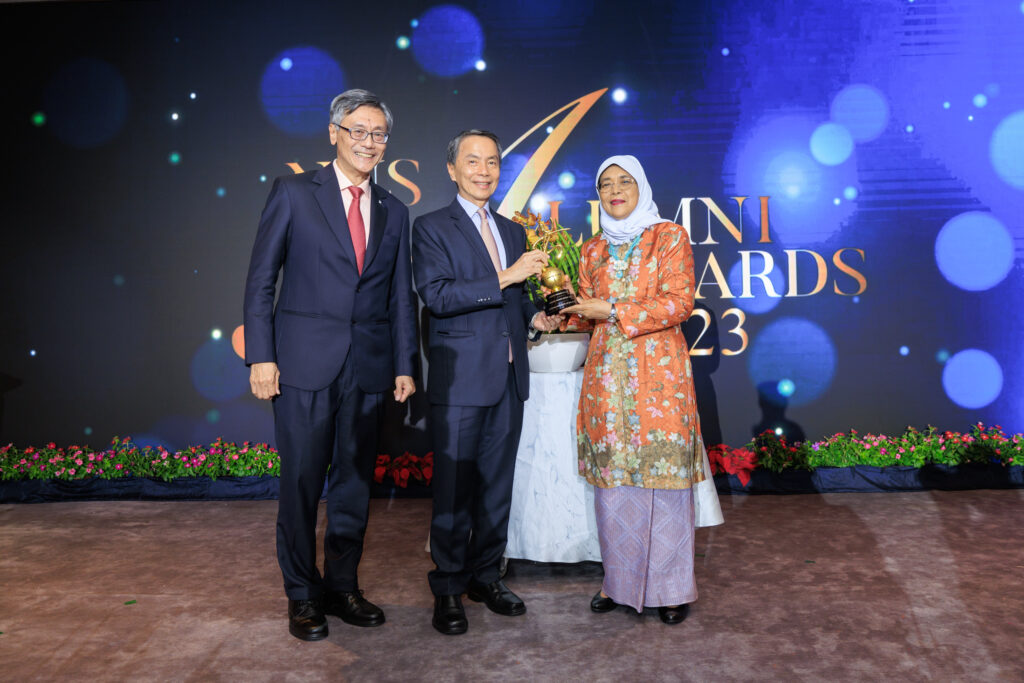
Delivering the citation for Mdm Halimah’s conferment, Prof Tan commended Mdm Halimah as an “inspiring leader” and “trailblazing alumna”, noting her “unwavering dedication to advancing the lives of individuals and communities, particularly the underprivileged”. Read the citation here.
“I am deeply honoured to receive the Eminent Alumni Award from my alma mater. NUS has played a formative role in my life, shaping not only my academic development but the values I have carried throughout my career,” said Mdm Halimah.
Watch this tribute video on Mdm Halimah’s contributions to the University and Singapore.
Distinguished Alumni Service AwardEight NUS alumni were conferred the Distinguished Alumni Service Award for their achievements in their chosen fields, as well as their excellent volunteer service to NUS, its predecessor institutions and/or the community.
These award recipients were:
- Professor Kishore Mahbubani (NUS Philosophy '71), Distinguished Fellow at NUS Asia Research Institute
- Mr Kok Heng Leun, founder of the Drama Box theatre group
- Ms Janet Lim Yuen Kheng (NUS Sociology, 75), former Assistant High Commissioner (Operations) at the United Nations High Commissioner for Refugees (UNHCR)
- Justice Andrew Phang Boon Leong, Senior Judge of the Supreme Court of Singapore
- Mr Ravi Menon (NUS Economics '87), Managing Director of the Monetary Authority of Singapore
- Mr Brian Tan Kai Piang, Regional President of Applied Materials Southeast Asia
- Mr Wong Kan Seng (NUS History and English '70), former Deputy Prime Minister of Singapore
- Mr Yatiman Bin Yusof (NUS Geography and Malay Studies '72), High Commissioner of Singapore to Kenya and Malay language champion
Twelve young NUS alumni were honoured for their achievements and outstanding contributions to their chosen fields.
These award recipients were:
- Dr Aishwarya Bandla, Regional R&D Manager at Paxman Coolers
- Ms Akanksha Batura Pai, Head of Strategy and Growth at Sinoda Shipping Agency
- Dr Rena Dharmawan, Assistant Dean and Assistant Professor at Duke-NUS Medical School
- Mr Faris Bin Ridzuan (NUS Sociology '15), academic tutor at the National University of Singapore
- Dr Izzuddin Bin Mohd Aris, Assistant Professor at Harvard Medical School and Harvard Pilgrim Healthcare Institute
- Mr Khoo Yi Feng (NUS Southeast Asian Studies and Psychology '17, Social Work (postgraduate diploma) '20), social worker and mental health advocate
- Mr Kwok Ka Ming Andre, founder of Good City Foundation
- Mr Samson Leo, Chief Legal Officer of Fazz
- Mr Raghuram Natarajan, Chief Executive Officer of Blueleaf Energy
- Mr Seah Li Song Shawn (NUS Economics '10), local history author
- Dr Shravan Verma, Co-founder of Speedoc
- Ms Frances Tho Siao Ting, Vice President of Sales at Numerix
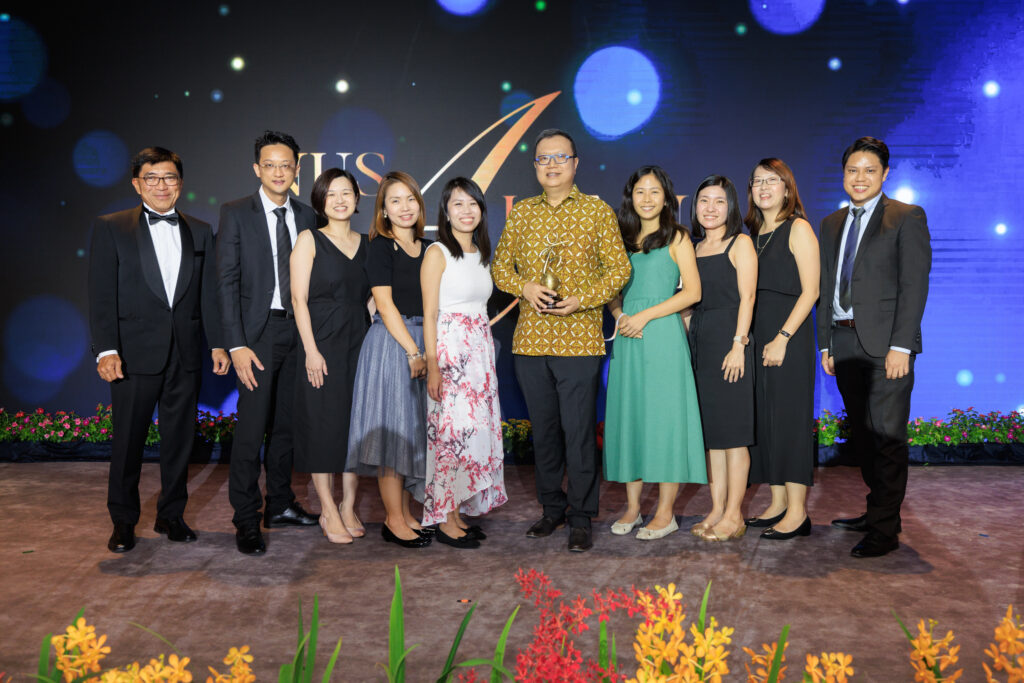
Team (Alumni) Award Recipients
The Team (Alumni) Award recognises the outstanding achievements of alumni teams who have collectively distinguished themselves in their chosen fields.
Three awards recipients were:
- Co-founders of Growthbeans: Ms Shamantha Yan Shiya (NUS Sociology '09) and Ms Shane Yan Shiyan (NUS Psychology '09)
- Co-founders of Janio Asia: Mr Ng Jun Kai and Mr Nathaniel Asher Yim
- REACH (Response, Early Intervention and Assessment in Community mental Health) Team, Institute of Mental Health: Ms Esther Chew Yuki (FASS '14), Dr Daniel Fung Shuen Sheng, Mr Ho Weng Siong (FASS '16), Ms Li Jiaying Grace, Mr Ong Guo Xiong Jeffrey (FASS '09), Ms Ong Tze-I Cheryl (FASS '08), Ms Sim Si Lin (FASS '12), Ms Tan Ke Jia (FASS '03), Mr Tan Zheng Xin, Jason (FASS '08) and Ms Kelly Yeo (FASS '07)
Read more about the NUS Alumni Awards 2023 recipients here and here.
This story by the NUS Office of Alumni Relations first appeared in NUSNews on 2 November 2023.
Flexible work arrangements can’t be for just well-paid professionals

Coming Together in a Whole-of-Society Approach to Address Singapore's Ageing Population Challenges
IN BRIEF | 5 min read
- The profiled alumna Ms Siti Adriana Muhamad Rasip is the co-founder of Empowered Families Initiative, which seeks to harness the strengths and abilities of low-income families by investing in their aspirations, and took home the top honours at the inaugural =Dreams Asia Breakthrough Prize Competition, a nationwide contest of ideas to eradicate poverty.
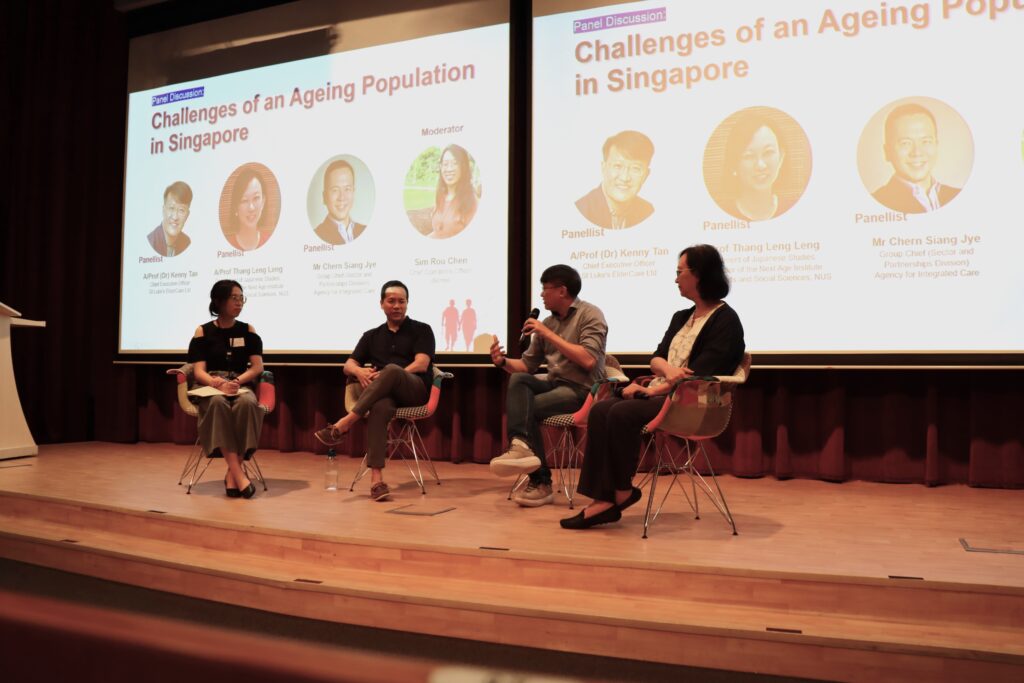
How can the whole of society be mobilised to tackle the challenges of an ageing population in Singapore? As the Singapore population demographic greys progressively, this question was at the centre of discussion at the annual symposium of the NUS Chua Thian Poh Community Leadership Centre (CTPCLC).
Held on 30 September at NUS University Town, the symposium gathered more than 120 attendees consisting of NUS students, staff and alumni, as well as stakeholders from the public and social sectors. Now in its 11th iteration, the in-person event saw changemakers, community leaders, and thought leaders discussing the issue of 'Challenges of an Ageing Population in Singapore', and how different organisations and individuals are doing their part to tackle this challenge.
The event was graced by Guest-of-Honour Mr Tan Kiat How, Senior Minister of State for Ministry of Communications and Information and for National Development, and Adviser to East Coast GRC Grassroots Organisations.
Noting that Singapore is home to some of the world’s longest living persons, Mr Tan highlighted the importance of closing the gap between life span and health span, adding that this is where everyone has a role. Mr Tan also reflected on his experiences of encountering seniors forming social networks and actively volunteering in the community, to overcome social isolation.
Expressing his delight that the CTPCLC curriculum has offered undergraduates a path to support these initiatives with their research and involvement in the community, Mr Tan expressed that this would bode well for our community, as it takes an all-of-community approach to tackle the challenges of an ageing society like Singapore.
Holistic Approaches to AgeingAttendees at the symposium delved into a thought-provoking hour-long panel discussion elaborating on efforts and plans to address the challenges of the ageing population in Singapore. Moderated by CTPCLC alumna Ms Sim Rou Chen, Chief Operating Officer of WeHiro, panellists Mr Chern Siang Jye, Group Chief, Sector and Partnerships Division, Agency for Integrated Care; Associate Professor (Dr) Kenny Tan, Chief Executive Officer of St Luke's ElderCare Ltd; and Associate Professor Thang Leng Leng from the NUS Japanese Studies and Co-Director of the Next Age Institute, NUS Faculty of Arts and Social Sciences), exchanged stories, insights, and recommendations on effectively addressing the challenges posed by an ageing population.
The discussion explored topics such as healthcare management, social support systems, and policy interventions, all designed to address key challenges faced by the elderly in our community. Assoc Prof (Dr) Kenny Tan captured the challenges succinctly in three words: helplessness, loneliness and boredom.
These thoughts were also echoed by Assoc Prof Thang Leng Leng, who spoke about loneliness and social isolation, even for elderly parents who may be living with their children, when conversations within the home could be limited to routine check-ins such as “Have you taken your medicine today?”
The discussion underscored the real need for elderly among the community to be actively engaged – and that the community can play a part through raising awareness of the former’s needs and supporting befrienders’ programmes, in ensuring that seniors can age amidst a strong social support network.
From Engagement to EffortSince its establishment in 2011, CTPCLC has continually challenged and empowered its students to explore the many facets of Singapore society and consider solutions to alleviate and address societal issues. CTPCLC students’ thoughtful analyses and implementations were showcased at the symposium through presentations, demonstrations and poster displays.

CTPCLC students and project partners Charmaine Song (Business, Year 4) and Tong Hui Yi (Social Work and Sociology, Year 4) took to the stage to elaborate on a year-long project they had embarked on in partnership with Thye Hua Kwan Moral Charities Limited.
During their project, which was titled ‘Reimagining the Active Ageing Centres (AACs) of Thye Hua Kwan’, Charmaine and Hui Yi interacted with seniors who were service users at Active Ageing Centres (AACs) in Ang Mo Kio. From the conversations, they gathered the seniors’ various opinions and hopes on how the AAC could further develop to serve Singapore’s ageing population.
Adopting a mixed methods approach that incorporated the use of observation work, semi-structured interviews, focus group discussions and online surveys, their study revealed that future AACs can play a vital role in serving as important sources of social, cultural and spatial capital for seniors: AACs provide social capital through important networks and social support among seniors; cultural capital by being a hub for acquiring new knowledge that will empower them; and spatial capital by being a potential ‘home away from home’, enabling seniors’ access to additional spaces of emotional and physical comfort.
The study also put forth key recommendations that highlighted how AACs can be further developed as a space for intergenerational communal socialisation, while serving as a rallying site for proactive seniors to engage in community-related volunteerism.

Beyond talks and discussions, attendees at the symposium also engaged with passionate CTPCLC alumni and students at a series of live demonstrations and poster displays detailing their various engagements with the community.
Amongst these was a demonstration by CTPCLC alumnus Mr Willoughby Niki Lee (College of Design and Engineering, Class of 2022) of his brainchild BoomBox - AI-based gamified activities innovated to help in seniors’ wellbeing, inspired by his love for the community and his engineering knowledge.

Ms Sim Rou Chen (Social Work and Psychology '22) also led an ageing simulation demonstration which allowed participants to experience what ageing could feel like, through the use of props and equipment like goggles, walking sticks and sandbags which hinder physical movement. Through this, participants developed a greater understanding and empathy of the physical, and thereafter, social and emotional, encounters and challenges that seniors could be facing in their daily lives.
Celebrating Tomorrow’s ChangemakersA ceremony was also held at the symposium to honour the achievements of CTPCLC’s Class of 2023, acknowledging their completion of the community development and leadership programme in NUS and celebrating their achievements in driving positive change within communities in Singapore.

“The Symposium has come at an opportune time as I begin my career in the community care sector,” said CTPCLC alumni Mr Kho Yong Xiang (Communications and New Media '23).
“CPTCLC has once again proven to be an invaluable platform for addressing the priorities of today. I heard peers discussing their ground-up research as well as connecting with partners and experts in the eldercare space. I am thankful for my time at the Centre and hope for more students to embrace the opportunities offered by CTPCLC,“ he added.
Beyond academics, the annual CTPCLC symposium provides a platform for like-minded individuals to share knowledge, foster collaboration, and inspire future leaders to address pressing community issues, making a difference to those around them. From their first tentative steps of taking courses at CTPCLC, the symposium also documents how students have been empowered to develop themselves further into passionate community builders and future leaders.
“In addition to the good work our alumni and students are doing in the community, it is really heartening that they continue to engage the Centre at an event like this one,” said Associate Professor Chng Huang Hoon, Director of CTPCLC. “I feel very proud to have been a part of their wonderful journey."
This story by NUS Chua Thian Poh Community Leadership Centre first appeared in NUSNews on 16 October 2023.
Undergrads Befriend Families with Children Living in Rental Flats
IN BRIEF | 5 min read
- The National University of Singapore is collaborating with the Singapore Ministry of Social and Family Development (MSF) in enabling NUS students taking a service learning course with NUS Social Work to befriend families under MSF's ComLink programme (which supports families with children living in rental housing).
- Singapore Minister of State for Social and Family Development Sun Xueling said at the announcement of this collaboration and programme that ComLink has seen about 430 NUS students joining as befrienders, making them the largest group of volunteer befrienders from any organisation to date.
Click through image below to read this piece.
This article first appeared in The Straits Times and NUSNews on 21 September 2023.
Prevalence and Correlates of Elder Mistreatment in Singapore
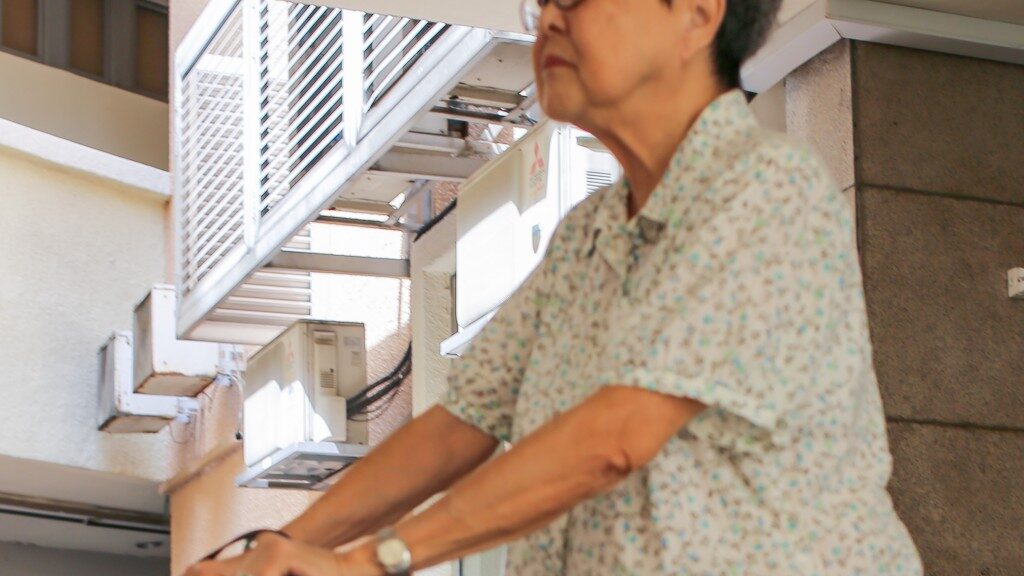
The Cleansed Hearts Initiative Honours Cleaning Workers
IN BRIEF | 3 min read
- About FASS undergraduate Nabil Zulkefly (NUS Social Work and NUS Sociology and Anthropology) and his initiative devoted to lifting the spirits of NUS campus cleaners, "The Cleansed Hearts".
Click through image below to read this piece.
This article first appeared in Suria News Online and on NUSNews on 3 August 2023.
Helping Others Help Better: How this Social Work Graduate Found his Calling
IN BRIEF | 8 min read
- While serving his National Service in the Singapore Police Force, Sim Jian Wen saw a side of the country that he had only ever seen in the movies – one involving loan sharks, violence and the occasional substance abuse. So he took the leap to pursue Social Work at the National University of Singapore (NUS).
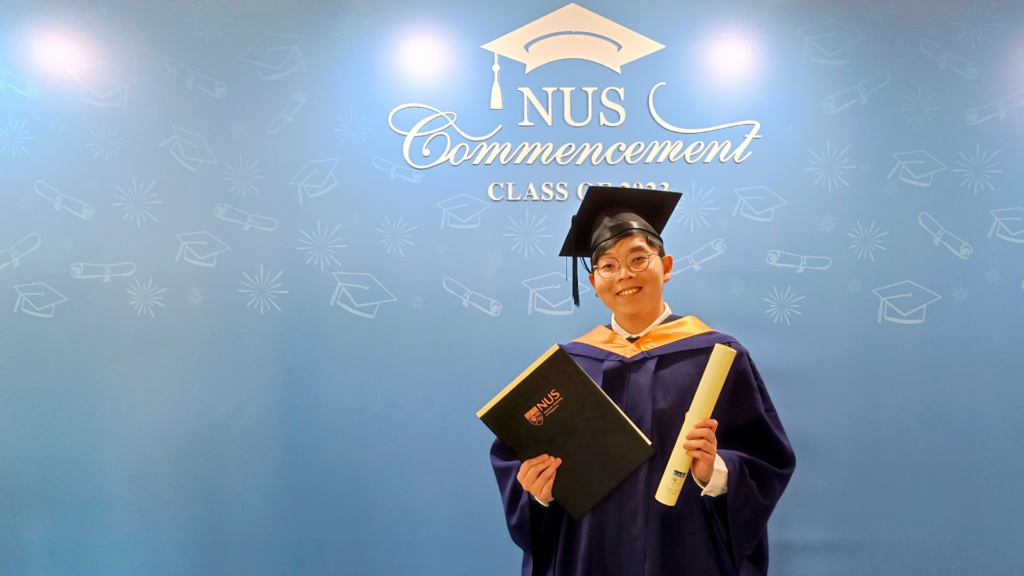
While serving his National Service in the Singapore Police Force, Sim Jian Wen saw a side of the country that he had only ever seen in the movies – one involving loan sharks, violence and the occasional substance abuse.
“I had never seen that side of Singapore before, but I found a lot of meaning in helping them,” he said.
At the time, Jian Wen had already secured a university’s offer to major in Business. But his experience made him re-evaluate his goals, opening his eyes to the work that needed to be done to uplift disadvantaged families.
“I often empathised with both the victims and the perpetrators of crimes, and naturally found myself thinking about how to help families beyond law enforcement,” he noted.
And so he took the leap to pursue Social Work at the National University of Singapore (NUS).
“People were shocked that I gave up a mainstream course for something more niche. But a life lived in the service of others is most meaningful,” he explained.
Power of Peer Support
He has no regrets. At NUS’ Department of Social Work – the first of its kind in Singapore when it opened in 1952 – he relished the insight he gained into what it means to serve the needs of the community. He had the chance to research real-world issues, as well as enrol in “comprehensive and hands-on” courses.

The shift to online lessons in 2020 meant that he had difficulty forming friendships in his first year. Thankfully, the 25-year-old found camaraderie in Ridge View Residential College (RVRC) where he planned events and welfare initiatives as part of the House Committee and Peer Mentorship Programme.
Inspired by stories of social workers helping others, he also led his college’s new Peer Student Supporters (PSS) group to promote mental wellness. As chairperson, he wanted to “help others help better” by equipping peers with the tools to support the community – for example through mock peer support sessions and by empowering them to run their own mental health events, such as “Mindfulness, Motivation and Matcha”.
Finding Strengths, Gaining Skills
Besides taking on leadership positions, Jian Wen participated in the RVRC Programme, a General Education programme at his college. Through the “Workplace Readiness” module, he learnt that his strengths lay in adaptability and strategic thinking.
Meanwhile, the social work module “Values and Skills in Helping Relationships” taught him how to communicate empathetically and sensitively.
These skills helped him thrive during his social work internships at Ang Mo Kio Family Service Centre Community Services and the Ministry of Social and Family Development (MSF). During his placements, he provided casework support and conducted research for a range of cases and clients, and learnt first-hand how to contribute to the wellbeing of society.
“It was a great way to use the social work skills and knowledge that I gained from my degree in a community setting,” he said.
While Jian Wen has taken on two social work internships, he also has a second major in psychology and a minor in economics. He quipped: “Having the flexibility was a blessing because I could choose what I was interested in. But it was also a curse because I didn’t know what to commit to!”
Paying it Forward
He credits financial aid from NUS with allowing him to make the most of his time at university. Thanks to the Higher Education Bursary and NUS Donated Bursary, he could lead a vibrant campus life without burdening his family.
Bolstered by the support, he ventured out of his comfort zone to seek new experiences.
“I wasn’t someone who enjoyed telling others what to do, but somehow I found myself in multiple positions where I had to lead,” said Jian Wen, who will graduate with Honours (Highest Distinction). “These experiences have been important in helping me to grow.”
The role played by social workers has evolved through the decades. Today, Singapore’s population is larger and generally older, and to meet the needs of this changing demographic, people who pursue social work must be nimble and resilient.
Jian Wen, who saw first-hand the importance of social work at the height of the COVID pandemic, is up for the challenge. He will get to put his research, leadership and social work experiences to good use when he starts a full-time job in policy and research at MSF.
Underpinning all of this is his desire to pay forward the help he received. “I wanted to learn more about policy and research in the government, because it’s such a big force that impacts social workers and clients,” he said.
“Most of all, I hope to make an impact on the lives of low-income families, and empower them in their efforts to uplift themselves.”
This story first appeared in NUSnews on 17 July 2023, as part of its coverage of Commencement 2023, which celebrates the achievements of NUS graduates from the Class of 2023. For more on Commencement, read stories and graduate profiles, check out the official Commencement website, or look up and tag #NUS2023 on NUS social media channels!
From Passion to Purpose: Dr Khoo Kim Choo's Impact on Early Childhood Education
IN BRIEF | 5 min read
- Under the Study Trips for Engagement and EnRichment (STEER) programme, a group of students from the Yong Loo Lin School of Medicine, College of Design and Engineering, and Faculty of Arts and Social Sciences embarked on an enlightening two-week journey to India, visiting Kerala, Lamagoan - a town near Darjeeling - and Kolkata.
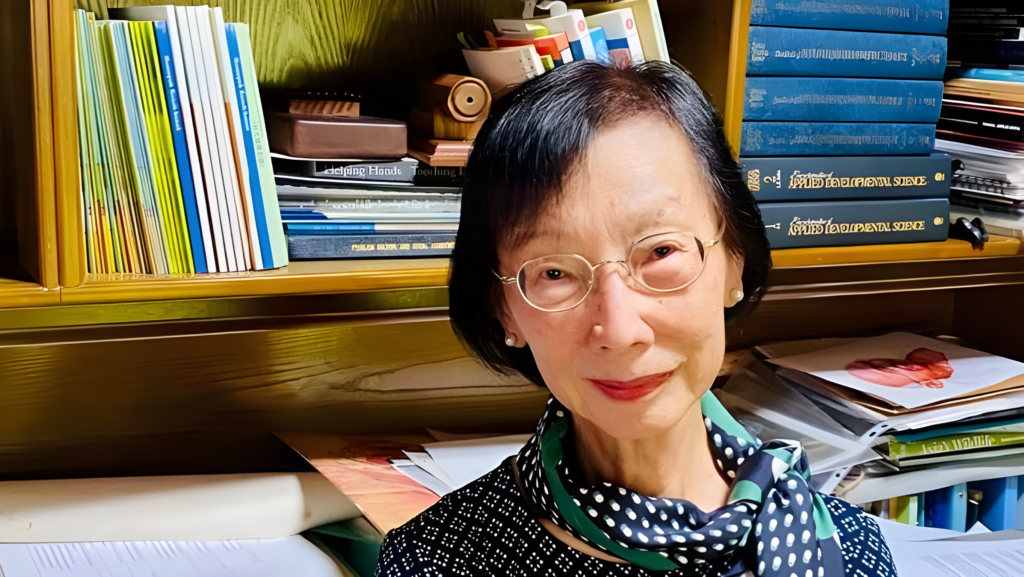
Dr Khoo Kim Choo (NUS Social Work, ‘70) has made significant contributions to the early childhood education sector in Singapore. Her achievements include the establishment of systems to train early childhood educators and authoring books to encourage local writers to create content for children. She also published several professional and academic articles related to children as well . She was very active on various Boards and Committees including as Advisor to the Preschool Qualification Accreditation Committee (PQAC) of the Ministry of Education and the then Ministry of Community Development and Sports. She received the Public Service Award (PBM) in 2007.
Beyond Singapore, Dr Khoo, a specialist volunteer with the Singapore International Foundation, led a team to train trainers in Vietnam and Myanmar over several years. She was also consultant to World Bank, UNICEF, UNESCO in various countries including, Vietnam, Cambodia, Indonesia, Mongolia and Romania – all related to early childhood development and education.
These accomplishments led to her induction into the Singapore Women’s Hall of Fame (SWHF) (by the Singapore Council of Women’s Organisations, SCWO) this year, and the admiration of her peers as well as the next generation of community leaders. “Congratulations, Dr Khoo for being admitted into the Singapore Women’s Hall of Fame and thank you for your service to our community and nation,” said SCWO President Ms Junie Foo at the induction ceremony, who held Dr Khoo and the other SWHF 2023 inductees up as role models for the next generation of women community and industry leaders to emulate.
We caught up with Dr Khoo recently to ask her about how she came to pursue a career in early childhood education and if she has any advice for others considering following in her footsteps.
Origins and Aspirations
What motivated Dr Khoo to enter the early childhood sector? As a young girl growing up in Penang, Malaysia, she was inspired by stories, particularly, the image of Florence Nightingale carrying a lamp watching over many wounded soldiers and wanted to become a nurse. However, family pressures prevented her from doing so as Dr Khoo’s father was strongly against her doing ‘dirty work’. Instead, he advised Dr Khoo that becoming a teacher is better for a girl. This was also reinforced by the societal norm at the time where only men went on to university. Left with limited options, Dr Khoo went on to study at the Teacher’s Training College in Kuala Lumpur.
However, before the course started, Dr Khoo found out that Singapore University (now the National University of Singapore) had recently launched a degree programme in social work. She quickly realised that this was exactly the course of study that could enable her to do the work she was passionate about – helping others. Without wasting any time, she hopped onto a night train to Singapore and embarked on her pursuit of a career in social work.
Finding Purpose
Upon graduation, she applied to be a social worker with the Social Welfare Department. She was shocked when she was sent to head a creche (childcare centre) instead. After almost a year, she was eventually transferred to work with delinquent girls and girls in moral danger and their families. This was where Dr Khoo was disillusioned as girls discharged from the Welfare Homes would often return for rehabilitation. Feeling that a much earlier intervention was critical, she went back to school and obtained a Master's degree and a PhD from the University of Washington, USA. In the course of her post-graduate work, Dr Khoo focused on resilience and working with multi-cultural children and families.
Making a Difference
Armed with new knowledge and insights, Dr Khoo returned to Singapore and was invited to join NTUC Childcare as a child development specialist to ‘train, train, train’. According to Dr Khoo, her entry to NTUC Childcare was a case of her being in the right place at the right time, because at the time the Bernard van Leer Foundation was looking to fund projects for disadvantaged children. Dr Khoo jumped on the opportunity and secured the support necessary for her three major projects.
The first project aimed to train NTUC childcare principals and teachers as childcare training was not available then. The project resulted in the Fundamental Course and the Intermediate Course in Early Childhood. The second project focused on parent and community engagement.
Dr Khoo's third and most impactful project was the establishment of the Regional Training and Resource Centre for Early Childhood Care and Education for Asia (RTRC Asia). Originally, RTRC Asia’s role was to be the focal point to support van Leer projects in Asia. The focus was on tapping one another’s expertise through conference themes of common interest, workshops on needed skills, and, learning journeys to each other’s programme.
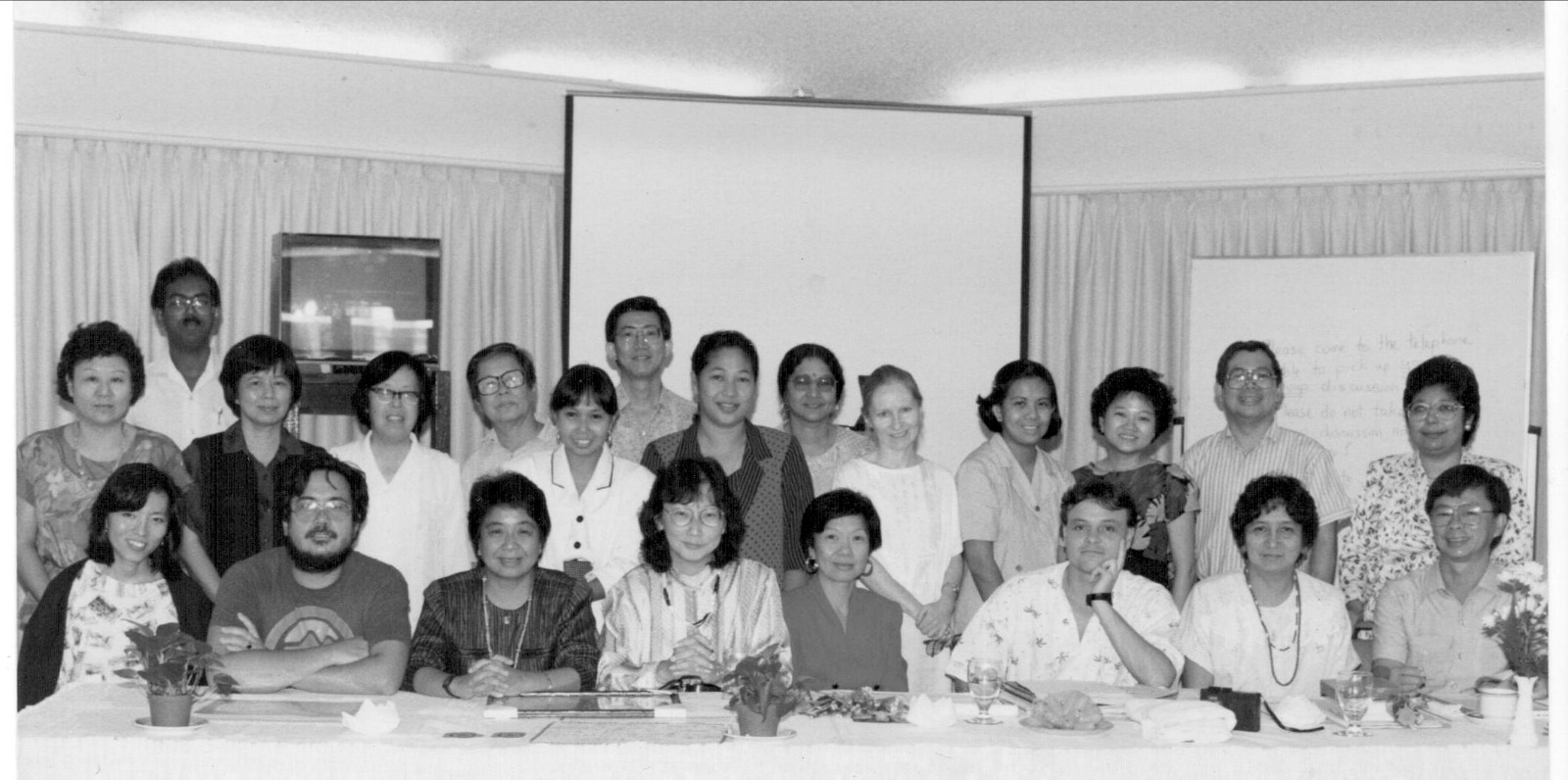 Dr Khoo at a conference alongside the group leaders of the Bernard van Leer projects in Asia
Dr Khoo at a conference alongside the group leaders of the Bernard van Leer projects in Asia
Dr Khoo felt it was essential to level up the profession for children to benefit more from preschool education. She used a training of trainers strategy to raise the level of teacher qualification from a certificate to a diploma level. She initiated a Masters in Early Childhood Education with Dr Joan Bergstrom of Wheelock College, Boston, USA. At the end of the Master’s Programme, graduates were selected and trained to implement the Diploma in Early Childhood Education, awarded by Wheelock College. Although not a requirement then, teachers were eager to improve their knowledge and skills and many signed up for the Diploma course under the RTRC Asia.
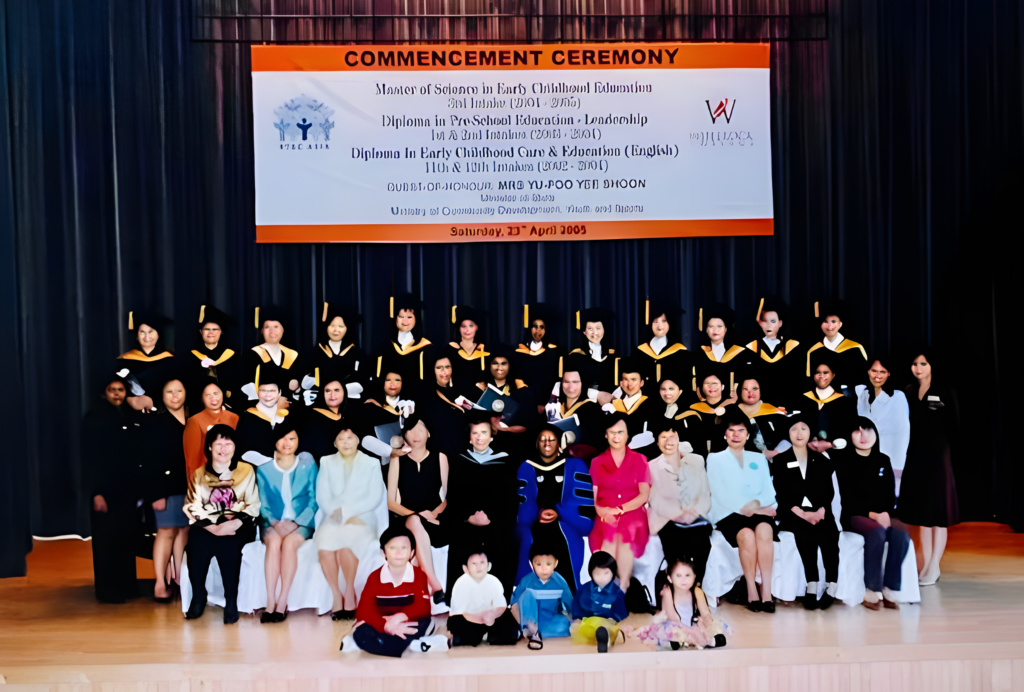 A commencement ceremony for the graduating classes of the Masters and Diploma programme attended by Dr Jackie Kenkins-Scott, then President of Wheelock College, Dr Joan Bergstrum and Dr Khoo
A commencement ceremony for the graduating classes of the Masters and Diploma programme attended by Dr Jackie Kenkins-Scott, then President of Wheelock College, Dr Joan Bergstrum and Dr Khoo
Dr Khoo was awarded an Honorary Doctorate in Education by Wheelock College which also set up the Khoo Kim Choo scholarship for leadership in Wheelock College .
Dr Khoo also had to foresight to understand that RTRC was limited in its capacity to train, but a polytechnic was different and would have the capacity to train more teachers more quickly. She approached the Principal of the Ngee Ann Polytechnic for a joint programme, leading to the formulation of the Diploma in Early Childhood Education course. The intention was for Ngee Ann Polytechnic to take over the programme completely which they did and was the first Polytechnic to offer the a course in Early Childhood Education.
Know Yourself, Be Yourself
As a practitioner herself, Dr Khoo understands what skills are necessary today for those in her profession to be effective. “Social workers need to have strong intrapersonal awareness and interpersonal intelligence,” says Dr Khoo. “With these skills, you will be very effective in helping our community – one that is now going through so much stress, volatility and upheaval.”
For those concerned about their path ahead, Dr Khoo shares that the most important step to take is to know yourself. “Find your hobbies and passions. Do something that you believe in and enjoy doing,” says Dr Khoo. “Give yourself opportunities to experience different things and know that nothing is ever wasted. Everything is a learning experience. Even the rough patches in life are replete with highly valuable lessons. Have a positive mindset and instead of focusing on all the problems and things not going your way, be grateful for all the things that’s going right, that’s there for you that we often take for granted.”
*Dr Khoo is the Founder-Director of Preschool for Multiple Intelligences.
Volunteer and Make a Difference: Dr Khoo in Vietnam
FASS Honours Alumni for their Profound Impact on Community and Nation
IN BRIEF | 8 min read
- This year’s honourees are Mrs Elizabeth Sam, a prominent banker; Mr Othman Bin Haron Eusofe, an influential unionist; Dr S Vasoo, a passionate social worker; Mr Benny Lim, a dedicated civil servant and policymaker; and Mr T. Sasitharan, a celebrated actor and respected voice in arts and culture – all of whom have dedicated their careers and lives to service and community in different ways.

The NUS Faculty of Arts and Social Sciences (FASS) paid tribute to five outstanding alumni for their service and contributions in various capacities towards Singapore’s nation-building, and the growth of the University and Faculty, at the recent 2022 Distinguished Arts and Social Sciences Alumni Awards (DASSAA) dinner.
The DASSAA was established in 2015 to recognise individuals who have made significant contributions to the nation and community, and dedicated their lives to the betterment and promotion of the arts and social sciences. Each of them played important roles in many areas, whether it was in shaping domestic and international policies, the business landscape, the creative environment, or in improving the lives of those around them.
This year’s honourees are Mrs Elizabeth Sam, a prominent banker; Mr Othman Bin Haron Eusofe, an influential unionist; Dr S Vasoo, a passionate social worker; Mr Benny Lim, a dedicated civil servant and policymaker; and Mr T. Sasitharan, a celebrated actor and respected voice in arts and culture – all of whom have dedicated their careers and lives to service and community in different ways.
Speaking at the awards ceremony, NUS Provost Professor Aaron Thean said, “The Faculty has honoured many alumni who have played important roles in many areas, be it in the shaping of local and international policies, the business landscape, the creative environment, or in improving the lives of NUS FASS students and beyond. The achievements of its graduates are one of the best testimonies to the work done by the Faculty.”
“The five outstanding FASS alumni who will be presented with the Distinguished Arts and Social Sciences Alumni Awards 2022 have excelled in their respective fields in public service, politics, finance, education and the arts. Their contributions to Singapore and their continued passion for what they do serves as an inspiration to many of us, especially to the FASS students who will follow in their footsteps and create their own legacies,” he added.
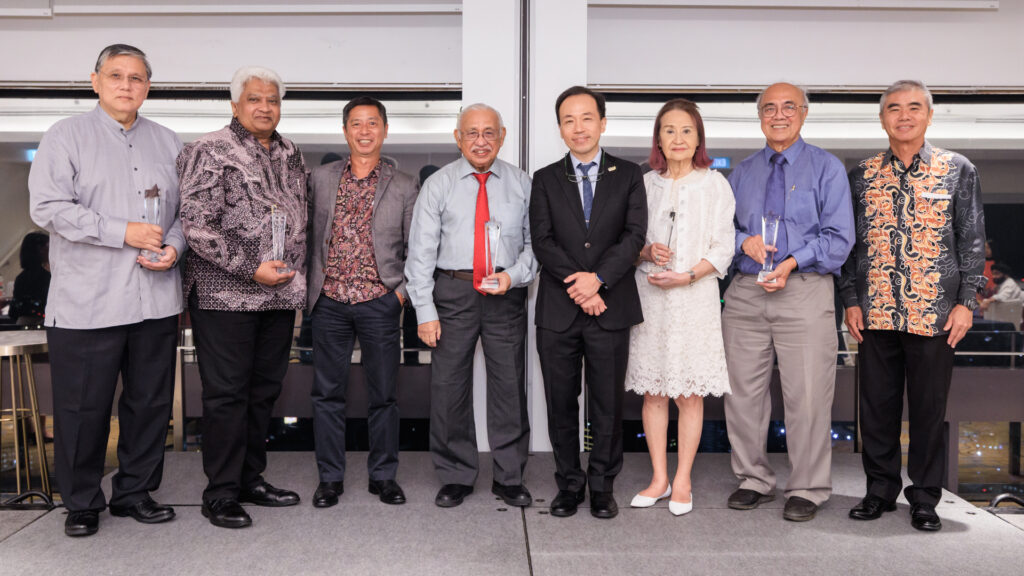
Inspiring the Next Generation of FASS Students
Mrs Elizabeth Sam is one of Singapore’s best-known female bankers. Her career spanned over 40 years, with the first half of it in the public sector where she played a key role in the growth of Singapore as a global financial centre. In 1996, Mrs Sam was awarded the Public Service Star (BBM), Republic of Singapore, for her contributions to the nation’s development as a global financial centre. The following year, she was recognised as one of the top 50 outstanding women globally in finance by Euromoney.
Currently a member of the Presidential Council for Minority Rights, Mr Othman Bin Haron Eusofe graduated with a Bachelor of Arts (Honours) from the then University of Singapore in 1964. He was a Founder Member of Yayasan Mendaki which was established in October 1982 to introduce programmes to help Malay students to improve in their educational performance. He continues to serve on the Mendaki Council. Mr Othman was also a key member of the NTUC team on the National Wages Council, and served on several Statutory Boards including the Public Utilities Board and the Civil Aviation Authority of Singapore.
Dr S Vasoo, Emeritus Professor in the NUS FASS Department of Social Work, has authored several monographs on social issues and has published various such articles both internationally and locally. He recently co-edited a book, “Singapore Ageing: Issues and Challenges Ahead”. He was awarded the Honorary Life Member of the Singapore Association of Social Workers for his outstanding contributions to social work in Singapore.
Mr Benny Lim is Chairman of the National Parks Board and the Chairperson of the Housing & Development Board. He is also Special Advisor to the Centre for Liveable Cities as well as Special Advisor to the National Security Studies Programme at the S. Rajaratnam School of International Studies (RSIS) at the Nanyang Technological University. He is also concurrently Chairman of Temasek Foundation CLG and Chairman of Temasek Lifesciences Laboratory IPC. Mr Lim started his career in the public service as a police officer, and went on to develop an illustrious career in the public sector, holding prominent roles in the Ministry of Home Affairs, Ministry of National Development and the Prime Minister’s Office, amongst others.
Mr T. Sasitharan, or more fondly known as Sasi to the arts community in Singapore, is widely acknowledged as one of the foremost thinkers and contributors to the development of the local arts scene. A former Philosophy teacher and arts journalist, Mr Sasitharan is a respected voice in discourses on arts and culture. His essays, commentaries and reviews, on the place of the arts in society, the value of culture, actor training, arts education, theatre criticism, aesthetics and creativity, have been published internationally while his speaking engagements have been at universities, conferences and arts forums around the world.
Congratulating the 2022 DASSAA recipients for their achievements, FASS Dean Professor Lionel Wee said, “Your achievements and your journey inspire the next generation of students who will follow in your footsteps. You have paved the way for them to build on your successes, to take risks, and to innovate in ways that will help make our world a better place. I want to congratulate each of the FASS Distinguished Alumni Award recipients. You have made your mark on the world, and you have done so with integrity, compassion, and a commitment to excellence.”
Read the full citation of the 2022 DASSAA recipients here.
This story first appeared on NUSnews on 10 May 2023.
NUS Researchers Propose Ways to Enhance Workfare for Low-income
IN BRIEF | 10 min read
- The research team – comprising Associate Professor Irene Ng of NUS Social Work, and Dr Ong EeCheng and Research Assistant Tan Zhi Han of NUS Economics – made their recommendations at a joint NUS Social Service Research Centre and Leap201 roundtable on 20 April 2023..
Click through image below to read this piece.
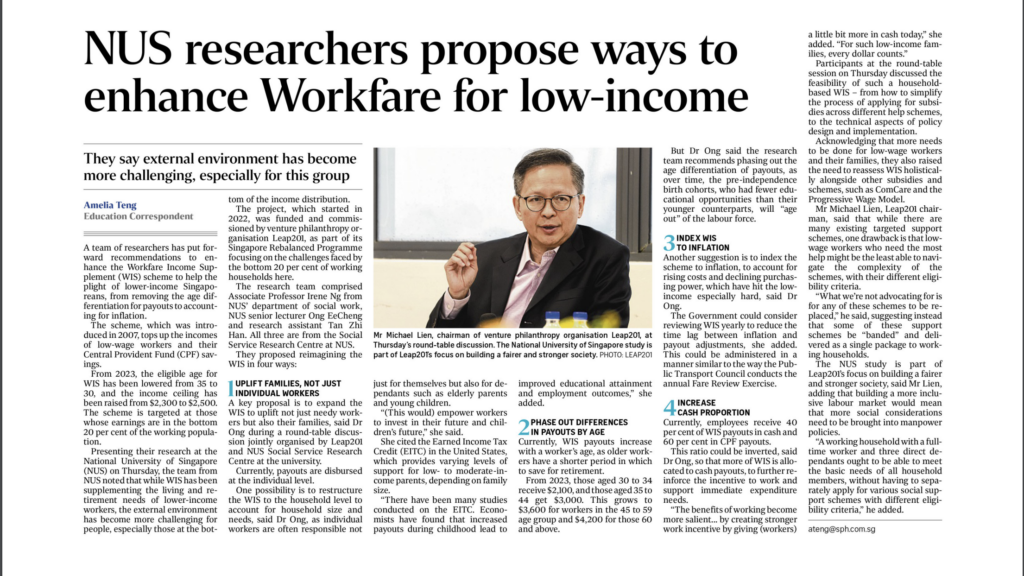
This article first appeared in The Straits Times and NUSNews on 21 April 2023.
NUS Social Work: Nurturing Change Agents to Serve the Community
IN BRIEF | 5 min read
- To mark this year’s World Social Work Day on 21 March 2023, hear from two passionate social work students, Year 2 undergraduate Freddy Ow Yong and Master's student Jean Loo, about their aspirations in choosing social work as a career and profession.
Social workers in Singapore play a vital role in helping, supporting and empowering vulnerable individuals and families in the community. Over the years, the social service landscape has evolved rapidly due to an ageing population, the rise of digital technology such as social media, and global destabilising events like the COVID-19 pandemic.
A key partner in the social work education landscape is the Department of Social Work at the NUS Faculty of Arts and Social Sciences. Established in 1952, the Department pioneered and trailblazed social work education in post-war Singapore. Offering just a two-year diploma course in those days, the Department has since expanded to offer a suite of programmes at the undergraduate, post-graduate diploma, Master’s and PhD levels.
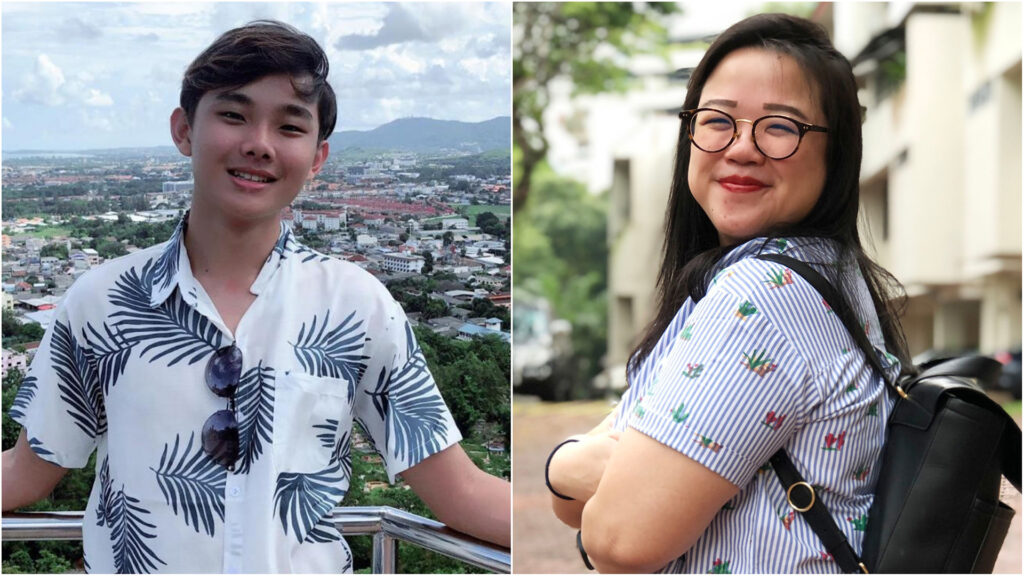
Now widely recognised as a leading international institute for social work education, practice and research, it counts many in the social work profession among its alumni – one notable example being former Singapore President S R Nathan, who was among the pioneer batch of social work students at the then University of Malaya.
To mark this year’s World Social Work Day on 21 March 2023, hear from two passionate social work students, Year 2 undergraduate Freddy Ow Yong and Master's student Jean Loo, about their aspirations in choosing social work as a career and profession.
Tell us something about yourselves. What sparked your interest in social work?
Freddy: ‘Pay it Forward' is a phrase I strongly believe in. Helped by various mentoring figures and welfare organisations across my life, I want to pay forward the kindness I received to those in need. Previously, I was pursuing a diploma in Psychology Studies at Ngee Ann Polytechnic. During that time, I did my internship at Yong-en Care Centre and had the privilege of shadowing a social worker and assisting his work. That experience was especially impactful for me, as I found great fulfilment and purpose serving the residents living in the Chinatown community. The opportunity to witness their growth and achievements, no matter how small, first-hand, was incredibly rewarding, and that sparked my interest in social work.
Jean: I was trained as a journalist and documentary photographer focusing on social issues. With an interest in the field, as well as community arts, I went on to start a ground-up inclusive arts movement, Superhero Me, which allowed me to develop strong relationships with families across various disability types. It was there that I developed my passion in disability inclusion which seeks to provide people with disabilities with the same opportunities to participate in society as others. It was also there that I witnessed how a social worker helped a child in a complex family situation in a respectful and empowering manner. The incident moved me to want to learn more about social work.
I also worked at a philanthropic organisation – the Lien Foundation, and I am now with the Rainbow Centre serving as Deputy Director of the Advocacy and Community Engagement team.
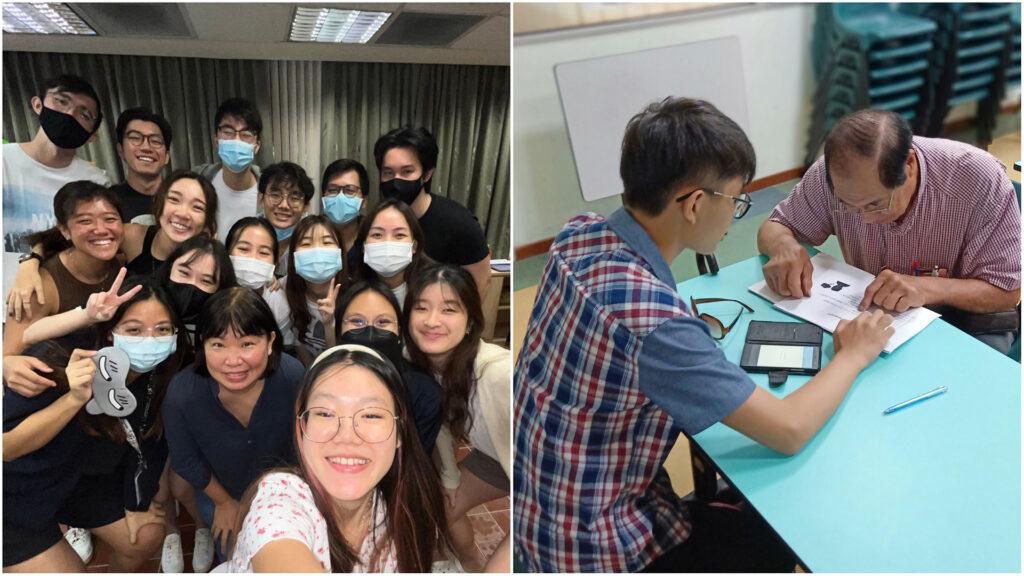
What attracted you to the Social Work degree programmes at NUS and how has the experience been like so far?
Freddy: The field placement module which attaches students to social service agencies to help them apply their knowledge from the classroom in real-world settings stood out for me.
I like that our professors are receptive to hearing students’ opinions, and that my classmates are some of the most empathetic and understanding individuals I have ever met. They are a source of support in my studies and personal life.
Currently, I serve as the President of the Society of Social Work Students (SSWS) in NUS, working alongside inspiring peers to serve the social work student body.
Role-play is a component that is also unique to many of our social work classes as we are given the chance to assume the roles of clients, social workers, or observers, and use the skills learned to apply to different scenarios. Through this process, we are able to provide feedback to one another and strive towards becoming better social workers.
Jean: At the Rainbow Centre, I have been exposed to projects and services, not just from an advocacy and community development perspective, but also collaborating, listening and supporting my colleagues in problem-solving. This has deepened my interest to understand social work as a way of navigating system challenges and mobilising system resources so that I might be able to contribute to better education, care and support for those we serve and enable them to achieve a quality of life.
I enrolled in the Master of Social Work programme at NUS to become more effective at my work, and I like that the coursework-based programme allows me to continue working and applying what I learn to my work at the same time. I really enjoyed the modules on the management of human service organisations and disability social work, which allows me to act on my passion in disability inclusion by understanding how to navigate challenges as a young leader.
Working and studying at the same time is a balancing act, but I always look forward to coming to classes because of the conversations I have with my classmates and lecturers which are encouraging and recharging.
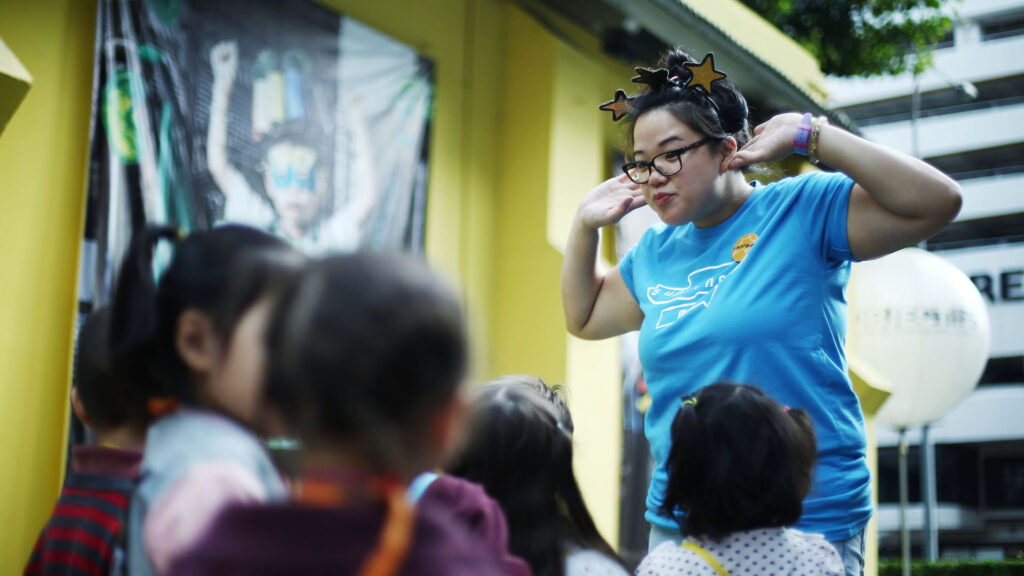
What are your plans after graduation?
Freddy: I am eager to embark on my career journey as a social worker working at a family service centre that caters to the needs of individuals or families from low-income backgrounds. As I am from a low-income family, I want to help those who are poor, given my personal experience growing up in a similar setting.
Jean: I believe that this graduate degree will enable me to deepen my understanding of social services and understand perspectives by different professionals. Eventually, I aspire towards non-profit leadership and management, to influence systems with creativity and community and inspire new solutions to tackle old problems.
This story first appeared on NUSnews on 21 March 2023. Singapore has identified the Care Economy, which includes social work, as one of three growth areas in the recent inaugural Skills Demand for the Future Economy report. Thus, the demand for trained social work professionals to address complex community challenges is expected to grow. If you are interested in entering the field, visit the NUS Social Work website to learn more about our social work degree programmes.
NUS Open House: More than 7.7M Visitors Drawn to Action-Packed Showcase over 10 Days
IN BRIEF | 25 min read
- NUS Open House 2023 saw a strong showing by visitors eager to find out about the University’s academic programmes, as it returned in from 25 February to 6 March. Some 7.71 million visitors attended the physical and online showcase which involved 3,071 faculty and staff, students and alumni.
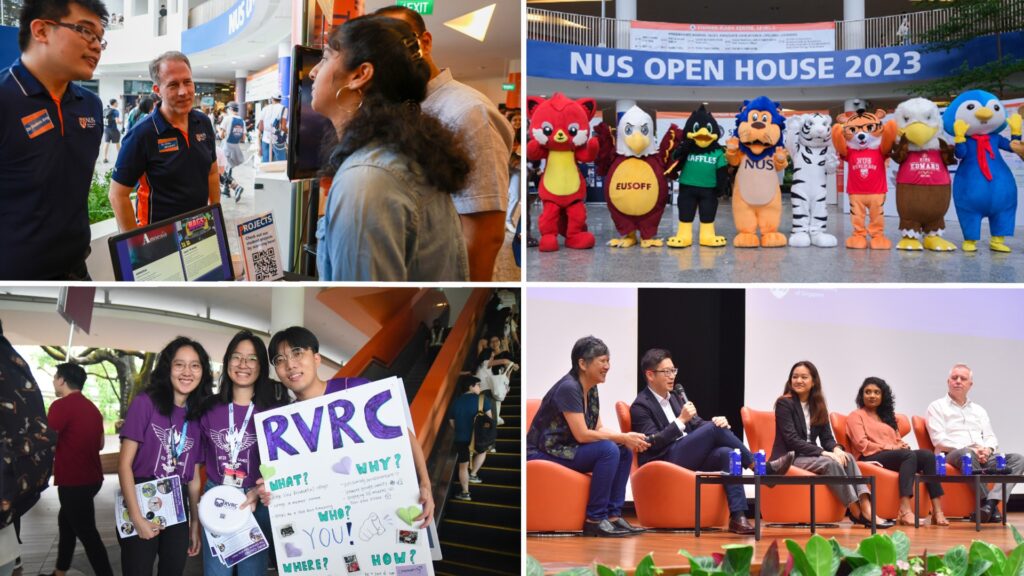
NUS Open House 2023 saw a strong showing by visitors eager to find out about the University’s academic programmes, as it returned from 25 February to 6 March. Some 7.71 million visitors attended the physical and online showcase which involved 3,071 faculty and staff, students and alumni.
Kicking off the 10 action-packed days were the informative virtual talks, webinars, and social media sessions. The on-campus event on 4 March saw packed crowds at the programme booths, talks, special classes, campus tours, student life performances and residential venues despite the heavy downpour. Prospective students gained valuable insights from faculty members, explored the University’s extensive global opportunities, as well as its diverse entrepreneurship platforms and lifelong learning courses, giving them a comprehensive overview of what NUS has to offer.
“I really enjoyed meeting the professors and students who are from the courses I'm interested in as I gained many insights from them on life in NUS and the various possibilities that are open for exploration,” said prospective student Karthika Warrier, an alumna from Raffles Institution who is considering applying to NUS Computing or the College of Humanities and Sciences (CHS).
Jasmine Chiam, an alumna from Nanyang Junior College (NYJC) who is interested in applying to CHS and NUS College, agreed. “The programme was well-run despite the fact that it was raining,” she said. “I felt that it was well-curated for students with different interests.”
A draw for many prospective students were CHS, the newly launched NUS College, and the College of Design and Engineering (CDE) – the University’s recent interdisciplinary pathways aimed at meeting the evolving demands of the workforce.
Addressing Shared Challenges with the Humanities and Sciences

CHS, which provides an enhanced undergraduate experience for students of the Faculty of Science (FOS) and the Faculty of Arts and Social Sciences to pursue breadth and depth across academic disciplines, showcased its Common Curriculum throughout the Open House.
Currently accepting its third intake, it held talks on hot topics such as sustainability, food science and technology, and mental health to demonstrate how students can apply various perspectives to address complex real-world issues.
The panel entitled “Why Sustainability and Climate Change Matter” saw speakers from the Geography, Japanese Studies, Anthropology and English, Linguistics and Theatre Studies departments weighing in on the topic from their respective disciplines. Another session by the Department of Food Science and Technology explained how its programme applies principles from chemistry, biology, engineering and nutrition to address issues such as food safety and security, as well as the careers its graduates can pursue.
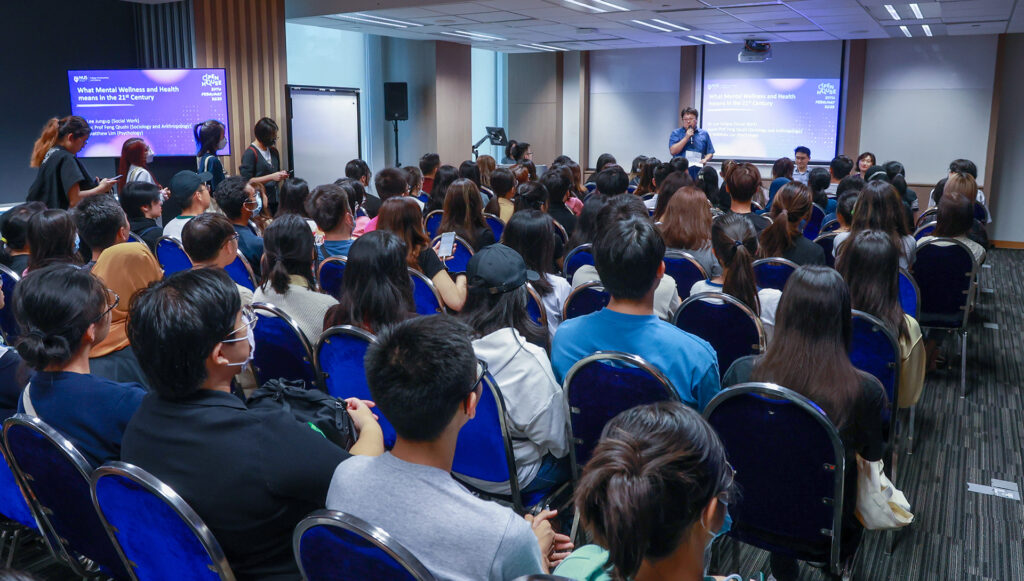
In the same vein, the panel “What Mental Wellness and Health Means in the 21st Century” saw speakers from the Social Work, Sociology and Psychology departments discuss perceptions of mental health in society. Dr Lee Jungup, an Assistant Professor in Social Work, pointed out the close relationship between social work and psychology. “Many of our Social Work students consider a double major with Psychology,” she said, noting that social work emphasises the practical while psychology is more theoretical and clinical in nature.
Jasmine, the NYJC alumna, said the various informative talks reaffirmed her decision to apply to NUS. “The NUS College tour as well as the CHS Common Curriculum sharing were particularly informative. They made the programmes seem quite appealing and I am looking forward to applying for both,” she said.
For some like Christian Chua, an alumnus from the NUS High School of Math and Science, attending the Open House talks helped clarify the career options available for the different programmes.

Christian, who is currently considering the Medicine, Pharmacy, and Pharmaceutical Science programmes, attended the Pharmacy talk and booth, where faculty members of different specialisations touched on the various career pathways and the collaborative practices of the discipline.
“It was useful that they discussed the different careers that Pharmacy graduates had gone into so I knew a degree in Pharmacy wouldn't just limit me to community or hospital pharmacy but also to the R&D, drug approval side, or the business side as well,” he said.
Shaping the Future of Design and Engineering
Meanwhile, there was action aplenty over at both the online and in-person Open House by CDE, which is accepting its second intake. Officially launched in November 2021, CDE was a merger of the Faculty of Engineering and the School of Design and Environment, ramping up the distinctive interdisciplinary experience at NUS.
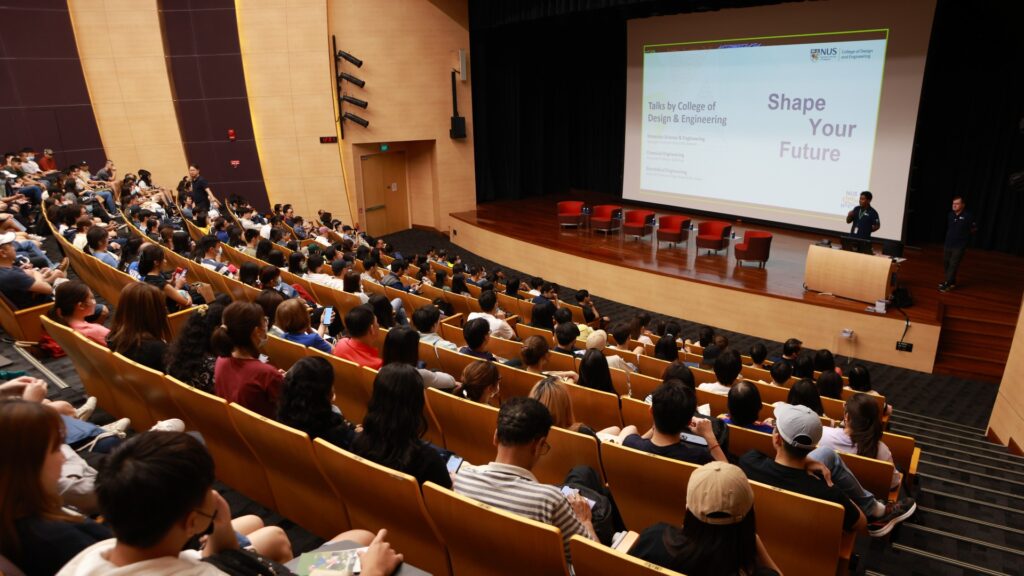
From the Common Curriculum and the multidisciplinary education model, to the Student Exchange Programme and future career prospects, CDE faculty and students shared their insights on a plethora of topics with prospective students.
The talks, such as the one on Biomedical Engineering, Chemical Engineering and Materials Science & Engineering, also provided valuable information. Prospective students learnt how undergraduates are exposed to a range of interdisciplinary topics with global-scale applications in class, and how NUS engineers are taking on the world’s biggest challenges, such as clean energy.

The talk on Architecture, Industrial Design and Landscape Architecture also saw a large turn-out. Discussing the breadth and depth of CDE’s curriculum, it touched on how students will be equipped to face the 21st-century challenges through their education in CDE.
Kaisyn, who is graduating from Nanyang Polytechnic this year, said, “I appreciated that they covered the basic skills and activities done throughout the curriculum. It allowed me to confirm that the Industrial Design course is relevant to my study and career plan.”
The in-person Ask-Me-Anything sessions with student panels also allowed participants to get their burning questions answered.
Tee Jia Hong, a graduate of Anglo-Chinese Junior College who intends to apply to Industrial and Systems Engineering (ISE) and attended the student sharing, said, “By listening to the experience from the ISE senior, I am able to get the hang of the academic and co-curricular prospect of being an ISE student.”
Over at CDE’s Rise of the Robots campus tour, participants were given a look at the Advanced Robotics Centre, which displayed projects such as an autonomous wheelchair, an artificial robotic arm, and a haptic feedback machine.
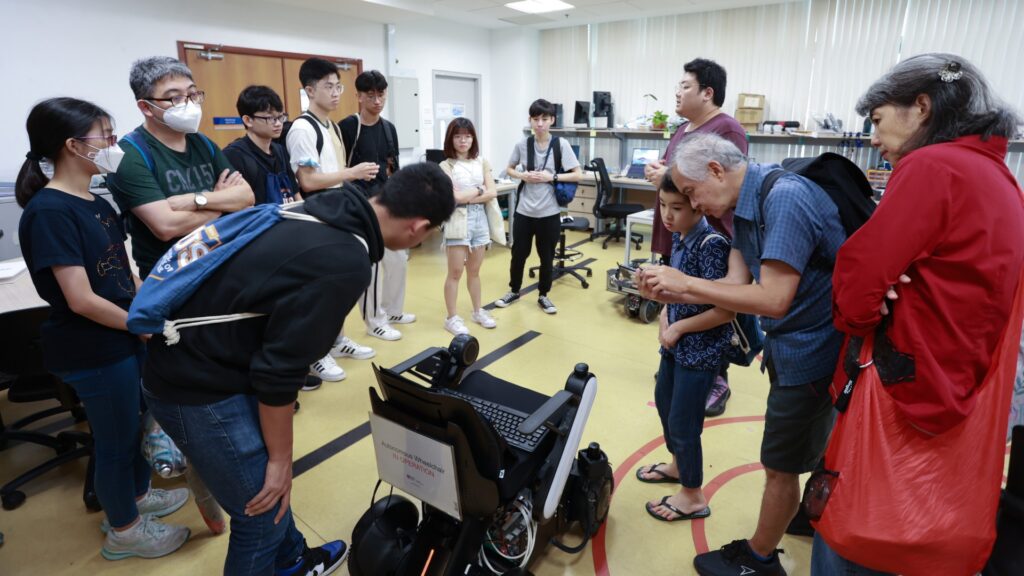
Robert Lim from Singapore Polytechnic, who attended the tour, said, “It was a memorable experience . . . I was able to learn more about what the courses have to offer and what undergrad students have accomplished in NUS.”
Exploring experiential learning
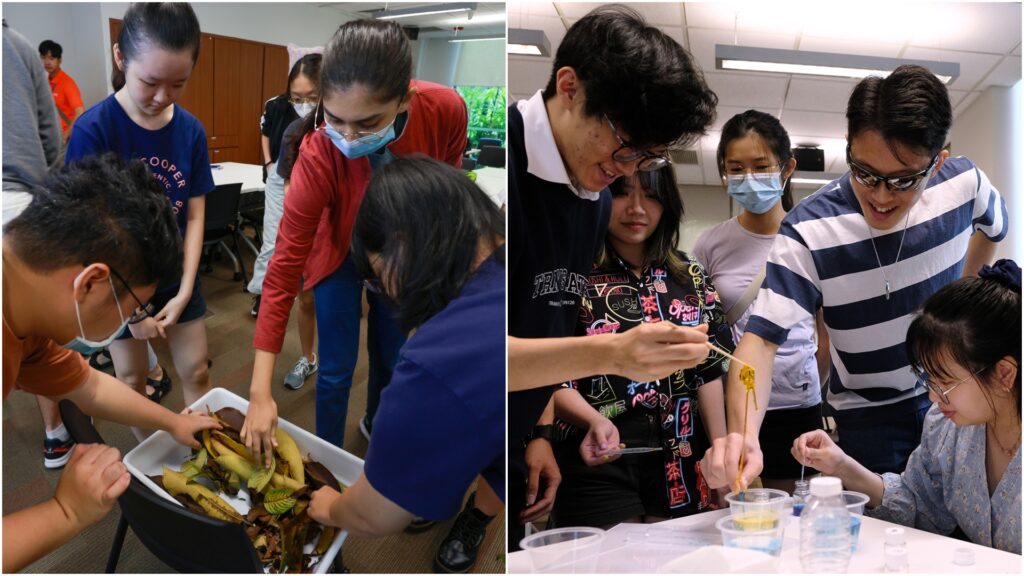
NUS College, Singapore’s first honours college, offered a glimpse of its flagship experiential learning programmes during its online and physical showcase. Faculty members highlighted the Impact Experience programme, where students develop solutions to real-world issues with community partners, and the Global Experience programme, which immerses them in global cities for specially curated courses and field visits based on specific themes.
The college, which is accepting its second intake, also held special classes for prospective students to get a feel of its small-group seminar-style lessons. Dr Ang Yuchen’s special class introduced his field course Biodiversity and Natural History in Singapore, which combines scientific concepts with the visual and language arts and environmental philosophy.
“I found the sample lessons useful in helping me not just get a sense of how lessons are conducted over at NUS College, but also how my potential Profs are like as teachers and facilitators,” said Eugene Teo, an alumnus of Raffles Institution, explaining that small, collaborative discussions was better suited to his learning style. Attending the Open House “also gave me a better understanding of the people I will be interacting with and the environment in which I would be studying in upon entering university life”, he added.
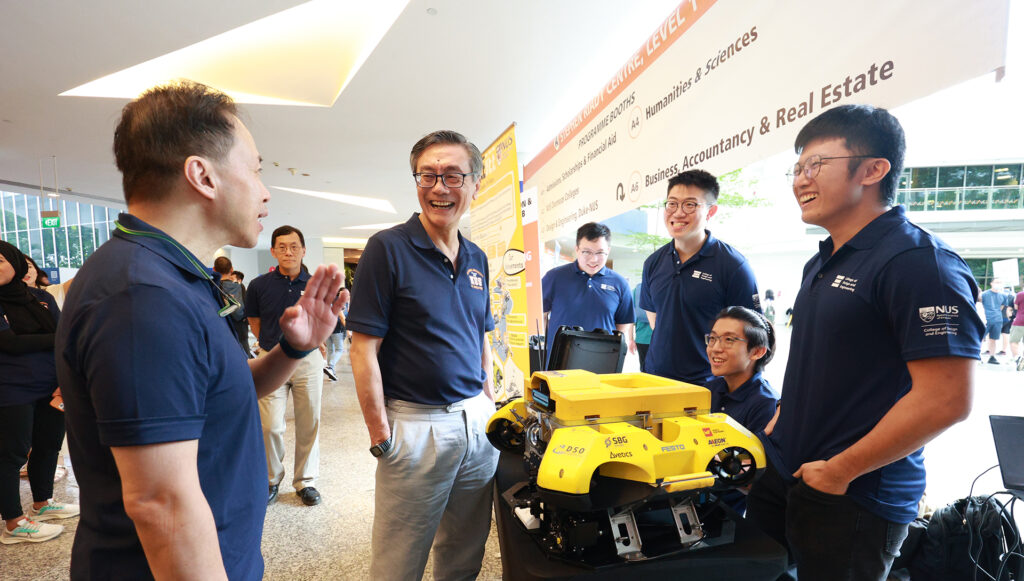
Interactivity was a prominent feature of the Open House. NUS Nursing offered visitors a chance to try basic wound treatment and resuscitation, while NUS Law held moot demonstrations at its Bukit Timah Campus.
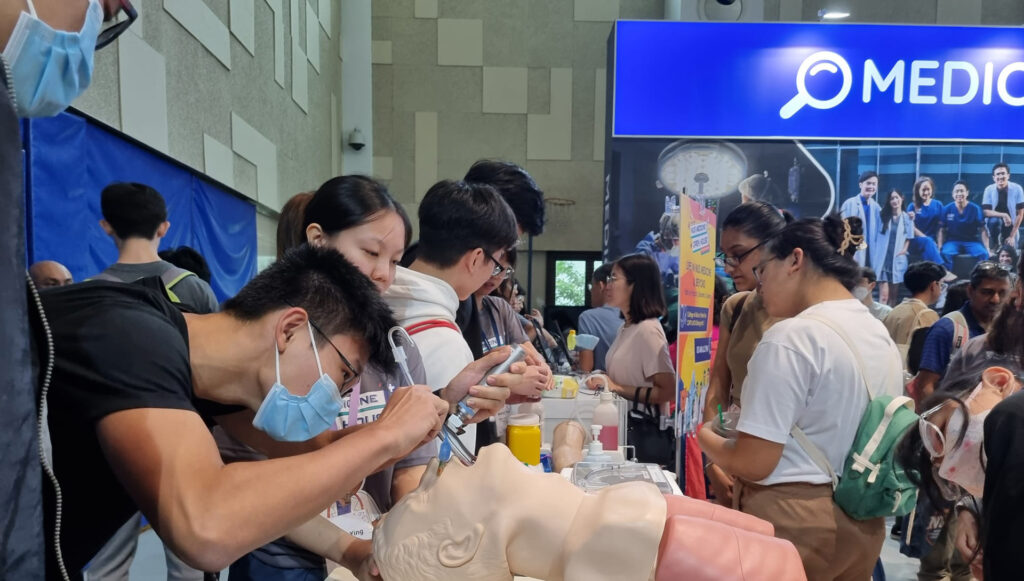 |
 |
Aqirah Bte Azam, who will be graduating from Temasek Polytechnic in May, had the chance to see the Nursing students in action and attended a talk by its alumni. “Hearing their experiences in NUS and their careers have given me the courage to pursue my aspirations in nursing”, she said.
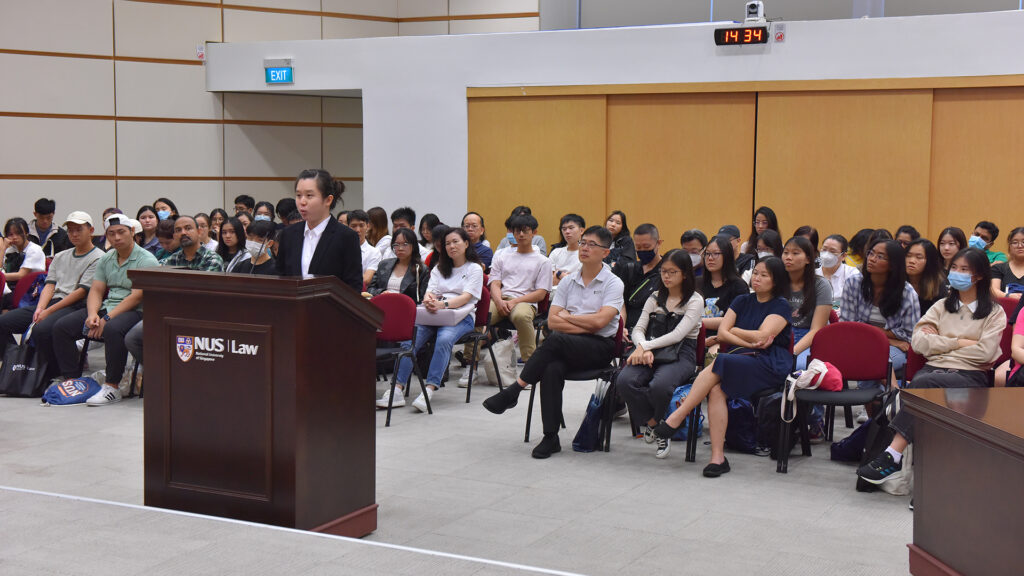
Smorgasbord of Student Life
Visitors also got a taste of the vibrant NUS student life on display. Student clubs and societies, as well as the Hall and Residential College (RC) interest groups, put their best foot forward at the Student Village.

Visitors were wowed by the striking moves of NUS Wushu, the energetic cheerleading displays of King Edward VII Hall’s KE Titans, and the snazzy K-pop dance moves of the Korean Cultural Interest Group. They were also treated to renditions of catchy tunes from Mandopop group NUS CAC Voices, acapella group NUS Resonance, Raffles Hall rock and jazz band RHockerfellas, and many more.
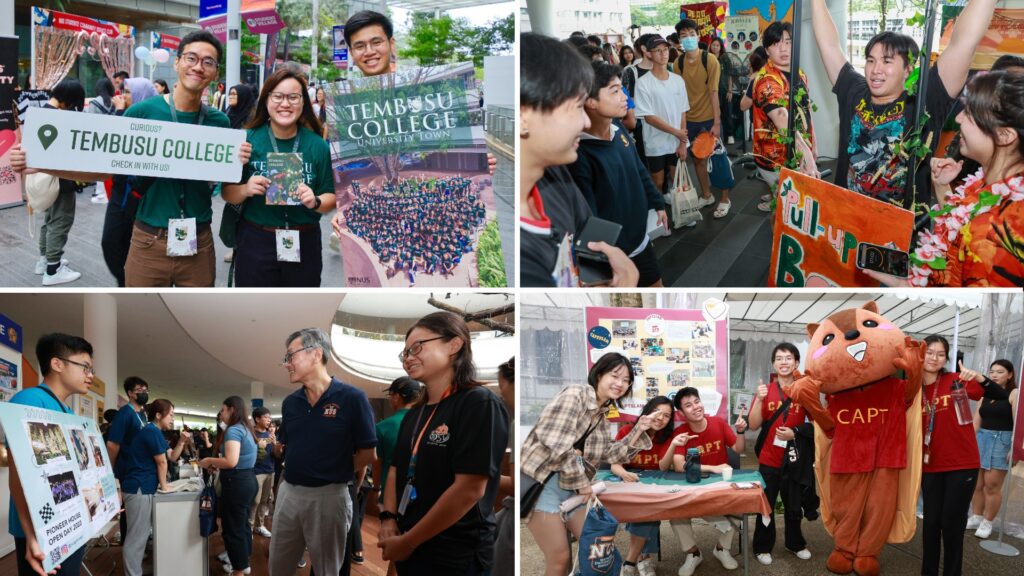
Representatives from the RCs, halls, and houses were present to offer prospective students the inside scoop on the on-campus experience. Complemented by A-Day-in-the-Life videos and 360° virtual tours, the booths, talks, and Ask-Me-Anything panels by student leaders gave participants a sense of the residential options at their fingertips.
“The House Life talk was the most enjoyable and informative event to me since the masters and students really explained to me what living in houses was like, while keeping us engaged through jokes and videos,” said Jia Hong.
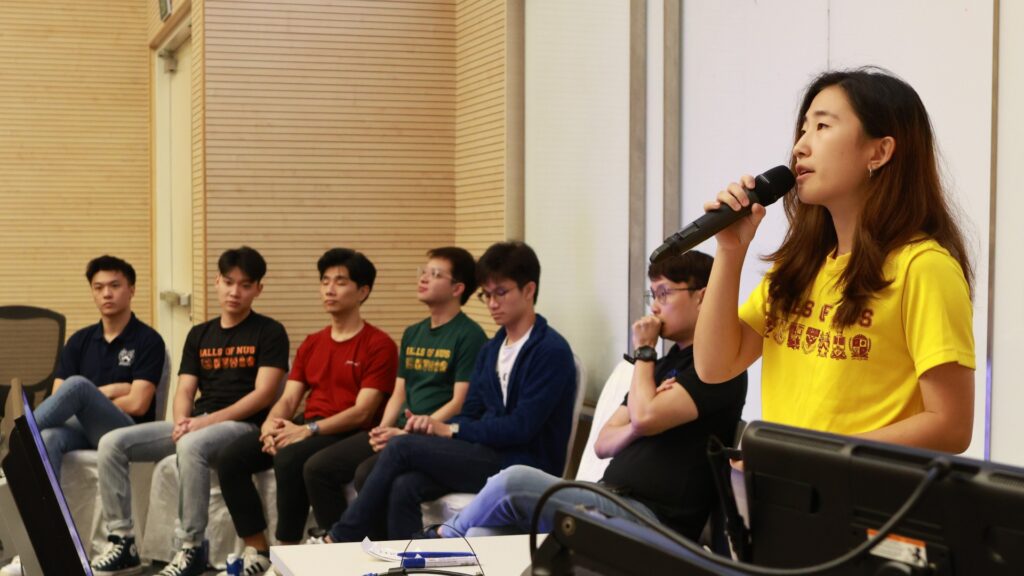
Charlotte Toh from Singapore Polytechnic, said the Halls talk helped her better understand the hall culture and admission criteria.
Guided in-person tours of the various halls and residences, such as King Edward VII Hall, Tembusu College, Ridge View Residential College, and Residential College 4, opened a window to the close-knit community of residential life.
Samuel Liu, who graduated from National Junior College, said, “The well-guided tours and booths set up for each RC that I visited gave me a good indication of which RC would be most suitable for my character and goals.”
This story first appeared on NUSnews on 9 March 2023.
FASS Inspiring Mentor 2022 Award Winners Announced

The NUS Faculty of Arts and Social Sciences is proud to announce the winners of the 2022 FASS Inspiring Mentor Awards.
Congratulations to:
- Assoc Prof Melvin Yap Ju-Min, Associate Professor, Department of Psychology
- Assoc Prof Robin Loon Seong Yun, Associate Professor, Department of English Language and Literature
- Dr Amazaki Osamu, Senior Lecturer, Centre for Language Studies
- Dr Natalie Pang Lee San, Senior Lecturer, Department of Communications and New Media
- Dr Kamalini Ramdas, Senior Lecturer, Department of Geography
The NUS Career Compass 2023
IN BRIEF | 5 min read
- Find out how the University has developed and broadened our curriculum to better prepare our graduates for the swiftly evolving workplace, and how interdisciplinary learning can help students solve complex issues in our society.

In collaboration with CNA938
How does NUS cultivate highly sought-after talents in the workforce of the future?
Find out how the University has developed and broadened our curriculum to better prepare our graduates for the swiftly evolving workplace, and how interdisciplinary learning can help students solve complex issues in our society.
This story first appeared on NUSnews on 23 February 2023.
CHS at NUS Open House 2023: Download the FASS Essentials on 27 February 2023
IN BRIEF | 10 min read
- On 27 February, get the full download on the essentials of academic programmes, student life, career preparation, overseas opportunities and financial aid at CHS via Zoom in the ‘virtual’ edition of CHS@NUS Open House 2023.
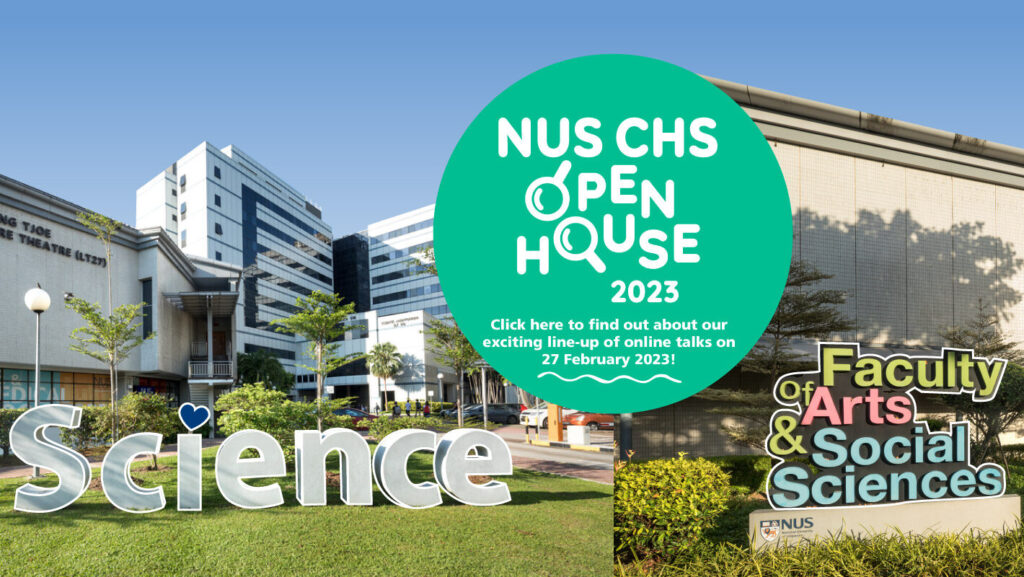
If you have not already marked your calendars for two dates with the NUS College of Humanities (CHS) during NUS Open House 2023, do it now!
On 27 February, get the full download on the essentials of academic programmes, student life, career preparation, overseas opportunities and financial aid at CHS via Zoom in the ‘virtual’ edition of CHS@NUS Open House 2023. Go to https://bit.ly/CHSatNUSOH2023-Virtual for the full 27 February programme.
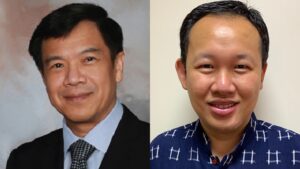
Then prepare to come on-campus on 4 March to engage with our award-winning faculty members, advisors and students to experience interdisciplinary education and explore your future vocation. Go to https://bit.ly/CHSatNUSOH2023-OnCampus for the full 4 March programme.
To help you plan your way through the lineup of FASS-specific talks and activities, read on for some of our highlights on 27 February 2023 that ought not to be missed.
Academics at the Forefront
The online edition of CHS@NUS Open House is meant to provide you with as comprehensive a briefing of what CHS, and its component Faculties of Arts and Social Sciences, and Science, have to offer students.
Academics is at the forefront and the day starts with a session devoted to the CHS Core Curriculum (9:00 – 11:00 am), a specially curated interdisciplinary programme that provides unprecedented freedom to choose the pursuit of breadth and depth across a broad spectrum of disciplines. This session will be led by Professor Sow Chorng Haur, Vice Dean (Outreach & Admissions), NUS Faculty of Science (FoS), and Dr Noorman Abdullah, Assistant Dean (External Relations & Student Life), FASS.

Associate Professor Luke O'Sullivan
The CHS Cross-Disciplinary Programmes
Three one-hour talks devoted to introducing Cross-Disciplinary Programmes (XDPs) offered by CHS will be running concurrently from 11:00 am. One programme FASS offers that embodies the concept of interdisciplinarity is the Philosophy, Politics, and Economics XDP, and the session for that will be led by Associate Professor Luke O’Sullivan (NUS Political Science) in discussion with fellow PPE Joint Programme Committee member, Dr Joel Chow (NUS Philosophy).
"This session is an opportunity to ask questions about the PPE-XDP. Philosophy, Politics, and Economics is a classic combination of disciplines that was first taught in Oxford and has spread globally because of its proven effectiveness. It brings together the ability to think about ideas in abstract and analytical terms, explore their practical implications for society, and model their costs and benefits in quantitative terms,” says Assoc Prof O’Sullivan. “PPE students can expect to develop a unique knowledge base and set of skills that leaves them suited for a wide range of careers in today's complex and fast-changing world."
Attendees are required to come prepared, because in addition to providing an overview of the PPE-XDP, Assoc Prof O’Sullivan expects audience engagement. Join the PPE-XDP session on 27 February at 11:00 am here.
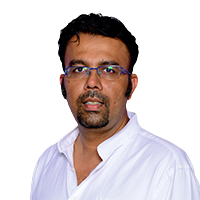
Associate Professor Rajesh Rai
Asian Studies @ CHS
NUS is recognised as a global centre of excellence in Asian Studies, where a multidisciplinary and comparative approach to the study of Asia and its regions is adopted. The session on programmes by the various Asian Studies departments at NUS (2:00 – 2:50 pm) will feature Associate Professor Rajesh Rai (NUS South Asian Studies), Dr Faizah Zakaria (NUS Malay Studies), Associate Professor Tham Shiao Wei (NUS Chinese Studies), Dr Clay Eaton (NUS Japanese Studies) and Dr Mohamed Effendy Abdul Hamid (NUS Southeast Asian Studies).
“You probably hear a lot about how Asia is the largest continent in the world, with the greatest diversity of cultures, philosophies, political thought and economic might, as well as scientific and technological advancement,” says Assoc Prof Rai, offering up a brief on the discussion he will be leading as moderator. “This session will take you through an interdisciplinary journey through history and current affairs to show you just how influential Asia has been a force for change, both positive and negative, on the world’s stage.”
Join this session by clicking here.

Humanities @ CHS
Learn more about the academic disciplines that focus on studying different aspects of the human condition from: Dr Donna Brunero (NUS History); Associate Professor John Whalen-Bridge, Associate Professor Graham Wolfe and Dr Leslie of NUS English, Linguistics and Theatre Studies; and Dr Zachary Barnett (NUS Philosophy).
“Do you: Ponder big questions regarding life, society, and culture? Wonder how language develops? Hold theatrical ambitions? Find yourself curious about connecting the past and present, the local and global?” session moderator Dr Brunero asks rhetorically. “If so, join us as we answer questions regarding our disciplines and share insights into how studying with us at NUS can broaden your horizons.”
To join Dr Brunero and her fellow speakers in this 3:00 - 3:50 pm session click here.
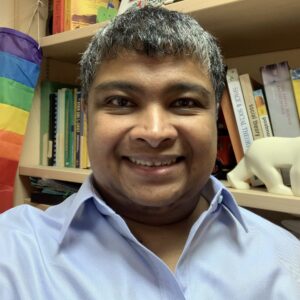
Social Sciences I: Same, Same but Different
This session features Dr Kamalini Ramdas (NUS Geography), Associate Professor Feng Qiushi (NUS Sociology and Anthropology), Dr Elaine Tan (NUS Political Science) and Dr Georgios Georgiou (NUS Economics), and will delve into their respective programmes as well as approaches toward forging a “collective identity”.
Session moderator Dr Kamalini explains. “This panel brings together social scientists from Economics, Geography, Political Science and Sociology to discuss what it takes to develop a collective identity as social scientists,” says Dr Kamalini, who will be working with her fellow speakers toward answering questions such as, “What are the benefits and challenges of a collective approach to learning and research? How might our students benefit from our commitment to engage?”
Click here to join the Social Sciences I (4:00 – 4:50 pm) session.
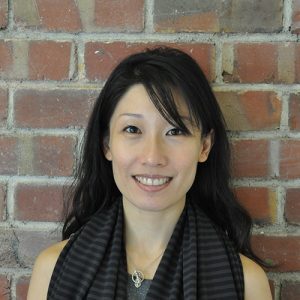
Social Sciences II: Understanding Social Complexity
Dr Adelyn Lim (NUS Sociology and Anthropology), Associate Professor Irene Ng (NUS Social Work), Dr Nina Powell (NUS Psychology) and Dr Alex Mitchell (NUS Communications and New Media) will be introducing the disciplines offered by their respective Departments, and show how they can each be applied to enable a deeper understanding of our world.
“The world we live in today can feel exciting but also downright contradictory. Global friendships are in many ways easier to make than in the past, yet we see terrorism, violent crime, wars, and enduring social inequality,” says session moderator Dr Lim, who will be discussing in detail with her fellow speakers complex issues thrown up by questions such as, “How did this world come about? Where are we heading in the future?”
To join the Social Sciences II (5:00 – 5:50 pm) session, click here.
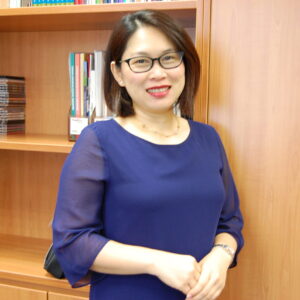
Ms Sasiwimol Klayklueng
Foreign Language Studies: Passport to the World
Meet leading Language instructors Ms Sasiwimol Klayklueng (Thai), Dr Sandhya Singh (Hindi and Tamil), Ms Indianti Tjan (Indonesian), Ms Rungnapa Kitiarsa (Thai) and Ms Sophie Undorf Bouvier (French), who will elaborate on the Minor in Language Studies and Proficiency Certificates conferred by the NUS Centre for Language Studies, which are very much sought after by students looking to enhance their career prospects.
In Pursuit of Compassion | Alumna Loong Yi Xin (NUS Social Work, '22)
IN BRIEF | 15 min read
- Alumna Loong Yi Xin (NUS Social Work, '22) knew from an early age that she wanted to be a catalyst to instil change in others, and enrolled in Nanyang Polytechnic's Social Work diploma course after her 'O' Levels.
- Driven by her desire to acquire deeper knowledge in the field, she went on to pursue a degree in Social Work at the National University of Singapore, where she learned to combine a tactful approach and collaborative spirit to help vulnerable families build a healthy environment for their children — skills she now uses in her current role at Monfort Care's Big Love Child Protection Specialist Centre.
 From an early age, Loong Yi Xin, an alumna of NUS Faculty of Arts and Social Sciences’ (FASS) Social Work department, knew that she wanted to be a catalyst to instil change in others.
From an early age, Loong Yi Xin, an alumna of NUS Faculty of Arts and Social Sciences’ (FASS) Social Work department, knew that she wanted to be a catalyst to instil change in others.
Both her parents are in what she calls the “helping industry” — her father is a pastor and her mother is a social worker. Growing up, they would regale her with stories about their experiences, inspiring her to follow in their footsteps.
Determined to effect positive change in the lives of others, Yi Xin enrolled in Nanyang Polytechnic’s Social Work diploma course after her ‘O’ Levels. Her three years in polytechnic solidified her passion in the field, but they also left her wanting to “do more and leave a larger impact.”
Driven by her desire to acquire deeper knowledge in this field, Yi Xin turned to the FASS Department of Social Work, which has trained generations of dedicated social workers in Singapore since 1952. Through her time at NUS, she learned to combine a tactful approach and collaborative spirit to help vulnerable families build a healthy environment for their children — skills she now utilises in her current role at Monfort Care’s Big Love Child Protection Specialist Centre.
Making Her Mark
Enrolling in NUS was an easy decision for Yi Xin. Inspired by the Department’s principles of justice and inclusivity — and the work of its graduates who have made a difference through their frontline practice or enacted change at the policy level — Yi Xin was certain of NUS’ stewardship of a bright future. The pedigree of its highly respected lecturers, combined with the school’s in-depth and critical study of social issues, made it an obvious choice.
Her NUS coursework only deepened her interest in research, and she eventually became a research assistant for the Singapore Longitudinal Early Development Study (SG LEADS) - Improving Preschool Attendance Component.
“Research is important because it provides evidence for the important work that we do and influences beneficial policy changes,” she emphasises.
In collaboration with the research team, she conducted quantitative and qualitative door-to-door surveys, with the aim of identifying factors affecting a child's school attendance, as well as ways to encourage active participation in early childhood education.
Yi Xin identified NUS’ vast network of partners as another reason for joining the University.
Nurturing as second nature
Thanks to her rigorous coursework, which gave students valuable opportunities to collaborate on real-world problems, Yi Xin was well-equipped to enter the workforce.
The majority of Social Work courses are anchored in the Ecological Systems Theory: the idea that individuals are shaped by external influences — family, peers, schools, media, policies, culture and more — and their relationships with them.
She found this theory to be foundational to the nature of her work, and fostered an appreciation for nuances within her cases.
Senior Lecturer Dr Alex Lee's Advanced Family-Centred Social Work Practice course, in particular, highlighted the vulnerability of impressionable children who are influenced by a multitude of factors in their growing years. Yi Xin was able to tackle issues more holistically after this course because of its emphasis on collaboration between institutional organisations.
Another course that left a lasting impression on Yi Xin was Ethics in Social Work Practice by Assistant Professor Dr Crystal Lim. The case studies discussed in Dr Lim’s lectures ranged from the historical to the hypothetical, and Yi Xin remembers her class being constantly engaged in lively and productive critical discussions.
“This course made me question everything, even my own identity!” Yi Xin says, with a laugh.
From Theory to Practice
As part of NUS' commitment to empower its students to gain real-world experience, Yi Xin and her classmates were sent on fieldwork placements, shadowing other social workers to gain deeper insight into the demands of the job and assist them with cases.
“This is where the learning was the most exponential,” Yi Xin stressed.
She also shares how her nurturing lecturers kept lines of communication open for her and her classmates during their placements, so that they could clear any doubts or discuss struggles they faced.
Yi Xin remembers being conflicted while interning at a child protection agency, where part of the team's role was to ensure children’s safety and sometimes remove them from their home environments. Despite their team being permitted statutory intervention, she still had doubts about the impact of such actions on both the children and their family members.
“Just being able to discuss this ethical dilemma with Dr Lim was very helpful for me and gives me a new lens to look at things. Even after graduating, we were assured that if we need help, we are always welcome to reach out,” Yi Xin recounts gratefully.
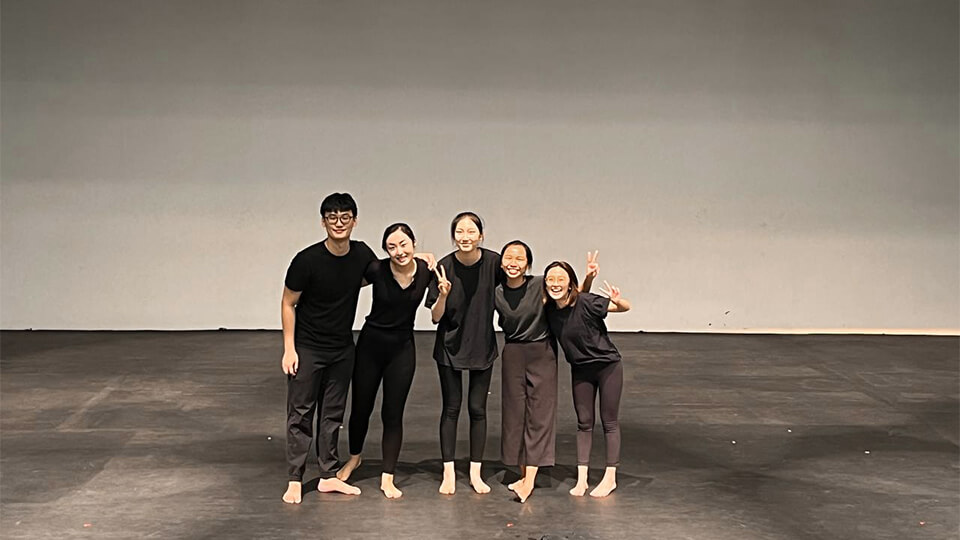
At FASS, Yi Xin was also able to marry her interests with her studies and future career. Her curiosity in theatre led her to enrol in Introduction to Theatre and Performance, which proved to be an ace up her professional sleeve and a valuable skill in her current line of work.
“With theatre, we help children identify their bodily sensations that help us recognise emotions. For example, when some children are feeling angry or scared, they can identify their clenched fists or feeling butterflies in their stomach.”
A home away from home at Ridge View
Committed to experiencing NUS’ vibrant campus life to its fullest, Yi Xin also chose to stay at Ridge View Residential College (RVRC) — situated at “the heart of NUS” for two years. Known for its sustainable culture and environment, RVRC also prides itself on its community spirit.
“It’s a super chill and supportive place! You can find friends who can work hard and play hard with you,” she enthuses.
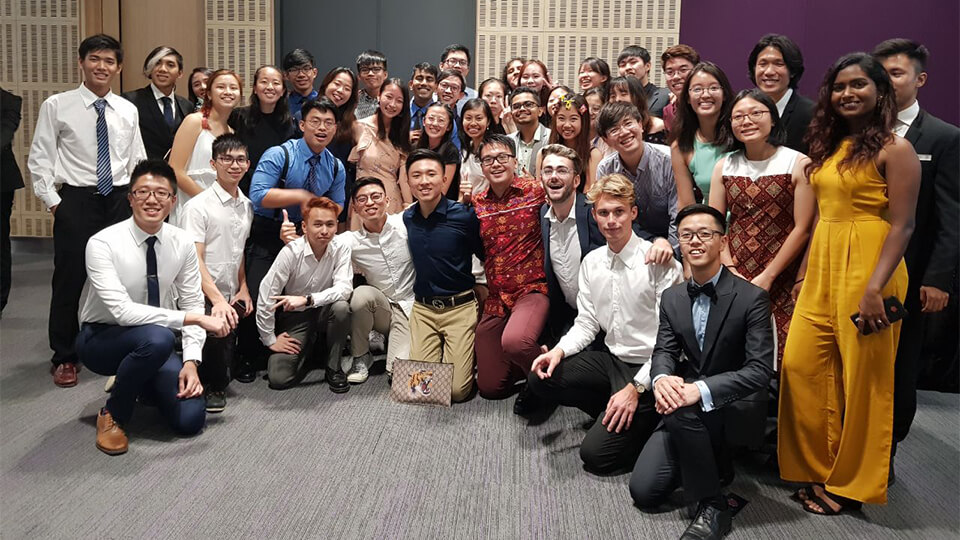
RVRC also offers courses specific to their students in residence. She fondly recalls her course on sustainability, where she got to inject creativity into sustainable solutions together with friends. Apart from college-specific courses, RVRC also offers an abundance of interest groups to choose from. RV Jukebox and Green Rangers, a musical band and a gardening group respectively, are just a few of the many clubs Yi Xin participated in.
The Childhood Campaigner
The field of social work is broad and there are multiple career paths, specialisations and sectors that offer opportunities to help those in need.
Yi Xin’s own path has led her to the Big Love centre, where she gets to work directly with vulnerable children on their journey to ensure their physical and emotional safety.
“Supporting them in their healing is fundamental to their future experiences in their lives. It’s about preparing them for when Big Love exits the picture,” Yi Xin explains.
A common pitfall for many young and aspiring social workers, Yi Xin discloses, is entering the industry with a saviour complex and overlooking their professional roles and boundaries.
“We need to see ourselves as merely the catalyst and not the heroes,” she cautions.
Another shared grief in the social work industry is burnout. To combat stress, Yi Xin always makes time for play and relaxation. She advises others to “compartmentalise work and play. Once you clock out (of work), you need to prioritise other aspects of your life.”
But while the life of a social worker is challenging, it is also one that is rewarding and never dull. After all, social workers have to facilitate interventions of varying levels of difficulty and are an integral part of systemic support structures that can make a lasting change in society.

Inspiring the Next Generation
Looking towards the future, Yi Xin wants different organisations to collaborate more and cover larger ground in social issues.
“Greater collaboration is vital, but it’s not going to be easy because everyone has their KPIs (key performance indicators) to meet.”
However, she remains undaunted, and is confident she can be part of a new generation of social workers making a positive difference to families and to the industry as a whole.
Thinking of joining Social Work but still undecided? Yi Xin has some advice: "Have fun and approach everything with a learning mindset and curiosity…There are times that will be tough but in those times, anchor yourself to people or things that keep you going."
This story first appeared on the NUS Office of Admissions website in January 2023.
Celebration of Achievement and Excellence
In November 2022, the Department of Social Work organised an in-person award ceremony to appreciate our adjunct lecturers and field educators for their many years of support for the Department and in the student’s education. In addition, during the award ceremony, we also celebrated the graduation of our recent graduates of the Graduate Diploma in Social Work (GDSW) programme. It was a joyous occasion to finally be able to meet old friends from the field in person after years of Covid-19 restrictions.
During the event, we screened two videos that were produced by the Department in collaboration with one of our field educators.
- This video features two of our adjunct lecturers who are currently practitioners in the field and teaching in NUS.
- This video features two field educators who share their experiences in being a field educator when NUS Social Work students go for their compulsory field placements.
Here are some the highlights of the event!
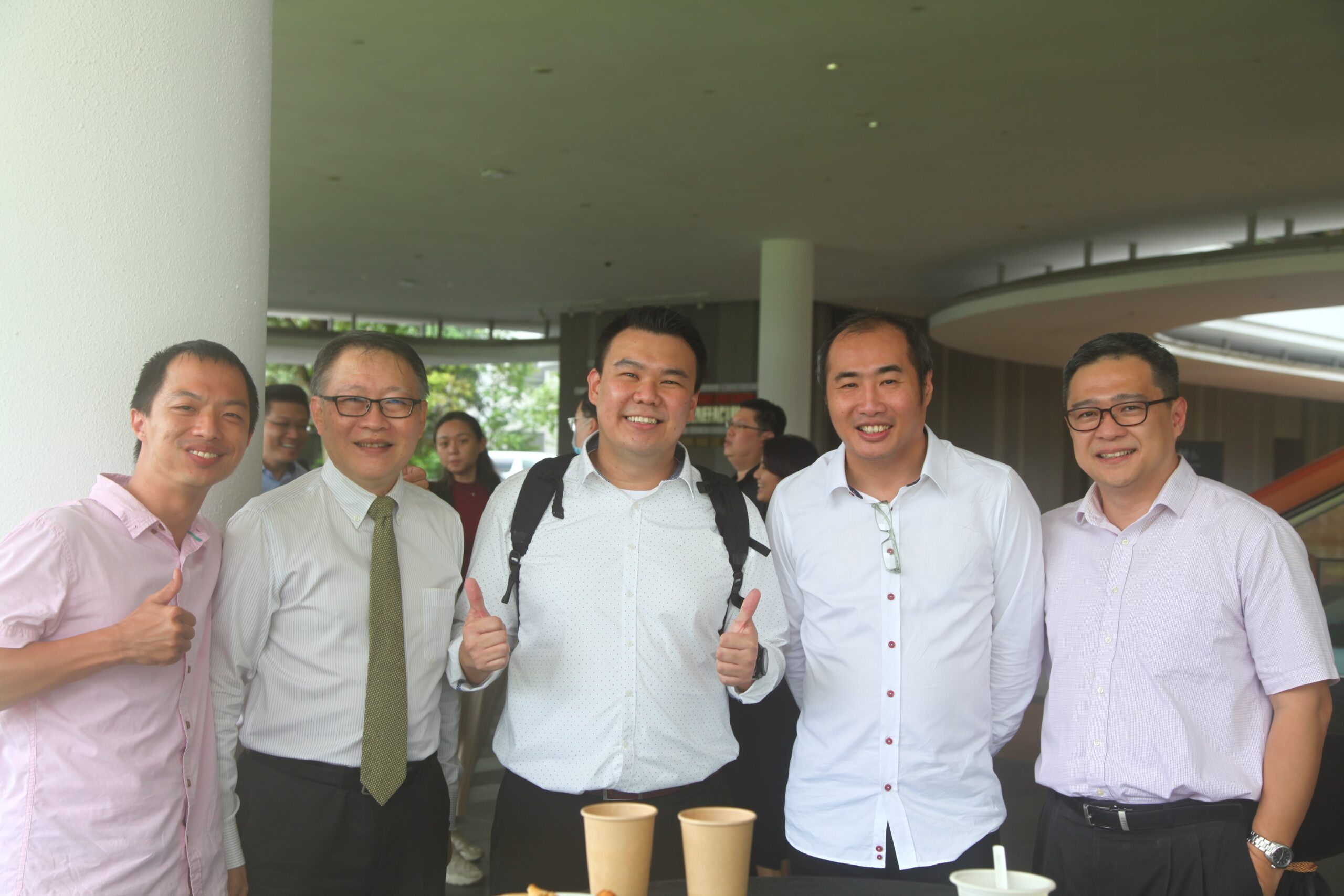
Our lovely field educators enjoying fellowship and tea!
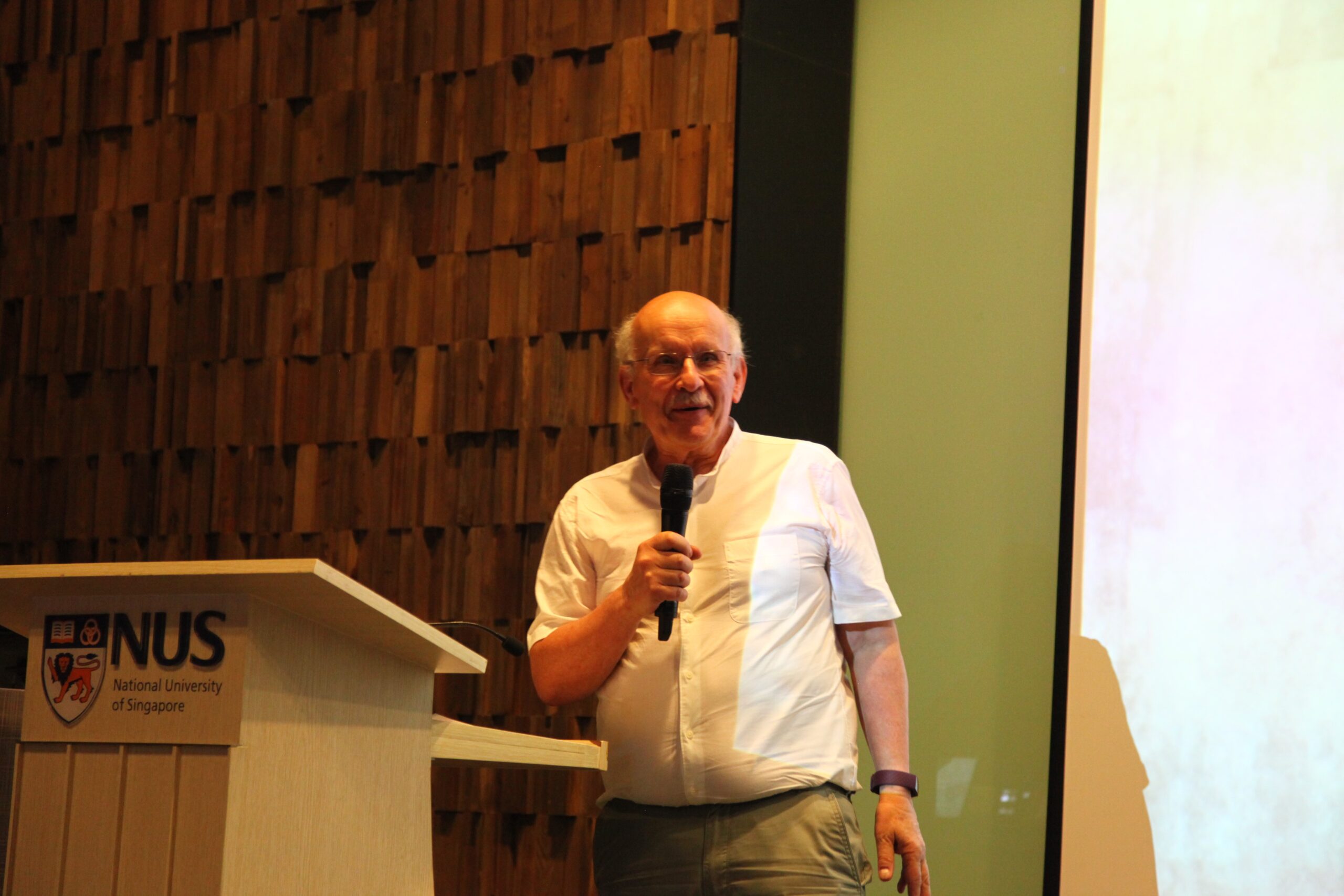
Distinguished Professor Ian Shaw sharing the keynote speech for the ceremony: International Collaboration in Social Work Research: A Life Story
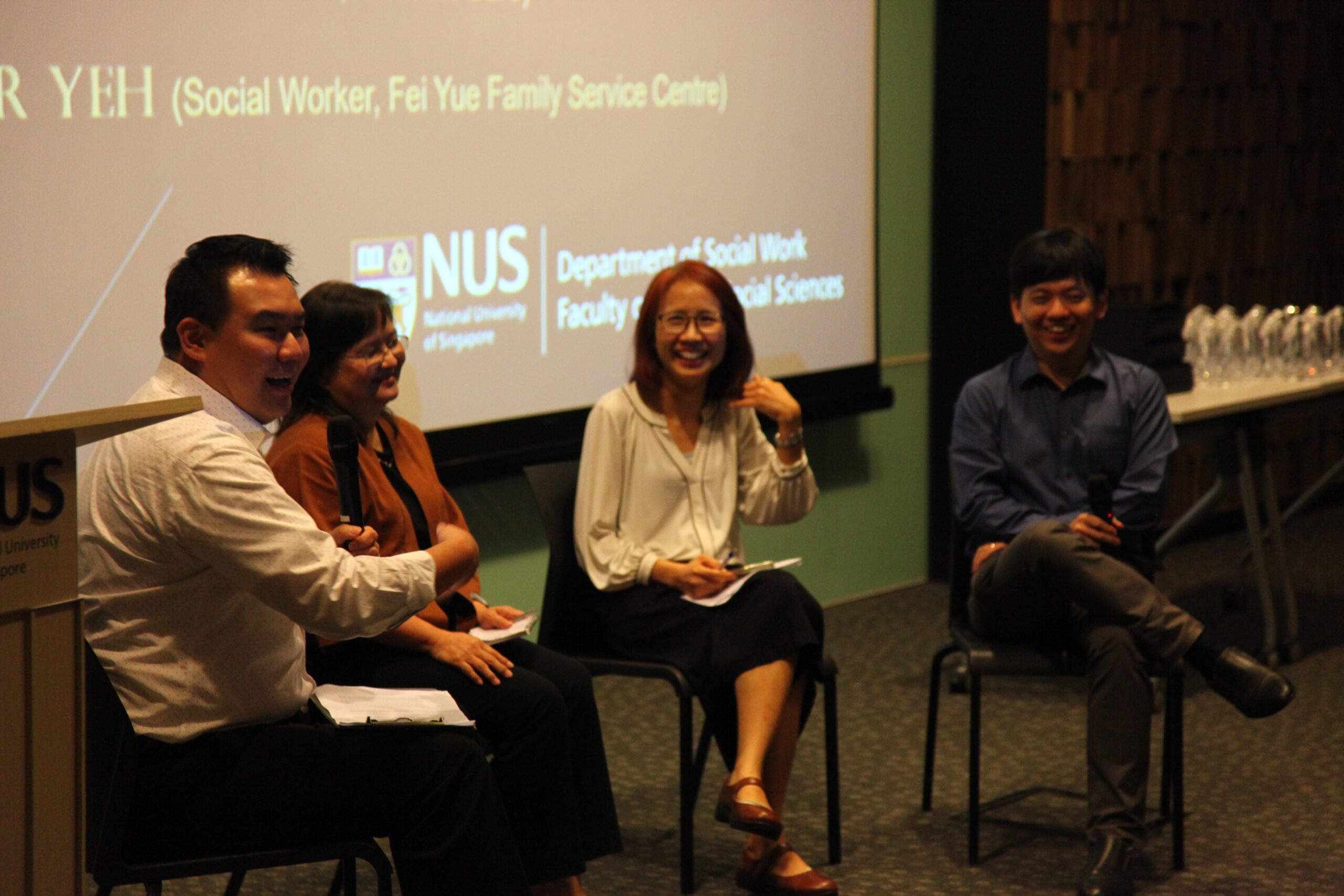
Panel Discussion featuring Dr Corrine Ghoh (Adjunct Associate Professor NUS), Ms Annie Chia (Principal Social Worker, Montfort Care), Mr Christopher Yeh (Social Worker, Fei Yue Family Service Centre) discussing on the Hopes and Challenges of Social Work Education
The Half-life of Knowledge
IN BRIEF | 10 min read
- There is now an indisputable requisite to equip graduates with interdisciplinary knowledge and skillsets. We need both the agile lenses of interdisciplinarity as well as the deep-cutting laser of deep domain expertise. The former trains us to aim and focus the laser, while the latter allows us to cut to the heart of a problem.

| By Professor Tan Eng Chye |
“Teach a person to fish, and you may feed them for three-and-a-half years” may sound less inspiring than “Teach a person to fish, and you feed them for a lifetime”, but the former more accurately reflects the current realities of tertiary education.
Breaking news travels at warp speed, accelerated by social media and instant messaging. In a matter of minutes, news can reach the four corners of the world. Such interconnectedness highlights the leaps made in information technology over the years while underscoring a persistent and inexorable phenomenon – the reduction of the half-life of knowledge.
The half-life of knowledge, coined by Fritz Machlup in 1962, refers to the amount of time elapsed before half of the knowledge in a particular field is superseded or becomes obsolete. Given the speed with which knowledge develops and is shared, it is perhaps not surprising that this value is ever decreasing in many fields.
This phenomenon raises fundamental questions about our university degree programmes. How should a fresh graduate, filled with aspirations to change the world, deal with the harsh reality that a significant portion of their undergraduate training may be rendered irrelevant by the simple passage of time?
Distilling a degree programme is one possible, albeit drastic approach. We can consider equipping students only with evergreen core domain concepts. This training should take less time than our current degree programmes. As and when students require specific new knowledge, or need to upgrade existing knowledge, they can take short courses to bridge knowledge gaps and meet their professional needs. This type of “just in time” learning, also known as micro-credentialing, helps to circumvent the shortened half-life by injecting cutting-edge knowledge at just the right time.
Another less disruptive approach is revitalisation. We can maintain the current degree programme structure, but provide avenues for graduates to return to university in the future. Such short stints of study can follow existing models for bite-sized, self-contained courses, or semester-long study periods undertaken with the support of employers.
One certainty is that university study will cease to be just one stage of life. Instead, “university studies” will become the de facto way of studying, with a person continually refreshing and renewing their knowledge in tandem with or in anticipation of developments in industry, society and the world.
In anticipation of this, we created the NUS Lifelong Learners Programme (or NUS L3), which promises a 20-year period of student enrolment, from the point of undergraduate or postgraduate admission. In other words, a graduate of NUS can choose to come back to campus to take courses for at least 20 years from the day of matriculation.
Interdisciplinarity
Beyond the way knowledge is acquired, we are also grappling with working in an increasingly VUCA (volatile, uncertain, complex, and ambiguous) world. In such a context, can we continue to hold a siloed view of domain disciplines? In training law students, for example, we would be remiss not to show them basic programming, which can allow them to create customised commands to quickly and easily trawl through databases, with millions of legal records, to identify precedents.
Deep domain expertise is like a laser – a focused beam of knowledge that can cut through dense problems. However, real-world issues are increasingly multifaceted and ill-defined, often lacking a clear vulnerable spot at which a laser beam can be aimed.
As a mental experiment, consider the challenge of introducing autonomous electric vehicles to a city. This proposition involves urban design, city planning, the law, and engineering for accessibility. We can form a multidisciplinary team of experts, where each member is a domain expert, to tackle the issue. However, in all likelihood, we will encounter misalignment between domains, simply owing to differences in problem-solving methodology, thinking models or even nomenclature.
If we liken domain training to equipping students with specific lenses through which they can see and focus on information to solve a problem, then interdisciplinarity suggests that we should train students to operate across more than one domain. By educating them in core ideas from multiple domains and providing opportunities to apply their knowledge in authentic settings, students with interdisciplinary training can switch domain lenses as needed, solving problems using novel and unorthodox approaches that transcend domains.
To be clear, we are not advocating for dismantling deep domain training. Rather, we recognise that there is now an indisputable requisite to equip graduates with interdisciplinary knowledge and skillsets. We need both the agile lenses of interdisciplinarity as well as the deep-cutting laser of deep domain expertise. The former trains us to aim and focus the laser, while the latter allows us to cut to the heart of a problem.
NUS strongly believes in providing interdisciplinary pathways for our students. In 2020, we created the College of Humanities and Sciences (CHS) to provide an enhanced interdisciplinary undergraduate experience for students of the Faculty of Science and the Faculty of Arts and Social Sciences. CHS undergraduates can choose between deep domain training or the flexibility of interdisciplinary training of varying breadth and depth in modules offered by both faculties. Continuing our efforts to pave more interdisciplinary pathways for students, in 2021, we merged the School of Design and Environment and the Faculty of Engineering to form the College of Design and Engineering. More recently, NUS launched NUS College, Singapore’s first honours college offering pathways to more than 50 majors across a half dozen degree programmes. The aim of NUS College, as explained by its inaugural dean, Professor Simon Chesterman, “[is to offer] broad, interdisciplinary competencies that equip students for life, along with the opportunity to dive deep into areas in which you are passionate.”
To quote Charles Dickens, “It was the best of times, it was the worst of times, it was the age of wisdom, it was the age of foolishness.” Indeed, our experiences with the global pandemic and its effects on education over the past two years have given us the rare opportunity to engage in deep reflection and introspection. Witnessing the breakdown of resistance to adopting and adapting technology for teaching and learning during this time, we should be emboldened to re-examine and revolutionise some of our established, and perhaps outmoded, notions of how to offer higher education.
About the Author
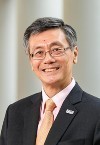 Professor Tan Eng Chye is President of the National University of Singapore. A passionate academic and educator, Prof Tan is a member of the World Economic Forum’s Global University Leaders’ Forum, as well as Singapore’s Future Economy Council, which is tasked with driving the growth and transformation of the country’s future economy.
Professor Tan Eng Chye is President of the National University of Singapore. A passionate academic and educator, Prof Tan is a member of the World Economic Forum’s Global University Leaders’ Forum, as well as Singapore’s Future Economy Council, which is tasked with driving the growth and transformation of the country’s future economy.
This article was first published in the Times Higher Education World University Rankings 2023 supplement and first appeared in NUSNews on 4 November 2022.
Call for Nominations | FASS Inspiring Mentor Award 2022
IN BRIEF | 3 min read
- We invite NUS FASS members of staff to nominate the colleagues who have served as their truly inspiring mentors - who have gone beyond the call of duty to positively impact their work and life - for FIMA 2022 honours.
Click through image below (or just write to fassmentoraward@nus.edu.sg) to file your nomination.
FASS Establishes LBKM Social Sciences Scholarship to Nurture Top Talents in the Social Sciences
IN BRIEF | 5 min read
- The scholarship was established through a S$300,000 gift from Lembaga Biasiswa Kenangan Maulud, LBKM (Prophet Muhammad's Birthday Memorial Scholarship Fund Board).
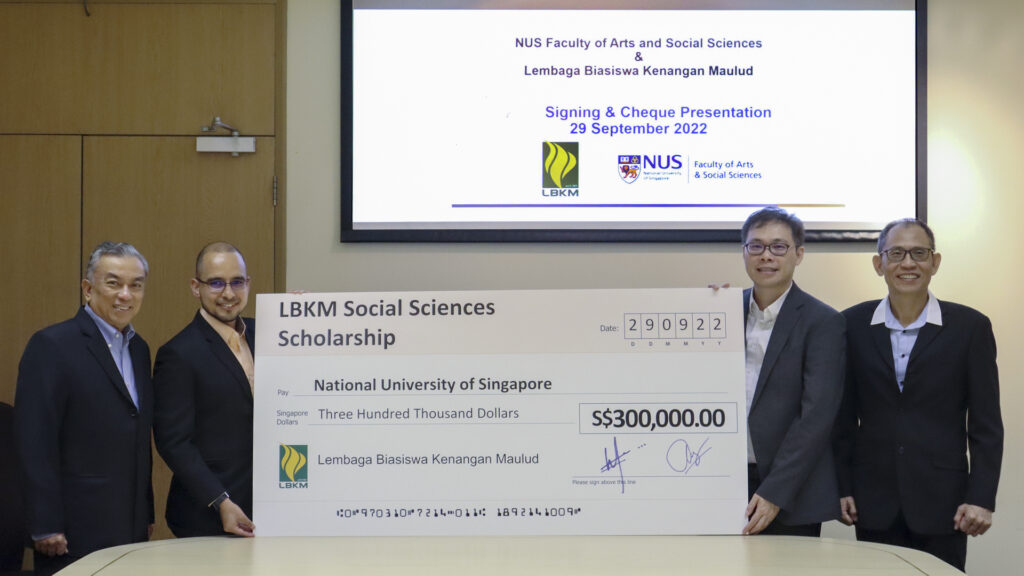
The NUS Faculty of Arts and Social Sciences (FASS) has received a generous endowment gift of S$300,000 from Lembaga Biasiswa Kenangan Maulud (LBKM) - or Prophet Muhammad's Birthday Memorial Scholarship Fund Board - to establish the LBKM Social Sciences Scholarship.
The Scholarship will be available to academically outstanding full-time third- and fourth-year Singaporean students pursuing majors in Communications and New Media, Economics, Global Studies, Philosophy, Politics and Economics (PPE), Political Science, Psychology, Social Work, as well as Sociology and Anthropology. This aims to further spur academic excellence in the social sciences amongst FASS undergraduates and encourage them to distinguish themselves in their scholastic activities.
Applications for the Scholarship worth $5,000 each will open in the academic year beginning in August 2023.
Professor Lionel Wee, Dean of NUS FASS, said, "The rise of the digital economy has driven up demand for social scientists as their knowledge and skills are needed to understand the impact of new technology on people and societies, provide social support in the wake of fast-moving changes, and overcome cultural differences in an increasingly shrinking world. These are roles robots and technology cannot replace. This Scholarship will enable us to attract and nurture exceptional social science students keen to grow their skills and achieve their fullest potential. We are grateful to LBKM for their trust and strong support."
Associate Professor Loy Hui Chieh, Vice Dean of NUS FASS, and Dr Syed Harun Alhabsyi, President of LBKM, signed the agreement today to establish the Scholarship, with a ceremonial cheque presented by LBKM to NUS FASS.
Dr Syed Harun said, "LBKM's continued support for undergraduates in the study of social sciences remains of extreme importance as societal and community needs become more complex, ever-changing and inter-disciplinary. It is hoped that LBKM's contributions will continue to inspire students to do well in the area of social sciences and groom future leaders who will not only perform exceptionally in their academic pursuits but also give back to the community."
The new LBKM Social Sciences Scholarship is an extension of LBKM's longstanding relationship with NUS FASS and past community donations that have supported undergraduate students financially and encouraged them to excel in their studies since 2007.
This story first appeared in NUSNews on 29 September 2022.
Former Gang Member Graduates from NUS with Honours
IN BRIEF | 10 min read
- Gary Lau overcame his challenging childhood, having less than stellar PSLE and N-level results, being part of a street gang in his early teens, to graduate with a B.Soc.Sci. (Hons) in Social Work with the highest distinction on 7 July 2022.
Click through to read this story on Gary Lau (NUS Social Work, '22): https://bit.ly/NUSSWK-GaryLau-2022.
This article first appeared in 8world Online and NUSNews on 13 July 2022.
Commencement 2022: Kickstarting a Season of Celebration and Achievement
IN BRIEF | 10 min read
- NUS celebrates the milestone accomplishments of 13,975 graduates through 28 in-person ceremonies.
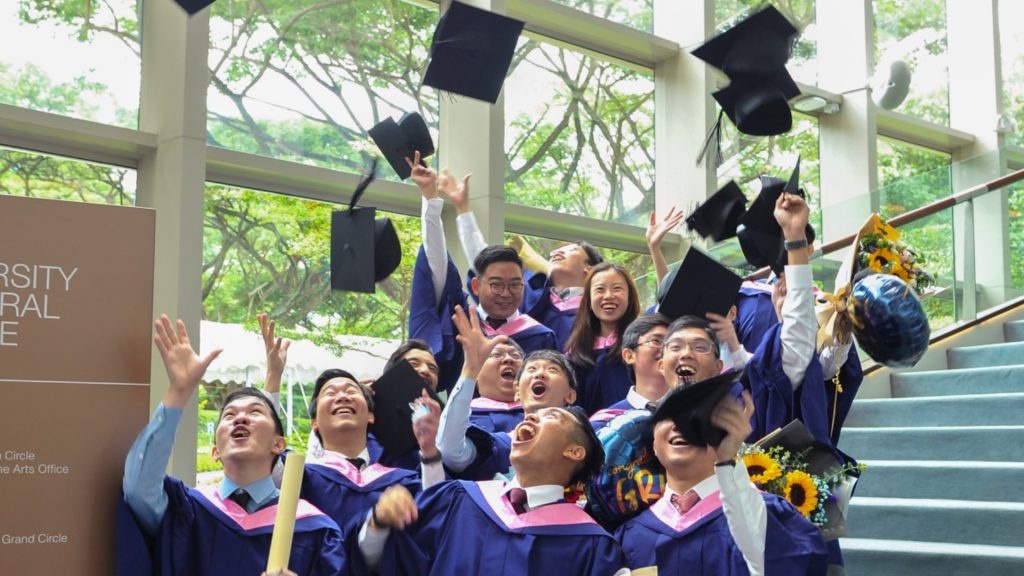
A long-awaited season of celebration is officially under way, with the inaugural ceremony of Commencement 2022 marking the milestone achievements of some 200 Faculty of Arts and Social Sciences (FASS) graduates, and seeing the conferment of two Honorary Graduates, Professor Tommy Koh and Professor Wang Gungwu.
Taking place at the University Cultural Centre, the ceremony kicked off bright and early on 6 July to an effervescent buzz of anticipation from the graduates and their loved ones, inaugurating a total of 28 in-person ceremonies to be held over the following 10 days.
In keeping with the Commencement traditions and the proud ceremonial heritage of NUS, the ceremony showcased the pageantry of the Ceremonial Procession, the fanfare, and playing of the National Anthem, all culminating in the highlight of the ceremony-the presentation of graduates. Graduates from the Class of 2022 celebrated their achievements amid the applause of family and friends, a momentous apogee of their time in NUS.
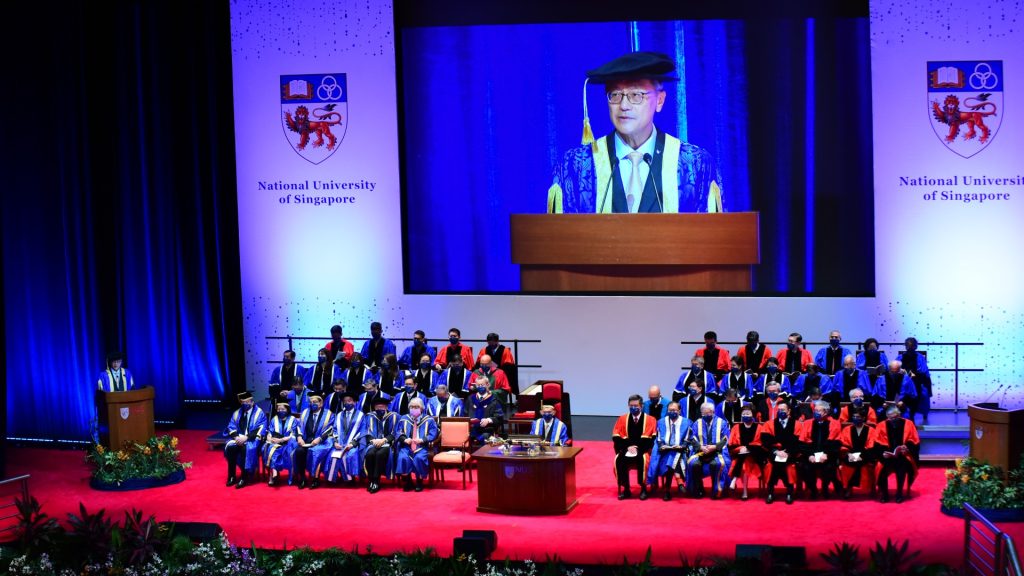
Speaking at the ceremony, NUS President Professor Tan Eng Chye reflected on the qualities needed for graduates to thrive in today's dynamic environment: an attitude of resilience and adaptability to overcome challenges, and a willingness and boldness to view problems as opportunities, exercise creativity, and apply their skills and knowledge to create solutions.
"For the Class of 2022, you are crossing the threshold into a wider world of dynamic change and great possibilities, but also of discomforting uncertainty," he said.
"But I am fully confident that the NUS graduates of today share the same ethos of excellence and service to community of generations past. In time to come, you will undoubtedly make your own unique contributions, and become the vanguard in elevating our collective prosperity and well-being."
Contributions to Law, Nature and Culture: Prof Tommy KohTwo illustrious NUS alumni were also honoured as Honorary Graduates for the Class of 2022-lawyer and diplomat Professor Tommy Koh, and historian Professor Wang Gungwu.
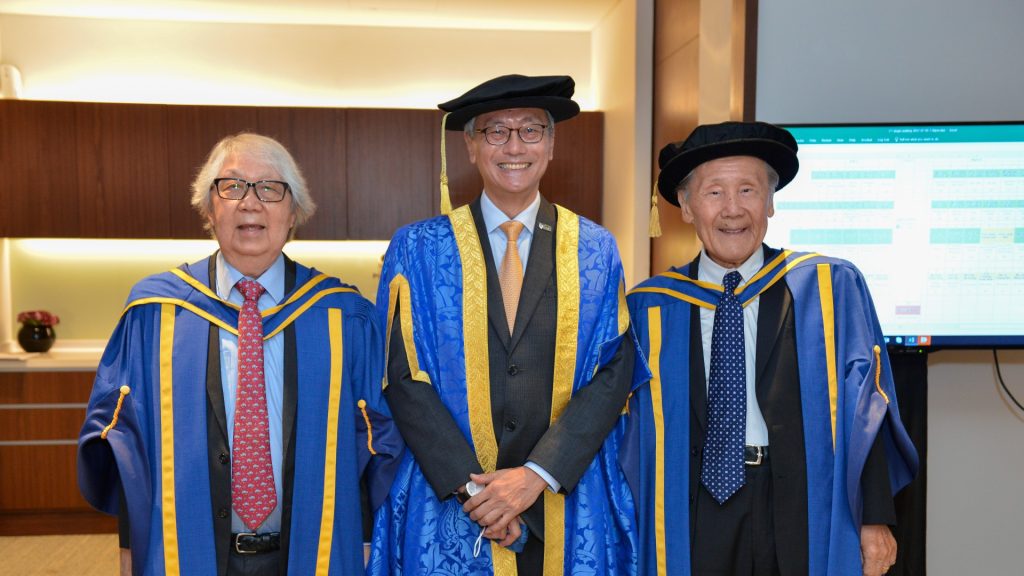
In recognition of his dedication as a practitioner-scholar and decades of service to the University, Singapore, and the world, Prof Koh, who wears many hats including Ambassador-at-Large at Singapore's Ministry of Foreign Affairs, Special Advisor of the Institute of Policy Studies, and founding Rector of NUS' Tembusu College, was conferred the Honorary Degree of Doctor of Laws.
Highlighting three areas on which he has focused his energies - law, nature, and culture - Prof Koh said, "I chose to study law, not to enrich myself, but to pursue justice and to promote the rule of law."
He also spoke about his work concerning nature and the environment, including chairing the 1992 Earth Summit, being patron of the Nature Society, and helping NUS establish the Lee Kong Chian Natural History Museum as its founding Chairman. "My vision is to live in harmony with nature. My agenda is to promote sustainability in all our endeavours," he added. "I am [also] glad that I have been able to play a very small role in transforming Singapore, from a cultural desert to a cultural oasis."
Delivering the citation for Prof Koh's conferment, Professor Simon Chesterman, Vice-Provost (Educational Innovation) and Dean of the NUS Faculty of Law and NUS College, referred to Prof Koh's "academic milestones [which] are but one strand of the rich tapestry of his professional life", as well as his leadership and guidance in education at NUS, and his eminent contributions to state and environmental diplomacy.
An Inspiring Story Worth Retelling: Prof Wang GungwuProf Wang, one of the world's foremost experts on the Chinese diaspora and Sino-Southeast Asian historical relations, was conferred the Honorary Degree of Doctor of Letters, the latest in a long list of accolades that includes the prestigious Tang Prize in Sinology, and the Distinguished Service Order of Singapore.
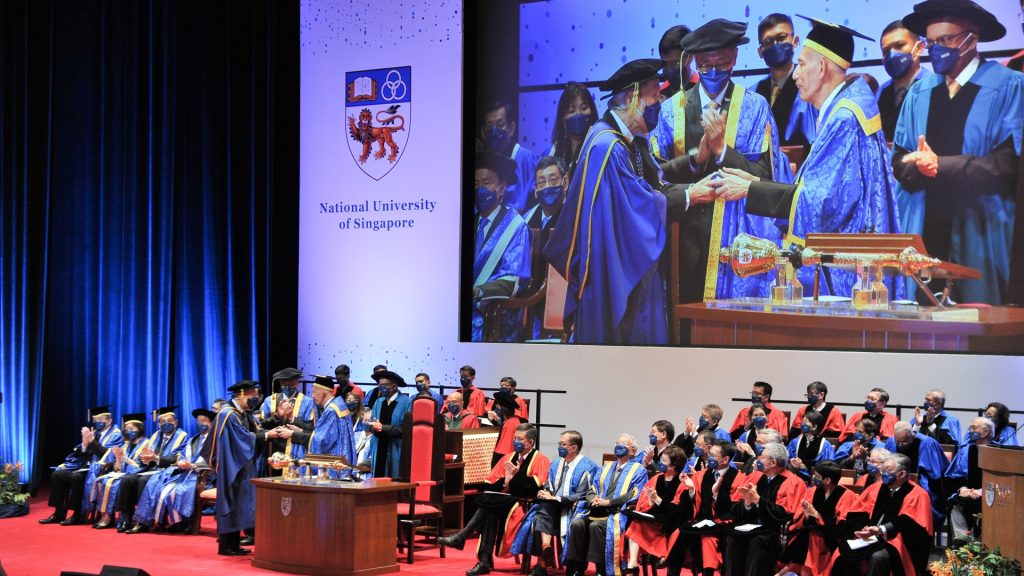
Reflecting on his time as a student of the University in colonial Malaya, Prof Wang said: "You can imagine how happy I am to be a graduand again with my alma mater. The university gave my generation a good start in life. It went on to adapt to the rapid changes of our time. In so doing, it has come out better and stronger."
He spoke about the "inspiring story worth retelling" of how the University had set out and followed its own aspirations, becoming a major centre of learning by being actively connected to the world, as well as regularly reinventing itself.
"The way our university strives to keep our humanity always in our sights is something to be very proud of. I hope that all of us graduating today, no matter where life leads us, will never hesitate to help our university to enhance this capacity to advance our human condition," Prof Wang stressed.
Prof Lionel Wee, Dean of FASS and co-Dean of the College of Humanities and Sciences, who delivered the citation on Prof Wang's conferment, lauded the latter as "an eminent figure and brilliant mind" who has made manifold contributions as a leading figure in Sinology, a renowned public intellectual, and a visionary leader and administrator at leading academic institutions around the world.
"This doctorate symbolises the meaningful connections between Professor Wang and the University, and it celebrates the long-standing contributions and value that Professor Wang's scholarly insights bring to Singapore, to Southeast Asia and, indeed, to the world," he said.
Parsing the Path ForwardInfusing the celebrations with a spirit of introspective gratitude, Valedictorian Mr Nickson Quak, who is graduating with a Bachelor of Arts with Honours (Highest Distinction) in Philosophy, Politics, and Economics said, "As varied as our journeys may have been, each and every one of us graduates here could have only made it thus far because of the unwavering support that our parents, our families, our loved ones, and our friends have so generously afforded us."
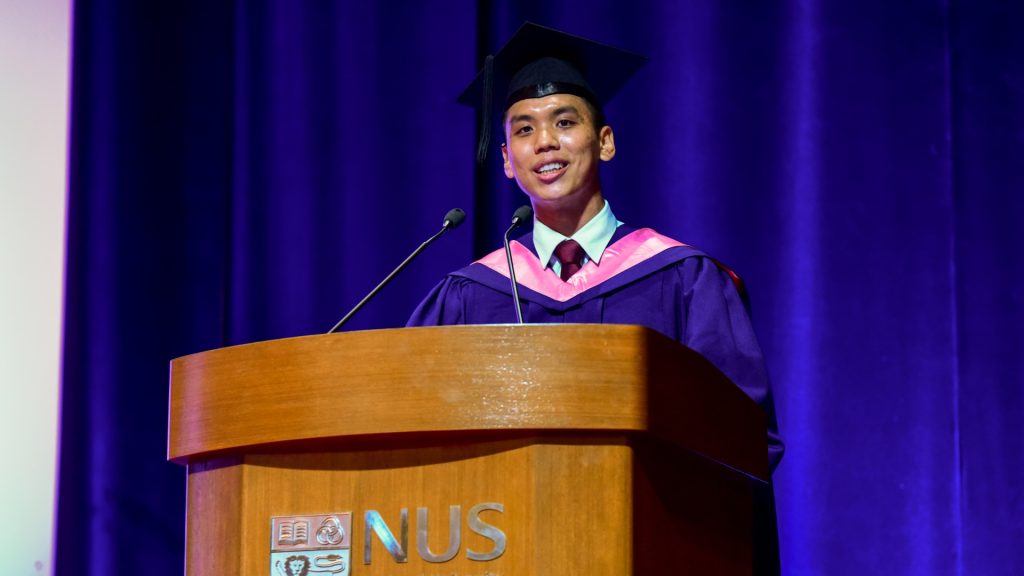
His words further summarised the spirit of determination and community that will carry graduates onwards in their lives: "If [the journey ahead] appears daunting to you, I say to you: fret not… because when you look to your left and your right, you see the resilient men and women who, forged by the challenges brought upon by the global pandemic, will always offer you a helping hand."
This story first appeared in NUSNews on 6 July 2022 as part of NUS News' coverage of Commencement 2022, which celebrates the achievements of our 13,975 graduates through 28 in-person ceremonies. For more on Commencement, look out for our upcoming graduate profiles, check out the official Commencement website, or look up (and tag) #NUS2022 and #NUSFASS on NUS' and FASS' social media channels!
New FCAB Training Curriculum for Frontline Officers and Volunteers Supporting Low-income in Singapore
IN BRIEF | 10 min read
- Developed by the Next Age Institute (NAI) with Citi Foundation’s funding, the new Financial Capability and Asset Building (FACB) training curriculum follows success of training programme for social workers rolled out in 2020.
- NAI’s plans to develop the SG FCAB-Frontline Training curriculum is supported by nine stakeholder-organisations. They are the Ministry of Social and Family Development, National Council of Social Service, MENDAKI, Singapore Prison Service, People’s Association, Institute for Financial Literacy, Singapore After-Care Association, Care Corner Singapore Ltd and AMKFSC Community Services Ltd.

The Next Age Institute (NAI) at the National University of Singapore (NUS) Faculty of Arts and Social Sciences (FASS) has embarked on an initiative to develop the Singapore Financial Capability and Asset Building (SG FCAB)-Frontline Training curriculum. The curriculum aims to equip frontline officers and volunteers from public, social services and community agencies with knowledge and skills to help low-income individuals and families improve their financial capabilities.
The development of the new SG FCAB-Frontline Training curriculum, which began in January 2022, follows the success of the SG FCAB-Social Work Training programme which was rolled out in 2020 by the Department of Social Work at NUS FASS to specifically train social workers and social work students to support the most financially vulnerable in Singapore.
NAI’s plans to develop the SG FCAB-Frontline Training curriculum is supported by nine stakeholder-organisations. They are the Ministry of Social and Family Development, National Council of Social Service, MENDAKI, Singapore Prison Service, People’s Association, Institute for Financial Literacy, Singapore After-Care Association, Care Corner Singapore Ltd and AMKFSC Community Services Ltd.
Citi Foundation, the philanthropic arm of Citigroup, has awarded a grant of US$330,000 towards the development of the SG FCAB-Frontline Training curriculum and the training of 200 more social workers in the SG FCAB-Social Work Training programme from January 2022 to June 2023. From 2017 to 2021, it had awarded grants totalling US$630,000 to develop and roll out the SG FCAB-Social Work Training programme that trained more than 250 social workers and more than 150 social work students to support the most financially vulnerable populations in Singapore.
Commenting on the SG FCAB initiative, Citi’s ASEAN Head and Citi Country Officer for Singapore, Mr Amol Gupte said, “The development of the new SG FCAB-Frontline Training curriculum marks another significant milestone in Citi’s 120 anniversary year in Singapore. Citi has been demonstrating its commitment to enable growth and progress in the community, and we are pleased to continue our financial inclusion efforts in supporting the vulnerable through the partnership with the NUS FASS Department of Social Work and the Next Age Institute.”
The plans for the new SG FCAB-Frontline Training curriculum and impact of the SG-FCAB Social Work Training programme were announced today at the “Financial Capability and Asset Building (FCAB): Maximising Potential, Empowering Communities” event organised by NAI and the NUS FASS Department of Social Work. Mr Masagos Zulkifli, Minister for Social and Family Development, and Second Minister for Health, attended the event as the Guest-of-Honour and delivered a speech which highlighted the importance of helping lower-income families to strengthen their financial management capabilities and how FCAB training could equip social workers, frontline staff and volunteers with the skills and knowledge to enable this.
Also speaking at the event, Associate Professor Chia Ngee Choon, Co-Director of NAI shared, “Together with social workers, frontline staff and volunteers play a crucial role in the overall help system. Low-income individuals and families who have worked through their social and financial vulnerabilities with the support of social workers, can continue to work with frontline staff and volunteers as part of the wider support system network to achieve their aspirations. With the SG FCAB-Frontline Training curriculum, frontline staff and volunteers will be equipped with the knowledge and skills to continue supporting low-income individuals and families to enhance their financial capabilities and asset building efforts.”
Adjunct Associate Professor Corinne Ghoh, SG FCAB-Frontline Project Lead at NAI highlighted that “instead of being prescriptive, FCAB principles emphasise the importance of listening, understanding, and building trusting relationships with recipients of help. This enables them to become more in control of their circumstances and helps them develop increased financial functioning to achieve their goals. When low-income individuals and families experience support in making informed decisions about their finances, they are empowered to assume greater control over their lives and move towards positive changes.”
The SG FCAB-Frontline Training CurriculumA nine-member Resource Committee chaired by NAI, which comprises representatives from the stakeholder-organisations was formed in April 2022. The Resource Committee will play a key role in providing guidance on the curriculum development and training of the sector.
NAI will also be conducting focus group discussions with frontline staff and volunteers who work with low-income individuals and families, to assess the training needs and identify gaps in practice.
It will also pilot the curriculum at the community level with 60 frontline staff and volunteers in the fourth quarter of 2022. The process of development, testing and refinement of the curriculum will be completed by June 2023. The aim is to institutionalise the SG FCAB-Frontline Training curriculum in the form of a programme as part of ongoing field learning and training for this group.

The SG FCAB-Social Work Training programme was offered from 2020 through the Continuing Professional Education arm of the NUS FASS Department of Social Work, with the curriculum developed by NAI from 2017 to 2019.
Associate Professor Esther Goh, Head of the Department of Social Work shared, “The success of the SG FCAB-Social Work Training programme is evident from the overwhelming response and positive feedback from SG FCAB-trained social workers who have enhanced their competencies in the area of financial social work. Aligned with the core values of social work, the SG FCAB-Social Work Training programme equips social workers with the knowledge and skills to actively engage clients in shaping their financial goals, harnessing their strengths to increase financial functioning and achieving sustainable financial outcomes.”
The plenary session at today’s event discussed the social innovations by social workers who went through the programme and how they applied FCAB principles to uplift lives and address financial challenges faced by their low-income clients.
Ms Grace Xu, Head of the Social Work Team at AWWA Transitional Shelter, who attended the SG FCAB training, said “I gained confidence and competency in navigating resources, shared benefits, and opportunities to enhance clients’ employability and strengthened their aspirations in achieving their financial goals.” Citing an example, she shared, “The knowledge of the Progressive Wage Model enabled me to better understand and support my client's efforts to improve his employability and eventually advance his employment prospects.”
This article first appeared in NUSNews on 17 June 2022.
NUS CHS Open House 2022: Discover #Interdisciplinary Education!
IN BRIEF | 5 min read
- The NUS College of Humanities and Sciences is hosting its Open House 2022 next week and all prospective students who have received offers are invited!
- A two-day hybrid programme – 11 May on Zoom (and viewable on CHS’ Facebook page) and 14 May on several locations across the NUS Kent Ridge campus, specifically the areas around the Faculty of Arts and Social Science (FASS), and the Faculty of Science (FoS) – CHS Open House 2022 aims to address all concerns a prospective undergraduate may have before committing to academic at the University and College.
- Highlights include opportunities to engage, discuss and explore academic pursuits, career development and student life at the College with key faculty and administrative staff and leadership — live and in person.
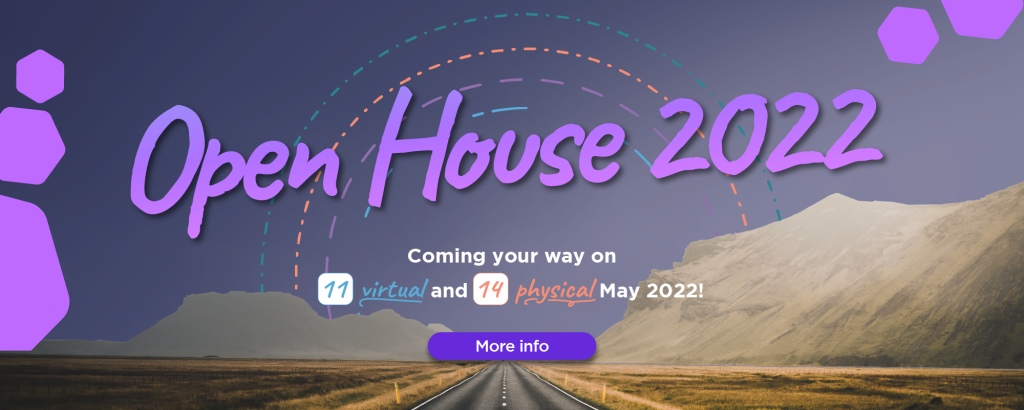
The NUS College of Humanities and Sciences is hosting its Open House 2022 next week and all prospective students who have received their offers are invited. As the deadline for them to accept their offers is looming, CHS has put together a programme aimed at answering all the questions they may have and clarifying all their concerns as much as possible.
Marking a cautiously calibrated return of the University to the normalcy of hosting large on-site events, this year’s CHS Open House is a two-day hybrid programme: 11 May on Zoom (and viewable on CHS’ Facebook page) and 14 May on several locations across the NUS Kent Ridge campus, specifically the areas around the Faculty of Arts and Social Science (FASS), and the Faculty of Science (FoS).*
11 May 2022 (Wednesday): The Essentials, OnlineThis a series of comprehensive information sessions (on Zoom and livestreamed on Facebook Live) covering everything new undergraduates need to know to get the most out of their education journey with CHS, including the:
- CHS Core Curriculum
- College’s three challenging but rewarding cross-disciplinary programmes
- Data Science and Economics (DSE-XDP)
- Environmental Studies (BES-XDP)
- Philosophy, Politics, and Economics (PPE-XDP)
- myriad Learning Pathways laid for you
- versatile career development programmes designed to prepare you for the future workplace
- CHS Student Experience—eye-opening and busy, yet energising and enriching
Speakers and panelists include CHS Co-Deans, Vice-Deans, key faculty staff members, career preparation and student services leader.
For more information and links to the 11 May sessions, click here.
14 May 2022 (Saturday): Get Personal, On CampusThe College is calling for prospective students to come on site, visit where they could well be spending their undergraduate years very soon, and speak to their future instructors and potential mentors. The full-day programme – running in key FASS and FoS locations across the NUS campus – offers:
- entry to witness and even participate in talks/lectures and panel discussions presented and hosted by award-winning instructors on a variety of academic subjects, interdisciplinary topics and specialised research areas
- face-to-face engagement with faculty, admin and student representatives from ALL Departments and student organisations under CHS, and opportunities to explore academic, financial aid and student activity options with the people in the know
- consultation with the career development teams of CHS
- guided Walking Tours across the facilities of FoS and FASS
For more information on the activities planned for 14 May, click here.
Discover Your #Interdisciplinary Future @ CHSThis Open House is the last chance for prospective students to learn more about the complete #interdisciplinary educational experience that they can expect at CHS. One that opens up a world of possibilities and equips them with skills and knowledge across the humanities, social sciences, physical sciences and applied sciences. One that inspires, cultivates and prepares them to work across diverse industries and sectors, with multidisciplinary teams, to solve some of the most complex wicked problems facing the world today — from social inequality to food shortage, unsustainable development and global warming. And one that grooms them to be the leaders of public institutions and private enterprise tomorrow.
* Campus shuttle bus services will be made available on 14 May to all visitors for easier movement across campus, which extends to Kent Ridge MRT.
Low-income Singaporean Mothers’ Mental Health didn't Worsen During COVID-19
IN BRIEF | 5 min read
- A team of NUS researchers from NUS Social Work led by Head of Department Associate Professor Esther Goh has conducted a novel study to examine COVID-19's impact on the levels of depression and anxiety of low-income Singaporean mothers and their coping strategies, and found that the mental health of financially-poor mothers was found to be relatively stable despite having to deal with the uncertainties brought on by the pandemic.
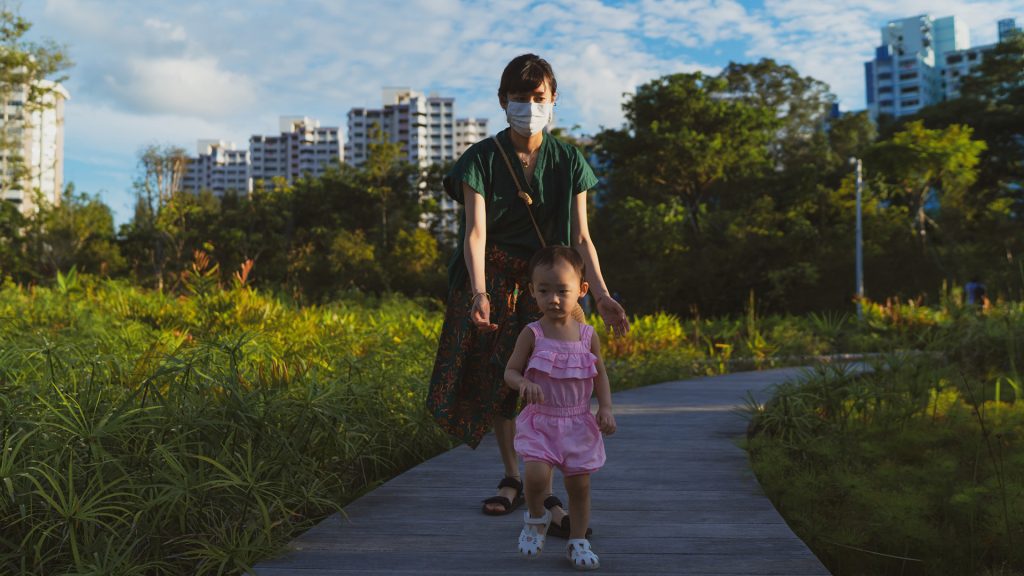
The advent of COVID-19 has led to much discussion about the severe toll it has taken on people’s mental health worldwide. A recent World Health Organization study revealed that the global prevalence of anxiety and depression rose by a staggering 25 per cent in the first year of the pandemic, and that young people and women were the worst hit. Multiple stress factors contributed to this, with the report citing the unprecedented levels of stress arising from social isolation during the pandemic as a major reason for the rise.
However, there has been a dearth of research on the mental health conditions of society’s long-term poor during this period. Addressing this, a team of NUS researchers from the Department of Social Work at the NUS Faculty of Arts and Social Sciences embarked on a novel study to examine COVID-19’s impact on the levels of depression and anxiety of low-income Singaporean mothers and their coping strategies.
The study revealed an unexpected finding – the mental health state of financially-poor mothers was found to be relatively stable in spite of the uncertainties wrought by the pandemic, with many adopting different strategies to cope with financial distress. Also, COVID-19 government support grants helped cushion the financial stress.
Associate Professor Esther Goh, who heads the social work department and led the study, revealed, “This is one of the first studies that empirically tracked the mental health conditions of low-income mothers at the initial phase of COVID-19 pandemic and immediately after the peak of infection in Singapore in June 2020. It gives rich insights into the coping strategies of the poor and government grant provisions that might have mitigated the unprecedented impact of COVID-19 on their mental health.”
The team’s findings were published in the renowned medical journal, The BMJ, in January 2022.
Tracing Singapore’s experience with COVID-19 in 2020 and its impact on low-income mothers
In response to the fast-evolving pandemic in Singapore in 2020, a multi-ministry task force was formed to pre-empt the potential risks and mitigate the ramifications of the pandemic. To stem virus spread, a nationwide partial lockdown, known as circuit-breaker, was implemented between 7 April and 4 May 2020, and this was subsequently extended to 1 June 2020. Only essential services and key economic sectors could keep their premises open whereas non-essential industries were ordered to close. On 1 June 2020, circuit-breaker measures were progressively lifted in phases.
The tightened safety measures brought about social, psychological and economic consequences on Singaporeans. To cushion the economic impact, the government introduced four budgets from February to May 2020, with subsequent enhancements. The budgets, which amounted to about S$100 billion, focused on helping companies and saving jobs, providing social support to households, and providing critical support for affected employees and firms.
To understand the pandemic’s impact on financially-disadvantaged mothers’ mental health, the team rode on a larger study on low-income families in Singapore, conducting five focus group discussions (FGDs) with 39 interviewers who carried out surveys with 424 mothers from low-income families post-lockdown between June and September 2020, and gleaning observations from the interviewers on the risk and stress levels of these mothers during the period leading up to March and April 2020 - the height of the COVID-19 pandemic.
In addition, survey data from two time points – pre-COVID-19 (December 2019 to February 2020) and post-COVID-19 pandemic height (June to September 2020), measuring the relationship of mother’s job loss, income earner loss, marital status, number of children and, permanency of employment and mother’s hope levels with mother’s depression and anxiety, were used to triangulate the observations from the FGDs.
Low-income mothers’ mental health state linked to availability of support in social milieu
Interestingly, data gathered from the FGDs revealed that about four-fifth of the mothers did not show extreme financial stress despite COVID-19 impacting family finances. Although interviewers observed a higher level of financial stress particularly among those who experienced income and job losses, most mothers were able to cope. The researchers also found few observations of emotional distress that were linked to the pandemic.
In addition, the mothers mentioned a range of strategies to manage their financial and emotional stress. Government COVID-19 payouts were cited as an important resource that tided them over the income reduction months and prevented them from plunging into a state of crisis.
These mothers were also knowledgeable in applying for other applicable COVID-19 grants through the assistance of social workers. In addition, they were found to be well-informed of community resources including Family Service Centres and Social Service Offices, and displayed a willingness to step forward to seek help, thereby revealing their proactive adaptive behaviours.
Another unexpected and prominent finding was that notwithstanding the financial and emotional stress reported, a sense of hope and resilience prevailed amidst the pandemic.
The impact of policy on low-income mothers’ resilience
Indeed, a strong link between the significant resources provided by the government and the sense of hope and resilience the mothers felt was observed. The team suggested several attributes in the political and economic context of Singapore that may have facilitated the internal resilience of the study respondents.
First, Singapore has a strong fiscal capacity with a total national reserve that is estimated to be well above S$500 billion, and this reserve has been drawn on during times of crisis. To cushion COVID-19’s impact, four budgets amounting to about S$100 billion were rolled out and this translated to practical and timely financial help for Singaporeans. Second, the whole-of-government approach taken in managing the pandemic, coupled with high political centralisation meant that the government was able to pass legislation quickly, such as the drawing of past reserves.
Third, the economic schemes were well-timed to coincide with the established domestic laws so that when the public health measures and human control measures kicked in to restrict human and therefore economic activities, the shock on lives and livelihoods was cushioned. Fourth, the vulnerable and low-income groups had access to information on the government support schemes and payouts, as details about the schemes were actively circulated and easily accessible through local news media. Lastly, the administration of the schemes also facilitated the access to help by those from the lower socio-economic group.
Assoc Prof Goh noted, “As a result of the significant resources provided by the Singapore government, the financially poor mothers have gathered various adaptive strategies to cope with the unexpected financial distress. This external (social milieu) resilience bolstered the financially poor mothers’ internal (psychological traits) resilience. Specifically, the availability of COVID-19 payout grants facilitated the coping processes and resilience in the familial and individual levels of low-income families, thus enhancing their stress-adaption processes.”
She added, “We found that the injection of fiscal policies by the Singapore government was effectively geared to save the livelihoods of the people. However, as Singapore begins transition from a pandemic to an endemic, a vital question to ask is: ‘what does this mean for the livelihood and mental health of these poor mothers?’ This is a potential area for future research.”
This article first appeared in NUSNews on 6 April 2022.
“I have HIV but I'm not the HIV” - the experiences of heterosexual Chinese men living with HIV in Singapore

Building Stronger Families and Communities in the Post-pandemic World
IN BRIEF | 8 min read
- In commemoration of World Social Work Day, the SSR Conference 2022 spotlights the struggles and resilience of vulnerable groups and social service workers alike as we journey towards the endemic stage of COVID-19.
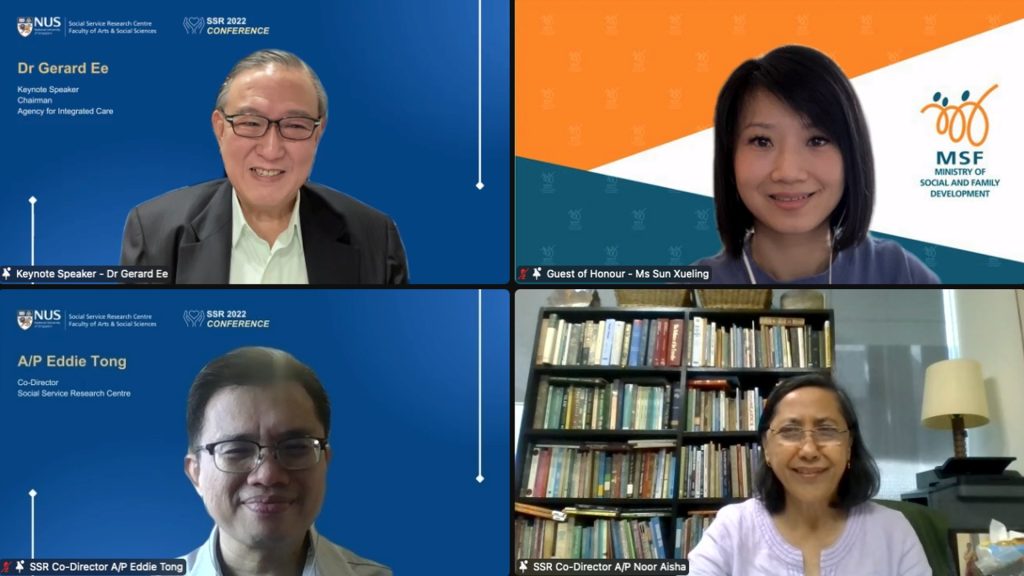
Families here have weathered severe strain during COVID-19, but with support from the social service sector, they can emerge stronger and closer than ever before in the post-pandemic era.
As Singapore moves towards a COVID-19 endemic state, a key focus should be on upholding families, especially disadvantaged ones, speakers stressed at the 2022 Social Service Research Centre (SSR) Conference held on World Social Work Day on 15 March.
About 20 researchers and experts from a wide range of multidisciplinary fields, from healthcare to social work practice, shared their insights at the event organised by SSR, which is part of NUS’ Faculty of Arts and Social Sciences (FASS).
It was a timely discussion, as 2022 is dedicated as The Year of Celebrating Singapore Families, Minister of State Ms Sun Xueling, the guest of honour at the online event, told the audience.
“As we transition towards living with COVID-19 in our midst, we must continue to evolve the social service sector to keep pace with various needs, such that we can make Singapore the best place for families,” said Ms Sun, who has two portfolios – Ministry of Social and Family Development (MSF) and the Ministry of Education.
COVID-19 magnified existing challengesThe pandemic has compounded challenges for many families, especially the lower-income ones and those facing financial difficulties, unemployment or poor health, Ms Sun observed. Many also struggle with childcare and facilitating their children’s home-based learning.
These issues are not new. Dr Gerard Ee, the keynote speaker at the event, noted that “even before the pandemic, issues such as the need for a stronger community spirit in looking out for each other, social interaction and digital safety existed”.
“COVID has accelerated, expanded and magnified such issues,” added Dr Ee, Group Chairman for all the Canossa programmes in Singapore, the Agency for Integrated Care and the Charity Council.
Challenges for social workersSocial workers, too, struggled during the pandemic.
“By the very nature of their jobs, social workers are already quite vulnerable to stress and burnout. COVID-19 increases this vulnerability,” pointed out SSR Co-Director and Associate Professor Eddie Tong from FASS’ Department of Psychology.
He cited a study in June 2020 that found that close to half of frontline social workers in Singapore reported mild to severe levels of depression and anxiety.

The pandemic also created an extremely challenging climate for conducting research, recalled Dr Ad Maulod, Senior Research Fellow at Duke-NUS Medical School’s Centre for Ageing Research and Education.
He recounted how researchers seeking to conduct five qualitative evaluation projects on older persons and their caregivers faced severe limitations during the pandemic that made in-person interviews difficult.
Digital illiteracy also made online interviews challenging for many elderly. The teams were rejected by some 75 per cent of the people they approached for interviews – an “unprecedented rate”, said Dr Maulod.
Adaptation and resilienceDespite the heightened challenges, however, many families and social workers have pulled through.
“Many Singaporeans have shown considerable resilience and optimism during the pandemic,” said Assoc Prof Tong.
To counter the isolating effects of the pandemic, community and service workers have sought to boost inclusion and empowerment of residents and beneficiaries within a community, said speakers on the first panel, which focused on “Community and Social Development in the post-pandemic era”.
At the new 643 Community Hub in Ang Mo Kio, for instance, Ms Adriana Rasip and Ms Pek Yan Zhan of AMK Family Service Centre shared stories and case studies about how residents co-created care programmes for neighbours who required support.
Dr Maulod also spoke of how intergenerational community support complements the family unit as a first line of defence in helping vulnerable older persons thrive in the “new norm”.
The other two panels examined the topics of “Mitigating the effects of COVID-19 on the wellbeing of the youth and elderly” and “Digital inclusion in COVID-19 times and beyond”. Professor Vineeta Sinha from the FASS Department of Sociology also contributed her thoughts during the second panel discussion.
The way forwardDr Robyn Tan, an SSR Research Fellow who moderated the first panel discussion, suggested that the social work sector can review how they can further empower clients and beneficiaries, challenging themselves with the question: “We are helping, but are we helpful?”
For MSF, making “an important shift” in approach from agency – dispensing help based on the way government schemes are organised – to family, where support is designed to meet the specific needs of each family, was a step towards being helpful, Ms Sun said.
For the broader social service sector, Dr Ee called for more “system thinking” in social programmes to address the individual’s needs more holistically, while creating a national glossary and taxonomy in order to standardise the way data is communicated.
He also emphasised the importance of examining issues with greater granularity to reflect the diverse views and values in our multicultural community.
More than 230 social service professionals, researchers and scholars attended the virtual conference, which has provided plenty of food for thought, and ideas and insights to sustain Singaporean families and communities in the years ahead. Since its launch in April 2015, SSR has been engaging the social service sector in impactful social service research and spearheaded research capability development programmes for social service agencies.
This article first appeared on NUSNews on 23 March 2022.
Open House 2022 Engages and Excites
IN BRIEF | 30 min read
- The ever-popular NUS Open House hit new heights this year, attracting over 8.61 million visitors – a 26.2 per cent increase from the 6.83 million visitors that attended last year's online Open House.
- From 26 Feb to 5 Mar, visitors crowded the websites, livestreams, webinars and social media sessions hosted by the University's colleges, faculties and schools. There was something for everyone, and the event covered everything from academic courses to student life and entrepreneurship programmes.

The ever-popular NUS Open House hit new heights this year, attracting over 8.61 million visitors – a 26.2 per cent increase from the 6.83 million visitors that attended last year's online Open House.
From 26 Feb to 5 Mar, visitors crowded the websites, livestreams, webinars and social media sessions hosted by the University's colleges, faculties and schools. There was something for everyone, and the hybrid event covered everything from academic courses to student life and entrepreneurship programmes.
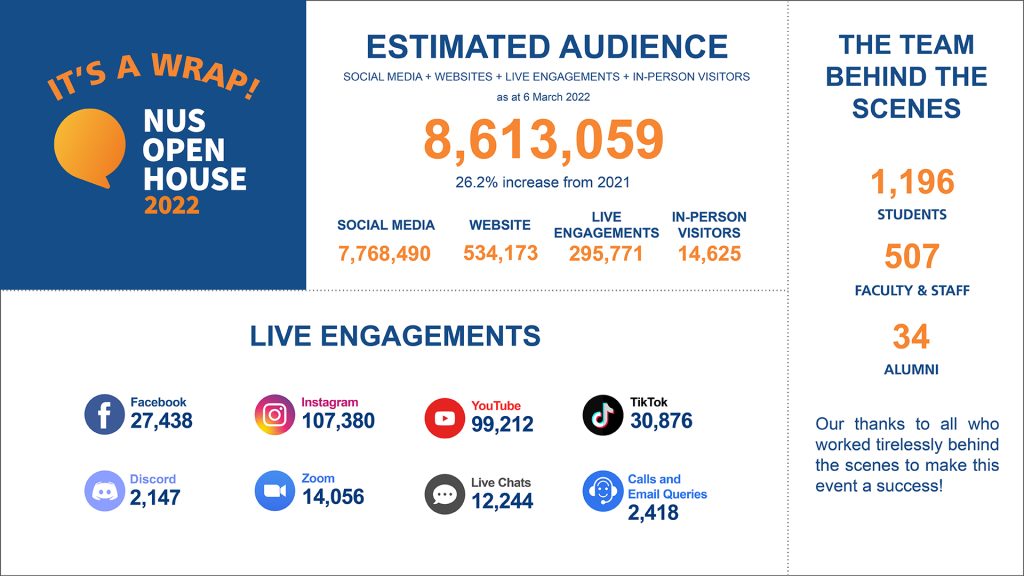
While much of the engagement happened online, prospective students got to meet NUS students and staff face-to-face for the first time since the pandemic started.
The physical Open House, held one sunny Saturday on 5 Mar, included numerous booths showcasing the University’s wide-ranging academic options and vibrant student life; sample classes and talks to get a taste of varsity life; and tours of the different colleges, faculties, and schools.
Prospective students gave the hybrid format a thumbs-up.
Joshua Chua, an alumnus of Anderson Serangoon Junior College, appreciated the online sessions and felt the physical Open House was a huge differentiating factor.
“The (physical) Open House really gave me a good image of what living and studying at NUS could look like by virtue of being an in-person event as opposed to it being virtual, so I'm really grateful to NUS and everyone involved for having this opportunity during the pandemic,” he said.
On her part, Hwa Chong Institution alumna Elsie Woo, who attended both the online and in-person sessions, said, “The experience was really welcoming and wholesome, and really exposed me to NUS as a whole.”
Showcasing the country’s first honours college
One of the highlights this year was the NUS College, Singapore’s first honours college. It will accept its first batch of students this year.
Prospective students were treated to online webinars on the College’s distinctive curriculum, its global pathways, and its focus on hands-on experiential learning. In more intimate breakout rooms, staff and student volunteers readily answered questions about student life and academic pathways. By having a home college or faculty – say Business or Science – while simultaneously being enrolled at NUS College, students will be able to get an educational experience that is as broad as it is deep.
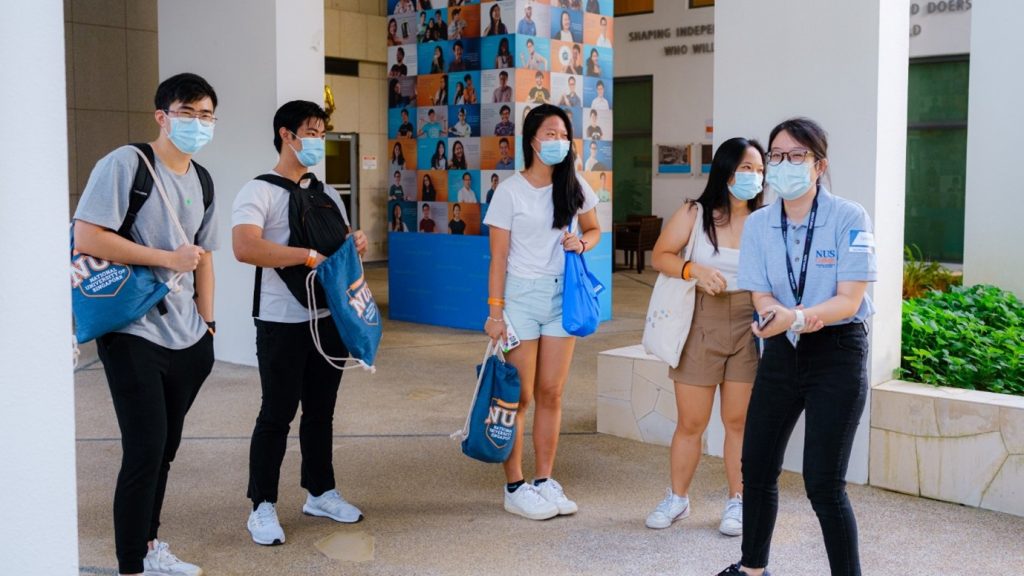
The in-person activities featured a tour of the facilities and residential options that NUS College students would be able to enjoy.
Elsie Woo was one of many students drawn to NUS College’s unique offerings.
“I attended a few webinars, including introductory talks for NUS College and Food Science and Technology,” said Elsie, who also visited many booths in-person.
“The sessions were very well-planned and the seniors were extremely helpful and patient.”
Nanyang Polytechnic alumnus Koh Jin Yuen focused his time on NUS College, attending the College’s guided tour and virtual sharing sessions.
“The NUS College tour was informative as I got to ask the facilitators about their experiences. I think the curriculum is very meaningful,” said Jin Yuen.
“The Open House helped to deepen my understanding of how NUS College works, and allowed me to better understand the lifestyle of a student from NUS College.” He is intending to apply for the Information Systems programme offered by NUS Computing, as well as NUS College.
Ramping up interdisciplinary offerings
Exciting developments in the realm of interdisciplinary education—a major theme that NUS has been championing—were foregrounded at the Open House, with the College of Design and Engineering (CDE) also taking in its inaugural cohort. A result of the merger of the Faculty of Engineering and the School of Design and Environment, CDE is set to transform the NUS educational experience.
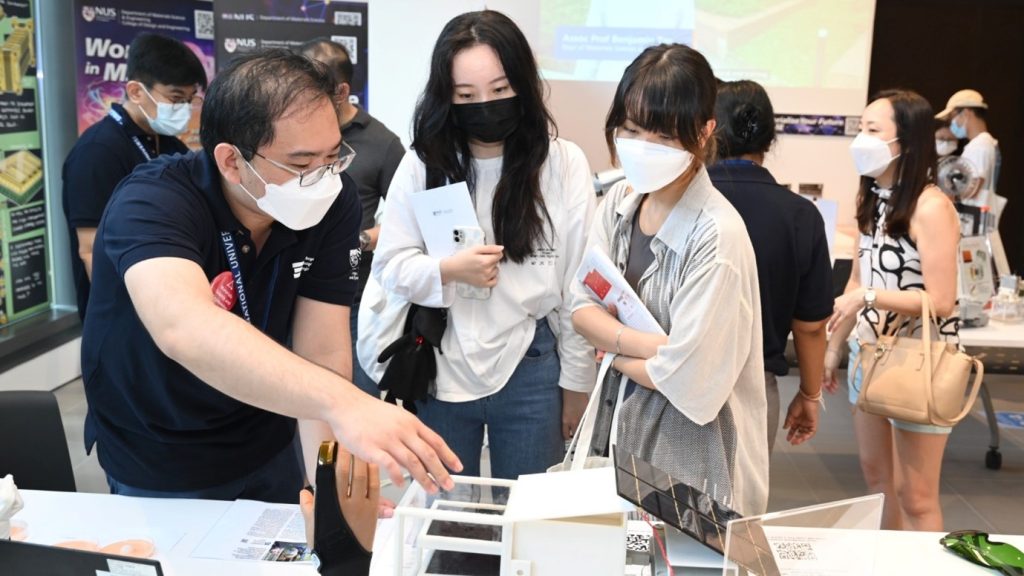
Across five galleries and 19 sub-categories, including Architecture, Industrial Design, Materials Science and Engineering, Biomedical Engineering, and Civil Engineering, visitors were presented with an informative display of the wide range of courses and programmes that will be on offer in the new College.
Raffles Institution alumna Grace Zai, who visited the Designing the Future exhibition and galleries, said, “The Engineering galleries were very informative as I could ask questions I had about the course, as well as student life, and get a clearer picture of what I would be studying and doing. It helped me make a more informed decision on my choices.”
Grace is considering applying to Engineering Science and Architecture, as well as Mechanical Engineering and Electrical Engineering with a specialisation in robotics.
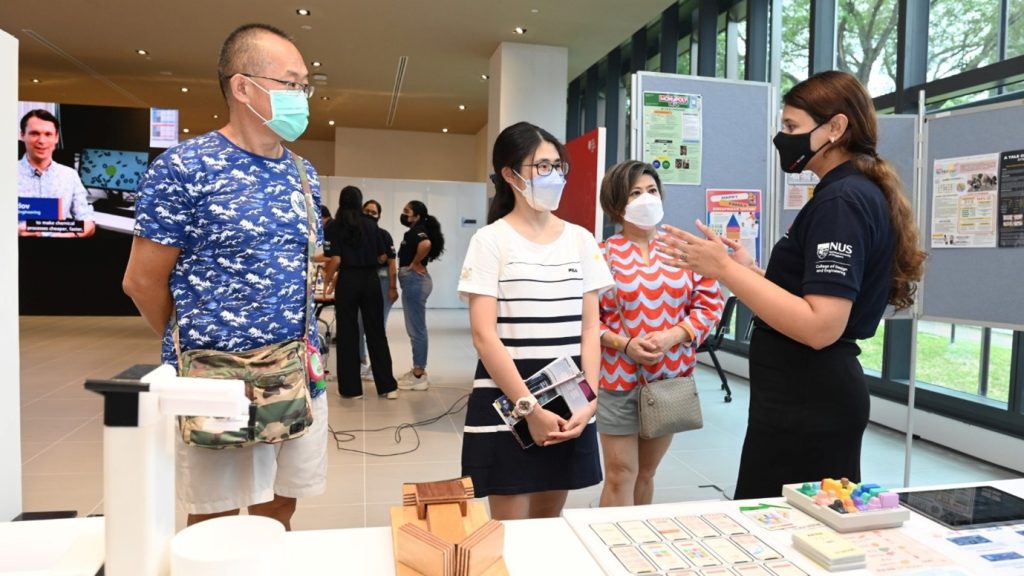
There were also panel discussions, both online and in-person, where faculty and current students interacted with prospective students to share their experiences and answer questions about the new interdisciplinary curriculum.
“As a prospective student, I got to see first-hand the school facilities, as well as the accommodations. My experience was pretty enriching and enlightening because I could ask the professors questions I had in mind and learn more about the courses,” said Timothy Tay, a graduate of Victoria Junior College who visited the SDE gallery on Sustainable Innovations.
“For example, I did not realise Project Facilities Management (PFM) was recently changed to Infrastructure Project Management (IPM). The professor explained that students will now graduate with a BEng degree rather than a BSc degree,” he recalled, referring to the first interdisciplinary full-time undergraduate programme to cover engineering, design, management, technology, building science and law modules.
Information was also available on the vibrant student life of the College’s various clubs and societies, as well as career programmes that enable students to better understand their interests and what it takes to marry that with industry skills and experience.
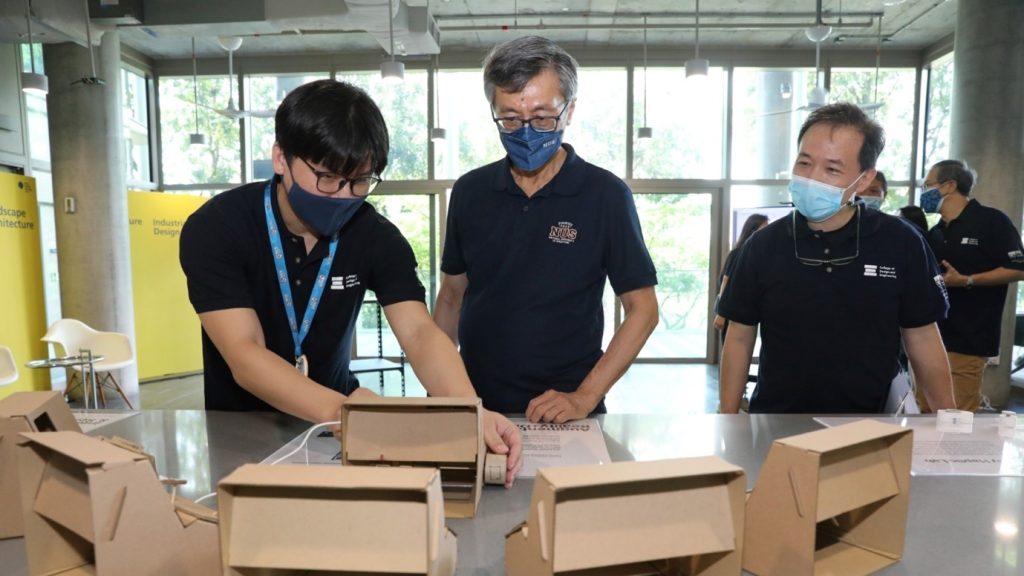
“The NUS Open House provided me with a more informed perspective on the courses offered in NUS. The various booths set up and run by students allowed for quick chats about what the courses have to offer. The responses by the students and professors were engaging and genuine, which I found informative in making my choice for courses in NUS,” said Kalepu Sai Sri Akshath, who attended CDE’s online and in-person events with his family and is intending to apply to Computer Engineering.
Drone-sensing demonstrations and the Solar Roof Tour, 5G Lab Tour, and BEEHUB Tour further showcased the College’s manifold facilities. Visitors also got a first-hand experience of NUS’ very own net-zero energy building through tours at SDE4, itself a product of both architecture and engineering, and the first of its kind in Singapore.
A marriage of the humanities and sciences
Continuing in the vein of interdisciplinarity and equipping students with a multifaceted, integrated toolbox of skills to thrive in the future economy is the College of Humanities and Sciences (CHS), which will be accepting its second intake this year.
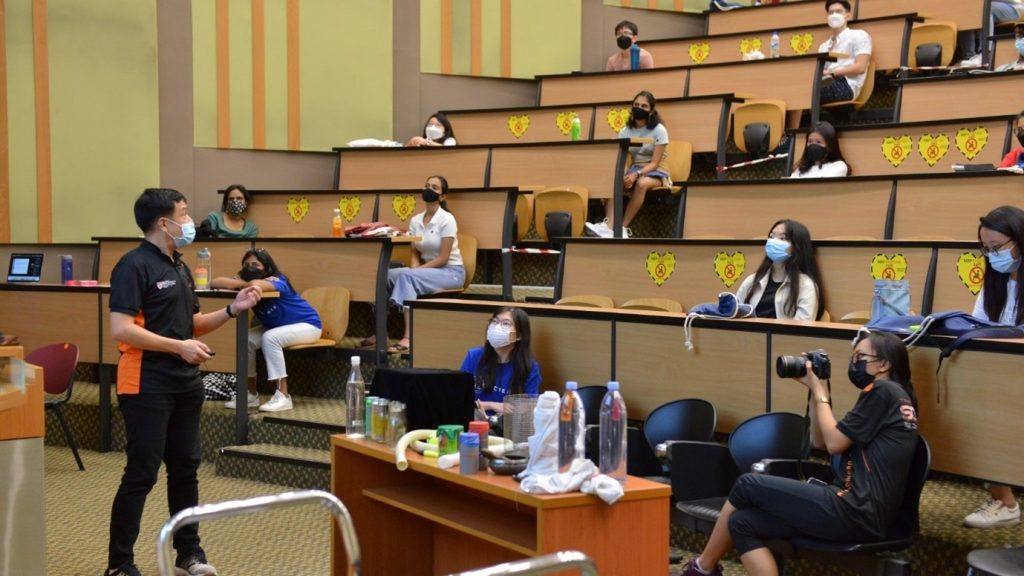
Seminars about the CHS Core Curriculum were available at the Open House, as well as informative masterclasses that covered a vast range of interdisciplinary topics.
The Data Science and Economics masterclass saw Assoc Prof Lim Tiong Wee and Assoc Prof Chen Ying (Statistics & Data Science, Faculty of Science) and Dr Denis Tkachenko (Faculty of Arts and Social Sciences) break down the complexities of the digital economy with real-life examples, and explicate its relevance to Singapore’s Smart Nation goals.
The new Data Science and Economics (DSE) cross-disciplinary programme will be the first of its kind in Singapore to integrate knowledge across these two disciplines.
“I got to understand how data science and economics complement each other,” said Russell Hor, a graduate of St. Joseph's Institution who has finished National Service and is enrolling in CHS this year.
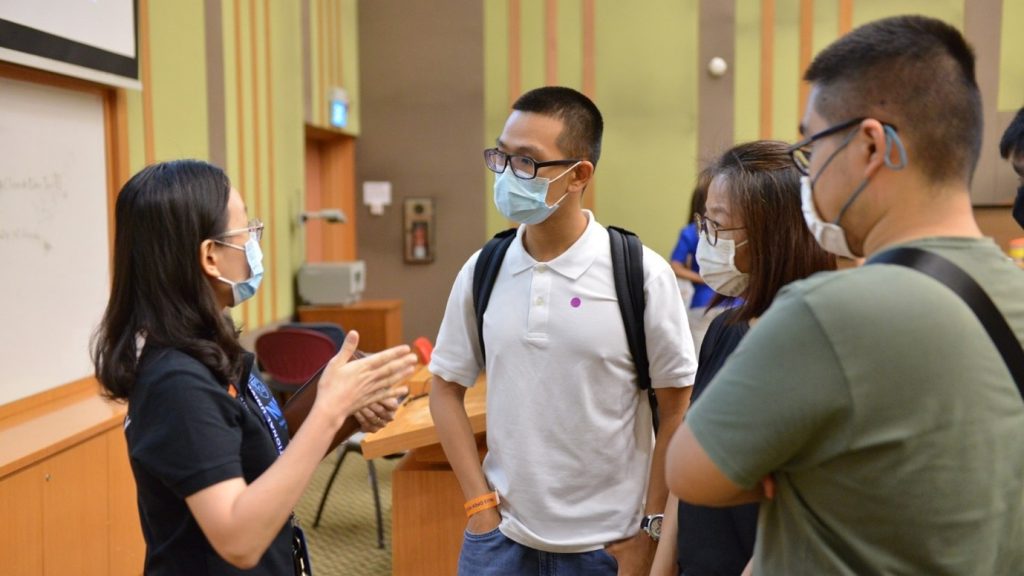
Vanille Goh, who graduated from Anglo-Chinese Junior College and attended the Geography and Environmental Studies masterclasses, said, “[The masterclasses] provided me with a good overview of how passionate the lecturers were and how each course will adequately prepare me for what I would want to do in the future.”
Nanyang Junior College alumna Wen Xinyue also appreciated the in-person masterclasses, adding that they gave her a first-hand glimpse into studying humanities at the university level.
“I am interested in studying English, and from the English Language and Literature masterclass on Gender, Sexuality and Language, I learnt about how entrenched gender roles and stereotypes can be within the language we use,” she shared.
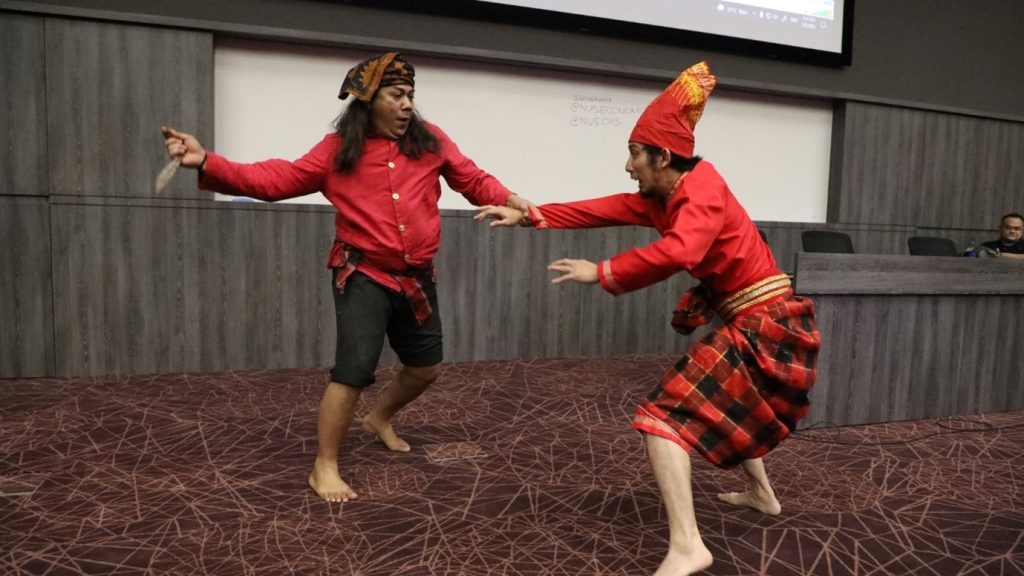
Meanwhile, over at the “Insights into Southeast Asia from the Martial Arts Perspective” masterclass, Dr Mohamed Effendy of NUS Southeast Asian Studies presented prospective students with a riveting intellectual and visual treat, demonstrating how useful unique perspectives on the region’s myriad communities can be gleaned by studying them through the lens of the martial arts. Students saw the concepts brought to life – witnessing first-hand an exciting live demonstration by practitioners of pencak silat – of how Southeast Asian warriors of old defended themselves using a wide array of techniques and weapons.
Action aplenty
There was action aplenty among other faculties. NUS Business School’s programmes included a 360 live tour, as well as live chats with the BBA Deans on the different majors offered by the School. Its in-person sessions included sharing sessions by the BBA Deans, BIZCareers advisors, and student ambassadors.
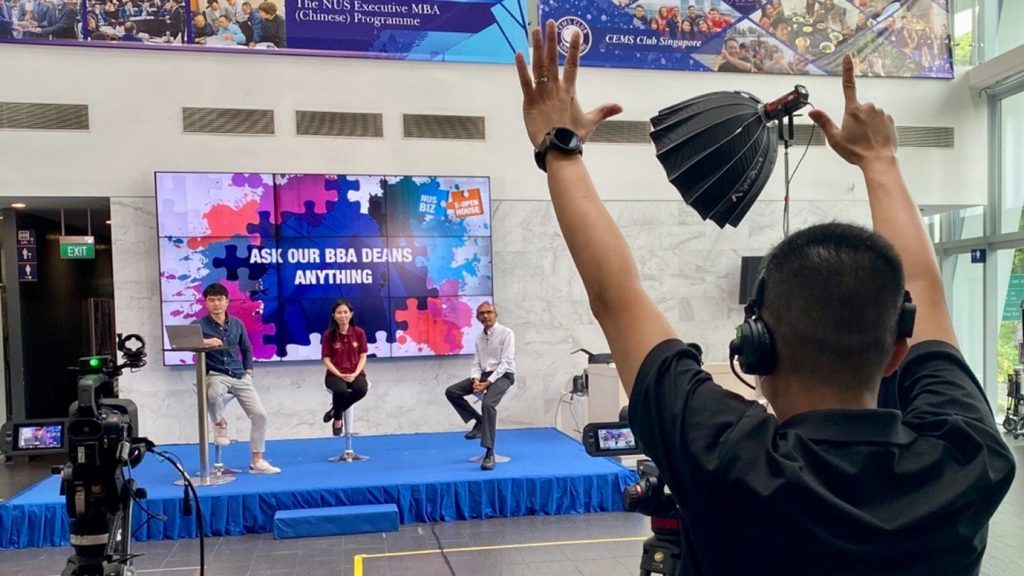
Year 4 Accountancy and Finance undergraduate Calvin Chur was one such student volunteer, serving as an emcee for the online Open House and sharing in-person on 5 Mar about life at the Business School.
“It was a tiring, but extremely fulfilling day engaging with prospective students, learning about their concerns with regards to entering a new phase of life and trying to address those concerns,” said Calvin. “In fact, many of their concerns mirrored those that I had as a fresh A-level graduate attending the NUS Open House back in 2016 – and I am glad that I could offer insider insights to help them make an informed decision at this major milestone of their lives.”
Year 4 Real Estate undergraduate Natasha Liem, another student volunteer who served as an emcee, added, “There was quite a large number of viewers for the panel and a prospective student actually sent me a message on Instagram to enquire more about real estate from a student's perspective. I think the panel went well!”
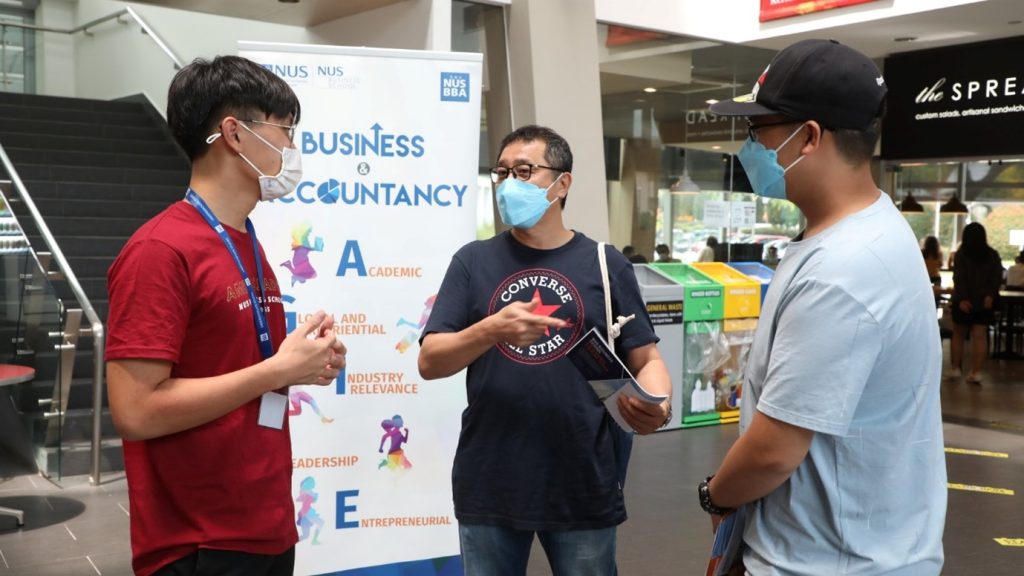
For NUS Business School Executive (Marketing & Outreach) Ms Casey Jean Grant, it was an eye-opener to experience the whole planning process.
“Most of the students and parents were very curious and excited about the prospect of coming to NUS Business School,” she added. “Their excitement definitely rubbed off on us and made the rest of us excited to share about our School.”
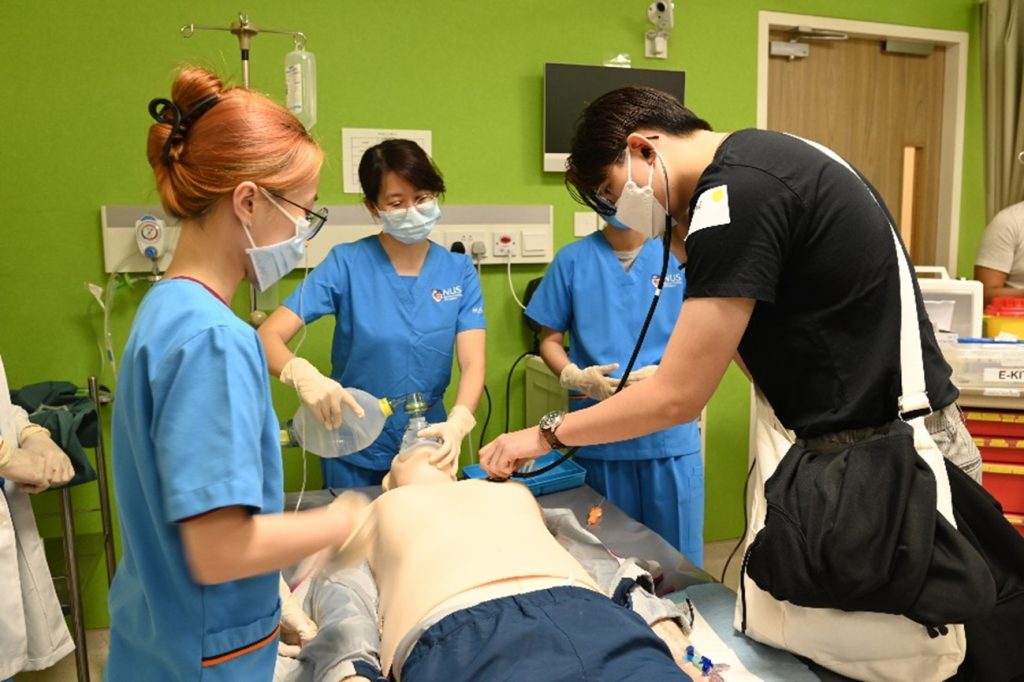
With frontline healthcare workers being in the spotlight these couple of years, there was plenty of interest in NUS Dentistry, NUS Nursing, NUS Medicine, and Duke-NUS Medical School. Live demonstrations were conducted and prospective students got a taste of what it would be like to be a dentist, nurse or doctor.
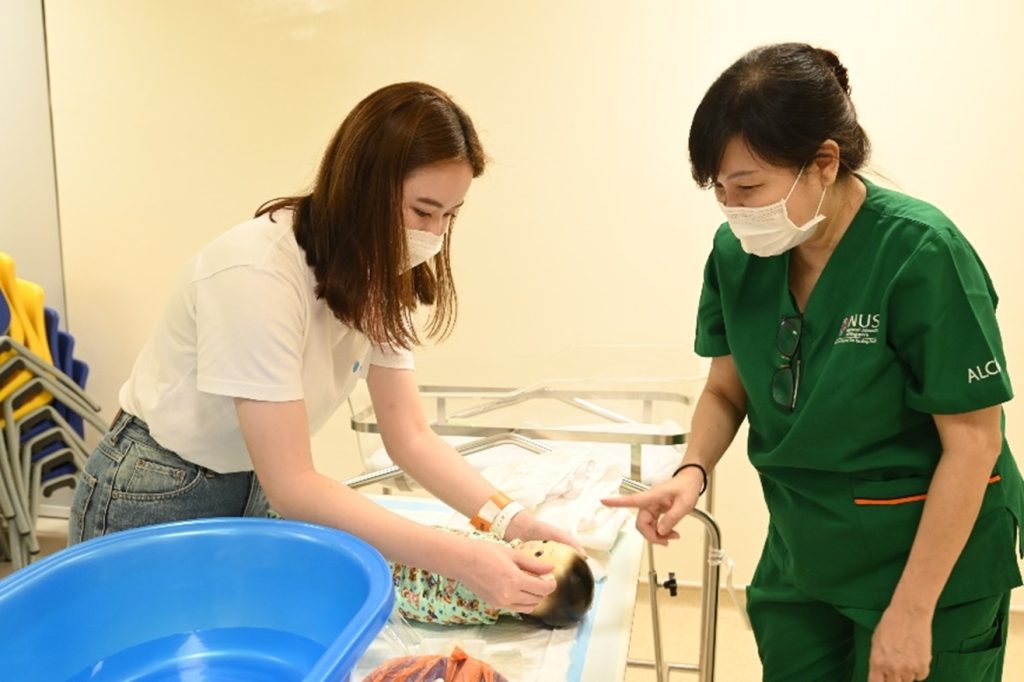
Serving up a slice of campus life
Whether on the screen or in the flesh, visitors to the Open House also witnessed the rich and vibrant student life beyond the classroom that NUS is known for.

Besides holding talks to acquaint visitors with the wide range of co-curricular activities available, student clubs and societies rose to the occasion at the Student Village showcases to feature a spectacular smorgasbord of music, dance and sporting performance across the eight days that Open House was on. Visitors were serenaded by soulful tunes by the NUS Jazz Band and wowed by the moves of NUS Kendo Club. They were also treated to cheerleading displays, snazzy dance performances by NUS Funkstyle and BreakiNUS, catchy renditions of contemporary pop and choral music by the a cappella group Resonance, and the dulcet tones of TheNUSChoir and the NUS Mandopop group Voices.
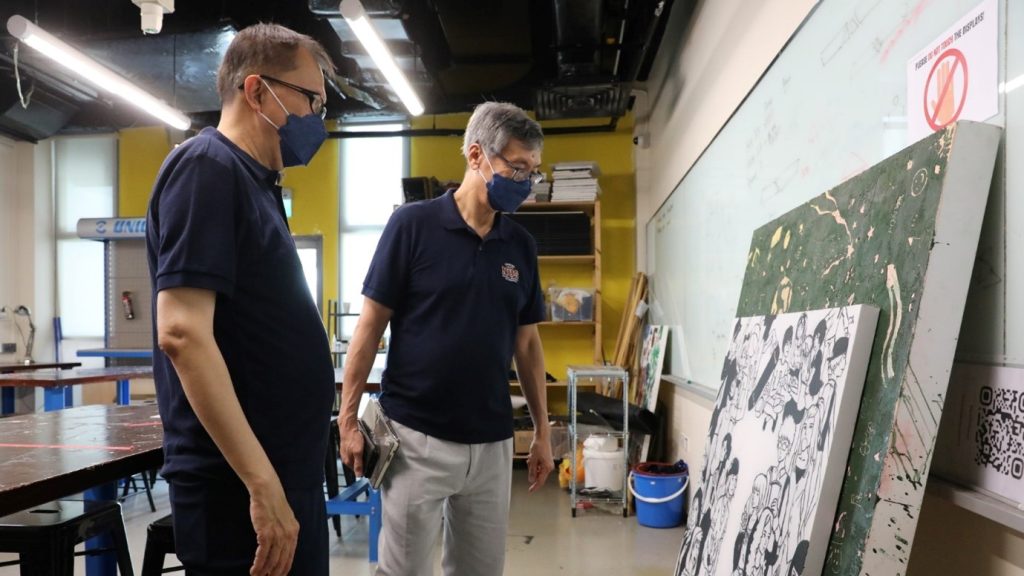
"It was really lively with dozens of booths as well as live performances put on by really talented students! It truly allowed me to understand the culture here and makes me want to be a part of it after experiencing first hand,” Vanille Goh shared.
Students and hall masters from the halls and residences also conducted informative residential life talks, A-Day-in-the-Life-Of vlog sessions and Ask-Me-Anything sessions to help students interested in on-campus living understand its manifold aspects like academic programmes and pastoral care.
These were complemented by in-person tours of King Edward VII Hall, NUS College, Ridge View Residential College, Tembusu College, RC4, and Pioneer House, NUS’ newest housing model, giving participants a real taste of the sense of community and camaraderie that comes with residential life in NUS.
Joshua Chua, who also participated in the RC4 tour, said, “The RC4 tour was definitely a highlight because the tour guide, as with most staff and students, was welcoming and frank, which eased my nervousness.”

Matthew Yeow, an alumnus of Anglo-Chinese School (Independent) who attended both online and in-person sharing sessions by student residents of the Residential Colleges, said, “During the physical Open House, I had the opportunity to find out a lot more about the residential colleges and what made them distinct from halls. Furthermore, I also got to find out more about the individual residential colleges and their communities, as well as the additional modules they took.”
“As a prospective student, I think the Open House was executed effectively through both the online and physical mediums. Having the opportunity to come down and visit the University and talk to the current students gave me a better understanding of student life in NUS,” he added.
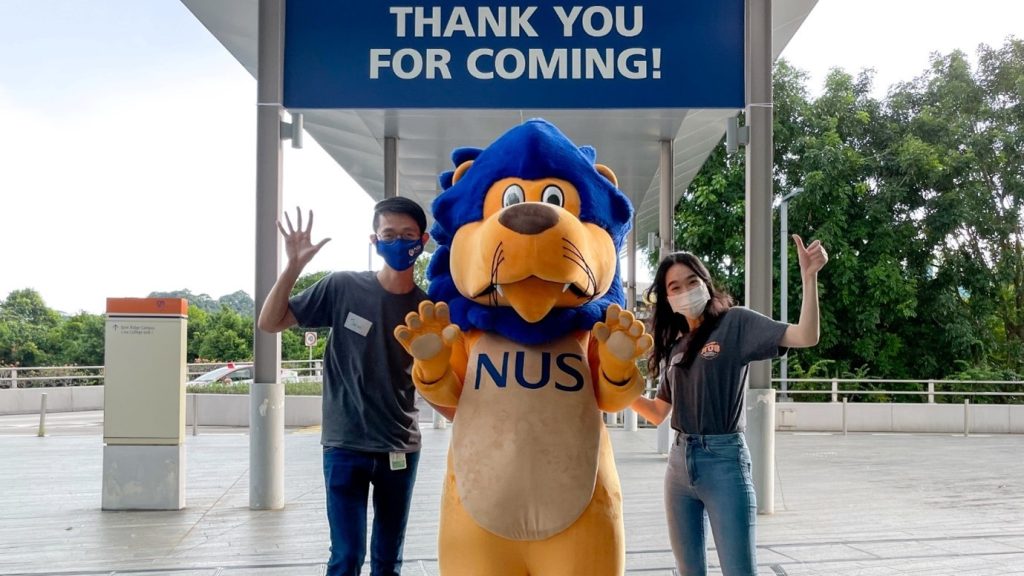
This story first appeared on NUSNews on 8 March 2022.
New Courses for the New Economy
IN BRIEF | 5 min read
- NUS is offering a number of new programmes to prepare graduates for the future, including the much-anticipated Major in Anthropology, and Minor in Interpreting by the NUS Department of Chinese Studies.
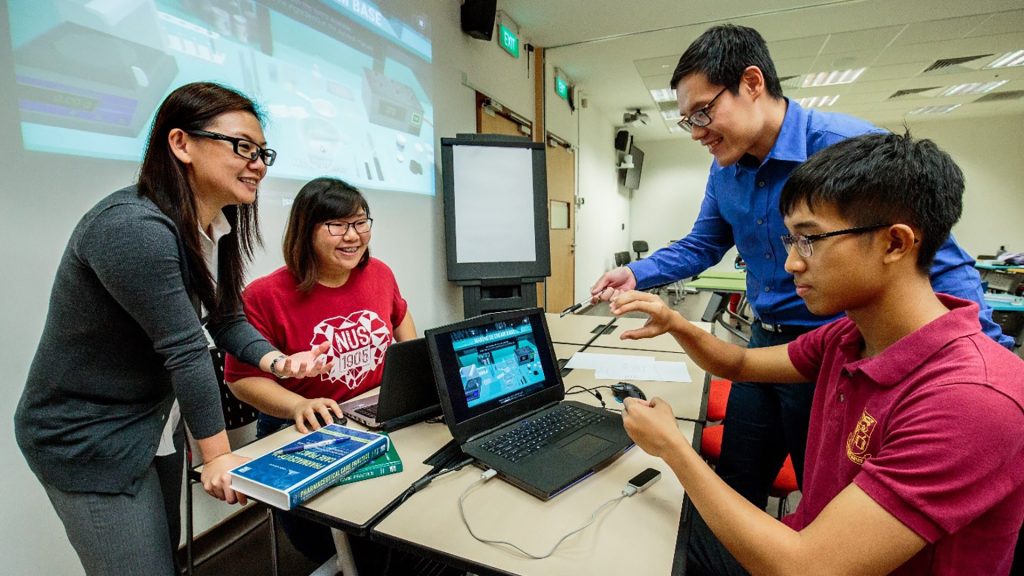
The University’s key theme of preparing undergraduates for the workplace of the future will be further enhanced with the launch of new majors, minors and degree specialisations in the upcoming academic year. About 10 new courses are on the cards.
New programmes from the NUS College of Design and Engineering (CDE), NUS Faculty of Science, NUS School of Computing, and NUS Faculty of Arts and Social Sciences will cover areas such as Artificial Intelligence, technology, data science, sustainability, globalisation. They will add on to the interdisciplinary offerings by the flagship NUS College, Singapore’s first honours college welcoming its first cohort in August – as well as those by the College of Humanities and Sciences (CHS).
“The overall goal of all our education reform efforts is to advance a university curriculum that prepares students well for a Fourth Industrial Revolution world and workplace,” said Professor Bernard Tan, NUS Senior Vice Provost (Undergraduate Education).
“Our education, focused on both breadth and depth, ensures that our graduates are held in high regard by employers. Last year, more than nine in 10 NUS graduates secured a job within six months of their final examinations.”
New majors and minors
Bachelor of Engineering (Infrastructure and Project Management)Offered by CDE’s Department of the Built Environment, this degree will equip graduates with the knowledge and interdisciplinary skills to excel in the multifaceted built environment. This is the first interdisciplinary full-time undergraduate programme to cover engineering, design, management, technology, building science and law modules. Major in Anthropology
Offered by the NUS Faculty of Arts and Social Sciences to all CHS students, this major will study the range of human diversity, accounting for how people in different times and places have developed into distinctly different societies. The degree will expose students to a vast variety of different beliefs and health practices, economic and political systems, material culture, and even different notions of beauty, the environment, food, family, and the good life.
Anthropology is much sought after for the sort of training it offers its students – a ground up approach to developing deep understanding on just about every aspect of the human condition. Students will be equipped to better understand and deal with the chaos, uncertainty, and ambiguity that characterises the contemporary age.
Second Major in Sustainable Urban DevelopmentOffered by CDE’s Department of Civil and Environmental Engineering, it aims to train the next generation of urban problem-solvers. They will be equipped with interdisciplinary knowledge and skills to create sustainable urban environments in the context of the changing climate. Open to all NUS undergraduate students, this major is stackable to students’ primary major in their chosen field, and can be completed in four years with no additional academic workload. Second Major in Nutrition
This will be offered by the Faculty of Science to all CHS students, including those reading Food Science and Technology as the primary major. It is designed to equip students with knowledge in human nutrition, providing them with the necessary foundation to develop a cross-disciplinary perspective along the food supply chain – from farm to fork to health. Minor in Interpreting
Multilingualism is a defining characteristic of Singapore’s multi-ethnic, immigrant society. With four official languages and with English as the working language, translating and interpreting between each of the mother tongues and English has always been a prominent feature of Singapore society. Against this backdrop, the NUS Department of Chinese Studies has placed as one of its core objectives, the training of graduates with strong Chinese-English bilingual skills who can become leaders in the translation and interpreting arenas.
This new Minor will allow students a related alternative to translation, or as an affiliated Minor to Translation which is already being offered at the Department.
New specialisations
Three new specialisations will be offered by the NUS School of Computing:
Specialisation in Digital Product and Platform ManagementThis will be offered to students pursuing the Bachelor of Computing (Information Systems) Degree. They will build up a repertoire of knowledge and skills sought after by both technology companies and the digital immigrant companies that are fast adopting the product- and platform-centric technology and business operating models. Specialisation in Intelligent Systems Solutioning
Students pursuing the Bachelor of Computing (Information Systems) Degree can also take this new specialisation to learn to implement and apply intelligent system solutions buttressed by the new technologies of Artificial Intelligence, the Internet of Things, and Augmented Reality. They will learn to apply these new technologies in software engineering, and to implement and manage intelligent system solutions. Graduates will be able to take on job roles in intelligent systems engineering and solutioning. Specialisation in Machine Learning-based Analytics
This new specialisation for Bachelor of Science (Business Analytics) students will enable students to tap into the analytics capabilities of Machine Learning, a sub-field of Artificial Intelligence. They will learn to rapidly and automatically develop models that can quickly and accurately analyse massive, complex data sets, in order to help businesses unlock the value of corporate and customer data and enact decisions that keep them ahead of the competition. Graduates will be able to take on careers in the rapidly-growing business and data analytics field, among others.
New modules
Aside from the new majors, minors and specialisations, a number of new modules are being offered. For instance, the NUS School of Computing is starting a Digital Ethics and Data Privacy module to educate students on this pertinent and pressing issue.
The NUS Faculty of Law is introducing two modules – one on Law & Technology and one on Data Literacy – as technology and data are increasingly being key drivers for the legal industry.
Find out more about the courses offered by the University, and explore this year’s Open House. Here are four things to look out for at the Open House.
This story first appeared on NUSNews on 24 February 2022.
NUS Open House 2022: Interdisciplinary Offerings, In-person Activities and More!
IN BRIEF | 5 min read
- NUS Open House 2022 is back with opportunities for prospective students to meet NUS professors, students and alumni face-to-face, after two years of connecting virtually.
- Running from 26 February through 5 March, NUS Open House 2022 will begin with a comprehensive line-up of informative activities, including the online segment, during the week leading up to the physical Open House, which takes place on Saturday, 5 March from 9 am to 7 pm across NUS’ campuses in Kent Ridge and Bukit Timah.

NUS Open House 2022 is back with opportunities for prospective students to meet NUS professors, students and alumni face-to-face, after two years of connecting virtually.
The physical event will take place on Sat, 5 Mar from 9am to 7pm across NUS’ campuses in Kent Ridge and Bukit Timah. This will be preceded by a comprehensive line-up of informative activities during the week leading up to the physical Open House.
Including the online segment, NUS Open House 2022 takes place from 26 Feb to 5 Mar. Here’s a heads-up on four things to check out:
1. Exciting interdisciplinary offerings
NUS College, Singapore’s first honours college, was formed by the merger of the University Scholars Programme and Yale-NUS College. Offering an immersive, experiential and interdisciplinary educational journey, it will welcome its first batch of students this year. Students will have a home college or faculty, say, Business or Engineering, while simultaneously being enrolled at NUS College. There, they will have the opportunity to enjoy a holistic interdisciplinary curriculum that is complementary to their major.
Another option for interdisciplinary learning can be found at NUS College of Design and Engineering. The College offers a programme that prepares students for the future through interdisciplinary learning and robust research in the fields of engineering and design. At the College, students are given the flexibility to build and design their own learning experience.
The NUS College of Humanities and Sciences, the enhanced undergraduate experience for students of the Faculty of Arts & Social Sciences and the Faculty of Science, is accepting its second intake this year. The College offers 13 Common Curriculum pillars consisting of modules such as scientific inquiry, humanities, digital literacy, design thinking, artificial intelligence and many more exciting options. These are complemented by majors and minors spanning the arts, humanities and sciences, such as global studies, philosophy, theatre and performance studies, quantitative finance, data analytics and pharmaceutical science. Students can pick and choose modules to create a customised curriculum that matches their interest and aspirations.
To ensure that graduates are ready to take on leading roles in the New Economy, NUS constantly develops new courses. Here are this year's new offerings.

2. Meeting you in person - again
After two years of meeting virtually, the NUS community is excited to get together in real life with prospective students once again!
You can look forward to an enlightening schedule of in-person activities including a tour of the Centre for Healthcare Simulation by NUS Nursing; tours of residential living options such as Tembusu College, CAPT (College of Alice & Peter Tan), and RC4; a live demonstration of a moot court session and tour of the NUS Bukit Timah campus by NUS Law; tours and a showcase of NUS College; as well as a live question-and-answer session with Duke-NUS Medical School.
3. Webinars, talks, live chats, hotlines and more
Get a taste of life as an NUS student, even before the physical event. A host of insightful webinars, talks, question-and-answer sessions, live chats, hotlines, and virtual tours have been arranged starting 26 Feb to give you a head start on topics such as admissions, student life, and on-campus living, as well as programmes offered by NUS College, the College of Design and Engineering, the College of Humanities and Sciences, Business, Music and many more.
Obtain behind-the-scenes knowledge from NUS student ambassadors and the NUS Students’ Union on the rich student life available at NUS, and be serenaded by NUS Choir and NUS Jazz Band.
Professors will be on hand to share information on their respective programmes, and you’ll even have a chance to sit in on classes. Have a question that is not covered by the briefing? No sweat! There’ll be chat sessions with NUS Admissions, professors and students from selected programmes during which you can get your queries addressed.
Click here for the list of virtual and in-person activities for NUS Open House.

4. Exciting student life
NUS offers a myriad options for a rich student life, and NUS Open House is the perfect place to start exploring the possibilities. Many alumni recall their NUS days fondly, remembering not only the academic progress they made, but the camaraderie forged with friends from clubs, societies and on-campus residences.
Throughout the period of the online Open House and during the physical event, representatives from various student-led groups will speak on topics including hall life, clubs and societies, as well as campus performing groups. Take part in a live session with music and dance groups, embark on a virtual residential tour, and more.
We’re looking forward to seeing you online from 26 Feb and in-person on 5 Mar!
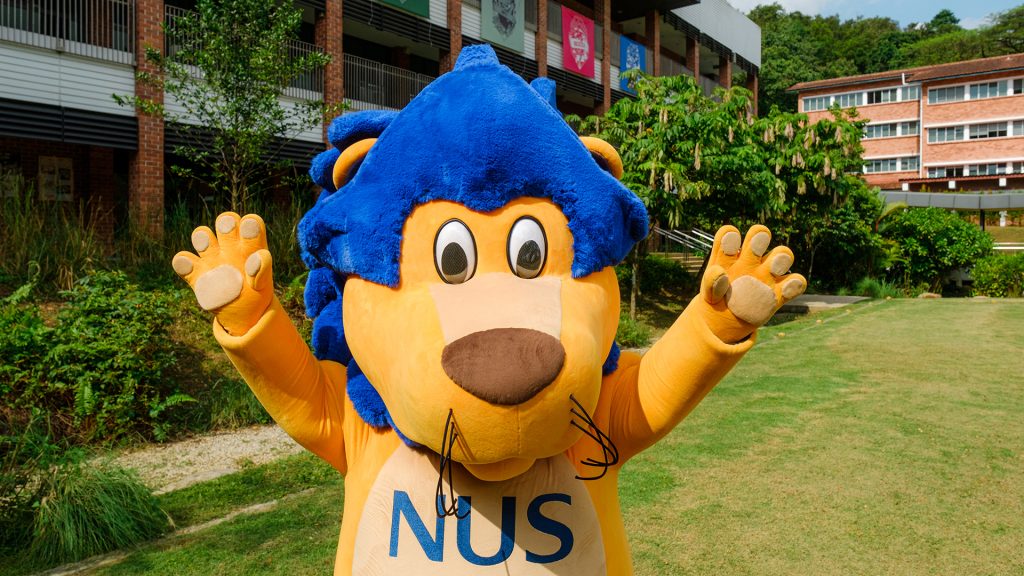
This story first appeared on NUSNews on 23 February 2022.
New policies should be tested on the most vulnerable to be more inclusive: NUS Don
In ‘New policies should be tested on the most vulnerable to be more inclusive: NUS don’, The Straits Times reported that during the January 13th Institute of Policy Studies Singapore Perspectives 2022 forum, Associate Professor Irene Ng (NUS Department of Social Work) argued that for policies to be inclusive, they must first be tested out on the most vulnerable populations before being introduced to the rest of the public. In Singapore, digital inclusion programmes have been run for years, with the Government often holding focus group discussions to get feedback on their policy ideas. However, A/P Ng pointed out that the most vulnerable in society are often not confident enough to join or speak out at these focus group discussions, making these discussions insufficient in understanding the true sentiments of the most vulnerable. Even as countries apply data analytics to investigate and plan for the needs of citizens, A/P Ng asserted that planners also need to remember that the data they are using represents the average citizen and leaves out other vulnerable groups who may not enjoy the same standard quality of life as others. Many of those from the most vulnerable segments of society have little to zero access to the digital world and are unaware of what they do not have. A/P Ng also mentioned that Singapore’s reliance on migrant workers should be reduced so that more resources can be focused on improving the living conditions and inclusiveness of these migrant workers in Singaporean society. Additionally, for greater inclusiveness in housing policies, beyond housing for the average citizen, the Government needs to plan for housing types for vulnerable groups such as the single elderly, migrant workers, and non-traditional families. Read the article here.
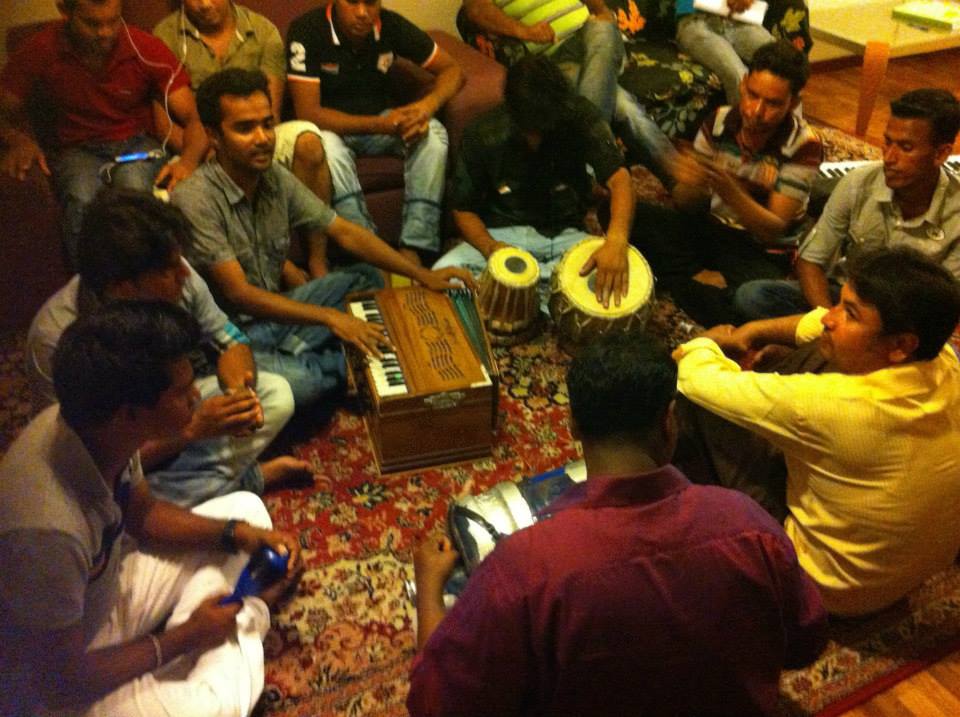
FASS Inspiring Mentor 2021 Award Winners Announced

The NUS Faculty of Arts and Social Sciences is proud to announce the winners of the 2021 FASS Inspiring Mentor Awards.
Congratulations to:
- Prof Jack Qiu Linchuan, Professor, Department of Communications and New Media
- Assoc Prof Loy Hui Chieh, Associate Professor, Department of Philosophy
- Assoc Prof Robin Loon Seong Yun, Associate Professor, Department of English Language and Literature
- Dr Michael Yoshitaka Erlewine, Assistant Professor, Department of English Language and Literature
- Dr Nina Laurel Powell, Senior Lecturer, Department of Psychology
Winners of AY2020-21 Faculty Teaching Excellence Awards Unveiled
 The NUS Faculty of Arts and Social Sciences is proud to announce the 37 winners of the Faculty Teaching Excellence Award for their work in AY2020‐21, 16 of which have also been nominated for the Annual Teaching Excellence Award(ATEA) and Annual Digital Education Award (ADEA).
The NUS Faculty of Arts and Social Sciences is proud to announce the 37 winners of the Faculty Teaching Excellence Award for their work in AY2020‐21, 16 of which have also been nominated for the Annual Teaching Excellence Award(ATEA) and Annual Digital Education Award (ADEA).
Special thanks are due to members of the Faculty Teaching Excellence Committee–Dr Susan Ang (English Language and Literature and Chair of FTEC), A/P Loy Hui Chieh (Philosophy; FASS Vice‐Dean), A/P Lim Wee Hun, Stephen (Psychology), Dr Gilbert Yeoh (English Language and Literature) and Mrs Chen Ing Ru (Centre for Language Studies)–for their efforts in shortlisting and nominating the winners.
|
NAME |
DEPARTMENT |
|
Mr Appriou Yannick Francois |
Centre for Language Studies |
|
Ms Baranska, Malwina |
Centre for Language Studies |
|
Ms Klayklueng, Sasiwimol |
Centre for Language Studies |
|
Ms Morita, Kazuko |
Centre for Language Studies |
|
Dr Chaidaroon Suwichit |
Communications and New Media |
|
Dr Hong Renyi |
Communications and New Media |
|
Dr Mitchell, Alexander Ian |
Communications and New Media |
|
Dr Shobha Avadhani |
Communications and New Media |
|
Mr Tan Kai En |
Communications and New Media |
|
Dr Timothy Wong Chong Ji |
Economics |
|
Dr Vu Thanh Hai |
Economics |
|
A/P Michelle M. Lazar |
English Language & Literature |
|
Dr Miguel Escobar Varela |
English Language & Literature |
|
A/P Starr Rebecca Lurie |
English Language & Literature |
|
A/P Thell Anne Marie |
English Language & Literature |
|
Dr Roy, Tania |
English Language & Literature |
|
A/P Chang Tou Chuang |
Geography |
|
A/P Daniel Adam Friess |
Geography |
|
Dr Gretchen Christina Coffman |
Geography |
|
Dr Kamalini Ramdas |
Geography |
|
Dr Kenney-Lazar Miles Richard |
Geography |
|
Dr Teo Sheng Kiat, Shaun |
Geography |
|
Dr Donna Maree Brunero |
History |
|
Dr Lawrence, Kelvin |
History |
|
Dr Sayaka Chatani |
History |
|
Dr Beddor, Robert Speeter |
Philosophy |
|
Prof Bain, William Ward |
Political Science |
|
Dr Dunya Deniz Lepori |
Political Science |
|
Dr Jia Lile |
Psychology |
|
Dr Nina Laurel Powell |
Psychology |
|
Dr Wong Shi Hui Sarah |
Psychology |
|
Dr Peace Wong Yuh Ju |
Social Work |
|
Dr Chua Hui Ching, Emily |
Sociology |
|
Dr Elliott Edward Prasse-Freeman |
Sociology |
|
Dr Jennifer Emily Estes |
Sociology |
|
Dr Noorman Abdullah |
Sociology |
|
Dr Radics, George Baylon |
Sociology |
Congratulations to them all!
FASS Announces New Additions to Leadership Team
IN BRIEF | 2 min read
The NUS Faculty of Arts and Social Sciences is pleased to announce recent new appointments to the Faculty's leadership team.
Three eminent members of the Faculty received new appointments to the Deanery at the beginning of this year:
- Professor Joseph Park (English Language and Literature)
Vice-Dean (Undergraduate Studies) - Dr Zhang Yang (Economics)
Associate Dean (Undergraduate Studies) - Dr Noorman Abdullah (Sociology)
Assistant Dean (External Relations and Student Life)
We wish them the very best with their new portfolios. Click here to visit the FASS Deanery page.




NUS Bags Major PR Award for College of Humanities and Sciences Campaign

One year since the official inauguration of the NUS College of Humanities and Sciences (CHS), the publicity campaign for the new College has gained recognition at the recent Public Relations in the Service of Mankind (PRISM) Awards.
The University bagged a Distinction Award in the category “Outstanding Campaign by a Non-Government Organisation or Not-For-Profit Organisation” for the launch and publicity of the interdisciplinary College.
The award recognises NUS’ effective communications regarding the necessity of an interdisciplinary education to faculty members, prospective students and their parents, alumni, employers, and members of the public.
The campaign also underscored what CHS offers students in a world plagued by complex challenges that require integrated interdisciplinary approaches. The campaign included the launch event, student profiles, social media, and CHS collaterals and media assets in the form of CHS-specific infographics, news and FAQs.
The campaign also included a video series on interdisciplinarity, a podcast series by the teaching team of the common curriculum Humanities module, and stakeholder endorsement in the form of testimonials from students and alumni of NUS Faculty of Arts and Social Sciences (FASS) and the NUS Faculty of Science (FoS) who have pursued interdisciplinary studies. A successful admissions publicity campaign was run, including the 2021 NUS Open House which drummed up interest in the College with student and employer panels, small group tours, and student chat rooms.
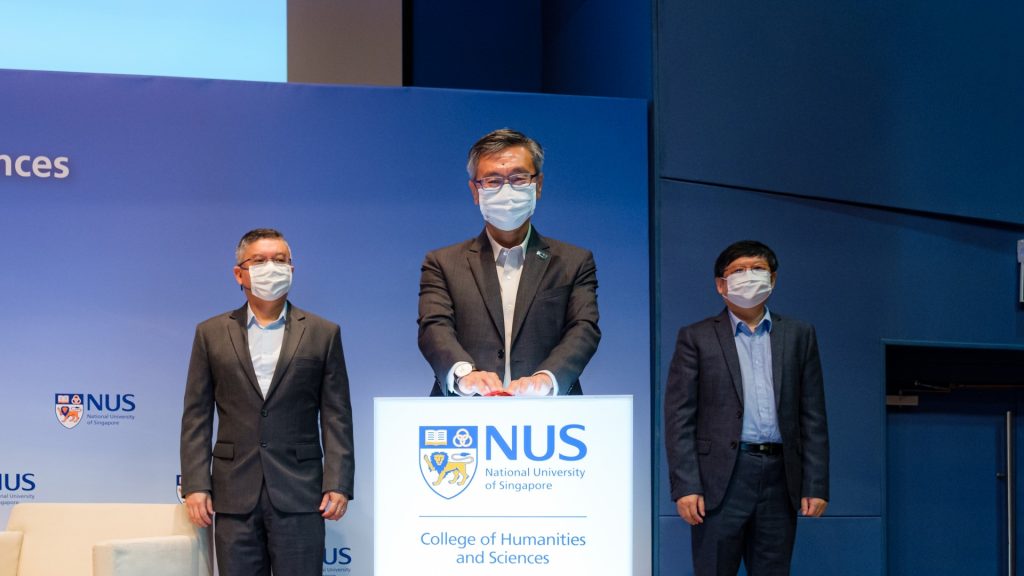
The accolade from PRISM, which coincides with the one-year anniversary of the official inauguration of CHS, bears testament to the concerted effort on multiple fronts of the campaign by various stakeholders, including the Communications teams from FASS and FoS, the NUS Office of University Communications and communications agency AKA Asia.
“The award comes as a truly wonderful one-year anniversary gift to all our colleagues involved in the CHS campaign,” said NUS Chief Communications Officer Ms Ovidia Lim-Rajaram.
“It is gratifying to know that our efforts to kickstart a meaningful, groundbreaking programme at the College are paying off, and that the journey to promoting an interdisciplinary, 21st-century educational experience at NUS is off to a great start.”
Communications at CHS is co-led by Mr Nisar Keshvani, Associate Director for Strategic Outreach and Communications at FASS, and Ms Janice Quah, Associate Director for Corporate Communications at FoS.
“The campaign award, a result of the synergy and collaboration across diverse University faculties and departments, epitomises the spirit of interdisciplinarity that CHS values, and the idea of capitalising on each other’s strengths to achieve the best outcomes,” Mr Keshvani said.
Ms Quah added, “It has been a challenging journey but seeing our communications ideas collectively come to fruition is truly fulfilling! The validation of the hard work motivates us to continue raising the bar, to sustain the impactful profiling of CHS to students and stakeholders.”
Recognising the best in public relations
Celebrating 44 winners across 27 categories, the PRISM awards ceremony was held on 15 Dec by the Institute of Public Relations Singapore (IPRS), the only accrediting body for public relations practitioners in Singapore. The Guest of Honour was Mr Tan Kiat How, Minister of State at the Ministry of Communications and Information (MCI).
Acknowledging the challenges of a shifting communications landscape, Mr Tan said, “MCI recognises the importance of excellence in public relations and communications across all sectors of the economy.”
“The campaigns up for awards today show how all of you have worked around these challenges and continued to achieve excellent levels of reach and impact.”
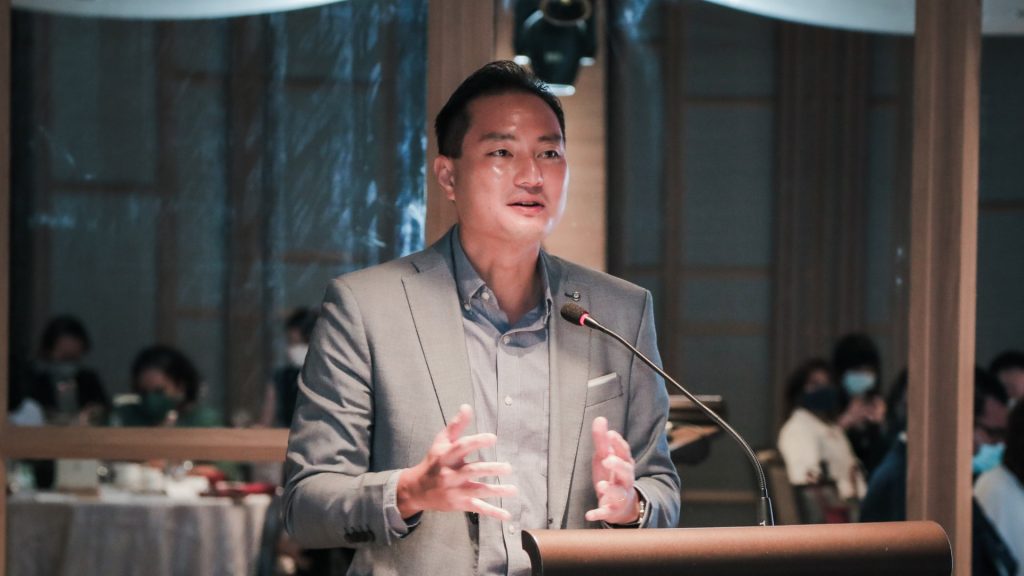
Held biennially since 1987, the PRISM Awards is one of the oldest and most prestigious awards in the industry, celebrating Singapore’s brightest stars in the communications and public relations industry. It is judged by a panel of established business leaders and senior practitioners, recognising and honouring organisations and individuals for excellence in public relations and communications.
Ms Koh Juat Muay, President of the IPRS Council 2021/2023 said, “The winning entries and the winners this year reveal a singular story – the resilience of our people, the ingenuity of the campaigns and strength of the organisations that continues to thrive in an evolving local and global communications landscape.”
“IPRS is privileged to hold PRISM Awards 2021 and share in the pride of profession demonstrated by our people and in the brilliance of their campaigns. Our winners truly embody the meaning of PRISM and that is Public Relations In the Service of Mankind,” she added.
This story first appeared in NUSNews on 21 December 2021.
An Interview with Emeritus Prof S. Vasoo and Assoc Prof Winston Goh on The Strange Start of Psychology at the National University of Singapore
The Strange Start of Psychology at the National University of Singapore (NUS Department of Psychology, 2021), showcases the history of the NUS Faculty of Arts and Social Sciences' Department of Psychology, Singapore's oldest psychology programme. The programme, which kicked off during the 86/87 academic year at the Department of Social Work (renamed the Department of Social Work and Psychology), became a department in 2005.
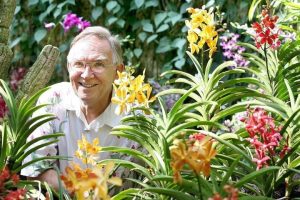
Author Dr John Michael Elliott (1945-2019), who was at the time a psychologist at the then Ministry of Social Affairs, joined the programme six weeks after it began and retired in 2018.
As the book explains, in Singapore, historically psychology was viewed more as clinical work that supported psychiatry, and mental health care was deprioritized. Instead, during the island's colonial era, patients requiring mental health treatment were institutionalized in The Insane Hospital, which commenced operations in 1841 with 30 beds. This hospital evolved into The Lunatic Asylum (1862, 100 beds), followed by The New Lunatic Asylum (1887, 300 beds), and then the Mental Hospital in 1928, which became Woodbridge Hospital in 1951.
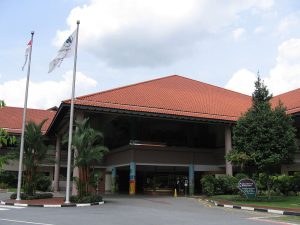
In 1993, Woodbridge Hospital moved to Buangkok Green, becoming the Institute of Mental Health's new inpatient facility.
There was a definite need for trained psychologists in Singapore, as well as a programme to train them, since, post-independence, all psychologists in the country completed their education abroad. When the NUS psychology programme got started in July 1986, however, the discipline was still often seen as non-Asian and more as medical training than a social sciences course, and also as a luxury in the realm of social work. The Department of Social Work was an ideal place for the new programme, Dr Elliott notes, as it would contribute to the department's own development, enabling it to offer an honours degree in social work and psychology.

The NUS psychology programme's initial cohort had 72 students and 1 staff and grew rapidly. There are currently around 900 students in the introductory psychology module and 220 honours graduates annually. At its inception 35 years ago the programme offered a three year general degree with a competitive fourth year honours degree. In 1989, 50 students received a general degree, 11 of whom went on to get an honours degree. Today, the department's own clinical psychology master's programme graduates approximately 15 annually, and psychology graduate students can also obtain a Master of Social Sciences or PhD.
The NUS Department of Psychology ranks 16 out of 303 on the Quacquarelli Symonds list and psychology is a well recognized and respected course of study in Singapore. Many graduates go on to engage in psychological work in the public sector, such as in Singapore's Ministries of Health, Defense, Home Affairs, and Social and Family Development. A number of graduates are also employed in private sector positions involving psychological work like human resource management and marketing, or in private practice in the fields of clinical, counselling, and industrial-organisational psychology, among others.

We discussed the The Strange Start of Psychology at the National University of Singapore, which has an online launch on Friday, 10th December at 11 am, with Associate Professor Winston D. Goh, the current NUS Department of Psychology Head, and Emeritus Professor S. Vasoo, who led the then NUS Department of Social Work and Psychology from 1987 to 1999.
 A/P Vasoo Q & A
A/P Vasoo Q & A
1. What were your most memorable experiences developing the new psychology programme during your term leading the NUS Department of Social Work and Psychology?
I have been teaching students and working with academic staff for about 50 years. In the course of these years, I always encouraged and advised them not to look back on events that had surpassed them. This is because memorable matters would not come back and one would not be able to deal with the bygones. No point spending time lamenting over things that have gone past as it can be emotionally costly and tiring. I always encourage students and academic staff to look ahead on events that will be forthcoming as these can be managed as they unfold and are within their control. I am of the opinion that various human issues that we can grasp at hand are largely solvable as long as we persistently tackle them with empathy. It is only with good empathy that we can have clearer insights to deal with human issues and relationships.
I recall that one of the challenging tasks that I had to deal with as the Head of the Department of Social Work and Psychology was to quickly recruit a group of Psychology academic staff to deliver the undergraduate psychology programme in 1986. I had selected staff with diverse psychology training such as a developmental psychologist, a cognitive psychologist, a social psychologist, an experimental psychologist, a clinical psychologist, and a psycholinguist. You can imagine with these varied backgrounds coming together to agree on a basic undergraduate curriculum was not easy. Each of them had different hobby horses to ride, which was understandable while mind-boggling, as there were protracted views within the group and at times heated arguments that I had to mediate. I brokered a deal as a non-partisan and drew a consensus among the different psychological academic personalities for the need to develop a top-notch undergraduate psychology programme based on the best psychology departments in the United Kingdom and United States. The foundation laid for the early phase of the psychology programme saw the fruition of some of our top psychology scholars in the Faculty of Arts and Social Sciences. I am indeed proud to witness that some of these accomplished scholars have become lead anchors of the NUS Department of Psychology and later appointed Heads. The nurturance of these top scholars have helped stabilize the psychology programme and provided succession of leadership. They also supported the Deanery of the Faculty of Arts and Social Sciences.
2. What can psychologists learn from social workers, and what can social workers learn from psychologists?

To put it simply, both psychology and social work are non-identical twin disciplines with each having to deal with human behaviour and social issues. As a psychologist, one has to understand human behaviour and the cause of such behaviour, and as a social worker, one has to understand the cause of social and human problems and then enable people to find ways to problem solve. Both disciplines deal with human and psychosocial issues, and human behaviour requires a multidisciplinary focus. I would say that no single discipline is adequate to solve human life course issues. I must add that a good psychologist will require social work lenses and a competent social worker needs to have helpful psychological lenses. As one will appreciate, we are all human beings and are ecologically bounded. Therefore both psychological and social work analyses are critical to better appreciate human behaviour and social interactions, and these can contribute to effective human and social problem solving.
3. What do you see as the most notable impacts in practice of social work and psychology in Singapore so far and in the future?

Psychology graduates as well as social work graduates are making robust contributions in public service, private enterprises, and non-governmental organisations. Psychologists hold highly respectable positions in areas such as clinical services, rehabilitation, health, human resources, education, the armed forces and the police, besides others. Increasingly, psychologists are needed to contribute psychological solutions to strengthen our psychological defences against various societal crises.
Likewise, social workers are also appointed in highly regarded positions in fields such as social services, rehabilitation, health, social research, counselling and mental health, education, the armed forces, and childcare, among others. Both psychologists and social workers have so far given valuable suggestions and inputs to policy changes to the care and protection of children, youth, and women, and in the support of the vulnerable and the promotion of inclusiveness of people with special needs.
Singapore like the rest of the world will be confronted with serious social and ecological changes, including the consequences of unabated climate change. In view of these changing scenarios, our future psychologists will have to be equipped with psychological skills in assessing the impact of human behaviour on mitigating issues related to the environment and climate change as well in order to have good insight into the social and psychological consequences of an ageing Singapore community. Trainee social workers can be better equipped with social analytical skills, which will make them more versatile in predicting specific vulnerable sectors of the community. Thereby, the future social workers can enhance their community problem solving capacity by building more support networks to build a socially healthy community. Specifically, more attention can be paid by both social workers and psychologists to deal with the social and psychological implications of the growing social divide between the haves and have-nots, and find more innovative ways to deliver services to enable the less well-off to move up.
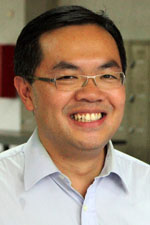 A/P Goh Q & A
A/P Goh Q & A
1. What are some of your fondest memories of Dr John Elliott, first as a teacher, and later as a colleague?
John encouraged critical thinking and we always had very illuminating discussions during his tutorials (see photo on page 28); of course, tutorials at that time only had between 5 and 7 students, so very difficult to hide! He was quite a tough marker though - never got an A from him for my term papers; but then again, As were given out very sparingly during that period (and there were no CAs at that time; the term paper grades were not counted). As a colleague, he was always willing to give advice to young hires, and his experience helped me immensely in the crafting of exam questions when I first started helming my own modules. I also remember he was very particular in signing or agreeing to legal documents - he once refused to upload materials into IVLE (the forerunner of LumiNUS) because he felt NUS did not provide enough protection for staff.
2. What motivated you to study psychology at NUS as an honours and then Masters student, and what prompted you to return to the department to teach and carry out research projects?
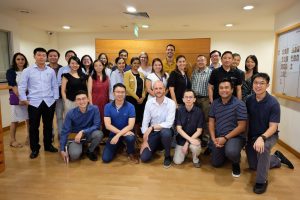 I was in the pre-med programme in junior college, so the path seemed straightforward for me. But I started reading about psychology as a course in various government information booklets and thought this was more interesting than medicine - I also didn't do well at the A levels, so perhaps this was fate telling me to take another path. However, this meant you had to go overseas as there was no psychology programme offered locally and my parents could not afford an overseas education. So when I was accepted in FASS, I was set to major in the closest one at the time - Sociology. I didn't start right away as I had to serve National Service; and in my second year of NS, I found out that NUS had started a psychology programme (again, fate may have been looking out for me!). Fortunately, I did well enough in the aptitude test (required then) to be allowed to major in Psychology. Everyone was hoping to do Honours, and at the time, you had to be invited, so I was elated when the Department of Social Work and Psychology offered me Honours, no motivation required. As for the Masters, I worked as an RA after completing my Honours, so I wanted to see if a research and academic career appealed to me, and decided to do my Masters while I was a TA for the Department. After that, NUS funded my PhD overseas on a staff development scheme, so I was obligated to return to serve a bond. In a sense, NUS Psychology has been my home since I started as an undergrad student, for I never left!
I was in the pre-med programme in junior college, so the path seemed straightforward for me. But I started reading about psychology as a course in various government information booklets and thought this was more interesting than medicine - I also didn't do well at the A levels, so perhaps this was fate telling me to take another path. However, this meant you had to go overseas as there was no psychology programme offered locally and my parents could not afford an overseas education. So when I was accepted in FASS, I was set to major in the closest one at the time - Sociology. I didn't start right away as I had to serve National Service; and in my second year of NS, I found out that NUS had started a psychology programme (again, fate may have been looking out for me!). Fortunately, I did well enough in the aptitude test (required then) to be allowed to major in Psychology. Everyone was hoping to do Honours, and at the time, you had to be invited, so I was elated when the Department of Social Work and Psychology offered me Honours, no motivation required. As for the Masters, I worked as an RA after completing my Honours, so I wanted to see if a research and academic career appealed to me, and decided to do my Masters while I was a TA for the Department. After that, NUS funded my PhD overseas on a staff development scheme, so I was obligated to return to serve a bond. In a sense, NUS Psychology has been my home since I started as an undergrad student, for I never left!
3. What future plans are in the works for NUS Psychology and how do they connect to the need for scholars and practitioners of the discipline in Singapore and the region?

Top psychology departments in the world are very well resourced with research spaces, laboratories, and facilities; so we hope to move in that direction and provide all of our research-active staff dedicated lab spaces to do research that will benefit Singapore and the discipline in general. We will also need to see how many more students (we have always been one of the more in-demand majors since inception) will want to be Psychology majors with the advent of the College of Humanities and Sciences, and perhaps develop various teaching innovations to serve an even more expanded student body (the days of 5-7 pax tutorials, or a 10-student Honours cohort in my year, are long gone). But we have very good educators in the department, so I am not worried about that. Our Clinical Psychology Masters programme is also in very high demand, given the focus on mental health needs nowadays. So we will need to see how we can support training for manpower needs in the public and private sectors in terms of workshops for associate psychologists, in additional to training people to be professional clinical psychologists.
Thank you very much for your time and answers, Prof Vasoo and A/P Goh! Readers can learn more about the history of the NUS Department of Psychology here. Catch the book launch on Friday December 10th at 11 AM by registering via Zoom.
Becoming Digitally Connected: What Holds People Back?
IN BRIEF | 4 min read
- In a recent The Straits Times article, Associate Professor Irene Ng (NUS Social Work & NUS Social Service Research Centre), Dr Natalie Pang (NUS Communications and New Media) and Professor Lim Sun Sun (Humanities, Arts & Social Sciences, SUTD) discuss the factors that prevent people from using digital services. For lower-income families, sometimes fear gets in the way, on top of cost concerns.
Click through to read this article.
The Straits Times, 25 October 2021
This story first appeared in The Straits Times on 25 October 2021.
Why Digital Poverty Deserves Greater Attention
IN BRIEF | 5 min read
- In a recent The Straits Times article, Associate Professor Irene Ng (NUS Social Work & NUS Social Service Research Centre), Dr Natalie Pang (NUS Communications and New Media) and Professor Lim Sun Sun (Humanities, Arts & Social Sciences, SUTD) discuss the social challenge of unequal digital access in Singapore.
- As the nation becomes digitally competitive, there are groups who remain disadvantaged in their access to digital connectivity and literacy. Digital divides, unaddressed, contribute to a heightened social divide over time.
Click through to read this article.
The Straits Times, 15 October 2021
This story first appeared in The Straits Times on 15 October 2021.
NUS Faculty of Arts and Social Sciences' 18th Dean Takes Office
IN BRIEF | 2 min read
-
Dean of the Faculty of Arts and Social Sciences, Professor Lionel Wee, and other members of the Deanery take on their leadership roles today.
Professor Lionel Wee has assumed the position of Dean of the NUS Faculty of Arts and Social Sciences (FASS) and Co-Dean of the College of Humanities and Sciences (CHS) as of today, Friday, 1 October 2021. Prof Wee takes over the helm from Professor Robbie Goh, who is now the Provost of the Singapore University of Social Sciences.
Before becoming FASS' 18th Dean, Prof Wee was the Faculty’s Vice Dean of Research (2014-2021) and is a Provost's Chair Professor of Linguistics with the Department of English Language and Literature, which he headed from 2010 to 2014.
“It is an honour to be given the opportunity to helm the Faculty of Arts and Social Sciences. The Faculty has achieved much since its founding nearly a century ago, continually evolving to anticipate and address the needs and challenges of a changing society," said Professor Wee.
"Together with the Deanery, colleagues, and students of the FASS, I am confident that we will continue to make breakthroughs in both education and research. While these benchmarks are important, diversity and inclusion are priorities for me, and essential pillars of every organisation. My plan is to further emphasise and ensure our staff and students feel empowered and safe in the Faculty in the coming years," he said.
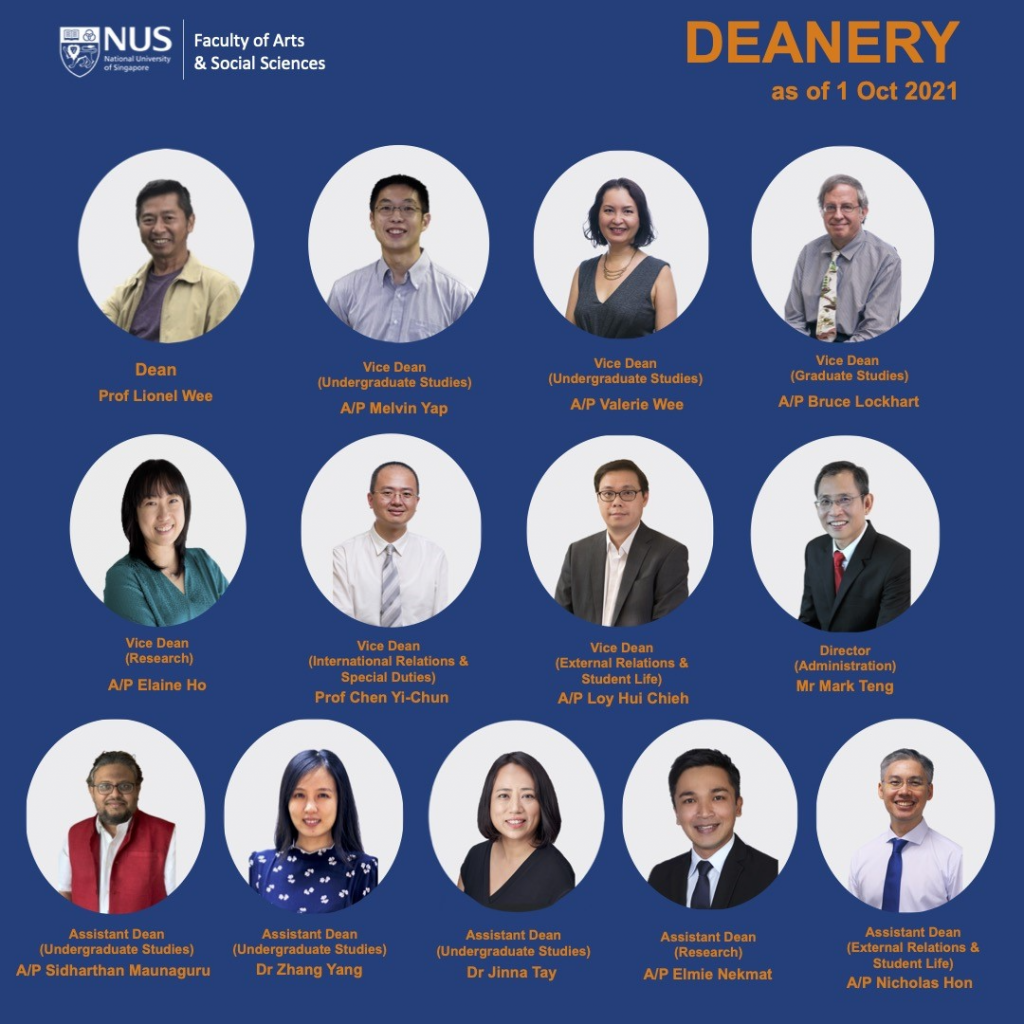
New Appointments to the Strong Leadership
Beginning their new roles with the FASS Deanery today are:
- Associate Professor Elaine Ho (Geography) as Vice Dean (Research). She was previously Assistant Dean (Research).
- Associate Professor Elmie Nekmat (Communications and New Media) as Assistant Dean (Research).
The following members of the Deanery will continue to serve in their respective positions:
- Associate Professor Melvin Yap, Vice Dean (Undergraduate Studies)
- Associate Professor Valerie Wee, Vice Dean (Undergraduate Studies)
- Associate Professor Bruce Lockhart, Vice Dean (Graduate Studies)
- Professor Chen Yi-Chun, Vice Dean (International Relations and Special Duties)
- Associate Professor Loy Hui Chieh, Vice Dean (External Relations and Student Life)
- Mr Mark Teng, Director of Administration
- Associate Professor Sidharthan Maunaguru, Assistant Dean (Undergraduate Studies)
- Dr Zhang Yang, Assistant Dean (Undergraduate Studies)
- Dr Jinna Tay, Assistant Dean (Undergraduate Studies) – recently appointed to the Deanery on 1 July 2021.
- Associate Professor Nicholas Hon, Assistant Dean (External Relations and Student Life)
Exemplary NUS Social Work Study Profiled as MOE Announced $457M Boost for Social Science and Humanities Research
IN BRIEF | 2 min read
- A recently completed research project led by Associate Professor Esther Goh (NUS Social Work) on "identifying adaptive pathways of low-income families" funded by the inaugural call of the Social Science Research Council in 2016 has been profiled as part of the MOE’s announcement of plans to raise spending on boosting social science and humanities research to $457 million over the next five years.
Click through to read this article.
This story first appeared in Lianhe ZaoBao on 22 September 2021.
New NUS Dean of Arts and Social Sciences Appointed
IN BRIEF | 5 min read
-
Professor Lionel Wee will be appointed the new dean of the NUS Faculty of Arts and Social Sciences (FASS) and co-dean of the College of Humanities and Sciences from 1 October 2021.
-
Prof Goh, who has served as the Dean since 2017, will be taking a leave of absence from the University, but will continue to contribute in the Singapore education sector as the new Provost at the Singapore University of Social Sciences from 1 October 2021.
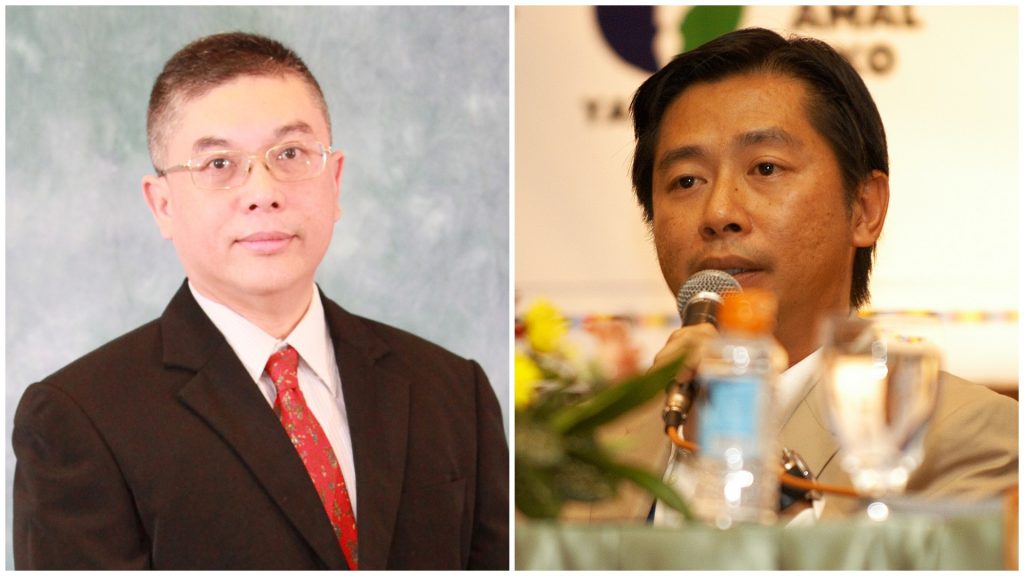
The University today announced the appointment of Professor Lionel Wee as the new Dean of its Faculty of Arts and Social Sciences (FASS) and Co-Dean of the College of Humanities and Sciences. Prof Wee will take over the helm from Prof Robbie Goh as the Faculty’s 18th Dean from 1 October 2021.
Currently FASS Vice Dean of Research and Professor of Linguistics in the Department of English Language and Literature, Prof Wee was appointed Provost’s Chair Professor in July 2017 for his outstanding scholarly achievements.
After graduating from NUS in 1988 with a Bachelor of Arts (First Class Honours) degree majoring in English Language and Sociology, Prof Wee embarked on an academic career, joining the University as a Teaching Assistant with the Department of English Language and Literature. He was awarded the NUS Overseas Graduate Scholarship where he pursued his PhD in Linguistics at the University of California, Berkeley. Prof Wee was appointed as a Lecturer upon his return to Singapore in 1995, and rose the ranks to full Professorship in 2012.
“NUS is pleased that after a rigorous global search, Prof Lionel Wee has been selected to be the next Dean. He is passionate about high quality education and research, and has an excellent understanding of FASS and the University, having served in numerous leadership roles at the department, faculty and university-levels. I am confident that he will bring the Faculty to new heights of international excellence,” said NUS President Professor Tan Eng Chye.
Besides serving as Vice Dean of Research at FASS from 2014 to present, Prof Wee was also the Head of the Department of English Language and Literature from 2010 to 2014. He had also contributed on various committees such as Chair of the FASS Faculty Promotion & Tenure Committee II, Chair of the University Mid-Term Advisory Report Committee, and Member of the University Promotion and Tenure Committee. In recognition of his dedicated service and contributions to NUS and education in Singapore, Prof Wee was awarded the National Day Awards Public Administration Medal (Bronze) in 2020 and the Long Service Medal in 2018.
“I am excited and honoured to be given this opportunity to lead my alma mater as its next Dean. Having spent more than three decades at FASS, both as a student and a faculty member, I have experienced firsthand the selfless commitment of my colleagues and impressive insights our students bring to the study of the arts, humanities and social sciences. I am confident that together, we can continue to make significant contributions to society while enhancing our Faculty’s standing as one of the leading humanities and social sciences faculties in the world,” said Prof Wee.
Besides his passion in linguistics, Prof Wee feels very strongly about animal welfare and is also very much an avid city traveller, although the pandemic has put quite a damper on travel in the past year or so. He also enjoys the cafes, a habit which he picked up during his time as a graduate student in Berkeley. Students and colleagues at FASS may have many a times seen Prof Wee deep in thought at the cafes across the NUS campus. He is very much focused in developing a particular idea or argument once he is seated down and would need to walk around before he can move on to another new idea.
Prof Wee has published widely in international and local journals, and also sits on the editorial boards of a number of academic journals and publications, including Applied Linguistics, English World-Wide, Multilingual Margins, The Journal of Asian Linguistic Anthropology, the “Cambridge Elements: World Englishes” book series, and the “Multilingualisms and Diversities in Education” book series. He is a well-respected scholar with research interests in the areas of language policy (especially in Southeast Asia), the grammar of Singapore English, metaphorical discourse, and general issues in sociolinguistics and pragmatics.
Prof Goh, who has served as the Dean since 2017, will be taking a leave of absence from the University. However, he will continue to contribute in the Singapore education sector as the new Provost at the Singapore University of Social Sciences from 1 October 2021.
Prof Goh said, “It has been a privilege and honour to serve as Dean of one of Singapore’s largest and most historied Faculties. I am grateful to my talented colleagues for all their hard work. I believe that together, we have brought the Faculty to new heights of excellence in teaching, research and service. I look forward to the work of creating new programmes and nurturing talent in my next role as Provost of the Singapore University of Social Sciences, and hope that I will also be able to forge new ties and collaborations between the two universities."
Having spent more than three decades at the University, Prof Goh has taken on numerous administrative and leadership roles outside of the Faculty. He was Deputy Director of the NUS Centre For the Arts from 1996 to 1999, and Deputy Director of the Asia Research Institute from 2008 to 2010.
“On behalf of the University, I would like to express my heartfelt appreciation to Professor Robbie Goh for his dedication and strong stewardship in leading NUS FASS. Under his visionary leadership, the Faculty has made significant contributions to the advancement of education and research in the humanities and social sciences. During his leadership, the FASS 2.0 Industry Tracks programme was started to enhance the employability of its graduates. New multidisciplinary initiatives such as the Philosophy, Politics & Economics programme were also established. The Faculty has also expanded collaborations with industry and further strengthened its high international reputation,” added Prof Tan.
This story first appeared on NUSnews on 13 August 2021. The full press release is here, and Professor Lionel Wee's biography is here.
From Careers for a Lifetime, to a Lifetime of Careers
IN BRIEF | 5 min read
-
The top skills desired by employers will include critical thinking, analysis, problem-solving and self-management skills such as active learning, resilience, stress tolerance and flexibility.
What does the future of work look like? In this evolving world, new occupations and roles which did not previously exist continue to emerge, while certain traditional skills and jobs continue to become obsolete.
The World Economic Forum’s (WEF) The Future of Jobs Report 2020 (October 2020) highlighted a few key trends.
First, technological adoption of cloud computing, Big Data and e-commerce in many businesses will accelerate the transformation of jobs, skills and entire industry value chains. 85 million jobs are expected to be displaced by a shift in division of labour from humans to machines by 2025, while 97 million new roles may emerge.
Second, online learning and training boomed during the pandemic. The shift was a watershed moment, and there is no turning back for many industries. The pandemic also brought into sharper focus the importance of lifelong learning, with more employees upskilling and reskilling to stay relevant in the volatile job market. More workers are now pursuing personal and professional development, especially in digital skills.
Last but not least, the top skills desired by employers will include critical thinking, analysis, problem-solving and self-management skills such as active learning, resilience, stress tolerance and flexibility.

What skills do employers seek?
Many of these in-demand skills highlighted in WEF’s report corroborate CFG’s Industry Insights Survey (2020). Drawing on insights from career events, industry surveys and engagements, CFG’s survey cited a similar list of soft skills that are becoming increasingly imperative at the workplace.
These are abilities learnt through life experiences that are impervious to change, and relevant across all professions and workplaces. They are attributes we take with us when we embark on job pathways in the New Normal - which are shifting from one defined career over a lifetime, to a series of dynamic and rapidly changing careers.
Our survey clusters these abilities into two main categories: Personal Qualities and Workplace Traits.
Personal qualities
Many employers are looking for individual cognitive abilities such as problem-solving, learning agility and pattern-recognition. They are also seeking graduates who are equipped with design and computational thinking, as well as proficiency in quantitative analysis.
They want graduates who are able to look at problems from different perspectives, to solve complex problems in real-world environments. For example, can a customer service issue be resolved with a combination of user interface design changes, IT infrastructure automation and manpower staffing? What are consumer consumption patterns and behaviours telling us?
Employers also seek character traits such as curiosity, resilience, empathy, proactivity, leadership and adaptability. These traits are predictors of future potential, and potentially determine career longevity and progression. For example, are you curious to learn what other teams or functions are doing beyond your job scope and discover potential synergies? Are you adaptable to changes in your project scope, and possess a “can-do” attitude in the face of obstacles?
Workplace traits
Besides personal qualities, employers are also looking for graduates who possess certain desirable workplace traits. These include good communication and presentation skills, cultural sensitivity and a global mindset. Graduates with business acumen, who are able to influence and negotiate, and are competent in managing different teams and projects, are much sought after.
These attributes mirror the realities of the modern workplace, where teams and projects are becoming more diverse, cross-functional, cross-cultural and business-driven. For example, can you work with a diverse team of colleagues towards achieving a common objective? Can you visualise your organisation’s business potential in an overseas market or a new customer segment?
The call to CHS students
In CHS, you will acquire interdisciplinary knowledge and skills by learning how to draw connections, links and insights across diverse disciplines. It is this important foundation of interdisciplinarity that will better prepare our students to become problem-solvers in an uncertain world beyond the pandemic.
Even as the pandemic has accelerated digital transformation, data is now the new asset that enables businesses to enhance efficiency and augment the ability of their teams to deliver greater value. CHS will focus on competencies like data literacy and design thinking, skills that are now in high demand by industries seeking to unlock value from Big Data.
Beyond academics, internships are one of the best ways to hone workplace experience. When you are on vacation, aim for at least two (if not more) internships, preferably one with an overseas employer. Immerse yourself in co-curricular activities, which provide hands-on opportunities to gain skills such as leadership, teamwork and project management. These experiences in your resume and portfolio will place you in a better stead with employers.

Enhancing employability, preparing for careers
CHS students will have a dedicated Career Advisor, who will guide you through the process of developing a personal career plan. You will be pre-assigned a career preparation module, Career Compass, closely following CFG’s four-year Career Readiness Roadmap which provides a formal framework for your career planning during your undergraduate journey.
You will be enrolled in Career Catalyst, a foundational freshmen module that identifies your core strengths and enhances your profile towards securing an internship. As you progress to Years Two/Three and your final year, you can also sign up for our Career Booster workshops or Career Advancement Webinar Series (CAWS).
Article contributed by the Centre for Future-ready Graduates (Ms Joan Tay, Director and Career Advisors Mr Ryan Ang and Mr Ng Buck Seng)
This story first appeared on CHS on 29 July 2021.
NUS CHS Case Competition: Driving EV Adoption in Singapore
IN BRIEF | 1 min read
- The just-released problem statement for NUS CHS' inaugural Case Competition – Encouraging electric vehicle (EV) ownership in Singapore – is an important real-world topic of especial relevance to us all, as the nation is driving toward a future of electric mobility that is essential to the Singapore Green Plan 2030.

Are you interested in translating your innovations to reality by applying interdisciplinary knowledge and skills?This is now possible with the inaugural College of Humanities and Sciences (CHS) Case Competition, launched on 26 July.
The competition is specially designed for NUS students, and enables participants to synthesise ideas and perspectives from different disciplines to solve complex, real-world challenges.
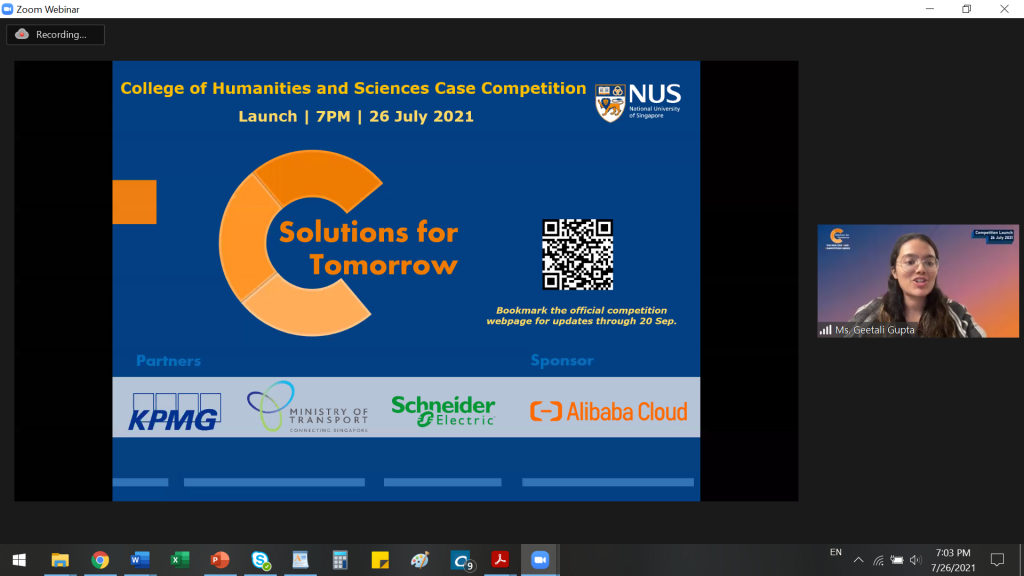
The competition themes, “Sustainability” and “Technology and Us”, are highly topical today. The problem statement - Encouraging electric vehicle (EV) ownership in Singapore - is an important real-world topic, even as Singapore ushers in a future of electric mobility as a key piece of the puzzle in the Singapore Green Plan 2030.
At the virtual launch, our competition partners - the Ministry of Transport, KPMG and Schneider Electric - discussed plans by the Singapore government to usher in the future of EV, Schneider Electric’s vision of a 100% electric mobility future with net-zero carbon emissions and upcoming trends in mobility solutions identified by the advisory arm of KPMG.
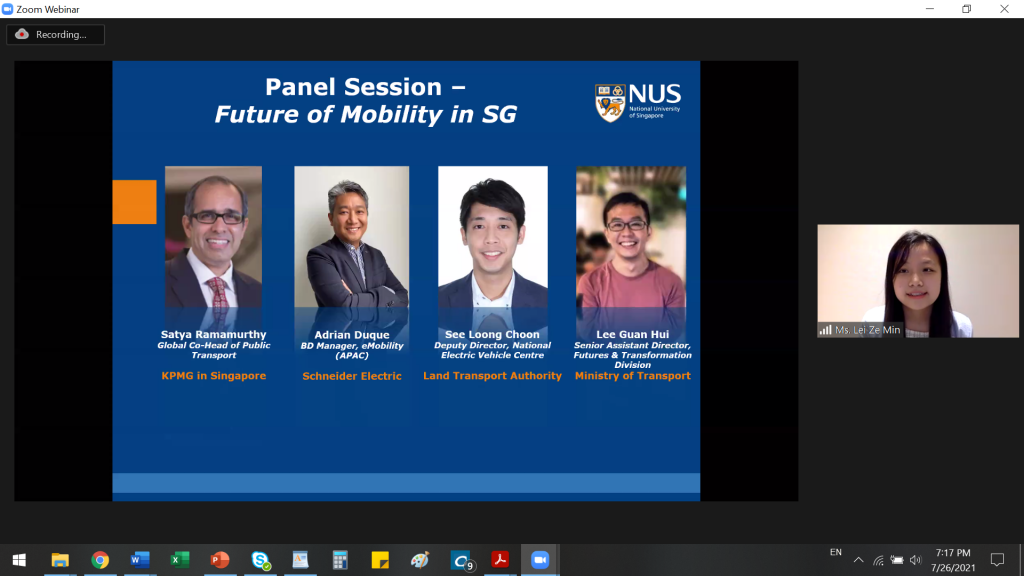
Participants will have the opportunity to attend mid-term workshops in mid-August, which provide important domain knowledge, including engineering and design, and communications skills.
The project submissions will be judged in the final round of the competition on 20 September by representatives from our competition partners. They will also be sharing their EV domain expertise with the participating teams throughout the competition.
The launch was attended by more than 100 participating teams (close to 200 individual attendees) from across NUS.
Find out more about the competition here and read the problem statement here.
Strong Interest in Interdisciplinary Learning With High Acceptance Rates
IN BRIEF | 5 min read
-
NUS President Professor Tan Eng Chye discusses the University’s recent interdisciplinary initiatives – the setting up of the College of Humanities and Sciences (CHS) and the new Common Curriculum for the Faculty of Engineering and the School of Design and Environment – and the importance of lifelong learning in ensuring that students are adaptable and future-ready.
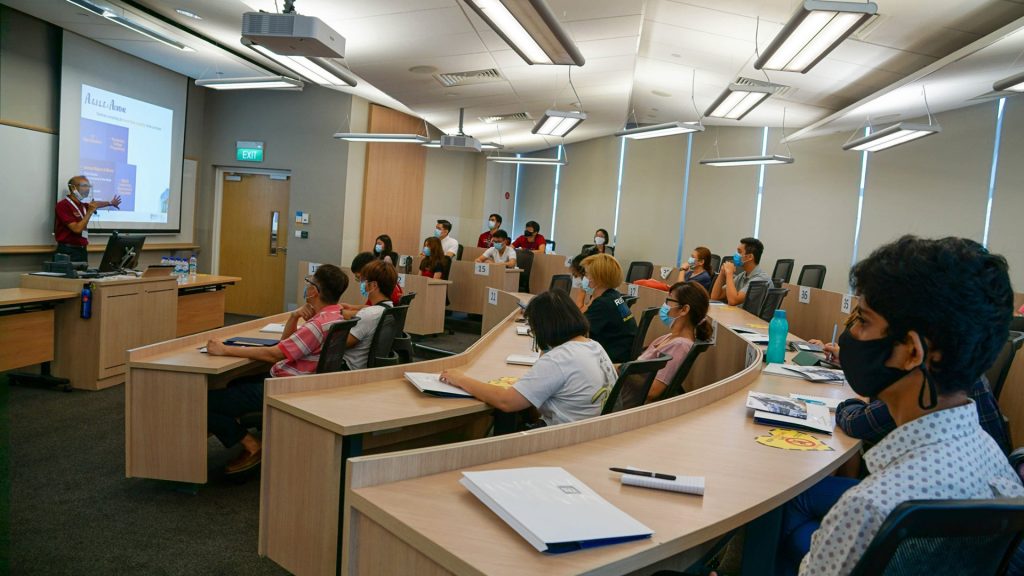
In today’s volatile, uncertain, complex and ambiguous (VUCA) world, staying stagnant is never an option. Now, more than ever, universities have to prepare students to thrive in a fast-changing and unpredictable post-COVID reality through an interdisciplinary education.
Just ask the incoming batch of freshmen, who have given a thumbs-up to the University’s recent interdisciplinary initiatives – specifically, the setting up of the College of Humanities and Sciences (CHS), and the new Common Curriculum for the Faculty of Engineering and the School of Design and Environment.
During the admissions exercise this year, 71 per cent of those who had applied to these programmes as the first choice accepted the offer. Among the incoming batch of freshmen, over 4,000 will be exposed to an interdisciplinary education. By August 2022, NUS hopes to push this number to more than 6,000.
“We are quite heartened that the applicants have responded very well,” said NUS President Professor Tan Eng Chye, as he spoke on the new changes in NUS’ curriculum. “They are receptive to the flexibility that they will have. No more are you confined to one discipline.”
Prof Tan noted that the world faces many wicked problems that cannot be solved with only one discipline.
He cited COVID-19 as a wicked problem, requiring more than just medical sciences to solve. “Even with the right medical knowledge, many countries had difficulties handling COVID-19 and its spread,” he noted.
The pandemic, in fact, prompted NUS to ramp up efforts in remodelling its educational philosophy and pedagogies to prepare its graduates for this dynamic reality.
At the centre of these reforms is the push for lifelong learning, as well as the shift towards interdisciplinary education to ensure students are adaptable and future-ready.
A lifetime of learning
While universities used to prepare their graduates for a single job, this approach is fast becoming obsolete. Today, graduates will change jobs at least 10 times over the course of their lifetime.
In line with this trend, NUS has been future-proofing its education to prepare students for lifelong learning.
“A student’s enrolment is valid for 20 years from the point they enter the university,” Prof Tan explained. “We want to remove the conception that university is only for four years. You can always come back to (NUS) to learn new skills and knowledge.”
For instance, the NUS Lifelong Learners (L3) programme upskills alumni through a wide array of skill-based, industry-relevant courses, carefully tailored to focus on emerging skills identified under SkillsFuture such as data analytics or digital literacy.
The process of returning to NUS for further studies is also made seamless. If a student does not complete a second major or degree in their initial four years, they are welcome to return to the university to read the necessary remaining modules even after graduation.
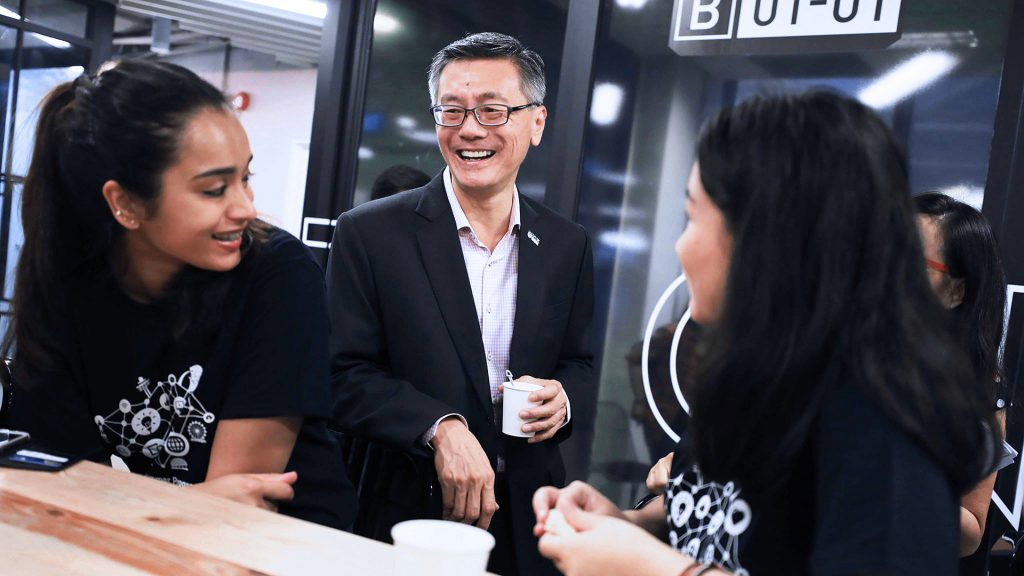
Towards interdisciplinary learning
Recognising the benefits of interdisciplinary learning, NUS is rolling this out to more students.
This started with the launch of CHS, which brings together the Faculty of Arts and Social Sciences and the Faculty of Science.
In the upcoming semester, CHS will admit 2,200 students and they will take a new Common Curriculum within their first three semesters – consisting of integrated modules with a problem-based pedagogy.
Similarly, a Common Curriculum has been introduced for the Faculty of Engineering and the School of Design and Environment to encourage knowledge transfer between the two complementary disciplines.
For instance, NUS’ very own net-zero energy building at SDE4 is a product of melding both architecture and engineering – the first of its kind in Singapore.
“The building’s beautiful architectural design alone doesn’t contribute to it being net-zero energy. What you have is a lot of deep engineering work embedded into it. It shows that architects have to work very closely with engineers in order to achieve this,” explained Prof Tan.
With interdisciplinary learning, the proportion of Unrestricted Elective modules a student can take has also been increased to up to 30 per cent, encouraging students to have two or more specialisations.
In the four faculties that now have an interdisciplinary common curriculum, this works out to more than 700 possible double major pairings, 1,700 major-minor pairings, and 100,000 major with double minor combinations.
Expanding choices for students
Ultimately, these educational innovations create greater flexibility for students to curate their own curriculum.
They will no longer have to make an immediate commitment to a single discipline. Instead, they are given time to decide on their academic calling through the common curriculum.
These efforts are central to NUS’ flagship role as a creator, integrator and propagator of knowledge.
Looking ahead, the structural barriers between faculties will further dissolve, allowing students to build even broader connections between disciplines.
“Right now, we have 70 majors and 80 minors, but we may actually have more as we go along. We start with a minor. If there’s enough interest, we push it to a second or full major. The possibilities are endless especially as we move online,” said Prof Tan.
This story first appeared on NUSnews on 26 July 2021.
Fei Yue Community Services Launches Outstanding Intern Scheme
Fei Yue Community Services has just launched the Outstanding Intern Scheme for outstanding students with the passion to serve in Social Services to gain a good head-start in their career.
Eligible students will each receive a once-off education allowance of S$3000 and embark on a fulfilling career in Fei Yue as a full-time Social Worker upon their graduation. Details and application form can be found at https://www.fycs.org/job-opportunities/
For more information regarding the criteria, please click here.
SSR Receives S$1.4 Million for Capability Development Programme
IN BRIEF | 5 min read
-
The funds from MSF and Tote Board will support SSR in its Capability Development Programme, which consists of four components that aim to improve the practice research capabilities of social service agencies (SSAs) and generate practice research mindshare among the SSAs: research training; research capability development service; conferences and seminars; and, publications.

The Social Service Research Centre (SSR) at the National University of Singapore’s (NUS) Faculty of Arts and Social Sciences is aiming to ramp up practice research capabilities of social service agencies in Singapore. It has received a S$1.4 million boost from the Ministry of Social and Family Development (MSF) and Tote Board for a Capability Development Programme for the next three years.
SSR Steering Committee Chair Associate Professor Irene Ng, who is also from the NUS Department of Social Work, said, “More social service agencies are incorporating research into their practice, but they often lack research capability. The outcomes of each agency’s research should also be shared to benefit the sector, while social services can benefit from academic research findings. We are grateful to MSF and Tote Board for providing the much-needed funding support to expand this work that we have been doing at SSR to help agencies build up their capabilities.”
Since its inception in 2015, SSR has made notable progress in becoming a leader of practice-oriented research consultancy, research training, and research information for the social service sector in Singapore. It has established itself as a strong research partner with social service agencies and government ministries on various topics on low-income households and housing in Singapore. To date, it has undertaken 17 commissioned research projects (including completed and ongoing projects) which received a total funding of S$16.7 million from government and non-government partners. Aside from research, SSR places a focus on developing insightful publications and training programmes, as well as annual conferences and a seminar series.
SSR Director Associate Professor Noor Aisha Abdul Rahman, who is also from the NUS Department of Malay Studies, said, “The MSF and Tote Board funding will allow us to engage a wider pool of relevant expertise, generate greater exchange of ideas through conferences and workshops and enhance research capacity relevant to social service practice.”
Capability Development Programme
The funds from MSF and Tote Board will support SSR in its Capability Development Programme, which consists of four components that aim to improve the practice research capabilities of social service agencies (SSAs) and generate practice research mindshare among the SSAs.
- Research Training
SSR offers two 13-week long mentoring programmes and short workshops every year, catered to SSAs’ needs to enhance their practice-research capabilities. The programmes are run by SSR’s research fellows and experienced practitioner-researchers. Participants take on small-scale research projects that will help them to evaluate the interventions and services they provide to clients whom they are serving. Others take the opportunity to conduct studies that explore on current issues, such as how the COVID-19 pandemic has affected social services for low-income families, or embark on projects that enable them to improve their interventions to targeted beneficiaries.
Please refer to https://fass.nus.edu.sg/ssr/training/ for more information on SSR’s research training programmes.
- Research Capability Development Service
SSAs and government agencies can also tap on SSR’s Research Capability Development Service which provides a research advisory service to help build research capability of social workers and public service officers who engage in social service research. Depending on agencies’ needs, the scope of service could cover the facilitation of the development of a research unit or team, consultancy on research agenda and proposal, supervision of research project, as well as consultancy on the translation of research findings into practice. SSAs have benefited from this service. One such example is Fei Yue Community Services, that had engaged SSR in 2019 for the evaluation of a pilot information and referral service in a law enforcement agency.
Ms Ivana Ong, Research Executive at Fei Yue Community Services, said, “SSR provided the expertise in the evaluation study on matters pertaining to research conceptualisation, research tools development, data collection methods, as well as data analysis. They lent a critical alternative perspective in considering the information and referral service in light of the social service landscape in Singapore, hence providing a holistic perspective to the evaluation of the implementation.”
Please refer to https://fass.nus.edu.sg/ssr/capability-development-service/ for more information on SSR’s Research Capability Development Service.
- Conferences and seminars
SSR will continue its annual conferences which are multi-disciplinary flagship events that bring together about 300 practitioners, policy makers and academics each year. It also conducts a seminar series which has been well-received with an average attendance of more than 170 participants. These events are an opportunity for academics, practitioner-researchers, social work practitioners and public service officers to keep abreast with research findings and knowledge that are important to the social service sector, and to learn from one another.
For information on SSR’s events, please refer to: https://fass.nus.edu.sg/ssr/events/.
- Publications
The funding support will also enable SSR to expand the number and range of publications, such as guides on specific research methods, or international and local best practices relevant to social service research. One of the key publications distributed by SSR is its annual conference proceedings. Last month, SSR published the proceedings of its 5th Anniversary Webinar Series on “COVID-19: Social Impact and Response”, which includes nine research articles from academics and practitioners, comprising insights on the impact of the COVID-19 pandemic on communities, and the response of social services during this period. In the past year, SSR has also published two reports - “From Digital Exclusion to Universal Digital Access in Singapore” and the “COVID-19 Social Data Bank” which reflected the concerns on how the COVID-19 pandemic has affected low-income families in Singapore. Through its quarterly research bulletin, “SSR Snippet”, it also provides an avenue for social service professionals to share and gain new research insights and discussion in Singapore.
For more information on SSR’s publications, please refer to: https://fass.nus.edu.sg/ssr/publications-2/.
Ms Foo Suan Wee, Director and Principal Economist of the Policy Research Office at MSF, said, “An evidence-driven approach is key to a well-functioning social service sector. Social service agencies require a range of services and support to pursue research that informs practice, such as to better understand the needs of their clients and the effectiveness of their programmes. MSF has been funding and working with SSR to further research for the social service sector since its inception. We are very happy to continue our support for SSR, with a sharpened focus on equipping and partnering social service agencies in practice research. SSR is well-positioned for this role, having already established links and a strong track record with many agencies. We are excited to be in this partnership with Tote Board and SSR.”
“One of Tote Board’s goals is to strengthen capability and capacity in the non-profit sector, ensuring that social service agencies remain sustainable and are future-ready,” said Ms Lee Siok Koon, Assistant Director (Capability and Capacity Building) at Tote Board. “Similar to our initiatives like the Organisational Development Programme and acceleration of digitalisation of the non-profit sector, the funding support will boost the sector’s capabilities by driving more robust data-based solutions that help social service agencies improve the services they deliver.”
This story first appeared on the NUSnews on 22 July 2021.
Creating New Internship Opportunities: Engaging Employers to See Value in Humanities and Social Sciences
IN BRIEF | 4 min read
-
Mr Jonathan Sim, instructor from the Department of Philosophy, describes how he engaged with local employers to open internship opportunities to humanities and social sciences students who would not previously have been considered.

Humanities and social science majors are frequently misunderstood, in Singapore as in many other parts of the world. The value of their education is regularly questioned, and many employers are unaware of the value such majors can bring to the table. They prefer to hire graduates with more explicitly “practical” degrees for jobs that humanities and social sciences students could excel in.
As a result, humanities and social sciences students are not typically considered for many organisations and roles, despite offering relevant and useful skills.
So when developing an internship module, I began reaching out to organisations to create internship opportunities in such roles, to boost receptivity to hiring students from these disciplines. This enabled potential employers to better understand how students in subjects they might have previously overlooked can fill gaps in their talent pool.
Compounding the issue is that many humanities and social sciences students are unaware of the diversity of careers available to them and tend to limit themselves to roles stereotypical of their majors. There is a good reason for this. When these students apply for non-stereotypical roles, they are often turned down due to having an “impractical” major.
I regularly hear employers and people in the corporate sector lamenting the lack of creativity and critical-thinking and communication skills in their industries. These key capabilities are needed to challenge assumptions, innovate and improve processes within organisations. Employers’ lack of awareness of the value of humanities and social sciences is preventing them considering this potential talent pool.
Starting an internship module
I teach a module on data analysis and philosophical reasoning to hundreds of students each semester. With so many students under my charge, I was inspired by the idea that education is more than just about imparting knowledge. Rather, it is about facilitating growth in one’s students by providing them with opportunities for challenge and development.
As a result, I decided it would be worthwhile to experiment with an internship module where I approach employers, explain the value my students can bring to their organisation and ask them to offer temporary roles not typically filled by humanities and social sciences majors. A model designed to be mutually beneficial to both employers and students.
Here are my key lessons in how to do this:
Start by approaching contacts working in human resources (HR) and ask them to link you up with senior management or with department heads of your target companies. I initially spoke to friends in HR and some of them linked me up with HR professionals from other organisations.
Provide reassurance that you will be guiding and mentoring the students throughout the programme. My credentials as a university educator meant employers were generally open to exploring this strategic partnership.
Prepare and present a pitch clearly describing what value and skills your students can bring to the companies where you wish to secure internships. I explained how my students were excellent in data analytics, coding and problem-solving, and their training in humanities and social sciences meant they could bring unique perspectives thanks to creativity and critical thinking. Having worked with the students for one semester already, I could also vouch for their character, including attributes such as work attitude, independence and willingness to learn.
Discuss the job scope and be honest and realistic about what your students can and cannot do. I helped advise the hiring managers on my students’ capabilities, based on what I had taught them, and sometimes this meant suggesting new items in the job scope that the organisation may not have considered.
Invite students to apply for the roles available by submitting their CVs, then interview shortlisted candidates. I found interviews useful to get a better understanding of what students wanted to do and what they hoped to achieve during the internship. The application process also provided an opportunity to work with students to improve their CVs and interview skills before they spoke to employers.
Try to match students with internship roles that will best suit their personality, skills and career aspirations.
During the internships, check in on students regularly and ask them to share any challenges, so you can help them troubleshoot any issues. My role was more like an adviser pointing them to resources or giving life advice on how to handle novel social or professional situations.
Ask the students to write reflections centred on how their training in humanities and social sciences can be applied to the work they do as an intern. This helped me gauge the extent of their learning but also nudged students towards deeper reflection on their discipline to see its value and relevance in the work they did. It was very eye-opening to see concrete examples of how students found connections and applications between their studies and their work.
Benefits to organisations and students
These collaborations have proven mutually beneficial. They allow participating organisations to develop strategic partnerships with the university, helping employer branding and making it easier for them to attract talent.
At the same time, the student interns become living proof to employers that their major makes them as good as, if not better than, some students from more “practical” disciplines. The internships help inform humanities and social sciences students that they can take on roles they never thought were open to them.
We have completed one round of internships with organisations such as Henkel, a German multinational chemical and consumer goods company, and Azendian, a local AI data analytics start-up.
Students were pleased with the chance to take up roles they would not have ordinarily pursued, or been given a chance to try, in areas such as supply chain and logistics management, database management and data analytics for marketing. The internships provided profound insights on how they can apply the skills from their majors in ways that allow them to craft a niche in such roles.
The first round of placements seems to have persuaded employers to be more receptive when it comes to hiring humanities and social sciences students, as they have asked for more interns in subsequent iterations.
This is just the beginning, and there is a lot more that we can achieve in our capacity as university faculty by engaging with local organisations and employers. We can work to create more internship opportunities and help employers better understand the capabilities of our students across multiple disciplines here in Singapore and further afield.
This story first appeared on Times Higher Education on 21 June 2021.
Commencement 2021: Special Message of Congratulations to the Classes of 2020 and 2021!
IN BRIEF | 3 min watch
-
FASS Faculty and students congratulate the Classes of 2020 and 2021 and wish them all the best as they go out to change the world for the better!
“We believe in you. I believe in you. Go out there, do us proud. Make the world a better place.” — Associate Professor Loy Hui Chieh, FASS Vice Dean of External Relations and Student Life FASS, joint committee member of the NUS Philosophy, Politics, and Economics (PPE) programme, and also Faculty member of staff at the NUS Department of Philosophy.
Faculty and students talk about what life has been for them this past year, what they miss about campus life, and extend words of advice and congratulations to the graduating Classes of 2020 and 2021.
This video features Assoc Prof Loy and Dr Lohsnah Jeevanandam, Senior Lecturer, NUS Department of Psychology, as well as students from the graduating Classes of 2020 and 2021: Alvarez Brielle Clavel ('20); Somesh s/o Sailesh ('20); Douglas Ong ('20), Christina Chen (Doctoral Class of '20); Ng Qian Qian ('21); and, Lai Wei Na ('21).
Meet the Neighbours: The Seven Animals You’ll Spot in NUS
IN BRIEF | 5 min read
-
NUS is not only a second home for staff and students, but also a place for a wide range of biodiversity to call home. Mr Athanasius Koh, a management trainee with the NUS Faculty of Arts and Social Sciences (FASS) and FASS Political Science alumnus ('21) tells us about the interesting animals he has spotted around campus.
Beyond the lecture theatres, classrooms and student hangout spots, it is hard to miss the lush greenery that surrounds NUS. This has made the campus environs not only a second home for staff and students, but also a place for a wide range of biodiversity to call home.
These habitats are here to stay too. Emphasising NUS’ commitment to preserving its rich biodiversity, fighting climate change and being an environmentally responsible campus, the “Planting 10,000 Trees” initiative launched by NUS President Professor Tan Eng Chye in 2018 saw 500 mature trees planted throughout the campus, as well as 9,500 saplings nurtured in the NUS nursery. In addition, a strict policy to protect existing trees was also implemented.
Mr Athanasius Koh, a management trainee with the NUS Faculty of Arts and Social Sciences (FASS) Corporate Communications team for the past six months, and avid nature photographer, takes regular photo walks exploring these habitats. Mr Koh, who is also from the FASS Class of 2021, shares about the interesting animals he has spotted along the way.
Collared Kingfisher (Todiramphus chloris)
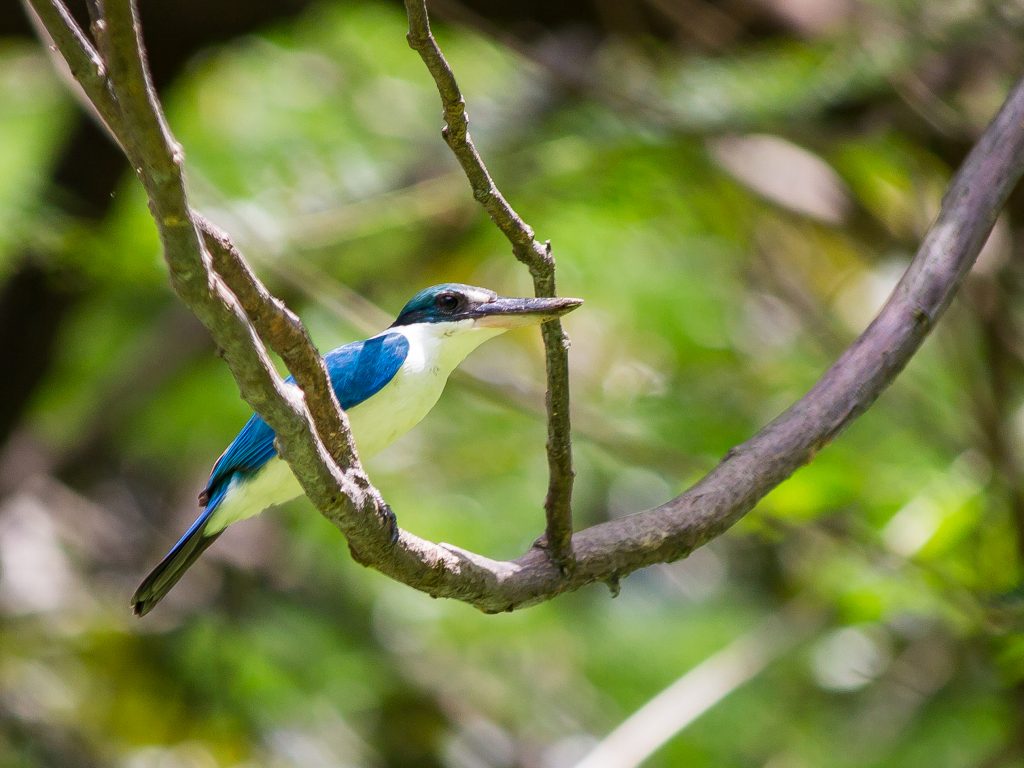 A collared kingfisher perched on a tree at AS8. (Photo: Mr Athanasius Koh)
A collared kingfisher perched on a tree at AS8. (Photo: Mr Athanasius Koh)
Dressed in beautiful blue feathers and a broad white “collar” around its neck, the collared kingfisher is a vocal bird spotted about campus with its series of harsh “kee-kee” notes, described by some as a maniacal laugh.
The collared kingfisher has also been quite the icon in Singapore’s history, gracing not only stamps but even the now decommissioned $10 note as part of The Bird Series Currency Notes from 1976 to 1984.
Look out for the collared kingfisher’s outstanding blue plumage as it rests atop trees and lamp posts. This sharply dressed celebrity is an easy spot around FASS and NUS Faculty of Engineering.
Red Junglefowl (Gallus gallus)
 Male red junglefowls proudly flaunt their dark green tail feathers and black primary feathers. (Photo: Mr Athanasius Koh)
Male red junglefowls proudly flaunt their dark green tail feathers and black primary feathers. (Photo: Mr Athanasius Koh)
Even if you have never personally caught sight of the resident FASS red junglefowl, you are more than likely to have heard its signature “cock-a-doodle-doo” around the faculty. Often confused for the domestic chicken, the red junglefowl is in fact its wild ancestor.
According to a study led by NUS ornithologist Associate Professor Frank Rheindt, the red junglefowl can be quite easily distinguished from the domestic chicken. Male red junglefowls proudly flaunt their dark green tail feathers and black primary feathers while females have distinguishing grey legs and sport black primary feathers.
While it remains a mystery why it crosses the road, the red junglefowl and its loud presence has certainly captured the attention of students and staff alike.
Plantain Squirrel (Callosciurus notatus)
 A plantain squirrel resting on a tree behind AS4. (Photo: Mr Athanasius Koh)
A plantain squirrel resting on a tree behind AS4. (Photo: Mr Athanasius Koh)
Scurrying and leaping from tree to tree, the plantain squirrel is an adorable sight if you are lucky to observe one at rest or enjoying its meal. This active animal is one of the most common mammals in Singapore and can be identified by distinctive black and white stripes on the sides of its body and its long bushy tail.
These physical features might have you thinking what a beautiful squirrel it is, and you are not alone! In fact, Callosciurus, the plantain squirrel’s taxonomic group, translates to “beautiful squirrel”.
Blink and you just might miss this nimble creature, but the plantain squirrel can be commonly found on the trees around NUS such as at the NUS Faculty of Science. Listen out for the rustling of leaves and you just might come face-to-face with this lovable rodent.
Rose-Ringed Parakeet (Psittacula krameri)
 A rose-ringed parakeet perches on a branch after breakfast along the AS6-AS8 walkway. (Photo: Mr Athanasius Koh)
A rose-ringed parakeet perches on a branch after breakfast along the AS6-AS8 walkway. (Photo: Mr Athanasius Koh)
Often moving in flocks and squawking in unison, the rose-ringed parakeet is a loud presence in NUS. Sporting a bright green plumage, orange beak and blue-tipped tail, males also have an added pink collar around their neck in their third year.
The rose-ringed parakeet was introduced to our green spaces as escaped pets. Native to the Indian subcontinent and northern Southeast Asia, it is a resilient bird that has thrived even in locations as far as Europe!
A bird that you might hear before you see, the rose-ringed parakeet has been spotted on sunny mornings at FASS’ Lovers’ Park and along the walkway between Blocks AS6 and AS8 grabbing its breakfast.
Yellow-vented Bulbul (Pycnonotus goiavier)
 The Yellow-vented Bulbul is easily distinguishable from its black eye-mask, olive-brown back and yellow undertail (Photo: Mr Athanasius Koh)
The Yellow-vented Bulbul is easily distinguishable from its black eye-mask, olive-brown back and yellow undertail (Photo: Mr Athanasius Koh)
One of the most common birds in Singapore’s many green spaces besides the mynah, the yellow-vented bulbul is an easy spot with its black eye-mask, olive-brown back and wings and most strikingly, yellow undertail.
An unfussy fellow, the yellow-vented bulbul has been observed to feed on a variety of small fruits and insects. In addition, it can sometimes be seen carrying strips of man-made waste like plastic bags and tissue paper to be used as nesting material. You might have heard its distinct chirps before, without knowing that it was the yellow-vented bulbul, but now you can keep an eye out for them too! Spot them in shrubs and trees around campus, such as the patch of greenery right outside NUS Press at Block AS3.
Changeable Lizard (Calotes versicolor)
 Adult male changeable lizards develop an orange-coloured head and black patches over their cheeks during the mating season (Photo: Mr Athanasius Koh)
Adult male changeable lizards develop an orange-coloured head and black patches over their cheeks during the mating season (Photo: Mr Athanasius Koh)
Often mistaken for the chameleon, the changeable lizard definitely is not one at all, but that does not stop it from changing its colours when it needs to! Usually brownish to greenish yellow with faint stripes along its body, adult males develop an orange-coloured head and black patches over their cheeks during the mating season.
As common as this rapid reptile is, you might be surprised to know that it is not native to Singapore. It is believed that it was accidentally introduced in the 1980s and has since populated in numbers, aggressively displacing the native green crested lizard (Bronchocela cristatella).
While the changeable lizard is somewhat adept at camouflaging, its timid nature means that you are more likely to find it scurrying away the moment there is a slightest disturbance, rustling up the grass. They can be seen all around campus such as at the FASS Fragrant Plant Garden or outside The Deck.
Oriental Pied Hornbill (Anthracoceros albirostris)
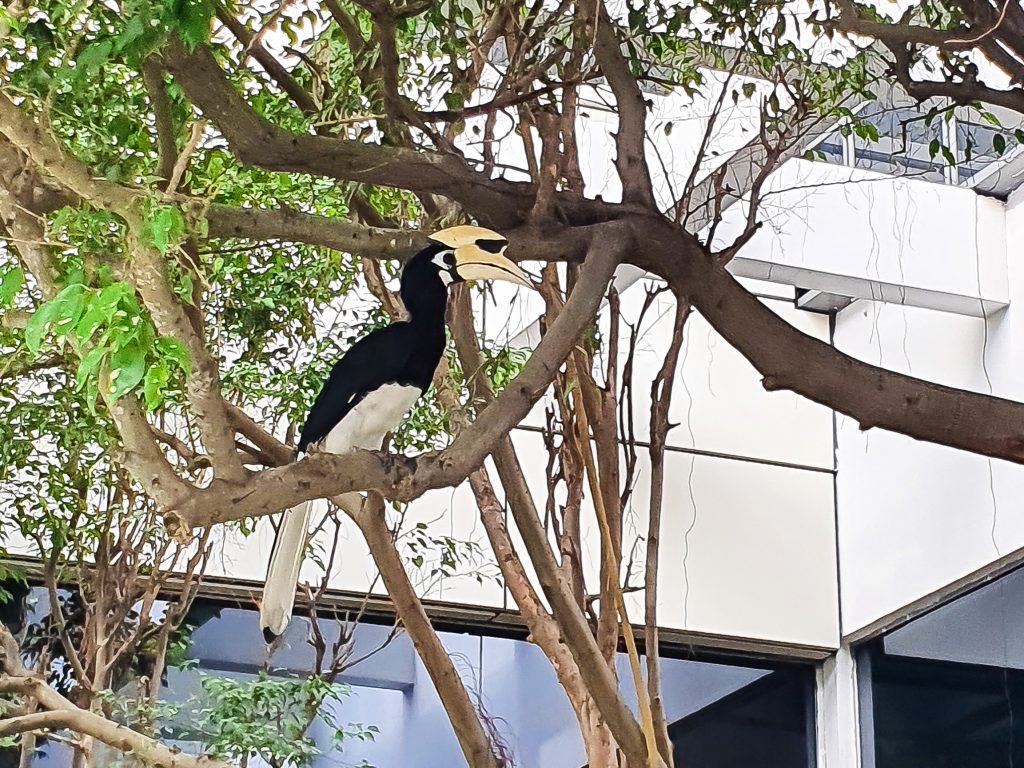 An oriental pied hornbill perches on a tree outside of AS7, Shaw Foundation Building. (Photo: Mr Athanasius Koh)
An oriental pied hornbill perches on a tree outside of AS7, Shaw Foundation Building. (Photo: Mr Athanasius Koh)
The oriental pied hornbill has certainly made an impactful comeback to Singapore’s shores. Once thought to be locally extinct, the large bird can be identified by its casque atop its beak as well as its black and white plumage.
Along with other “celebrity wildlife” like the otters in Singapore, the oriental pied hornbills’ return to the mainland can be largely attributed to conservation efforts by the National Parks Board, Wildlife Reserves Singapore and the local research community. These efforts include providing sufficient mature trees for hornbills that favour nesting in tree holes.
Spotted across a number of locations in Singapore, NUS is no exception. It has been spotted in University Town and around FASS Block AS1 as well as the trees outside AS7, Shaw Foundation Building.
Now that you have met some of the interesting wildlife that have called NUS their home, be sure to keep an eye out for our neighbours in nature between classes! Do appreciate them from a safe distance and refrain from feeding them.
This story first appeared on NUSnews on 17 June 2021.
NUS CHS Case Competition: Solutions for Tomorrow
IN BRIEF | 1 min read
- The NUS College of Humanities and Sciences has launched the Case Competition Series. Register your interest now!
 The NUS College of Humanities and Sciences has launched the Case Competition Series, which seeks to encourage undergraduate and post graduate students to apply their curriculum learning to tackle complex real-world challenges that require interdisciplinary approaches to their solution. The students, who are expected to work in teams comprising members from across different disciplines, will be presented with a complex problem (to be shared at the start of the competition in late July), and given four weeks to build their cases in consultation with participating industry and Faculty advisers before their presentation for the first round of judging. Scan the QR code below or just click here to register your interest as team leader for this competition now. More details will be released to participants next month.
The NUS College of Humanities and Sciences has launched the Case Competition Series, which seeks to encourage undergraduate and post graduate students to apply their curriculum learning to tackle complex real-world challenges that require interdisciplinary approaches to their solution. The students, who are expected to work in teams comprising members from across different disciplines, will be presented with a complex problem (to be shared at the start of the competition in late July), and given four weeks to build their cases in consultation with participating industry and Faculty advisers before their presentation for the first round of judging. Scan the QR code below or just click here to register your interest as team leader for this competition now. More details will be released to participants next month.
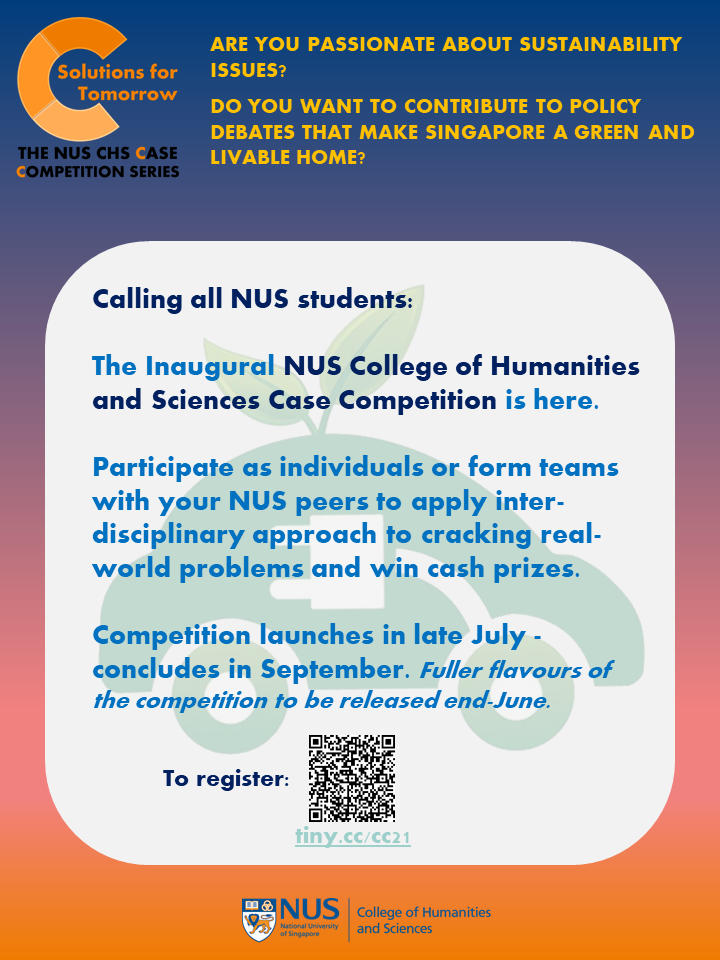
Honouring five outstanding alumni from Arts and Social Sciences
IN BRIEF | 3 min read
- Five exceptional NUS Faculty of Arts and Social Sciences (FASS) alumni from diverse backgrounds were lauded at the annual FASS Distinguished Arts and Social Sciences Alumni Awards 2020 in a simple presentation ceremony on 30 April at Swissotel The Stamford.
 (From left to right): FASS alumni Mr Yatiman Yusof, Mr Niam Chiang Meng, Ms Lim Sau Hoong, Mr Ravi Menon and Dr Liang Wern Fook have made singular contributions to the areas of the arts, education, media, finance, policy and community development.
(From left to right): FASS alumni Mr Yatiman Yusof, Mr Niam Chiang Meng, Ms Lim Sau Hoong, Mr Ravi Menon and Dr Liang Wern Fook have made singular contributions to the areas of the arts, education, media, finance, policy and community development.
Five exceptional NUS Faculty of Arts and Social Sciences (FASS) alumni from diverse backgrounds were lauded at the annual FASS Distinguished Arts and Social Sciences Alumni Awards 2020 in a simple presentation ceremony on 30 April at Swissotel The Stamford.
All have left their distinct mark in the wide-ranging fields that they serve. They are namely:
- Mr Yatiman Yusof (Geography and Malay Studies, ’72), Non-Resident High Commissioner of Singapore to Kenya
- Mr Niam Chiang Meng (Economics, ’83), Chairman of the Maritime and Port Authority of Singapore (MPA)
- Ms Lim Sau Hoong (Chinese Studies, ’83), Founder, Former CEO and Executive Creative Director of advertising agency 10AM Communications
- Mr Ravi Menon (Economics, ’87), Managing Director of the Monetary Authority of Singapore (MAS)
- Dr Liang Wern Fook (Chinese Studies, ’89 and Master of Arts, ’92), Writer, musician and educator
Congratulating the award recipients, FASS Dean Professor Robbie Goh said, “Ms Lim Sau Hoong, Dr Liang Wern Fook, Mr Ravi Menon, Mr Niam Chiang Meng and Mr Yatiman Yusof, have made singular contributions to the arts, education, media, finance, policy and community development. Not only do their wide-ranging achievements bring pride to the FASS family, but I believe that it also attests to the disciplinary range, intellectual curiosity and critical thinking that are the hallmarks of the FASS educational experience.”
This disciplinary diversity, Prof Goh elaborated, would soon be enhanced by FASS’ partnership with the NUS Faculty of Science in the NUS College of Humanities and Sciences (CHS) where students would be able to choose any major that is offered by both faculties. He added that this would be a major boost to FASS students’ educational experience as “the CHS common curriculum will prepare students for a disruptive world – by giving them a compulsory grounding in essential skills such as writing and communication, data literacy, digital literacy, design thinking and AI.”
Our alumni and their contributions
 Present at the ceremony were (clockwise from top left): FASS Dean Prof Robbie Goh; Mr Menon; Dr Liang; Mr Bernard Toh, Director of NUS Alumni Relations; Mr Niam; Ms Lim; Mr Yatiman; and NUS President Prof Tan Eng Chye.
Present at the ceremony were (clockwise from top left): FASS Dean Prof Robbie Goh; Mr Menon; Dr Liang; Mr Bernard Toh, Director of NUS Alumni Relations; Mr Niam; Ms Lim; Mr Yatiman; and NUS President Prof Tan Eng Chye.
A teacher and a journalist early on in his career, Mr Yatiman served key government appointments including as a Member of Parliament and Senior Parliamentary Secretary of the Ministry of Foreign Affairs and the then-Ministry of Information and the Arts, before his retirement in 2006. In addition to being Singapore’s non-resident envoy to Kenya, Mr Yatiman is a Board Member of the Singapore Press Holdings Foundation and the Chairman of the Malay Language Council of Advisors.
Contributing extensively to the public sector too was Mr Niam who served in the Ministries of Finance, Trade and Industry, Health, Law, and Information, Communications and the Arts – including Permanent Secretary appointments in several of these Ministries. He also served at the National Population and Talent Division, and the National Climate Change Secretariat. Aside from his current MPA chairmanship, Mr Niam is also the Chairman of Gardens by the Bay Pte Ltd and MediaCorp Pte Ltd.
A heavyweight in the media, marketing, and advertising industry, Ms Lim’s creative leadership of 10AM Communications has garnered over 300 prestigious global awards including The One Show, the Clio Awards, and the Communication Arts. Identified for her unique creative talent, Ms Lim was Visual Advisor to the Planning Committee for the 2008 Beijing Olympics’ Opening Ceremony and headed the Shanghai World Expo 2010 Singapore Pavilion Advisory Panel. In 2007, Ms Lim was awarded the President’s Design Award and was named Designer of The Year for her extensive contributions to media, marketing and culture in Singapore.
Prior to his appointment at MAS, Mr Menon served as Permanent Secretary at the Ministry of Trade and Industry, and Deputy Secretary at the Ministry of Finance. A recipient of the Singapore Government’s Meritorious Service Medal and Public Administration (Gold) Medal, he has served on boards in the public, private, and people sectors. He is currently Chairman of the Institute of Banking and Finance, and serves on the Board of Trustees of the Singapore Indian Development Association.
A singer-songwriter, poet and academic in Chinese literature and language, Dr Liang is a respected cultural figure and pioneer of Xinyao – a movement of locally composed Mandarin pop songs from the 1980s. To date, Dr Liang is the only artist who has received the National Arts Council’s Young Artist Award (Literature) and the prestigious Cultural Medallion (Music) across different art genres. He was also honoured recently with the Singapore Chinese Cultural Contribution Award for his outstanding contribution to the promotion, enrichment and development of Chinese Singaporean culture. His canon of work includes over 15 publications of literature, more than 200 songs, and two Mandarin musicals – a number of his most important works were written and composed during his university days.
On receiving the awards
Also present at the event was NUS President Professor Tan Eng Chye who presented the awards to the five alumni. Invited guests were also treated to videos of the award recipients who shared about their university days in FASS and their career highlights.
Recalling the moment he received news of the award, Mr Yatiman humbly shared, “To be frank, I’m quite surprised when I was told about it. And I thought there are hundreds, if not thousands of people who are more suitable to receive this award. I’m just a small worker in the community, not doing much in my lifetime. I think there are many others. So, for those who’ve been working hard for the good of the community, I take this award as recognition of their effort too.”
Mr Niam recalled some of his best memories were during university days where he learnt a lot about networking and life skills. It was also where he found his life partner. He said, “It is a privilege to be given this award. I would like to thank NUS and the organising committee for bestowing this honour on me and the other recipients…it means a great deal.”
 Taking the form of a rising star, the alumni award represents the inspiration these individuals bring to society through their brilliant contributions towards the Faculty, University and Singapore.
Taking the form of a rising star, the alumni award represents the inspiration these individuals bring to society through their brilliant contributions towards the Faculty, University and Singapore.
Established in 2015, the Awards recognise individuals for their distinguished scholarship and outstanding service to the Faculty, the University and Singapore. These outstanding recipients have made significant impact in various fields locally and internationally, which has contributed to the betterment and promotion of the arts and social sciences.
Previous recipients of the Awards include luminaries such as former President Mr S R Nathan, Emeritus Senior Minister and former Prime Minister Mr Goh Chok Tong, former United Nations Under-Secretary General Dr Noeleen Heyzer; Permanent Member of the Presidential Council for Minority Rights Mr Abdullah Tarmugi; and Executive Chairman of Banyan Tree Holdings Limited Mr Ho Kwon Ping.
Click here for more details on this year’s award recipients.
This story first appeared on NUSnews on 6 May 2021.
Singapore through the years: A digital cartographic record
IN BRIEF | 3 min read
- Professor Taylor and Associate Professor Feng Chen-Chieh, along with their department colleagues at NUS Geography, created Historical Maps of Singapore, an online resource hosted by NUS Libraries that provides a series of maps of different scales dating from 1846 to 2010.
 A plan of Singapore town and the adjoining districts produced by John Turnbull Thomson, a Government Surveyor, and published by J.M. Richardson in London in 1846.
A plan of Singapore town and the adjoining districts produced by John Turnbull Thomson, a Government Surveyor, and published by J.M. Richardson in London in 1846.
From quiet colonial backwater to thriving city-state, Singapore has undergone rapid transformation over the last 200 years or so.
If you are interested in finding out how the Central Business District has developed since the 1828 Jackson Plan or have a general interest in the country’s ever-changing landscape, do check out Historical Maps of Singapore, an online resource created by NUS Geography and hosted by NUS Libraries.
Historical Maps of Singapore provides a series of maps of different scales dating from 1846 to 2010. The maps have been carefully converted to a digital format and georeferenced to facilitate cross-comparison.
The work was funded through a Strategic Initiative award from NUS, and both the Singapore Land Authority and Ministry of Defence kindly provided permission for the maps to be made available online.
NUS Geography faculty members who worked on the project included the Head of Department Professor David Taylor, as well as Associate Professor Feng Chen-Chieh.
“Maps are extremely important resources, and not only for geographers. Maps are time-stamped windows not only on the ever-changing landscapes they represent in reduced form but also on the minds and values of the map-makers and those who they thought might be interested in the results of their endeavours,” said Prof Taylor.
“For example, the 1873 map shows the locations of 29 police stations, but only one hospital ~ was crime really a much greater concern than health in late 19th century Singapore? Making the maps available in digital form opens them to a wider audience and to new forms of analysis.”
 (From left to right) The changing landscape of the Telok Ayer Basin from 1860 to 1993.
(From left to right) The changing landscape of the Telok Ayer Basin from 1860 to 1993.
The online resource is being used in teaching by NUS Geography, and has proved particularly valuable during the COVID-19 pandemic when teaching was moved largely online.
The digitised maps have also been used in research. For example, geographers have used the maps as a basis for plotting changes in Singapore’s coastline and the extent to which coastal habitats such as mangrove forests have been lost, while researchers at NUS Chinese Studies have plotted changes in the locations of Chinese temples and kampungs – and in some cases their disappearances.
The Historical Maps of Singapore web-based resource has been made as straightforward as possible to use. Once on the website, users may select the maps that they are interested in and zoom in and out, revealing higher or lower levels of detail. They can also arrange several maps on top of one another as layers, and search for common features on the different maps. Layer swipes can also be done to compare different maps.
Clicking on the metadata, one can also view a description of the map, provenance and citation. These maps can be exported and viewed in Google Earth, QGIS or ArcGIS as layers. These features provide researchers and students from a range of disciplines with the analytical and visualisation tools needed to carry out more detailed studies of the digitised maps.
 Users may swipe to compare the maps over different years.
Users may swipe to compare the maps over different years.
Prof Taylor added, “The popularity of the Historical Maps of Singapore web-based resource has not surprised me. Singapore has changed so much in a relatively short period of time.
“Maps are one way of capturing and evaluating those changes. But they are capable of providing much more than a simple record of change. I hope that we are able to add to the current collection of digitised maps and associated resources in the coming years as we move increasingly into an era where geospatial information underpins so much of what we do and who we are”.
This story first appeared on NUSnews on 22 April 2021.
Singapore Research Nexus Event: Smart Citizenship in and Beyond Singapore
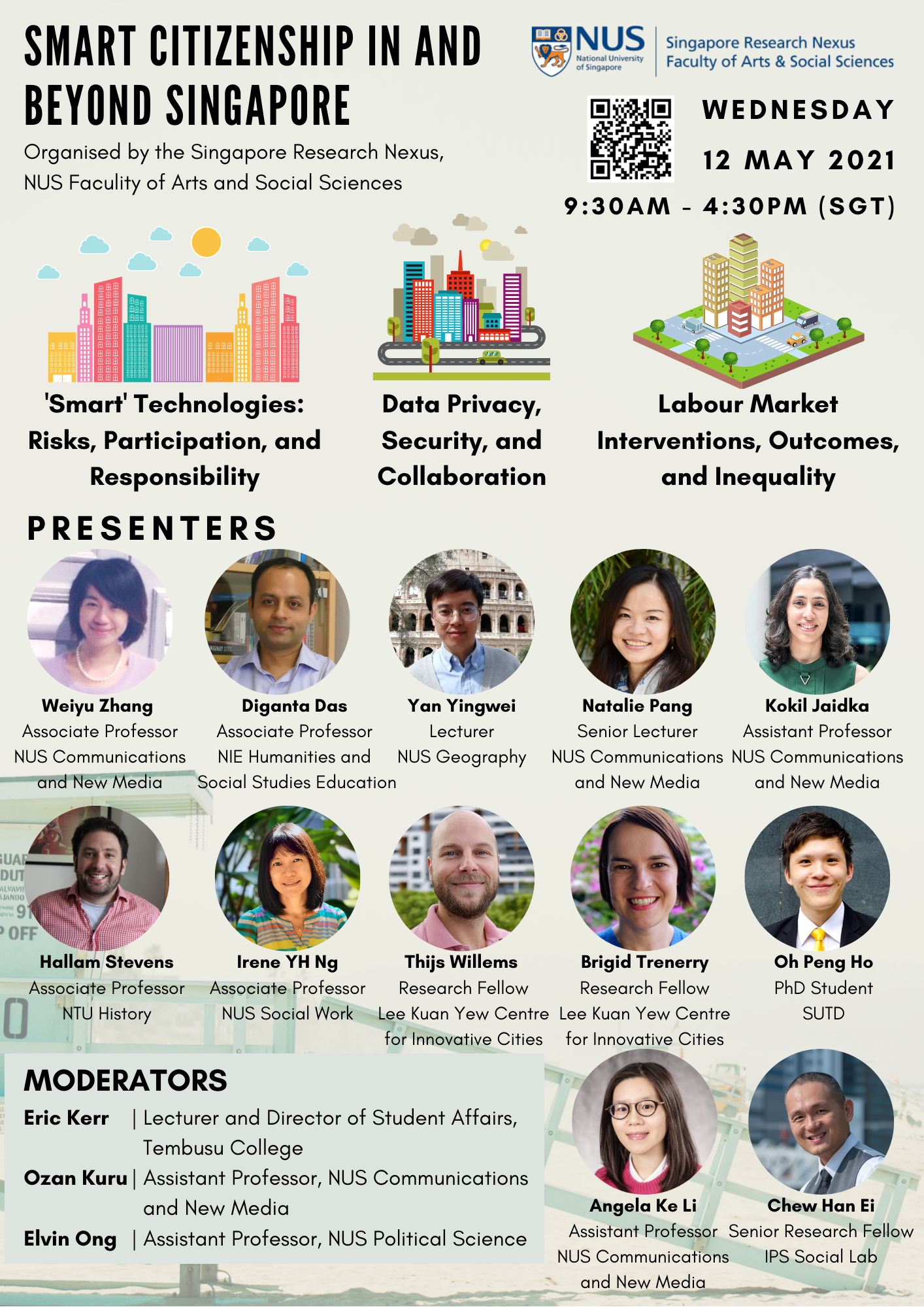
The Singapore Research Nexus (SRN) at the Faculty of Arts and Social Sciences Research Division, NUS invites you to a Virtual Event featuring recent research on Smart Citizenship in and beyond Singapore.
Academics from NUS and beyond will present their studies on the themes of 1) ‘Smart’ Technologies: Risks, Participation, and Responsibility; 2) Data Privacy, Security, and Collaboration; and 3) Labour Market Interventions, Outcomes, and Inequality.
Date: Wednesday, 12 May 2021
Time: 9:30 AM to 4:30 PM (SGT)
Registration at Zoom: https://nus-sg.zoom.us/meeting/register/tZMkf-uurzsiGtVtU5y5RB9tvZORdDlmOnKF
Please register early through the link above. After registering, you will receive through email a Zoom link that contains instructions on joining the session (please also ensure to check your junk mail). If you do not receive the confirmation email within two working days, please email nexus@nus.edu.sg. You are free to join and leave the session at a time of your convenience. Should you wish to re-join the session, please use the same unique Zoom link used to enter the session.
Please note that this online event may be recorded by the Singapore Research Nexus.
Schedule
| 12 MAY 2021 (Wednesday) | |
| 09:30 – 09:40 | REGISTRATION |
| 09:40 – 09:45 | WELCOME REMARKS |
| Eric Kerr | Lecturer and Director of Student Affairs, Tembusu College | |
| 09:45 – 11:20 | PANEL 1 – ‘SMART’ TECHNOLOGIES: RISKS, PARTICIPATION, AND RESPONSIBILITY |
| 09:45 – 09:50 | Introduction of Researchers Eric Kerr | Lecturer and Director of Student Affairs, Tembusu College |
| 09:50 – 10:10 | Smart Urbanism and its Contexts of Participation in Singapore and South Asia (TBC) Diganta Das | Associate Professor, NIE Humanities and Social Studies Education |
| 10:10 – 10:30 | Volunteered geographic information and its role in disaster and crisis management Yan Yingwei | Lecturer, NUS Geography |
| 10:30 – 10:50 | The history of Civic Tech in Singapore: An Actor-Network Analysis Weiyu Zhang | Associate Professor, NUS Communications and New Media |
| 10:50 – 11:20 | Q & A |
| 11:20 – 11:35 | TEA BREAK |
| 11:35 – 13:10 | PANEL 2 – DATA PRIVACY, SECURITY, AND COLLABORATION |
| 11:35 – 11:40 | Introduction of Researchers Ozan Kuru | Assistant Professor, NUS Communications and New Media |
| 11:40 – 12:00 | Data Privacy Concerns among University Students (TBC) Kokil Jaidka | Assistant Professor, NUS Communications and New Media |
| 12:00 – 12:20 | Denizens of the data-fied city Hallam Stevens | Associate Professor, NTU History |
| 12:20 – 12:40 | Citizen in the smart city: Data privacy, purpose and emerging notions of citizenry Natalie Pang | Senior Lecturer, NUS Communications and New Media |
| 12:40 – 13:10 | Q & A |
| 13:10 – 14:10 | LUNCH |
| 14:10 – 16:30 | PANEL 3 – LABOUR MARKET INTERVENTIONS, OUTCOMES, AND INEQUALITY |
| 14:10 – 14:15 | Introduction of Researchers Elvin Ong | Assistant Professor, NUS Political Science |
| 14:15 – 14:35 | Universal Digital Access and Full Digital Inclusion (TBC) Irene Y. H. Ng | Associate Professor, NUS Social Work |
| 14:35 – 14:55 | Making ‘Digital Work’ Work: An Embodied and Grounded Approach to Digital Transformation Thijs Willems | Research Fellow, Lee Kuan Yew Centre for Innovative Cities |
| 14:55 – 15:15 | Enhancing Smart Citizenship and Digital Transformation in a Post-Covid-19 World: Opportunities and Challenges for Singapore Brigid Trenerry | Research Fellow, Lee Kuan Yew Centre for Innovative Cities |
| 15:15 – 15:35 | Bring Political Economy Back to Algorithmic Analysis Angela Ke Li | Assistant Professor, NUS Communications and New Media |
| 15:35 – 15:55 | Towards a unified framework for digital literacy in Singapore Chew Han Ei | Senior Research Fellow, IPS Social Lab |
| 15:55 – 16:25 | Q & A |
| 16:25 – 16:30 | CLOSING REMARKS |
| Elvin Ong | Assistant Professor, NUS Political Science | |
#DiscoverFASS@CHS 2021 | Sign Up for Masterclasses, Learn All About Our Majors
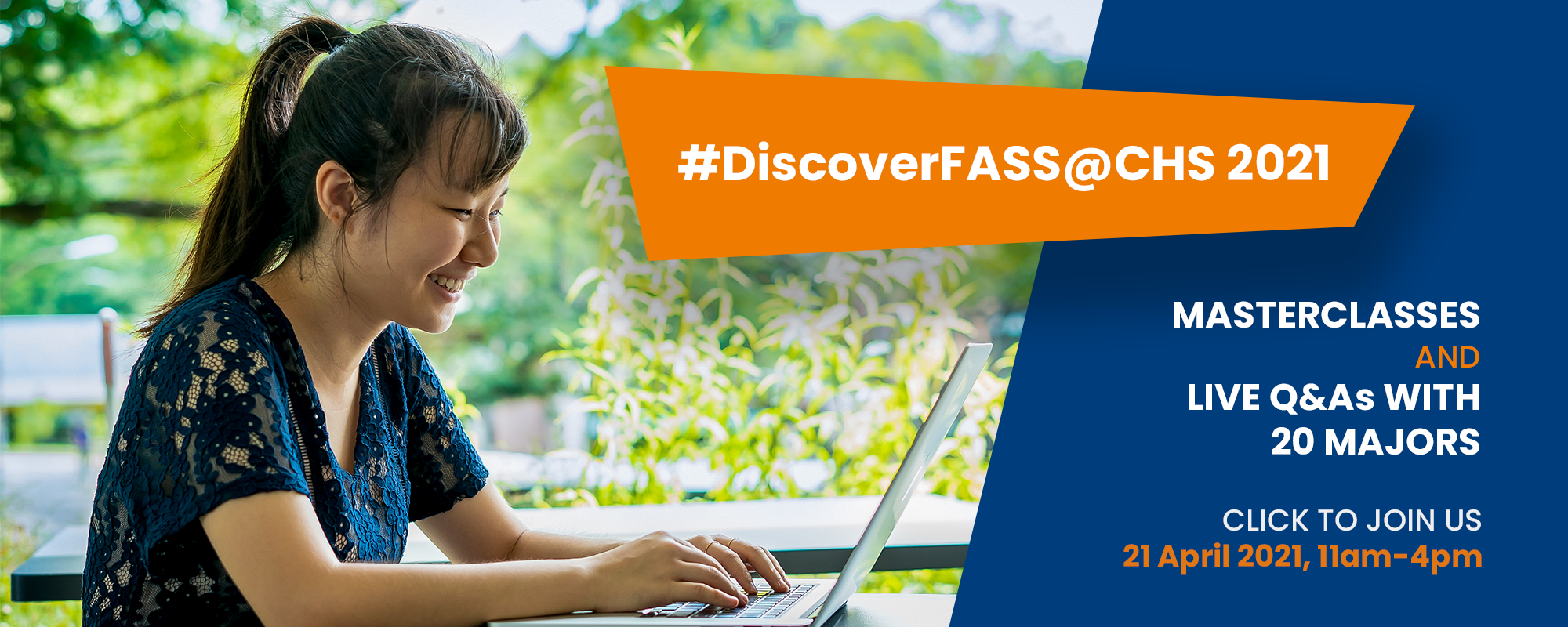
As part of the #DiscoverFASS@CHS campaign leading up to our Open House in May this year, we are holding 'live' Masterclasses presented by three of our award-winning Faculty members, and our Departments are hosting 'live' Q&A sessions for prospective students. These are opportunities not to be missed if you wish to know all you need to know about classes here and the myriad programmes available to you if you are a part of the FASS community. Masterclasses by Award-Winning Faculty
Experience lessons led by our dynamic faculty members.  Roasted Fetuses and Corpse Magic: An Introduction to Supernaturalism in Southeast Asia
Roasted Fetuses and Corpse Magic: An Introduction to Supernaturalism in Southeast Asia
Presented by Associate Professor Irving Johnson, Department of Southeast Asian Studies
The class aims to foreground the fascinating world of beliefs in supernaturalism that pervade Southeast Asian lives. Many of us enjoy telling and listening to creepy stories, watching horror movies on Netflix or dabbling in the esoteric. In this masterclass, we will look at some of the beliefs that structure constructions of the supernatural in modern Southeast Asia. The class revolves around a series of interrelated questions that seek to discover commonalities in popular belief systems and their prominence in the region, linking supernaturalism to larger issues of power, gender and politics. 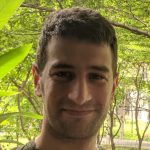 Evidence and Promise Making
Evidence and Promise Making
Presented by Assistant Professor Zachary Barnett, Department of Philosophy
Promise-making is an important part of life. We make promises to our friends, families, and significant others, and they make promises to us. We will look at a puzzle that arises when we think about "promising against the odds": How should I feel about making a promise, if I know that most of the people in my exact situation end up breaking that promise? For example, suppose that I promise to quit smoking cigarettes. At the same time, I know that most people who sincerely promise to quit smoking do not actually succeed on their first attempt. Should I believe that I will be the exception to the rule? If not, am I justified in making the promise in the first place? And if I do make the promise, should my friends and family believe me? These questions arise in many different contexts, ranging from the superficial to the serious, involving addiction or relationships. 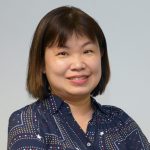 Making Sense of Self-Awareness and What That May Mean
Making Sense of Self-Awareness and What That May Mean
Presented by Dr Peace Wong Yuh Ju, Department of Social Work
In this talk, Dr Wong will attempt to broaden our understanding about ‘self’ and what that may mean to us. It is not uncommon for students in wanting to gain greater self-awareness with the attempt to learn more about one’s beliefs/feelings in relation to the observed world around us. Yet, how do we deepen our understanding of ‘self’, given that we are both familiar with who we are, and yet at times finding ourselves baffled by our reactions, and wondered why we respond in a certain manner? We will briefly discuss the various influences that may impact our values and beliefs, as well as consider what knowing your ‘self’ may mean to you.
To register for Masterclasses, click here.
Live Q&As with our Departments
Meet key Faculty and student representatives of every FASS Department and major programme in their respective Zoom meeting rooms and ask them specific questions about the requirements, content and value of the programmes they offer.
Department of Chinese Studies
The Chinese Studies Department provides training in diverse areas of Chinese Studies and Chinese Language, with the aim of preparing students for employment in a wide range of sectors. Graduates are offered career opportunities as professionals in the educational and business sectors, academia, the translation service industry and the mass media.
Join the Department's #DiscoverFASS@CHS 2021 'Live' Q&A session on 21 April (2-4 pm) here.
In the meantime, visit the College of Humanities Programmes page for more details on what this Department offers.
Department of Communications and New Media
Communications and New Media (CNM) at the National University of Singapore is the only Department in Southeast Asia that offers media studies, interactive media design, cultural studies, and communication management with a focus on new media.
Join the Department's #DiscoverFASS@CHS 2021 'Live' Q&A session on 21 April (2-4 pm) here.
In the meantime, visit the College of Humanities Programmes page for more details on the programmes offered by this Department.
Department of Economics
The Department of Economics has an established reputation as one of the largest and leading departments of Economics in the Asia-Pacific region. Faculty members’ research areas span a wide range of economic fields, with strength in the core areas of microeconomics, macroeconomics and econometrics, as well as in particular fields such as game theory and industrial organization, labor economics, education, financial economics, and growth theory and development with special reference to Asia.
The Department's #DiscoverFASS@CHS 2021 'Live' Q&A session on 21 April (2-4 pm) here. This session includes discussion of the Data Science and Economics Cross-Disciplinary Programme (DSE-XDP).
In the meantime, visit the College of Humanities Programmes page for more details on the programmes offered by this Department.
Department of English Language, Literature and Theatre Studies
The Department of English Language, Literature and Theatre Studies houses three undergraduate majors and three graduate programmes. The English Language major offers an education in linguistics, the study of human language. The undergraduate programme in English Literature is designed to provide a broad foundation in reading and analysing texts of all kinds. And, the Theatre Studies curriculum delivers education in all areas of theatre and performance history, production and interpretation.
The Department's #DiscoverFASS@CHS 2021 'Live' Q&A session on 21 April (2-4 pm) here.
In the meantime, visit the College of Humanities Programmes page for more details on the programmes offered by this Department.
Department of Geography
Modules in the Department of Geography are organized along four areas of enquiry: environmental processes and change; global political economy; society and culture; and regional specializations (with a focus on Asia). The Department also offers a Field Studies module in which students travel to countries in the region such as Thailand and Malaysia where they conduct field work and collect research material over a 3-5 week period. Home-stays and visits to local universities and key sites of interest are part of the overseas learning experience it delivers.
The Department's #DiscoverFASS@CHS 2021 'Live' Q&A session on 21 April (2-4 pm) here. This session includes discussion of the Bachelor of Environmental Studies Programme (BES-XDP).
In the meantime, visit the College of Humanities Programmes page for more details on the programmes offered by this Department.
Department of History
The Department of History offers training at undergraduate and graduate levels, and its teaching and research expertise lies primarily in the history of Southeast and East Asia, but there is strong selection of module offerings in European, American, and military history, as well as the history of art, business, religion, science and technology.
The Department's #DiscoverFASS@CHS 2021 'Live' Q&A session on 21 April (2-4 pm) here.
In the meantime, visit the College of Humanities Programmes page for more details on the programmes offered by this Department.
Department of Japanese Studies
Founded in 1981, the Department of Japanese Studies is one of the largest area studies departments devoted to the study of Japan in the Asia-Pacific region, and offers BA, MA and PhD degrees in Japanese Studies taught by specialists with qualifications from leading universities around the world.
The Department's #DiscoverFASS@CHS 2021 'Live' Q&A session on 21 April (2-4 pm) here.
In the meantime, visit the College of Humanities Programmes page for more details on the programmes offered by this Department.
Department of Malay Studies
The Department of Malay Studies actively engages in research on a wide range of issues concerning the Malay world from a multi-disciplinary perspective, promotes exchanges with centres of Malay studies worldwide, and encourages the development of new and alternative approaches to the understanding of Malay history, economy, politics, society and culture.
The Department's #DiscoverFASS@CHS 2021 'Live' Q&A session on 21 April (2-4 pm) here.
In the meantime, visit the College of Humanities Programmes page for more details on the programmes offered by this Department.
Department of Philosophy
The Department of Philosophy is one of Asia’s leading centres for philosophical education and research. It is the top English-language philosophy program in Asia, and the inaugural Asian member of the Australasian Association of Philosophy. The faculty members have a broad range of interests spanning diverse philosophical traditions, offer a philosophical education spanning diverse philosophical traditions.
The Department's #DiscoverFASS@CHS 2021 'Live' Q&A session on 21 April (2-4 pm) here. This session will also include discussion of the Philosophy, Politics, and Economics Cross-Disciplinary Programme (PPE-XDP).
In the meantime, visit the College of Humanities Programmes page for more details on the programmes offered by this Department.
Department of Political Science
The Department of Political Science offers modules in comparative politics, international relations, political theory, and public administration. It also houses the Global Studies Programme, a new, multidisciplinary field of inquiry that examines the processes and effects of globalisation across political, economic, social and cultural domains around the world.
The Department's #DiscoverFASS@CHS 2021 'Live' Q&A session on 21 April (2-4 pm) here. This session includes discussion of the Global Studies Programme.
In the meantime, visit the College of Humanities Programmes page for more details on the programmes offered by this Department.
Department of Psychology
The Psychology programme at NUS aims to equip students with knowledge in the key areas of psychology (such as human biological processes, developmental processes, social processes, cognitive processes, mental health and adjustment of individuals) as well as an understanding of the applications of psychology. It also develops skills for undertaking studies of behaviour, including statistical skills and the use of computers for data analyses.
The Department's #DiscoverFASS@CHS 2021 'Live' Q&A session on 21 April (2-4 pm) here.
In the meantime, visit the College of Humanities Programmes page for more details on the programmes offered by this Department.
Department of Social Work
The main objective of the undergraduate General and Honours degree programme offered by the Department of Social Work is to equip its graduates for entry into the social work profession at the direct-service level. Students are exposed to social service visits, skills laboratory training, fieldwork placements and module projects, among other applied learning methods.
Go to this Department's #DiscoverFASS@CHS 2021 'Live' Q&A session on 21 April (2-4 pm) here.
In the meantime, visit the College of Humanities Programmes page for more details on the programmes offered by this Department.
Department of Sociology
The Department of Sociology is a diverse, dynamic and innovative research and teaching unit with strong expertise in research on Southeast Asia, East Asia and South Asia as well as on Singapore society. One of the largest Sociology departments in the world, it offers comprehensive undergraduate, honours and graduate programmes, led by a group of dedicated and creative researchers and educators.
The Department's #DiscoverFASS@CHS 2021 'Live' Q&A session on 21 April (2-4 pm) here.
In the meantime, visit the College of Humanities Programmes page for more details on the programmes offered by this Department.
South Asian Studies Programme
South Asian Studies, as offered by the South Asian Studies Programme (SASP), focuses on the region comprising India, Pakistan, Bangladesh, Sri Lanka, Nepal, Bhutan and the Maldives. At the undergraduate level, students are offered a range of modules in economics, religious and cultural studies, history, international relations, philosophy, politics and gender studies. The aim is to provide graduates of the programme with a broad understanding of the region from different points of view - knowledge that will be useful in dealing with this changing region in the 21st century.
The Department's #DiscoverFASS@CHS 2021 'Live' Q&A session on 21 April (2-4 pm) here.
In the meantime, visit the College of Humanities Programmes page for more details on the programmes offered by this Department.
Department of Southeast Asian Studies
The Department of Southeast Asian Studies is located in the Asian Studies Division of the Faculty of Arts and Social Sciences, and offers distinctive programmes for anyone interested in studying Southeast Asia, from the undergraduate to the PhD level.
The Department's #DiscoverFASS@CHS 2021 'Live' Q&A session on 21 April (2-4 pm) here.
In the meantime, visit the College of Humanities Programmes page for more details on the programmes offered by this Department.
Centre for Language Studies
The Centre for Language Studies was established in 2001 to serve the foreign language needs of the Faculty of Arts and Social Sciences and has today over 80 full-time and part-time faculty members. It teaches thirteen different languages - Arabic, Bahasa Indonesia, Chinese, French, German, Hindi, Japanese, Korean, Malay, Spanish, Tamil, Thai and Vietnamese - to app. over 3,300 students per semester and thus helps them acquire a very valuable economic and social resource in today's world of growing globalisation and internationalisation.
The Department's #DiscoverFASS@CHS 2021 'Live' Q&A session on 21 April (2-4 pm) here.
In the meantime, visit the College of Humanities Programmes page for more details on the programmes offered by this Department.









